Here’s our look at the Trump administration and the rest of Washington:
- Anthony Scaramucci is forced out just 10 days after being named incoming White House communications director
- White House says Trump is fully confident in his Cabinet, apparently including Atty. Gen. Jeff Sessions
- Trump swears in retired Gen. John F. Kelly as his new chief of staff
- The most notable firings and resignations in the Trump White House
Trump called him ‚Äúmy African-American.‚ÄĚ But he has few kind words for the president.
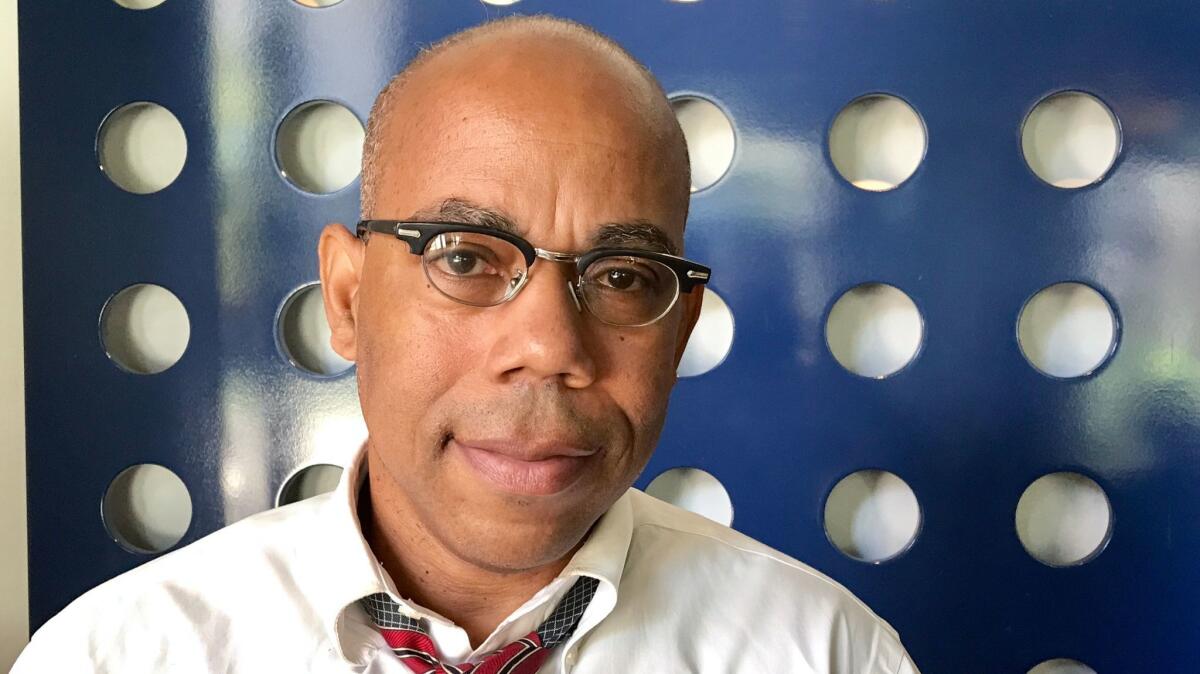
On the day that changed his life, Gregory Cheadle almost stayed in bed.
He was tired ‚ÄĒ he traveled a lot in his long-shot bid for Congress ‚ÄĒ but asked himself: How often does a candidate for president come to the far reaches of Northern California? And why pass up a crowd and the chance to hand out more fliers?
So Cheadle roused himself that June 2016 morning and secured a spot up close when Donald Trump swooped in for a rally at Redding’s municipal airport.
It was hot, the atmosphere was loose and Trump‚Äôs patter seeming more stand-up comedy than campaign spiel. He went into one of those sidelong digressions, about protesters and an African American ‚ÄĒ ‚Äúgreat fan, great guy‚ÄĚ ‚ÄĒ and, by the way, whatever happened to him?
It was then, Cheadle said, he raised his hand and jokingly shouted, ‚ÄúI‚Äôm here.‚ÄĚ
Trump looked and pointed, his voice a throaty rumble. ‚ÄúLook at my African-American over here!‚ÄĚ he exclaimed. ‚ÄúAre you the greatest?‚ÄĚ
In the days and weeks that followed Cheadle was attacked on social media and harassed by people who dug up his phone number and email address. For a time he stayed home, too nervous to venture outside.
All, he said, because the media portrayed him as something he was not and never has been: a Trump sycophant.
Trump quietly signs Russia sanctions bill
President Trump quietly signed legislation Wednesday that imposes new sanctions on Russia and limits his ability to remove them, according to two White House aides.
Trump signed the bill without cameras or an immediate press release. He had opposed imposing new sanctions on Moscow but had little choice after a nearly unanimous Congress approved the bill, guaranteeing they would override a veto.
The bill, which also imposes new sanctions on Iran and North Korea, prevents American companies from investing in many energy projects that are funded by Russian government interests.
It also prevents Trump from unilaterally lifting the sanctions. It thus marked an unusual move by Congress to tie the president’s hands on foreign policy.
Trump did not want to give up that leverage.
But the vote in Congress was a strong sign that lawmakers do not trust Trump to stand up to Russian President Vladimir Putin, whom Trump has repeatedly praised, and the widening federal investigation into possible coordination last year between his presidential campaign and Moscow.
Passage of the sanctions bill already has sparked a harsh reaction in Moscow.
Putin announced last week that the United States would need to shed 755 personnel, including U.S. diplomats, from its embassy and consulates in Russia. President Obama expelled 35 Russian diplomats, said to be spies, from the United States last December.
A White House aide said a statement would be issued later Wednesday.
Senior GOP senators serve notice: No action on healthcare at this point
Trump administration officials continue to push the Senate to take another run at healthcare legislation, but on Monday senior Republican senators pushed back, making clear that they’re done with the topic for now.
‚ÄúThere‚Äôs just too much animosity and we‚Äôre too divided on healthcare,‚ÄĚ Sen. Orrin G. Hatch (R-Utah), the head of the Senate Finance Committee, said in an interview with Reuters.
‚ÄúI think we ought to acknowledge that we can come back to healthcare afterward, but we need to move ahead on tax reform,‚ÄĚ Hatch said.
His remarks were quickly followed by others in GOP leadership positions.
‚ÄúI think it‚Äôs time to move on to something else,‚ÄĚ Sen. Roy Blunt of Missouri told CNN. ‚ÄúIf the question is do I think we should stay on healthcare until we get it done, I think it‚Äôs time to move on to something else.‚ÄĚ
Sen. John Thune of South Dakota also chimed in. ‚ÄúUntil someone shows us how to get that elusive 50th vote, I think it‚Äôs over,‚ÄĚ he told reporters.
The remarks seemed a coordinated effort to respond to administration officials, including budget director Mick Mulvaney and Health and Human Services Secretary Tom Price, who said over the weekend that they wanted the Senate to keep working on healthcare.
Last week, the Senate defeated several different Republican plans to repeal all or part of the Affordable Care Act. The votes made it clear that with unified Democratic opposition to repeal, and divisions among Republicans, the campaign to overturn the law has stalled out, at least for now.
Congress faces several other pressing issues that will be demanding lawmakers’ attention, including deadlines at the end of September to raise the federal debt ceiling and fund government agencies for the coming fiscal year. And the administration is eager to move on tax proposals, with officials rather optimistically saying they hope to see votes by November on a tax package that is not yet written.
Good news for Atty. Gen. Sessions: Trump has ‚Äė100% confidence‚Äô in Cabinet
President Trump has called Atty. Gen. Jeff Sessions ‚Äúbeleaguered‚ÄĚ and even ‚ÄúVERY weak,‚ÄĚ but Sessions seemed to get good news from the White House press secretary, Sarah Huckabee Sanders, on Monday.
Trump has ‚Äú100% confidence‚ÄĚ in all of his Cabinet secretaries, Sanders said in response to a question about Sessions‚Äô job status during the daily White House briefing.
Last week, when speculation about Sessions was rife, Sanders repeatedly declined opportunities to provide assurances that the attorney general enjoyed the president‚Äôs full confidence. Trump himself said ‚Äútime will tell‚ÄĚ when he was asked last week about Sessions.
The willingness to tamp down speculation about Sessions may reflect the arrival Monday of retired Gen. John F. Kelly as the new White House chief of staff. He is tasked with restoring order to the administration.
Sanders also batted down reports that the White House was discussing moving Sessions to another post, as secretary of Homeland Security. That job became vacant Monday after Kelly was sworn in as Trump’s new chief of staff.
Sanders said the White House has had ‚Äúno conversations‚ÄĚ about any Cabinet members switching jobs.
Republican senators have publicly opposed firing Sessions, and a couple have objected to shifting him to another post as well, given that it could appear that Trump is trying to affect the investigations of himself and his campaign in the context of Russia’s election interference.
Trump has said publicly that his frustration with Sessions, once among his closest allies, stems from Sessions’ decision to recuse himself from the Russia investigation, an act that led to the appointment of a special counsel.
Can Trump really cut health insurance payments for members of Congress and their staff? It would be easy
Reeling from the failure to repeal the Affordable Care Act, President Trump now threatens to block federal funding that lawmakers and their staff rely on to help buy health insurance.
Trump’s threats are not empty. The administration could simply stop the payments -- which are provided to Capitol Hill lawmakers and staff much the way many employers help pay employees’ monthly insurance premiums -- by dashing off new federal regulation.
But the easy attack on lawmakers skims over what many say was a complicated, but fair-minded, compromise made during the Obamacare debates several years ago.
Under Obamacare, if lawmakers want insurance through their employer - the federal government - they are required to buy policies through the ACA exchanges.
There had been great criticism at the time, largely from opponents of the healthcare bill, that lawmakers and congressional staff should not be exempt from the law. The argument was they should have to live under it. So they did.
Usually those buying individual insurance on the exchanges can apply to see if their income and geographic area allow them to qualify for a federal subsidy. For lawmakers, though, that was prohibited. Instead, they get the regular employer contribution they did before, much in the same way other workers do when their companies buy insurance.
For federal workers, the government covers about 70% of the costs, about the same paid by employers in the private sector, according to Kaiser Family Foundation.
The administration affirmed that federal support for lawmakers and their staffs in an Office of Personnel Management regulation issued in 2013.
To cut those funds off, Trump administration could simply reverse course, and issue another regulation changing the rules.
Trump appeared ready to do so in a series of weekend tweets.
‚ÄúWhy should Congress not be paying what public pays,‚ÄĚ Trump tweeted over the weekend. ‚ÄúIf a new HealthCare Bill is not approved quickly, BAILOUTS for Insurance Companies and BAILOUTS for Members of Congress will end very soon.‚ÄĚ
But such a move would likely cause an uproar in Congress. It’s not just members of Congress, but also their staffs, who would have to pay full price for their insurance.
Stopping Trump’s action, though, seems tough. It would require Congress to pass legislation ensuring the federal payments would continue to be made. Few lawmakers would likely take up that cause. And even if Congress were able to pass a bill protecting the payments, it seems doubtful Trump at this point would sign it into law.
U.S. hits Venezuelan President Nicolas Maduro with sanctions
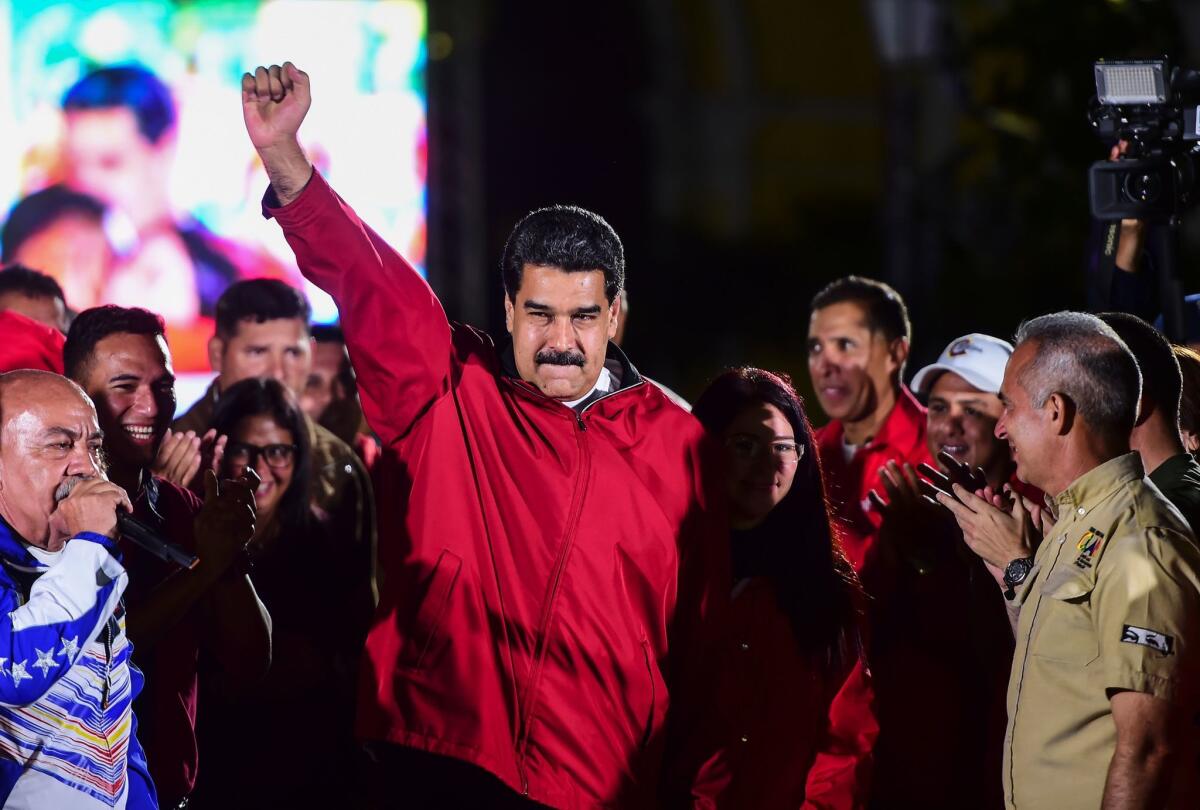
The Trump administration has hit Venezuelan President Nicolas Maduro with financial sanctions.
The move comes after Venezuela held a weekend election that will give Maduro’s ruling party virtually unlimited power in the South American country.
The Treasury Department’s Office of Foreign Assets Control announced the sanctions against Maduro in a brief statement on Monday, a day after the Venezuelan vote to elect a constituent assembly that will rewrite the constitution. A longer explanation from the White House was also expected.
The administration imposed sanctions on more than a dozen senior current and former Venezuelan officials last week, warning the socialist government that new penalties would come if Maduro went ahead with Sunday’s election for the assembly.
Watch live: Anthony Scaramucci’s removal addressed at White House news briefing
Anthony Scaramucci is out as White House communications director
Anthony Scaramucci, the brash New Yorker who was announced little more than a week ago as President Trump’s White House communications director, was ousted Monday before he had even officially taken the job.
John F. Kelly, the newly sworn-in White House chief of staff, told Scaramucci around 9:30 a.m. EDT that he was going to be replaced, according to a person close to White House.
In a statement officially announcing the move, the White House said Scaramucci ‚Äúfelt it was best to give Chief of Staff John Kelly a clean slate and the ability to build his own team.‚ÄĚ
While Scaramucci’s time at the center of the president’s circle was short, it was consequential, prompting the resignations of first Sean Spicer as White House press secretary and then Reince Priebus as chief of staff.
The most notable firings and resignations in the Trump administration >>
A former hedge fund executive on Wall Street, Scaramucci, who enjoyed media attention, also had come on strong stylistically, highlighted by a profane tirade against colleagues Priebus and Trump strategist Steve Bannon in an exchange last week with a New Yorker reporter.
The abrupt shift in Scaramucci’s status seemed to reflect Kelly’s mission to bring order to the chain of command within the chaotic administration.
In getting Scaramucci to leave, Kelly was undoing Trump’s own hiring decision. Scaramucci had told reporters when he was hired that he would be reporting directly to the president at Trump’s request, bypassing the normal chain that would have the communications director -- like all staff -- report to the chief of staff.
Scaramucci’s unusually short tenure reflects a moment of extreme turbulence in the White House, which has been embroiled in infighting as it confronts low poll numbers for the president, a floundering legislative agenda and the investigations involving Russian meddling in last year’s presidential election.
After word spread of Scaramucci’s ouster, Spicer, who resigned when Scaramucci took over but was still working in the White House, walked out of his office to a throng of reporters.
‚ÄúIs this a surprise party?‚ÄĚ he asked.
UPDATE
12:15 p.m.: This story has been updated throughout with additional details and background.
This article was originally published at 11:49 a.m.
Trump swears in John Kelly, says ex-secretary of Homeland Security will do ‚Äėan even better job as chief of staff‚Äô
President Trump swore in his new chief of staff, John F. Kelly, on Monday morning, formalizing a shake-up in his top ranks that was announced Friday evening with word of the resignation of Reince Priebus.
‚ÄúWe look forward to - if it‚Äôs possible - an even better job as chief of staff,‚ÄĚ Trump said to Kelly, formerly the secretary of homeland security.
‚ÄúI‚Äôll try, sir,‚ÄĚ Kelly replied.
Trump is hoping that Kelly, a retired general, will retool and bring order to a White House that has struggled with low poll numbers, staff infighting, a faltering legislative agenda and an investigation into Russian election meddling and potential collusion and obstruction of justice.
Yet Trump said the administration ‚Äúhas done very well‚ÄĚ after a reporter asked what would be different under Kelly. He cited the unemployment rate, the thriving stock market and unnamed polls that, he said, show high business confidence.
‚ÄúWe‚Äôre doing very well. We have a tremendous base,‚ÄĚ he said.‚ÄĚThe country is optimistic. And I think the general will just add to it.‚ÄĚ
Trump praised Kelly‚Äôs performance at the Department of Homeland Security, where Kelly focused on immigration issues at the southern border, as ‚Äúrecord-shattering,‚ÄĚ with ‚Äúvery little controversy.‚ÄĚ
There was no word on whom the president might name to replace Kelly at the department. Trump reportedly has considered moving Atty. Gen. Jeff Sessions there from the Justice Department, reflecting his unhappiness with the attorney general, but Republican senators preemptively have signaled their opposition to such a move.
Risky investigation, stalled agenda ‚ÄĒ Trump‚Äôs in trouble, so here‚Äôs his strategy
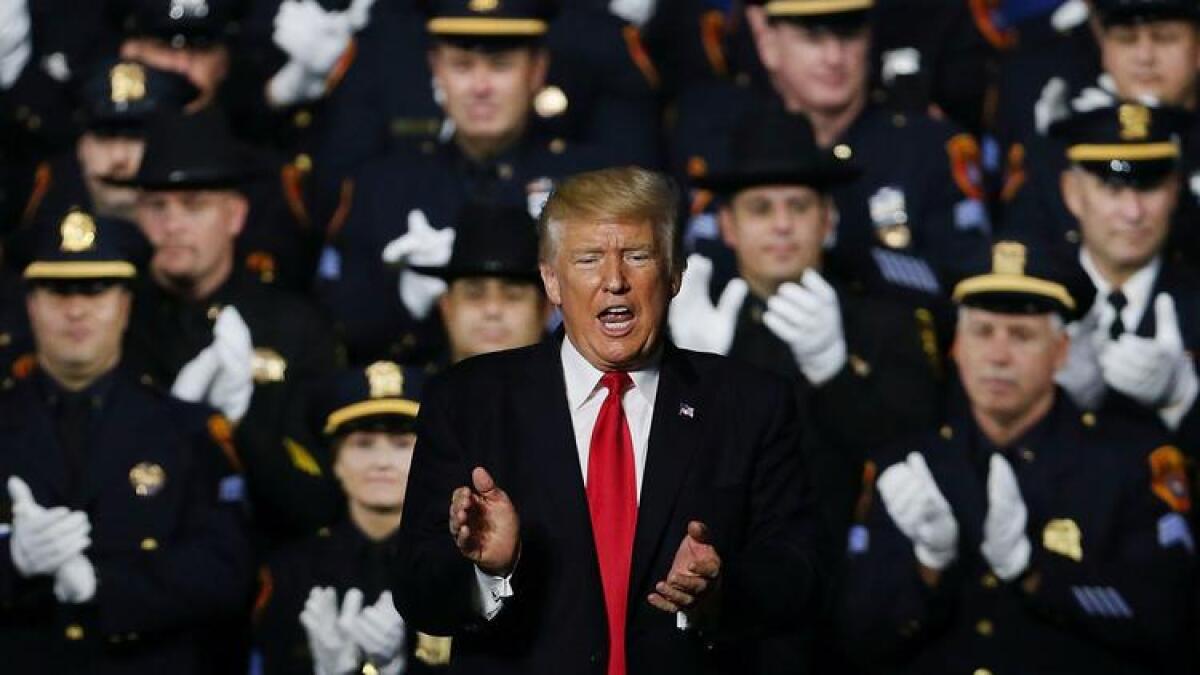
Hosts of Southern California‚Äôs ‚ÄúMorning Answer‚ÄĚ radio show were wrapping up a two-hour live broadcast from a white tent just outside the West Wing last week and marveling at their access to Cabinet secretaries and prominent administration figures.
‚ÄúIf you‚Äôre a Trumpkin,‚ÄĚ host Brian Whitman told his listeners on AM 870, ‚Äúthis is like fantasy camp.‚ÄĚ
The White House‚Äôs daylong hospitality for Salem Radio Network, a nationwide chain of Christian and conservative stations, underscored President Trump‚Äôs continued courtship of ‚ÄĒ and increased dependence on ‚ÄĒ core supporters as he confronts a stalled agenda and increasingly perilous investigations into whether his campaign colluded with Russia and he subsequently sought to obstruct the inquiries.
Obamacare vote isn’t the only sign of GOP resistance to Trump
In the year since Donald Trump won the Republican presidential nomination, party leaders have been reluctant to challenge a man who has formed a tight bond with conservative voters, even when he upset party orthodoxies and norms of presidential behavior.
But that reticence is breaking down. A convergence of contentious issues, as well as embarrassing infighting and shake-ups at the White House, have a number of Republicans suddenly in open resistance to Trump on a number of fronts.
Trump ousts Reince Priebus as chief of staff in latest White House shake-up
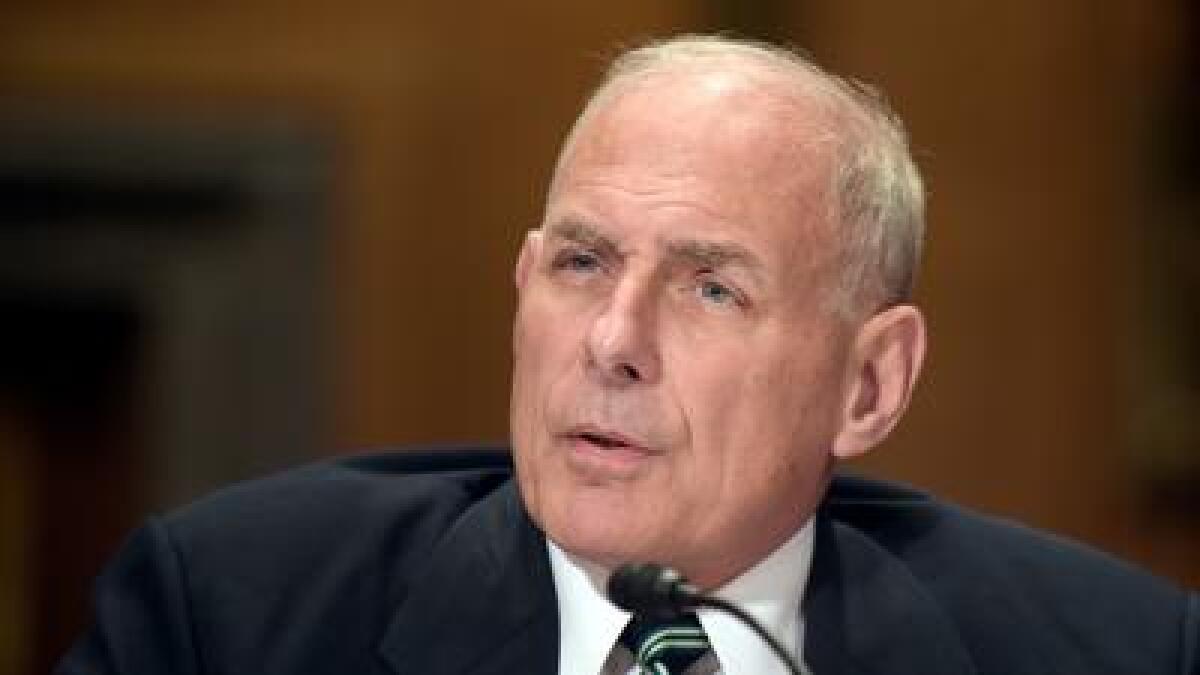
President Trump ousted his beleaguered chief of staff, Reince Priebus, naming Homeland Security Secretary John F. Kelly to replace him Friday in the latest White House shake-up as the administration struggles to emerge from bitter staff infighting and a stalled legislative agenda.
Trump announced the abrupt reshuffle in three posts on Twitter hours after the Senate killed his latest plans to rewrite President Obama’s signature healthcare law, dealing another harsh blow to the White House.
The tweets, sent as Trump was returning on Air Force One with Priebus after a speech on gang violence in New York, caught Capitol Hill and others off guard even though Priebus’ stature in Trump’s inner circle has been in sharp decline for some time.
Putin‚Äôs spokesman accuses U.S. of ‚Äėpolitical schizophrenia‚Äô
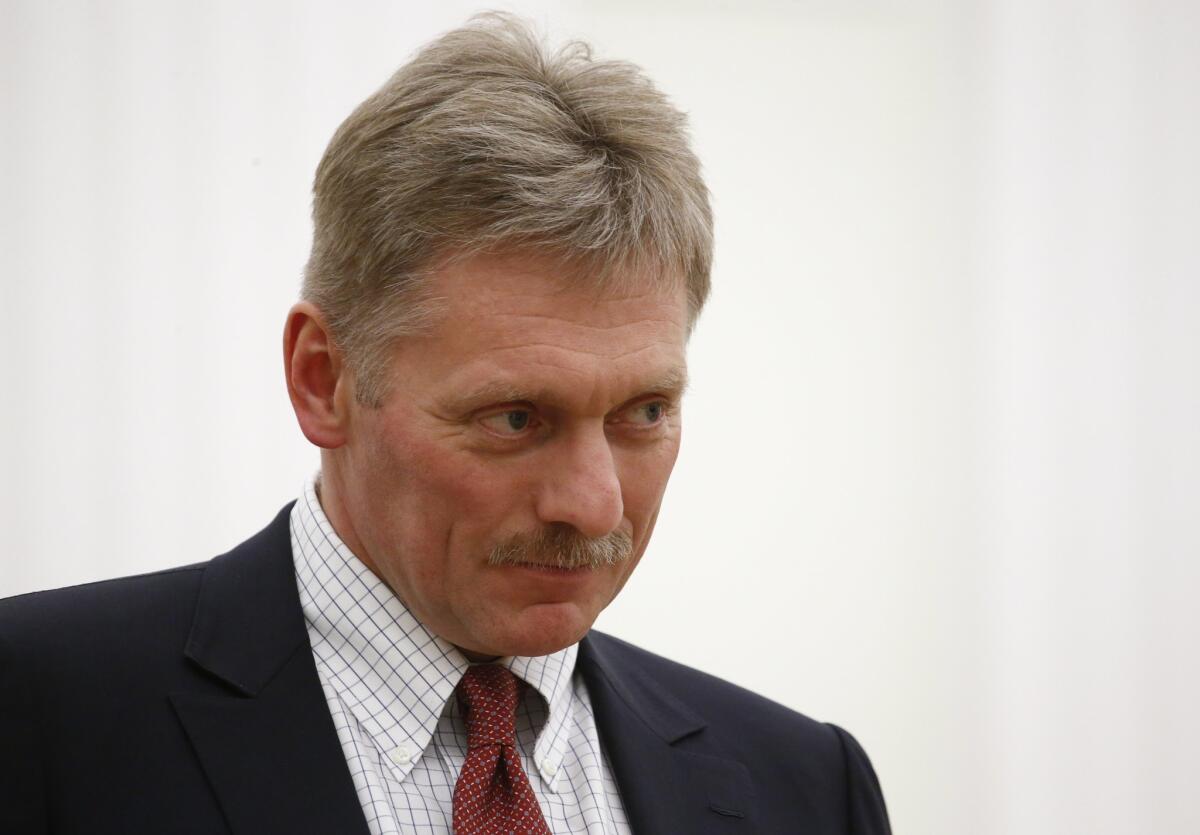
Russia urged the United States on Monday to show ‚Äúpolitical will‚ÄĚ to mend ties even as it ordered sweeping cuts of U.S. embassy personnel unseen since Cold War times.
President Vladimir Putin‚Äôs spokesman, Dmitry Peskov, said it will take time for the U.S. to recover from what he called ‚Äúpolitical schizophrenia,‚ÄĚ but added that Russia remains interested in constructive cooperation with the U.S.
‚ÄúWe are interested in a steady development of our ties and are sorry to note that we are still far from that,‚ÄĚ he said.
Peskov’s statement followed Sunday’s televised comments by Putin, who said the U.S. would have to cut 755 of its embassy and consulate staff in Russia, a massive reduction he described as a response to new U.S. sanctions.
The Russian Foreign Ministry had previously said that the U.S. should cut its embassy and consular employees to 455, the number that Russia has in the United States. Along with the caps on embassy personnel announced Friday, it also declared the closure of a U.S. recreational retreat on the outskirts of Moscow and warehouse facilities.
Moscow’s action is the long-expected tit-for-tat response to former President Obama’s move to expel 35 Russian diplomats and shut down two Russian recreational retreats in the U.S. over reports of Russian meddling in the 2016 presidential election.
White House urged to refrain from Obamacare ‚Äėsabotage‚Äô as Trump mulls subsidy cutoff
A pair of prominent lawmakers urged President Trump on Sunday not to sabotage the Affordable Care Act, or Obamacare, in the wake of failed Republican efforts to scrap his predecessor’s signature legislative achievement.
But Trump urged GOP senators to try again to push through some version of repealing and replacing the law, even though Senate Majority Leader Mitch McConnell (R-Ky.) said last week it was time to move on to other matters.
Trump senior advisor Kellyanne Conway said the president would decide in coming days whether to block subsidies that are a crucial component of the existing healthcare law.
‚ÄúHe‚Äôs going to make that decision this week, and that‚Äôs a decision that only he can make,‚ÄĚ Conway said on ‚ÄúFox News Sunday.‚ÄĚ
Two of the lawmakers who blocked the Senate GOP repeal plan last week, however, criticized the administration’s continued efforts to overturn the law.
Sen. Susan Collins, the Maine Republican who steadfastly rejected a series of GOP healthcare measures last week, blamed the Trump administration for encouraging instability in the insurance markets by continuing the uncertainty over whether the subsidies ‚Äď cost-sharing payments that reduce out-of-pocket healthcare costs for poorer Americans ‚Äď would continue.
‚ÄúI‚Äôm troubled by the uncertainty that has been created by the administration,‚ÄĚ Collins said on NBC‚Äôs ‚ÄúMeet the Press.‚ÄĚ She contested Trump‚Äôs characterization of the payments as an ‚Äúinsurance company bailout.‚ÄĚ
‚ÄúThat‚Äôs not what it is,‚ÄĚ she said, calling the reduction payments ‚Äúvital assistance‚ÄĚ to low-income Americans.
And Sen. Lisa Murkowski of Alaska said further action on healthcare should be done in a bipartisan manner and not rushed.
‚ÄúYou cannot do major entitlement reform singlehandedly, and you wouldn‚Äôt do major legislative initiatives singlehandedly,‚ÄĚ she told reporters in Alaska.
Sen. Bernie Sanders (I-Vt.) echoed Collins’ criticism of Trump’s threat to stop making the cost-sharing payments.
‚ÄúYou know, I really think it‚Äôs incomprehensible that we have a president of the United States who wants to sabotage healthcare in America, make life more difficult for millions of people who are struggling now to get the health insurance they need and to pay for that health insurance,‚ÄĚ he said on CNN‚Äôs ‚ÄúState of the Union.‚ÄĚ
Prior to heading out for a day at his Virginia golf property, Trump tweeted that Republican senators should press ahead with efforts to scrap Obamacare -- a day after he tauntingly exhorted them not to be ‚Äúquitters‚ÄĚ in the quest for a legislative victory for him.
The White House budget director, Mick Mulvaney, on CNN‚Äôs ‚ÄúState of the Union,‚ÄĚ said it was official Trump administration policy that the Senate should keep working to repeal and replace the Affordable Care Act, eschewing an August recess if necessary.
Senators, he said, ‚Äúneed to stay, they need to work -- they need to pass something.‚ÄĚ
Health and Human Services Secretary Tom Price, while acknowledging a responsibility to ‚Äúfollow the law‚ÄĚ -- Obamacare -- also signaled that Trump was not accepting defeat in efforts to get rid of the measure.
‚ÄúOur goal‚Ķas well as the president‚Äôs goal, is to put in place a law, a system, that actually works for patients,‚ÄĚ he said on ‚ÄúMeet the Press,‚ÄĚ adding, ‚ÄúYou can‚Äôt do that under the current structure.‚ÄĚ
Frustrated in defeat, Trump threatens healthcare of voters ‚ÄĒ and lawmakers
Frustrated by the failure of the Obamacare repeal in the Senate, President Trump on Saturday threatened to end federal subsidies for healthcare insurance ‚ÄĒ for Congress as well as the rest of the country.
‚ÄúIf a new HealthCare Bill is not approved quickly, BAILOUTS for Insurance Companies and BAILOUTS for Members of Congress will end very soon!‚ÄĚ Trump tweeted, fuming about Congress‚Äô failure to repeal the Affordable Care Act, which he said was ‚Äúimploding.‚ÄĚ
Such a move could cause havoc and much higher premiums in insurance markets, since many low- and moderate-income people depend on those subsidies to help cover the cost of their policies. Through a series of administrative maneuvers by Congress and the Obama administration, members and their staffs also benefit from those subsidies.
Targeting congressional healthcare might score Trump some populist points with his base, but it would likely come at a cost of poisoning his relationship with Congress. Just making the threat on Saturday highlights how far things have eroded between Trump and top GOP lawmakers. And it comes a day after Trump pushed out former Chief of Staff Reince Priebus, an establishment Republican who was the GOP congressional leadership’s trusted liaison in the White House.
Trump’s longstanding threat to let the health insurance plans fail would come with its own political price. The federal government sends about $600 million a month to insurance companies to help cover the cost, and Trump is threatening to cut that off to allow Obamacare markets to collapse.
His goal is to pressure Congress to send him a repeal bill, but so far the strategy has failed. The confidence Trump has expressed that if he followed through with the threat the fallout would land not on him but on Democrats, because they created Obamacare, is not widely shared in Washington.
Iran condemns new U.S. sanctions, vows to pursue missile program
Iran defied Washington and condemned new U.S. sanctions over its development of missiles capable of being armed with nuclear warheads.
‚ÄúWe will continue with full power our missile program,‚ÄĚ Foreign Ministry spokesman Bahram Ghasemi told state television IRIB on Saturday, dismissing new sanctions passed by Congress last week as, ‚Äúhostile, reprehensible and unacceptable.‚ÄĚ
‚ÄúIt‚Äôs ultimately an effort to weaken the nuclear deal,‚ÄĚ Ghasemi said, adding, ‚ÄúThe military and missile fields ‚Ķ are our domestic policies and others have no right to intervene or comment on them.‚ÄĚ
Iran had agreed to limit its nuclear activities under the 2015 agreement with the U.S. and other world powers in exchange for sanctions relief.
Ghasemi argued Saturday that the U.S. had violated that agreement by linking the missile program to the nuclear deal and restricting Iranian banking activities in the U.S. He argued that Iran’s latest missile tests don’t break the agreement because the weapons are defensive.
‚ÄúThe new wave of pressure on missile projects in Iran will push the Islamic theocracy into a corner,‚ÄĚ predicted Iran analyst Hojjat Kalashi in Tehran, noting that the government of President Hassan Rouhani, who was reelected in May, is coping with an economic downturn and may step back from the compromise nuclear deal.
The new Iran sanctions bill, which also targets Russia and North Korea, was passed by the House and Senate this week. It would penalize those involved in Iran’s ballistic missile program as well as those who do business with them, impose an arms embargo on Iran and label its Islamic Revolutionary Guards Corps a terrorist group.
White House spokeswoman Sarah Huckabee Sanders has said President Trump will sign the bill.
On Friday, the U.S. was joined by Britain, France and Germany in condemning Iran’s recent launch of a satellite-carrying rocket and warned that it violated a United Nations resolution implementing the 2015 nuclear deal.
In a joint statement, they urged Iran to stop developing missiles and rockets capable of carrying nuclear warheads that have ‚Äúa destabilizing impact on the region.‚ÄĚ
In response to a rocket launch Thursday, the U.S. Treasury Department imposed sanctions on subsidiaries of an Iranian company involved in Tehran’s ballistic missile program.
But Nader Karimi Juni, an analyst close to Rouhani‚Äôs government, said Iranian leaders don‚Äôt believe the U.N. and European powers will ultimately back the U.S., and so Iran ‚Äúwill not compromise on missile projects and will remain defiant.‚ÄĚ
Trump jabs U.S. mayors, who push back, calling president ‚Äėout of touch‚Äô with cities

President Trump wants police to know that he ‚Äď not mayors ‚Äď has their back.
‚ÄúI‚Äôve met police that are great police that aren‚Äôt allowed to do their job because they have a pathetic mayor or a mayor that doesn‚Äôt know what‚Äôs going on,‚ÄĚ Trump said Friday in a speech before police officers in Brentwood, N.Y.
The comments from Trump, who in his address highlighted crime in cities like Chicago and Los Angeles, drew applause from some in attendance.
In a statement following Trump’s remarks, the United States Conference of Mayors, a bipartisan group, released a statement pushing back against the president.
‚ÄúThe president‚Äôs comments today prove how out of touch he is with the realities of life in American cities. Mayors‚Äô number one priority is ‚Äď and always will be ‚Äď the safety and protection of their residents,‚ÄĚ said New Orleans Mayor Mitch Landrieu, the group‚Äôs president. ‚ÄúThere is no daylight between the mayors of our cities and the uniformed officers who work tirelessly to keep us safe every single day.‚ÄĚ
During the speech Trump called on police and immigration officials to be ‚Äúrough‚ÄĚ with suspected gang members in cities nationwide.
In a recent interview with The Times, former New York Mayor Michael R. Bloomberg, who recently launched a $200-million initiative to empower city governments and mayors, stressed the key to good governing is experience as a manager ‚Äď something, he said, Trump was not.
Bloomberg added that the mayors are much more in tune with the needs of residents than the federal government.
‚ÄúYou got to remember a mayor and the local city council are much closer to the public than the governor and the state legislature, or the president and the federal legislature. So if the public is in favor of something, the local officials know it and they get held responsible,‚ÄĚ he said.
Trump unleashes on Twitter after a tough week
President Trump was back on Twitter early Saturday morning, closing out a chaotic and disappointing week with one of his signature online rants.
He took no responsibility for the collapse of the GOP effort to repeal and replace Obamacare, instead suggesting Senate leaders are weak for refusing to change filibuster rules. (Even with the change in rules Trump is calling for, there were still not enough GOP votes in the Senate to repeal the Affordable Care Act.)
It wasn’t long ago that Trump was a fierce defender of those exact rules, attacking politicians who would tinker with them.
And it is not clear how the attack on the GOP leadership will help Trump advance his agenda.
Trump also turned his fire on those who worry he is too cozy with Russia, which seems to be most of Congress.
Trump’s suggestion that the Russians were more fearful of him being in the White House than Hillary Clinton is curious, as it is well documented that Russian President Vladimir Putin despised Clinton. But during the campaign, and into the Trump presidency, Putin and Trump have often had nice things to say about each other.
But that cordial relationship, amid revelations of Russian meddling in U.S. elections and investigations into possible collusion between Russian operatives and the Trump campaign, hasn’t served Trump well of late.
The lack of faith Congress had in Trump to take a tough line with Russia was clear in its overwhelming vote to take the decision on sanctions out of his hand. The White House said Friday Trump would sign the bill, though he didn’t have much of a choice. A veto would have been met with a certain congressional override.
Trump will sign Russia sanctions bill, White House says
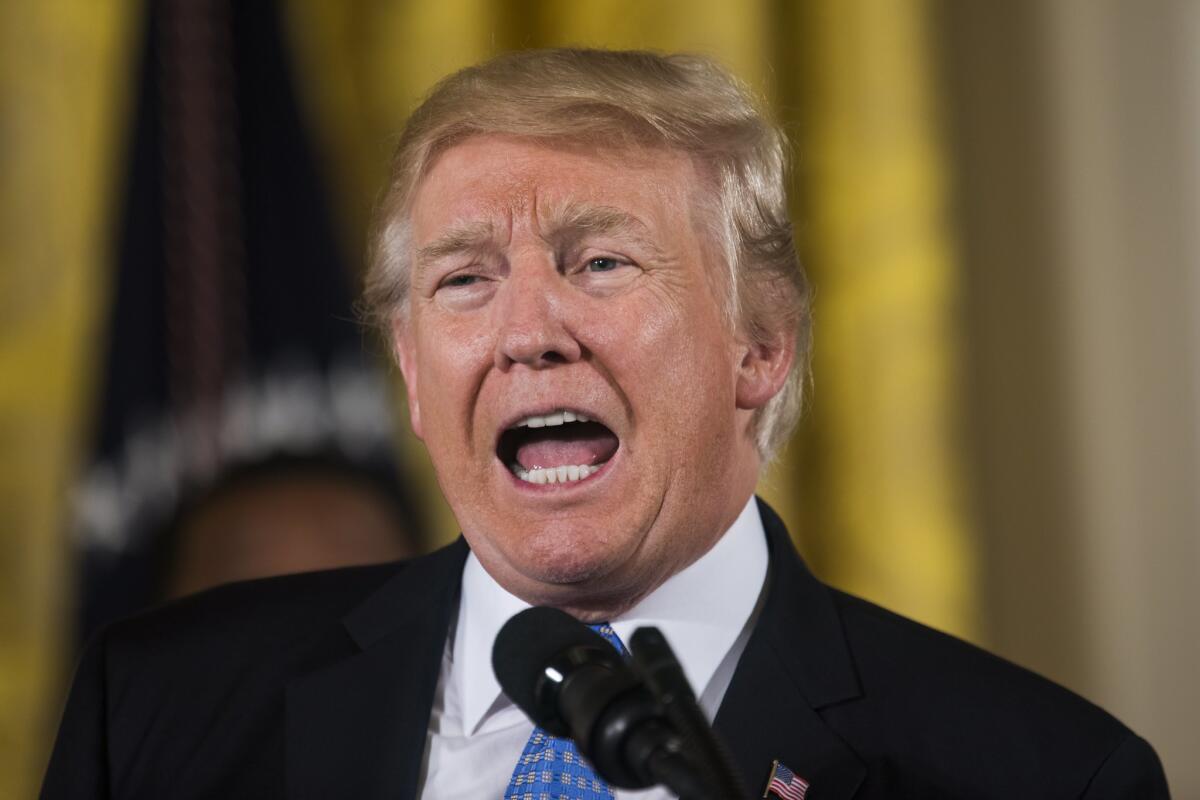
President Trump will sign a package of stiff financial sanctions against Russia that passed Congress with overwhelming support, the White House said Friday.
Moscow has already responded, ordering a reduction in the number of U.S. diplomats in Russia and closing the U.S. Embassy’s recreation retreat.
Trump’s willingness to support the measure is a remarkable acknowledgement that he has yet to sell his party on his hopes of forging a warmer relationship with Moscow. His vow to extend a hand of cooperation to Russian President Vladimir Putin has been met with resistance as skeptical lawmakers look to limit the president’s leeway to go easy on Moscow over its alleged meddling in the 2016 presidential election.
The Senate passed the bill, 98-2, two days after the House pushed the measure through by an overwhelming margin, 419-3. Both were veto-proof numbers.
The White House initially wavered on whether the president would sign the measure into law. But in a statement late Friday, Press Secretary Sarah Huckabee Sanders said Trump had ‚Äúreviewed the final version and, based on its responsiveness to his negotiations, approves the bill and intends to sign it.‚ÄĚ
Russia responds to sanctions bill by cutting U.S. diplomatic staff and seizing properties>>
The growing parade of exits under Trump administration
A lot of people have left President Trump‚Äôs early administration ‚ÄĒ Chief of Staff Reince Priebus was replaced Friday.
The White House communications department has been the scene of many of the recent turnovers as it wrestles to craft a message sometimes at odds with Trump’s frequent tweeting.
At the National Security Council, there has been a leadership struggle since Michael Flynn resigned in the face of pressure over undisclosed contacts with Russia. One appointee was fired over comments he made at a private function. Others have been removed as Flynn’s successor, H.R. McMaster, has moved to add loyalists to the council.
Here are the most noteworthy departures:
Trump urges officers and immigration officials to be ‚Äėrough‚Äô on ‚Äėanimals‚Äô terrorizing U.S. neighborhoods
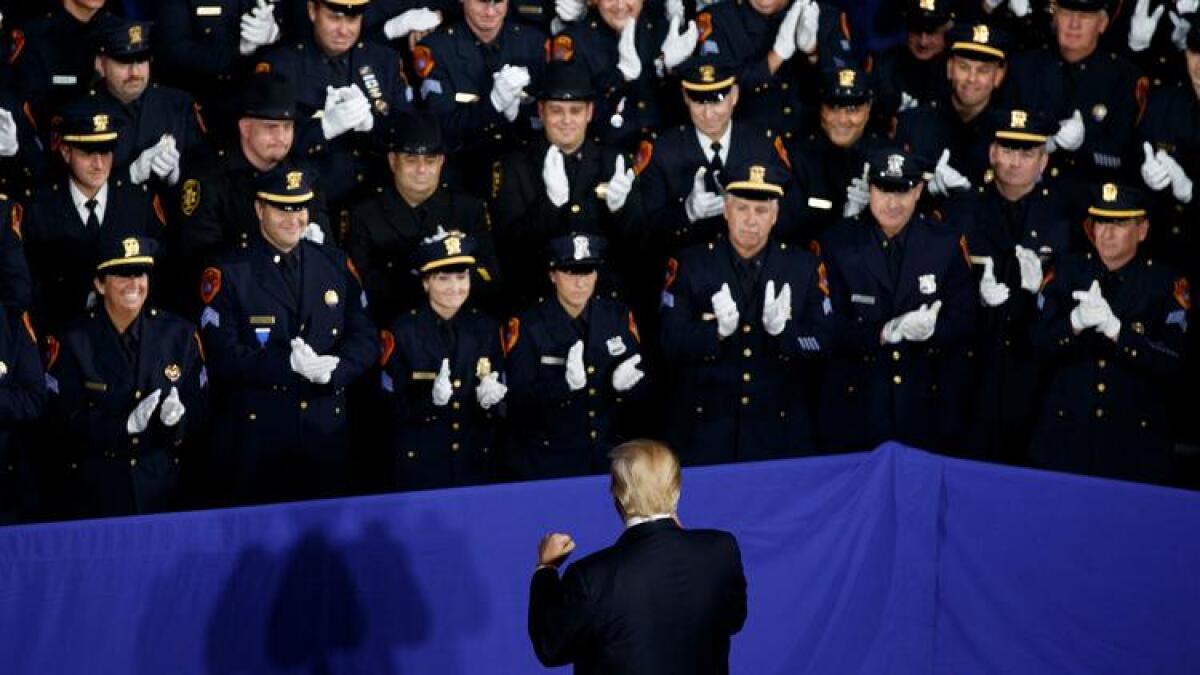
President Trump on Friday called for police and immigration officials to be ‚Äúrough‚ÄĚ with suspected gang members in order to rid the country of ‚Äúanimals‚ÄĚ he said are terrorizing communities.
‚ÄúPlease don‚Äôt be too nice,‚ÄĚ Trump told police recruits at Suffolk County Community College in Brentwood, a heavily Latino suburb of New York City. ‚ÄúLike when you guys put somebody in the car and you‚Äôre protecting their head, you know the way you put the hand ‚Ķ like, don‚Äôt hit their head, and they‚Äôve just killed somebody? ‚Ķ You can take the hand away.‚ÄĚ
He implied that he was satisfied with rough handling of suspects by the police. ‚ÄúWhen you see these thugs being thrown into the back of a paddy wagon ‚ÄĒ you just see them thrown in, rough,‚ÄĚ he said.
Scoffing at calls for what he describes as political correctness, Trump also renewed his pledges to build a wall along the Mexican border. He accused the Obama administration of admitting criminals into the United States.
Analysis: In a Washington run by men, two overshadowed Republican women make their point on healthcare
In a Washington that has grown demonstrably more testosterone-fueled since President Trump’s inauguration, it took two Republican women to secure the end of a long effort to repeal and replace Obamacare.
They were the same two women ‚ÄĒ Maine Sen. Susan Collins and Alaska Sen. Lisa Murkowski ‚ÄĒ who had been excluded from the 13-member working group drafting the Republican bills.
‚ÄúNobody‚Äôs being excluded based upon gender. Everybody‚Äôs at the table,‚ÄĚ Senate Majority Leader Mitch McConnell had said of his all-white-males group.
In the early hours of Friday, the duo was overshadowed by the more dramatic and unexpected no vote from Sen. John McCain of Arizona.
There was reason for the attention lavished on McCain ‚ÄĒ a war hero and veteran senator returns to the Capitol days after a dire cancer diagnosis. But without both Collins‚Äô and Murkowski‚Äôs steadfast opposition, his vote would have been meaningless.
Also largely overlooked: Hawaii Sen. Mazie Hirono, a Democrat who like McCain made an arduous trip to Washington despite her recent diagnosis of late-stage kidney cancer.
Social media buzzed Friday with praise for the women senators from many fronts, including from men. But from many women, there was also a sense of familiarity at being ignored or taken for granted.
Clinton Foundation donor who was denied a visa settles leak case against the U.S.
A billionaire Nigerian businessman and major Clinton Foundation donor banned from entering the U.S. two years ago on terrorism grounds has settled a lawsuit against the U.S. government.
Gilbert Chagoury last year sued the FBI and other government agencies in U.S. District Court in Washington, saying he had been damaged by what he described as improper government leaks to the Los Angeles Times.
The Times reported last year that Chagoury had been denied a visa to travel to the U.S. in 2015 on suspicion that he had provided aid to terrorist groups. One document, citing unverified information from an unnamed source, said that Chagoury ‚Äď who is of Lebanese heritage ‚Äď had funneled funds to Hezbollah, the Lebanese militia and political group designated a terrorist organization by the U.S.
Chagoury, an ardent Lakers fan who for decades lived part of the year in Los Angeles, angrily denied that he ever provided funds for terrorism. He said the publicity forced him to sell his Beverly Hills mansion at a loss and caused a bank to close his account.
A philanthropist, Vatican ambassador and longtime friend of Bill Clinton, Chagoury once was invited to the White House after contributing to a Democratic get-out-the-vote campaign. He donated at least $1 million to the Clinton Foundation.
Emails released last year showed that a Bill Clinton aide pushed Hillary Clinton’s aides at the State Department to get Chagoury access to top U.S. diplomats.
In the settlement filed in court on Friday, the Justice Department said Chagoury has never appeared on the list of Specially Designated Nationals, figures such as terrorists and narcotics traffickers who are generally barred from doing business in the U.S.
The government did not grant Chagoury’s request for a court hearing to dispute the reports that led to his exclusion from the U.S.
‚ÄúAs I have often said, I have loved America my whole life because it was the land of freedom and justice,‚ÄĚ he said in a statement, adding that he hopes the agreement will help repair his reputation.
The Justice Department did not immediately respond to a request for comment.
Chagoury, who lives most of the time in Paris, has not applied for another visa, said his spokesman, Mark Corallo.
Trump ousts Priebus, announces John Kelly as new chief of staff
President Trump announced via Twitter on Friday that he had named retired Gen. John Kelly, head of the Department of Homeland Security, as White House chief of staff, replacing Reince Priebus.
Rep. John Delaney of Maryland to run for president
Rep. John Delaney of Maryland says he’s running for president, instead of governor or reelection, in 2018.
Delaney, a Democrat, announced his plans in a statement Friday.
The politically moderate banking entrepreneur is in his third term in Maryland’s 6th Congressional District, which includes western Maryland and a large section of Montgomery County, the state’s largest county.
The 54-year-old is worth roughly $90 million and is one of the House’s wealthiest members. He spent about $2 million to help finance his first House race in 2012.
His consideration of a possible Maryland gubernatorial bid months ago quickly drew interest in his House seat. Several candidates already have expressed interest in running for the seat.
McCain set to head back to Arizona to undergo chemotherapy and radiation treatments
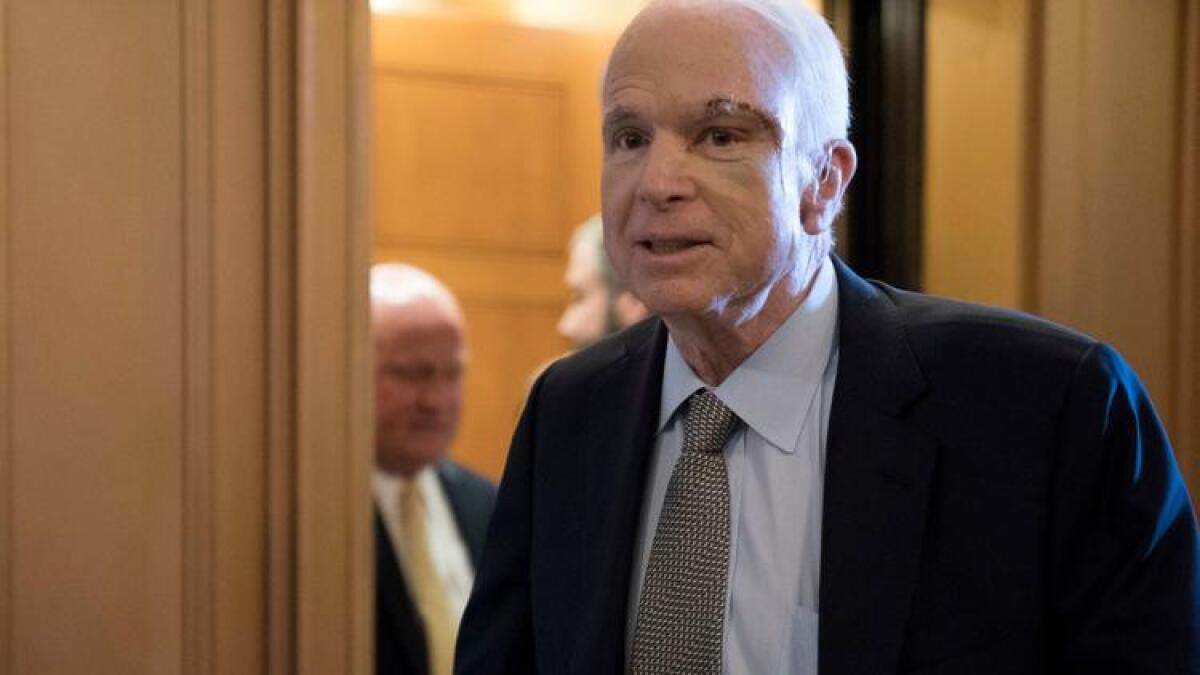
Sen. John McCain is headed home.
Hours after McCain spurned his party and voted in opposition to a GOP measure to repeal the Affordable Care Act, the senator’s office announced Friday he will return to Arizona to undergo chemotherapy and radiation treatments for his recent diagnosis of brain cancer.
McCain, 80, was found this month to have a brain tumor known as a glioblastoma. He is scheduled to return to Washington in September after his initial treatments.
The glioblastoma ‚Äď an aggressive type of cancer ‚Äď was discovered when McCain had a blood clot removed from above his left eye. According to the Mayo Clinic, which is overseeing McCain‚Äôs treatment, glioblastoma is difficult to treat.
After returning to Washington this week and voting in favor of opening Senate debate on repeal, McCain was among three Republicans early Friday morning to vote in opposition to a so-called skinny bill that would repeal the ACA, known as Obamacare. The move by McCain, who has served in the Senate since 1987, has drawn the ire of members in his own party and some in the right-wing media.
McCain’s surprise vote doomed GOP healthcare bill, but did it open the door for Senate bipartisanship?
Sen. John McCain is usually happy to spar with reporters, but he ducked into an elevator ahead of the Senate healthcare vote late Thursday without saying a word about how he would vote.
Senate Minority Leader Charles E. Schumer, though, already knew the answer.
The Democratic leader had been talking with the Arizona Republican all week ‚ÄĒ four, five times a day ‚ÄĒ ever since McCain returned to work after being diagnosed with brain cancer.
Earlier in the week, McCain had dramatically salvaged the stalled GOP bill by voting to begin debate, only to go on to deliver a blistering speech against his own party leaders’ partisan, closed-door process in crafting it.
‚ÄúWe‚Äôve been spinning our wheels on too many important issues because we keep trying to find a way to win without help from across the aisle,‚ÄĚ he told them. ‚ÄúWe‚Äôre getting nothing done.‚ÄĚ
Schumer and McCain have been longtime colleagues, a kind of frenemies who seem like throwbacks to an earlier era of Congress. They worked together on big legislation, including the 2013 immigration overhaul ‚ÄĒ grand ideas that seem all but impossible in today‚Äôs Congress.
They had plenty to discuss.
‚ÄúAbout the Senate, about it working again, about working together, and about how this bill was so poor for the American people,‚ÄĚ Schumer said.
‚ÄúAnd he knew that, so did half his colleagues, but he had the courage to vote no.‚ÄĚ
The moment stunned the Senate when McCain stepped up to cast his vote ‚ÄĒ a single down-turned finger ‚ÄĒ dooming the healthcare bill. Audible gasps filled the galleries, which were packed with onlookers.
But his vote ‚ÄĒ along with ‚Äúno‚ÄĚ votes from Republicans Susan Collins of Maine and Lisa Murkowski of Alaska ‚ÄĒ did more than shelve the long campaign to repeal the Affordable Care Act.
It cracked open a new divide in the Senate, which seems to be split not so much between Republicans and Democrats, but by those senators who want to work together versus those stuck in hardened partisan tribes.
U.S. hits Iran with more sanctions in response to satellite launch
The United States is slapping Iran with new sanctions in response to its launch of a satellite-carrying rocket into space this week.
The sanctions target six Iranian subsidiaries of the Shahid Hemmat Industrial Group. The Treasury Department says that group is ‚Äúcentral‚ÄĚ to Iran‚Äôs ballistic missile program.
Treasury Secretary Steven Mnuchin says the sanctions illustrate deep U.S. concerns about Iran‚Äôs missile testing and other actions. He says the U.S. will continue countering Iran‚Äôs ballistic missile program, including Thursday‚Äôs ‚Äúprovocative space launch.‚ÄĚ
The U.S. has said that launch flouted a U.N. Security Council resolution because the technology is inherently designed to be able to carry a nuclear payload.
The sanctions come as the Trump administration continues debating its Iran policy and whether to scrap the 2015 multilateral deal that limits the development of Iran’s nuclear capabilities.
Meet the two female GOP senators who opposed the healthcare bill from the start
Sen. John McCain shocked Republicans and Democrats alike with his vote early Friday morning to kill the latest Republican effort to repeal Obamacare.
But McCain was not the only Republican to play a role in blocking the final version of the overhaul bill.
Two female Republican lawmakers, Sens. Lisa Murkowski of Alaska and Sen. Susan Collins of Maine, also voted against the bill.
Collins has opposed repeal and replace efforts from the beginning, and Murkowski has also been critical of much of what the Senate Republican leadership has proposed.
Collins said it would be a ‚Äúbig mistake‚ÄĚ for Republicans to pass legislation without trying seriously to work with Democrats to reach bipartisan solutions. Instead, she called for both parties to work together to improve the healthcare system.
Murkowski and Collins were the first from their party to come out against repealing the ACA without having new, replacement legislation on the table.
In statements posted on Twitter, Collins, who voted against the same proposal in 2015, said she did not think it was ‚Äúconstructive‚ÄĚ to repeal the law without a replacement, while Murkowski encouraged senators from both sides of the aisle to work together to address healthcare issues.
The two senators were also the only Republicans to vote against opening debate on repeal of Obamacare earlier this week.
Their opposition to Republican healthcare efforts has drawn a lot of criticism within the party, some of it expressed in vulgar, even violent terms.
Georgia Rep. Buddy Carter said in an interview Wednesday with MSNBC: ‚ÄúSomebody needs to go over there to that Senate and snatch a knot in their ass.‚ÄĚ
A Texas congressman said the female senators narrowly avoided an ‚ÄúAaron Burr-style‚ÄĚ showdown with him.
President Trump publicly rebuked Murkowski on Twitter for her vote.
Trump has not criticized Collins by name for her vote, but warned Tuesday at a rally in Ohio that ‚Äúany senator who votes against repeal and replace is telling America that they are fine with the Obamacare nightmare, and I predict they‚Äôll have a lot of problems.‚ÄĚ
‚ÄėPolitical betrayal.‚Äô McCain vote against Obamacare repeal draws ire from conservative writers
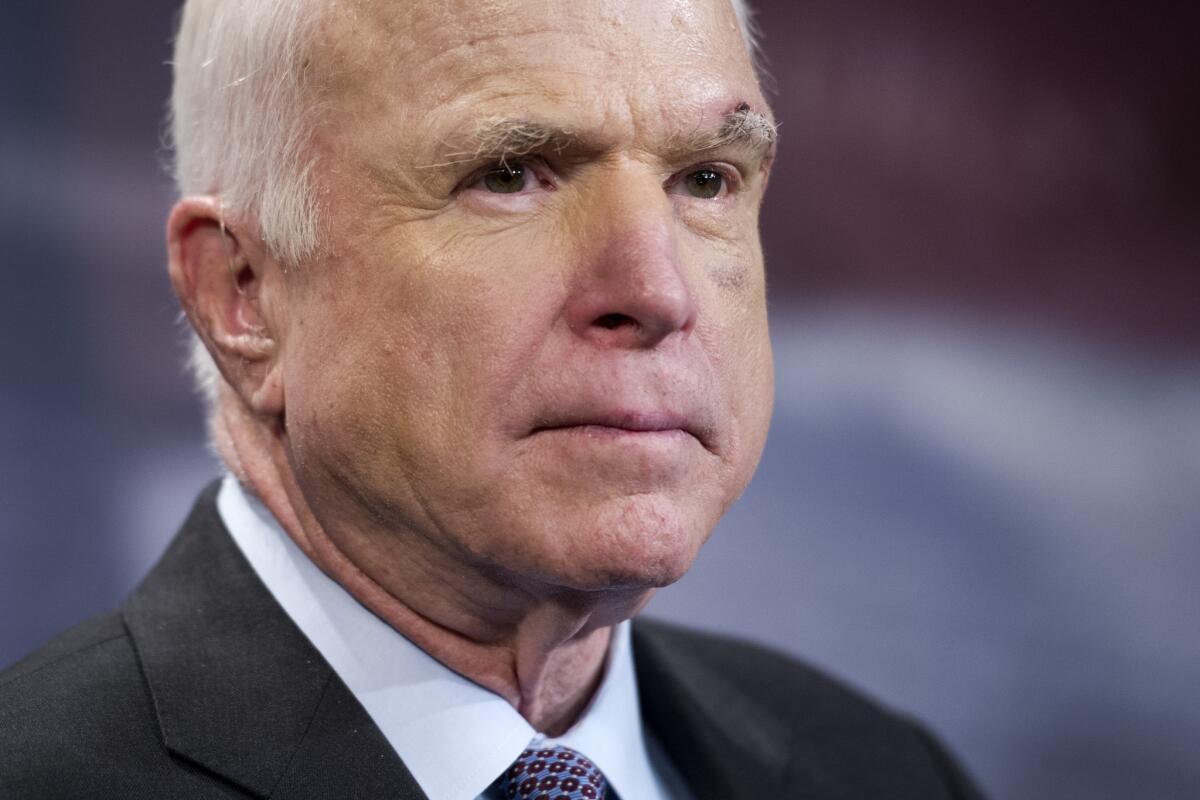
Though John McCain was one of three Republicans who helped Democrats squash the legislation to repeal Obamacare, conservative media is homing in on the Arizona senator for spurning his party in the healthcare vote.
Here are some of today’s headlines:
John McCain: Traitor to the conservative cause (Washington Times)
McCain, who was recently diagnosed with brain cancer, has been a staunch opponent of Obamacare, but in the end he could not support the so-called skinny repeal measure put forward by his colleagues in the Senate.
In this piece, Cheryl K. Chumley, jabs McCain for his vote.
‚ÄúFor American voters expecting their Republican-dominated House, Senate and White House to honor their years of repeal promises and actually, well, repeal Obamacare, McCain‚Äôs thumbs-down was a face-slap moment that will be remembered in history as a textbook classic case of political betrayal,‚ÄĚ she writes.
McCain‚Äôs odd definition of ‚Äėleading the fight to stop Obamacare‚Äô (National Review)
This article is simple ‚Äď it‚Äôs a quick compare-and-contrast of McCain‚Äôs recent comments versus his vote on Friday.
Last year, during a tough reelection, McCain‚Äôs campaign ran a television ad that boasted the senator is ‚Äúleading the fight to stop Obamacare.‚ÄĚ
But last night his office put out a statement noting the GOP Senate bill did not offer a ‚Äúreplacement to actually reform our health care system and deliver affordable, quality health care to our citizens.‚ÄĚ
The author of this piece, Jim Geraghty, concludes: ‚ÄúIt‚Äôs very difficult to characterize McCain‚Äôs decision as ‚Äėleading the fight to stop Obamacare.‚Äô That‚Äôs more like leading the fight to keep Obamacare in place while you continue to look for a replacement that you like better.‚ÄĚ
John McCain burns Mitch McConnell sides with Democrats (American Spectator)
When McConnell, the majority leader, stood on the Senate floor Friday after the bill’s failure, he was clearly annoyed.
McCain‚Äôs ‚Äúno‚ÄĚ vote had led to applause moments earlier from Democrats.
‚ÄúIn a move that‚Äôs no surprise to anyone, John McCain voted against the embarrassingly named ‚ÄėSkinny Repeal,‚Äô voted against his party (or is it his party?) and voted to keep Obamacare going as is,‚ÄĚ writes Melissa Mackenzie.
The current Senate GOP effort to repeal Obamacare is dead. Now what?
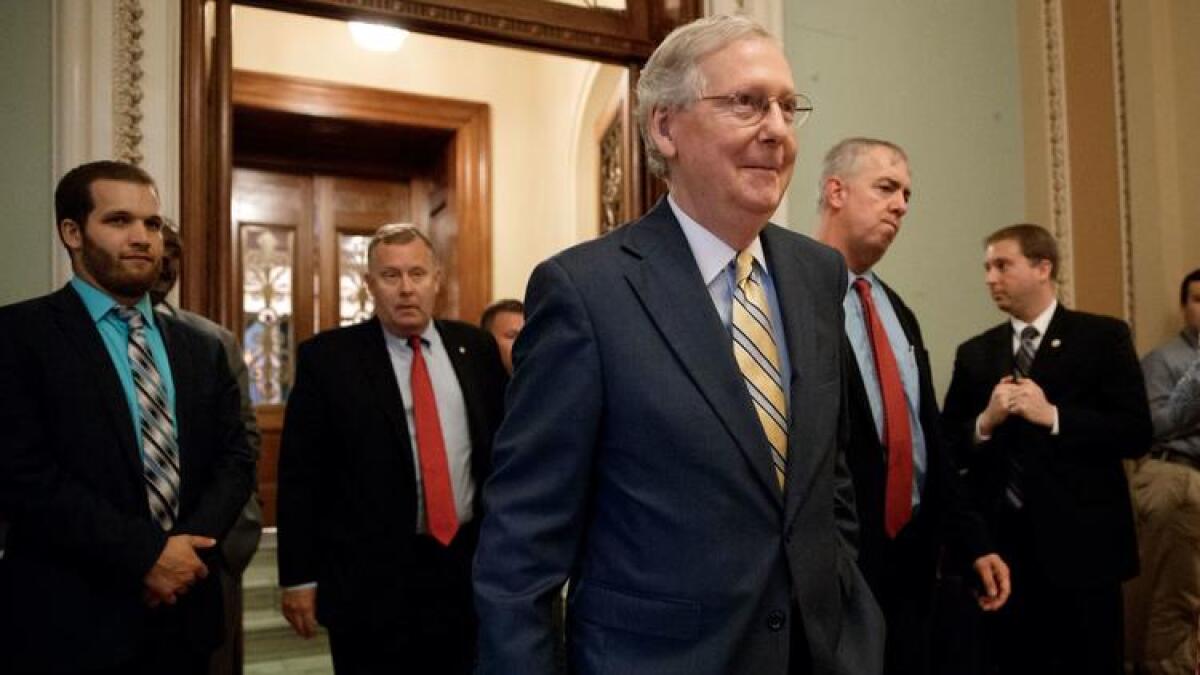
The sudden collapse of the GOP’s Senate campaign to repeal or replace the Affordable Care Act does not mean the issue disappears.
Significant problems and challenges remain, particularly for Obamacare insurance marketplaces.
The defeat increases the odds that Congress will begin to look at a more limited approach to shore up the current law and stabilize markets.
The GOP’s repeal effort may return, but in the meantime here’s a look at what a temporary fix might look like:
Paul Ryan responds to the failure of the GOP healthcare bill
House Speaker Paul Ryan said Friday that he‚Äôs ‚Äúdisappointed and frustrated‚ÄĚ by the failure of Republican healthcare legislation in the Senate.
But Ryan said in a statement that ‚Äúwe should not give up‚ÄĚ after promising for years to repeal and replace Obamacare.
‚ÄúWe were sent to Washington to fulfill the pledges we made to our constituents,‚ÄĚ the statement said. ‚ÄúWhile the House delivered a bill to repeal and replace Obamacare, unfortunately the Senate was unable to reach a consensus.‚ÄĚ
At the same time, the speaker said that overhauling the tax code is at the top of the House’s list of priorities.
He pledged to pursue ‚Äúhistoric tax reform‚ÄĚ in the fall.
He issued his statement as the House prepared to leave Washington for its annual August recess.
The House passed legislation repealing and replacing the Affordable Care Act in May. But after a failed vote early Friday in the Senate, it’s not clear if GOP leaders will be able to resuscitate the efforts.
Economic growth rebounded to 2.6% annual rate in second quarter

The U.S. economy rebounded this spring after a weak winter, expanding at a solid 2.6% annual rate as consumers picked up their spending pace, the Commerce Department said Friday.
Total economic output, also known as gross domestic product, for the April-through-June period was in line with analyst expectations for a bounce-back based in part on pent-up demand.
The economic growth rate was more than double the 1.2% pace in the first quarter. That figure was revised down Friday from an earlier estimate of 1.4%.
‚ÄúAfter the winter blues, the economy has rebounded,‚ÄĚ said Sung Won Sohn, an economist at Cal State Channel Islands.
Watch: The moment John McCain voted no on the healthcare bill
Never mind healthcare. President Trump has made slogans great again

His promise to repeal and replace Obamacare has crashed and burned. Tax reform hasn’t gotten far. The White House is in disarray, and big plans to rebuild the nation’s infrastructure have hit a brick wall.
But there is one unimpeachable triumph President Trump can point to: He‚Äôs made ‚Äúgreat again‚ÄĚ great again.
The ‚ÄúMake America Great Again‚ÄĚ 2016 campaign slogan ‚ÄĒ limned in block letters and emblazoned on countless cherry-red ball caps ‚ÄĒ has been reimagined, repurposed and cheekily appropriated for countless pitches and commercial products.
Apart from the now-familiar caps, mercantile options include aprons, beanies, beer cozys, coffee mugs, hoodies, leggings, swimsuits, T-shirts, water bottles and, for the special someone, ‚ÄúDonald Trump Make America Great Again Womens Booty Shorts.‚ÄĚ
But MAGA, as the president short-hands the phrase in Twitter posts, is also popping up in places having little or nothing to do with politics: on a catwalk at New York’s Fashion Week, high in the sky promoting classical music in Phoenix, on the menu at an Italian restaurant in Atlanta.
If Adam Schiff is California’s next U.S. senator, he might want to thank President Trump
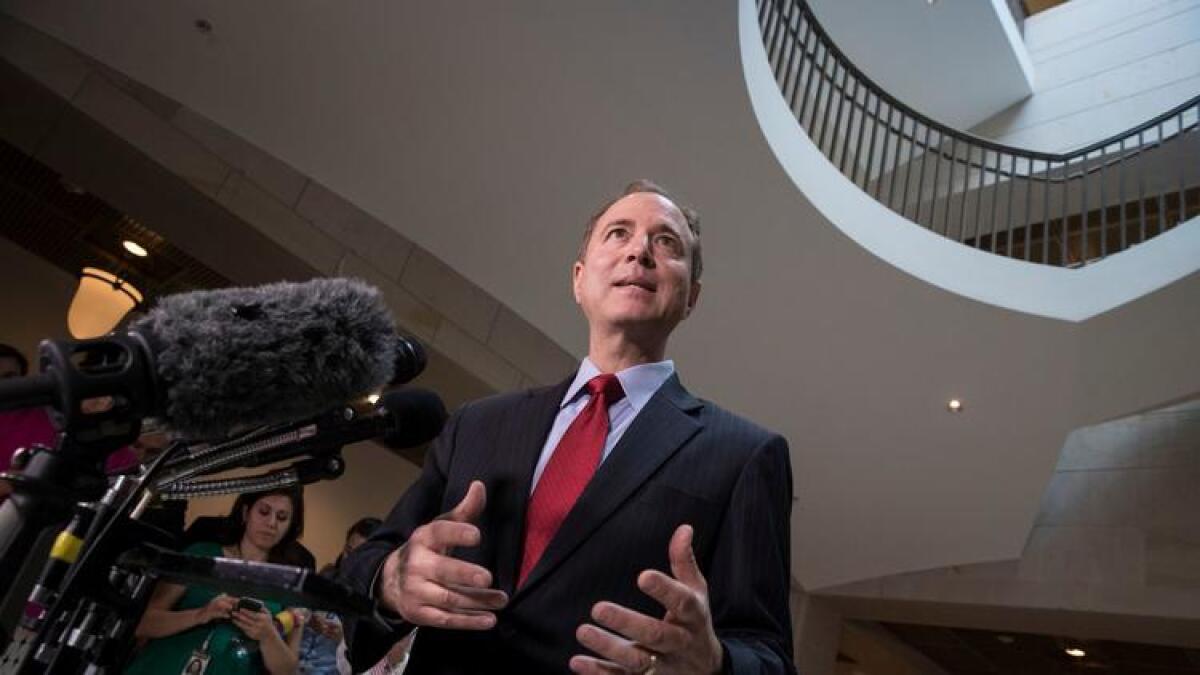
The road to elected office can be long and winding and is not always paved with the best of intentions.
Some politicians ‚ÄĒ think of the Kennedys or the Bush family ‚ÄĒ are born to the trade. Others are borne by tragedy.
Former Santa Barbara Rep. Lois Capps succeeded her husband when he died of a heart attack. Former New York Rep. Carolyn McCarthy was spurred to run when her husband was killed and her son gravely wounded in a mass shooting on the Long Island Rail Road.
Typically, though, the ascension is more methodical, one rung after the next, often with a pinch of right-place, right-time fortune thrown in for good measure.
Lately that bit of luck has visited itself on Adam B. Schiff, in the form of Russian meddling and a president who hurls tweets like poison thunderbolts.
Senate Republicans‚Äô ‚Äėskinny‚Äô repeal of Obamacare estimated to leave 16 million more people uninsured
Senate Republicans introduced their last-ditch effort to advance the GOP‚Äôs Obamacare repeal campaign late Thursday, a ‚Äúskinny‚ÄĚ bill they don‚Äôt want to become law but hope to use as a vehicle for further negotiations with the House.
The eight-page Health Care Freedom Act keeps much of the Affordable Care Act in place.
But it changes several features, including eliminating the requirement that Americans have health insurance.
According to the nonpartisan Congressional Budget Office, the new bill would leave 16 million more people uninsured over the next decade and increase insurance premiums by an average of 20% annually over the next decade.
In addition to the insurance mandate, the bill would also suspend a requirement that large employers provide insurance to their employees.
It would delay for three years a tax on medical device makers.
Additionally, the legislation would allow states greater flexibility to waive insurance rules in the current law.
And consumers would be able to sock more money away in health savings accounts to pay for insurance premiums.
The bill would restrict funding to Planned Parenthood by prohibiting federal money from going to clinics that provide abortion services, even for nonabortion-related services such as cancer screenings.
A vote on the measure -- which is fiercely opposed by patient advocates, physicians groups and health insurers -- was scheduled for later Thursday night.
‚ÄúThe Health Care Freedom Act repeals the core killers of Obamacare,‚ÄĚ said Senate Majority Leader Mitch McConnell (R-Ky.) in introducing the text.
But insurance industry officials, independent experts and even many GOP senators acknowledge that the bill would dramatically raise insurance premiums and erode coverage.
Four key Republicans, including Sen. John McCain (R-Ariz.) and Sen. Lindsey Graham (R-S.C.), refused initially to vote for it unless they had assurance that the House would never pass it into law.
House Speaker Paul D. Ryan (R-Wis.) issued a statement late Thursday assuring senators that the bill would serve as the intended vehicle for a conference committee that would then continue negotiating a broader overhaul.
8:17 p.m.: This post was updated with the CBO score.
Kris Kobach says Trump’s voter fraud panel will keep voter data secure. Some states aren’t buying it
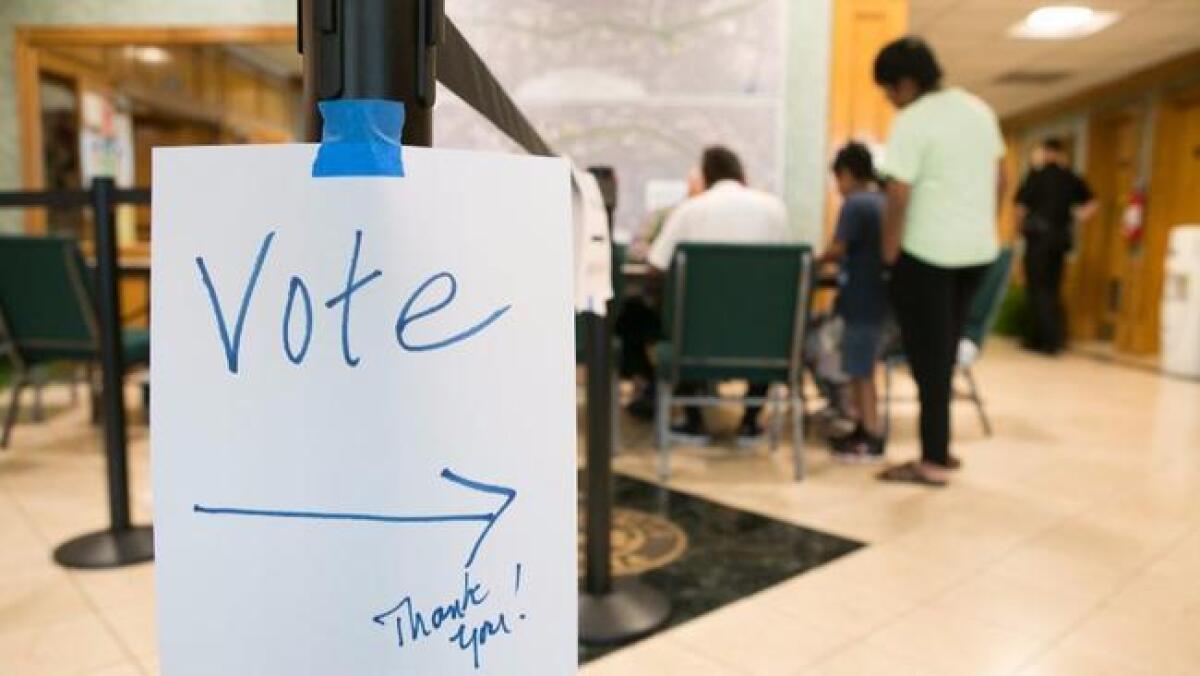
After weeks of legal battles and bipartisan pushback from top election officials nationwide, President Trump’s voter fraud commission has renewed a message for the states: It’s safe to pass along your data about voters.
‚ÄúIndividuals‚Äô voter registration records will be kept confidential and secure throughout the duration of the commission‚Äôs existence,‚ÄĚ Kris Kobach, vice chairman of the commission, wrote in a letter sent late Wednesday to all 50 secretaries of state.
Even so, by Thursday, much of the criticism that greeted an earlier request from the commission was repeated by election officials and activists, who have expressed concerns about privacy and have called the panel both a sham created by an insecure president and a tool to suppress votes.
Trump ‚ÄĒ without evidence ‚ÄĒ has repeatedly alleged that 3 million to 5 million illegal votes were cast in last year‚Äôs presidential election. (Trump prevailed in the electoral college, while Democrat Hillary Clinton won the popular vote by about 3 million votes.)
President Trump said ‚Äėour guys are rougher‚Äô than the violent gang MS-13. What did he mean?
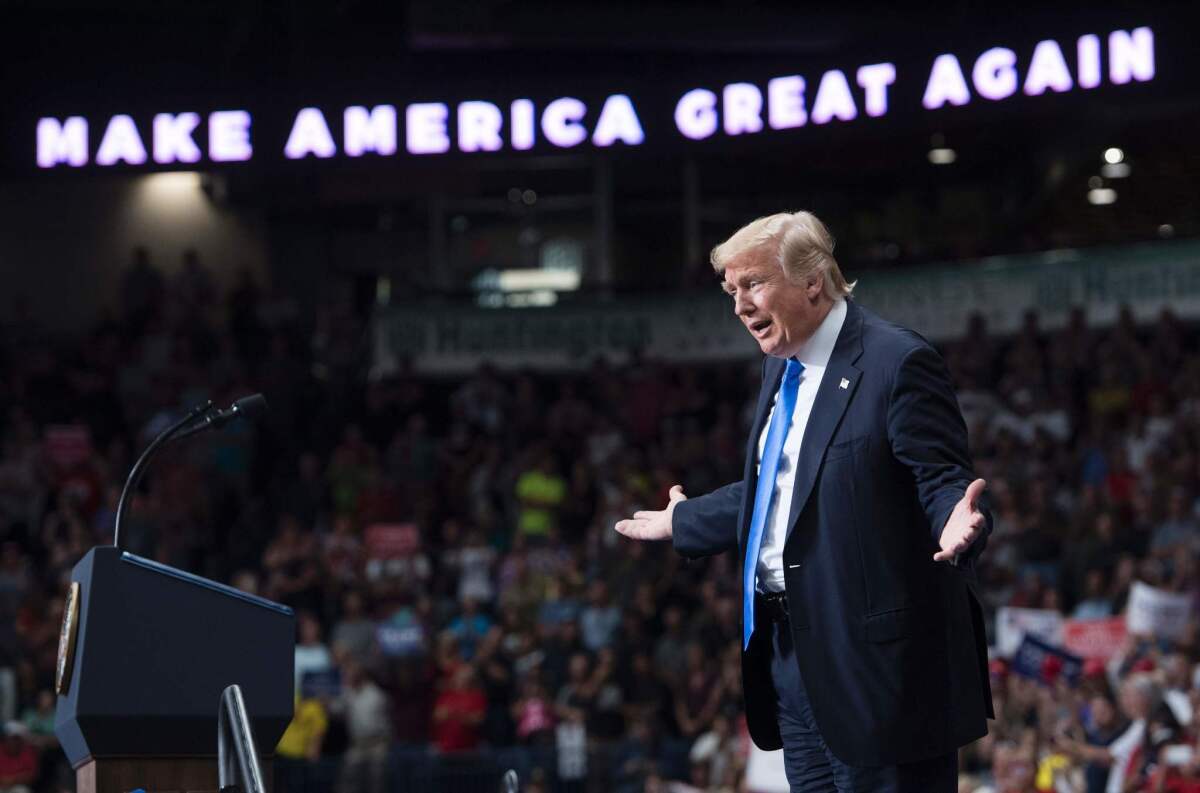
When President Trump said this week his administration is going after ‚Äúbloodthirsty‚ÄĚ criminal gangs like the notoriously violent MS-13, he added a menacing flourish: ‚ÄúOur guys are rougher than their guys.‚ÄĚ
The comment raised concerns that Trump was instructing immigration agents to use excessive force when going after suspected gang members.
Not so, Trump’s top spokeswoman said on Thursday.
‚ÄúI think the president means that our guys are going to do whatever it takes to protect Americans, protect American lives, protect our borders,‚ÄĚ White House Press Secretary Sarah Huckabee Sanders said in response to a question about what Trump meant by ‚Äúrougher.‚ÄĚ
Trump ‚Äúwants people to do their jobs, not go beyond the scope of what they should do,‚ÄĚ Sanders said.
Trump‚Äôs comment came during a rally in Youngstown, Ohio, on Tuesday night. ‚ÄúWe are throwing MS-13 the hell out of here so fast,‚ÄĚ he said, boasting that his administration is ‚Äúliberating‚ÄĚ towns and cities from gangs.
‚ÄúAnd, well, I will just tell you this, we‚Äôre not doing it in a politically correct fashion,‚ÄĚ Trump added. ‚ÄúWe‚Äôre doing it rough. Our guys are rougher than their guys.‚ÄĚ
Trump‚Äôs comment was meant to ‚Äúboost morale‚ÄĚ among immigration officers looking to arrest and deport gang members, said one senior administration official, who would speak only without being identified to discuss the president‚Äôs thinking.
As part of Trump’s crackdown on immigrants in the country illegally, he has instructed the U.S. Immigration and Customs Enforcement agency to target a suspected gang member for deportation before that person has been convicted of a crime, said ICE director Thomas Homan.
Homan joined Sanders at her daily briefing at the White House. The two spoke to preview the president’s Friday trip to Long Island, N.Y., where he will tout his administration’s efforts against MS-13 and other gangs.
For Trump, who grew up in Queens, recent headlines about MS-13 violence in central Long Island have hit close to home. In April, four young men were found hacked to death in a park in Central Islip, N.Y., a senior administration official told reporters Thursday night.
‚ÄúHe is a New Yorker and he knows New York,‚ÄĚ the administration official said. ‚ÄúIt is absolutely a personal issue. And he knows what‚Äôs happening in New York -- and it‚Äôs not just Long Island -- is a tragedy and there are communities like that all across America.‚ÄĚ
Boy Scouts chief apologizes for president‚Äôs ‚Äėpolitical rhetoric‚Äô at national Jamboree. Trump won‚Äôt
President Trump won’t apologize for a surprisingly political speech this week to Boy Scouts that provoked a backlash for his attacks on his predecessor, his election rival, dissident Republicans and the news media.
White House Press Secretary Sarah Huckabee Sanders delivered that word on Thursday, just after a top executive of the Boy Scouts of America issued an apology on behalf of the organization for allowing the ‚Äúpolitical rhetoric‚ÄĚ to occur during Trump‚Äôs address Monday evening at the National Scout Jamboree held in West Virginia.
Michael Surbaugh, the organization‚Äôs chief executive, in a statement extended his ‚Äúsincere apologies to those in our Scouting family who were offended by the political rhetoric that was inserted into the jamboree.‚ÄĚ
He noted that the group’s invitation to the president to speak was in keeping with a long-standing tradition since 1937; eight of 11 incumbent presidents have attended.
But, Surbaugh wrote, ‚Äúwe have steadfastly remained non-partisan and refused to comment on political matters. We sincerely regret that politics were inserted into the Scouting program.‚ÄĚ
At the White House, however, Sanders indicated that neither she nor Trump saw any reason to apologize, or considered his remarks in any way out of line.
‚ÄúI was at that event and I saw nothing but roughly 40,000 to 45,000 Boy Scouts cheering the president on throughout his remarks,‚ÄĚ Sanders said.
‚ÄúI think they were pretty excited that he was there and happy to hear him speak to them,‚ÄĚ she added.
Sanders said she had not seen the statement from the Boy Scouts chief.
During his rambling 38-minute speech to the Scouts in Glen Jean, W.Va., Trump criticized Hillary Clinton and President Obama and singled out congressional Republicans who were not in lockstep with him on healthcare.
He got much applause and supportive chants from his audience, and even credited the Scouts -- who are too young to vote -- for being among the millions who elected him. But almost immediately, the Boy Scouts organization was inundated with protests from former Scouts, parents and others angered by the president’s partisan words.
Trumps‚Äô words ‚Äėkind of hurtful,‚Äô Sessions says, but he has no plans to resign
President Trump‚Äôs scathing criticisms have been ‚Äúkind of hurtful,‚ÄĚ Atty. Gen. Jeff Sessions said Thursday, even as he again signaled that he wants to stay on the job.
‚ÄúHe wants all of us to do our job, and that‚Äôs what I intend to do,‚ÄĚ Sessions said in an interview with Tucker Carlson of Fox News.
Separately, Sessions told the Associated Press that ‚Äúit hasn‚Äôt been my best week ‚Ķ for my relationship with the president.‚ÄĚ He made the comment in El Salvador, during a visit to highlight joint efforts to take on the MS-13 gang.
The attorney general said he hadn’t met with Trump but looked forward to talking to him about it.
‚ÄúIf he wants to make a change, he has every right,‚ÄĚ Sessions said. ‚ÄúI serve at the pleasure of the president. I‚Äôve understood that from the day I took the job.‚ÄĚ
But, he said, ‚ÄúI believe with great confidence that I understand what is needed in the Department of Justice and what President Trump wants. I share his agenda.‚ÄĚ
The comments were the first this week on the subject from Sessions, who has been subjected to harshly critical tweets from Trump for three days. The president has called him ‚Äúweak‚ÄĚ and said he wasn‚Äôt aggressive enough in going after leakers.
Last week, after Trump criticized Sessions in a New York Times interview, Sessions told reporters he planned to stay on as long as it was ‚Äúappropriate.‚ÄĚ
Sessions has seemed to redouble his attempts this week to win back the president’s favor.
He announced another crackdown on so-called sanctuary cities that don’t cooperate with immigration enforcement and on Friday traveled to El Salvador to highlight arrests of MS-13 gang members, both favorite topics of the president.
The Justice Department also plans to address leaks next week. Sessions said his department was stepping up leak investigations.
‚ÄúSome people need to go to jail,‚ÄĚ he said. ‚ÄúThe president has every right to ask the DOJ to be more aggressive on that, and we intend to.‚ÄĚ
On Wednesday evening, after Anthony Scaramucci , Trump‚Äôs incoming communications director, falsely claimed in a tweet that he‚Äôd been the victim of a leak, Sessions‚Äô chief spokeswoman released a statement agreeing that leaks are undermining the government and promising to ‚Äúaggressively pursue leak cases wherever they may lead.‚ÄĚ
Trump has made it clear that he is most angry with Sessions for recusing himself from supervising the ongoing investigation into his administration’s ties with Russia. But Sessions defended that decision.
‚ÄúI understand his feeling about it because this has been a big distraction for him,‚ÄĚ he said on Fox.
‚ÄúI‚Äôm confident I made the right decision, the decision that‚Äôs consistent with the rule of law, and an attorney general who doesn‚Äôt follow the law is not very effective at leading the Department of Justice,‚ÄĚ he said.
In the interview, Sessions reached back to Trump‚Äôs campaign slogan to praise the president as a ‚Äústrong leader.‚ÄĚ
‚ÄúHe is determined to move this country in the direction that he believes it needs to go to make it great again,‚ÄĚ he said.
Sessions has received considerable support in recent days from conservative Republicans, including many of his former Senate colleagues.
On Thursday, Sen. Ben Sasse (R-Neb.) went to the Senate floor to discourage Trump from moving against Sessions, saying that the Senate would not allow the president to make a recess appointment that would bypass the normal confirmation process.
A recess appointment would allow Trump to appoint a person who could serve without confirmation until the start of 2019. Such appointments can only be made if the Senate formally takes a break, which senators of both parties have said they will avoid in order to prevent Trump from avoiding confirmations.
‚ÄúIf you‚Äôre thinking of making a recess appointment to push out the attorney general, forget about it,‚ÄĚ Sasse said. ‚ÄúThe presidency isn‚Äôt a bull, and this country isn‚Äôt a china shop.‚ÄĚ
1:55 p.m.: This post was updated with additional remarks by Sessions and remarks by Sen. Ben Sasse.
5:50: This post was updated with additional quotes from Sessions’ interview.
For Trump White House, cable television becomes the venue for intramural sniping
President Trump and his aides love to complain about leaks from within the White House. But on Thursday, the infighting was out in the open.
The incoming communications director, Anthony Scaramucci, in a morning phone call broadcast on CNN, compared the West Wing to a fish that ‚Äústinks from the head down,‚ÄĚ implying that White House Chief of Staff Reince Priebus is responsible for at least some of the leaks.
Later, Trump press secretary Sarah Huckabee Sanders declined to come to Priebus’s defense and say whether Trump has full confidence in his chief of staff.
Another Trump advisor, Kellyanne Conway, used a prison analogy for the broader backstabbing among aides, telling Fox News that her West Wing colleagues were using ‚Äúthe press to shiv each other.‚ÄĚ
While the knifings might suggest a new level of chaos in a White House known for it, the style is all Trump. As a businessman, he has a history of fostering rivalries among his employees.
‚ÄúHe always did sort of like competition, backstabbing, infighting kind of stuff,‚ÄĚ said Barbara Res, who spent nearly two decades as a top executive in Trump‚Äôs real estate business. ‚ÄúHe set people up to do that.‚ÄĚ
Trump led the charge this week, using his Twitter account and an interview with the Wall Street Journal to ridicule his attorney general, Jeff Sessions, one of Trump’s first and most prominent campaign supporters. By Thursday, both Priebus and Secretary of State Rex Tillerson were seeing their fates publicly debated, less than a week after Sean Spicer was forced out as press secretary after months of speculation and presidential slights.
The Priebus intrigue was amplified by Scaramucci on Twitter and in the CNN interview. He blamed Priebus for leaking Scaramucci’s personal financial disclosure forms -- which are publicly available -- and suggested that Trump encouraged Scaramucci’s offensive in a phone conversation the two men had just before the aide dialed into CNN.
When Sanders was asked about the Scaramucci-Priebus dustup, she said that the president likes ‚Äúhealthy competition‚ÄĚ on his staff.
‚ÄúThe president likes that kind of competition and encourages it,‚ÄĚ Sanders said.
The result is a White House that increasingly suggests the president‚Äôs former way of life. As the star of a reality TV show, he fomented internal competition and firings among apprentices; their cable television appearances, meanwhile, recall the ‚Äúconfessionals‚ÄĚ familiar to reality show fans, in which characters confide directly to the camera their anger or enmity toward others on the show.
‚ÄúThe primary attribute for a successful tenure in the Trump White House is masochism,‚ÄĚ tweeted Rick Wilson, a longtime Republican operative and Trump critic.
The repeated evidence of dysfunction and the high level of insecurity among Trump’s core aides help explain the White House’s inability to focus on its agenda.
Trump’s critics voiced suspicions on Twitter that the public staff blow-up was a deliberate distraction from the struggle in Congress to pass a healthcare bill, as well as from the ongoing investigations into potential collusion between his presidential campaign and Russia and the backlash to Trump’s surprise Twitter announcement on Wednesday that transgender people will be barred from military service.
But those issues also were being heavily covered on cable news. The stories that were overshadowed were those Trump was trying to promote: a deal his administration helped strike with Foxconn to build a production facility in Wisconsin, possibly creating thousands of new jobs, and nascent efforts to craft a tax overhaul plan.
Democrats criticize financial industry backgrounds of two Trump bank regulator nominees
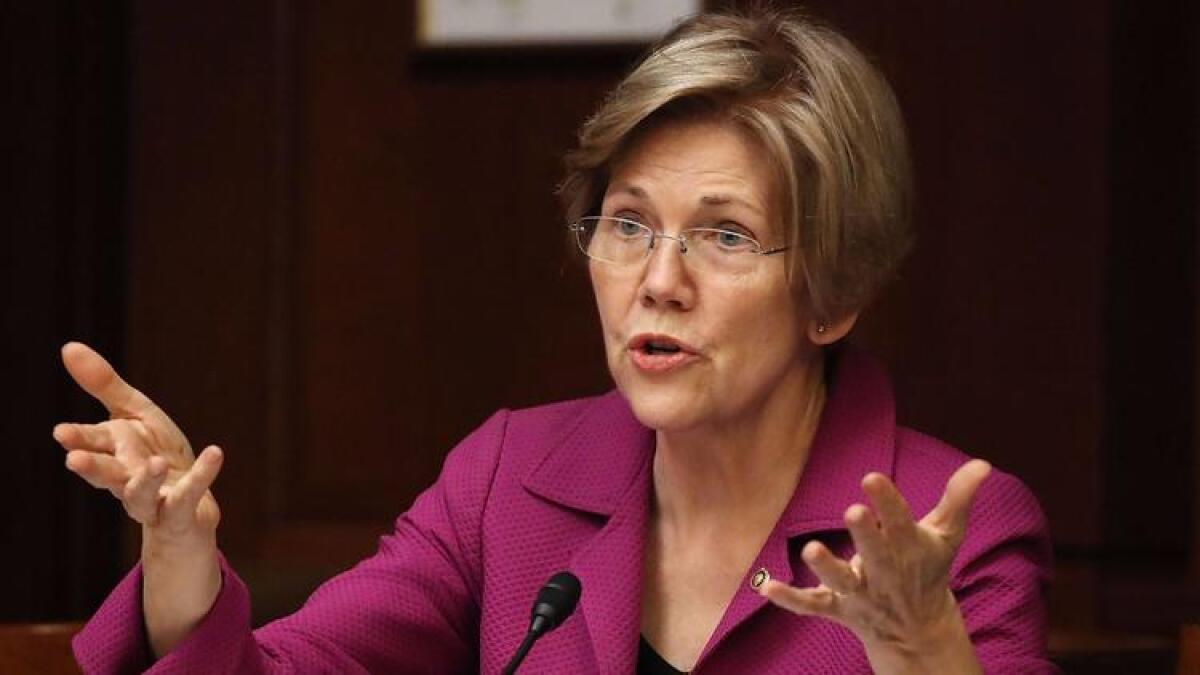
Senate Democrats on Thursday criticized the financial industry backgrounds of President Trump’s nominees for two key banking regulatory positions, arguing they would not protect the interests of average Americans.
Sens. Sherrod Brown (D-Ohio), Elizabeth Warren (D-Mass.) and others sharply questioned Joseph Otting, the former chief executive of Pasadena’s OneWest Bank, and investment fund manager Randal Quarles during a confirmation hearing by the Senate Banking Committee.
Trump nominated Otting to be the comptroller of the currency, a powerful regulator of national banks. Quarles has been tapped to be the Federal Reserve’s vice chairman for supervision, who is in charge of the Fed’s oversight of the nation’s largest bank holding companies and other regulatory efforts.
The two are expected to be friendlier to the banking industry than recent Democratic appointees.
Senator warns Trump there will be ‚Äúholy hell to pay‚ÄĚ if he fires Sessions
A prominent Republican Senator issued a blunt warning to President Trump not to interfere with the Russia investigation, saying any effort to get rid of special counsel Robert S. Mueller III could be ‚Äúthe beginning of the end of the Trump presidency.‚ÄĚ
Sen. Lindsey Graham, a member of the Senate Judiciary Committee, told reporters Thursday that ‚Äúthere will be holy hell to pay‚ÄĚ if Trump fires Atty. Gen. Jeff Sessions, a favorite of conservatives who represented Alabama in the Senate for 20 years.
Graham’s warning was the sternest yet from Senate Republicans to Trump about the potential consequences of firing either Sessions or Mueller.
The chairman of the Senate judiciary committee, Sen. Charles Grassley, (R-Iowa), issued his own warning in a tweet Wednesday night, saying his committee would not take up a nomination of a replacement attorney general this year, which is required before the Senate can vote to confirm.
Starting with an interview in the New York Times last week and continuing with a three-day barrage of critical tweets, Trump has raged at Sessions for his decision to recuse himself from supervising the investigation into the Russian attempts to influence the election, and into whether anybody involved in Trump’s campaign participated in the scheme.
Trump also has bitterly complained about Mueller, whom he has accused of leading a ‚Äúwitch hunt,‚ÄĚ and Deputy Atty. Gen. Rod J. Rosenstein, who appointed Mueller and who is now supervising the probe.
Justice Department regulations say that only the attorney general, or in this case Rosenstein acting in his place, can fire the special counsel. If Sessions were gone, Trump could try to appoint a replacement willing to carry out the firing.
Graham said he will introduce a bill next week that would require court review if anyone tried to fire a special counsel who was investigating the president.
‚ÄúI think I‚Äôll get all the Democrats and I hope to get a good number of Republicans,‚ÄĚ he said, adding that the enacting such a law is ‚Äúnot just for Trump but for any future president. We need a check and balance here.‚ÄĚ
Graham said Trump‚Äôs campaign to ‚Äúmarginalize and humiliate the attorney general is not going over well in the Senate‚ÄĚ or among conservatives.
He also said Trump, who has called on Sessions to investigate his former rival Hillary Clinton, has gone ‚Äúway beyond what is acceptable in a rule of law nation.‚ÄĚ
‚ÄúThis is not draining the swamp,‚ÄĚ he said. ‚ÄúWhat he‚Äôs interjecting is turning democracy upside down‚Ķ..taking 200-year-old concepts that we‚Äôre a nation of laws and not men and trying to turn it upside down.‚ÄĚ
Watch live: White House news briefing with Press Secretary Sarah Huckabee Sanders
Trump administration threatens to retaliate against Alaska for GOP senator’s Obamacare repeal vote, news site reports
The Trump administration threatened to block federal aid to Alaska in an effort to bully one of the Republican senators opposed to the current Senate GOP push to roll back the Affordable Care Act, according to a report by the Alaska Dispatch News.
The news site reports that Interior Secretary Ryan Zinke on Wednesday called Alaska Sens. Lisa Murkowski and Dan Sullivan with a warning that Murkowski‚Äôs vote ‚Äúhad put Alaska‚Äôs future with the administration in jeopardy.‚ÄĚ
According to the report:
Sullivan said the call from Zinke heralded a ‚Äútroubling message.‚ÄĚ
‚ÄúI‚Äôm not going to go into the details, but I fear that the strong economic growth, pro-energy, pro-mining, pro-jobs and personnel from Alaska who are part of those policies are going to stop,‚ÄĚ Sullivan said.
‚ÄúI tried to push back on behalf of all Alaskans. ‚Ķ We‚Äôre facing some difficult times and there‚Äôs a lot of enthusiasm for the policies that Secretary Zinke and the president have been talking about with regard to our economy. But the message was pretty clear,‚ÄĚ Sullivan said.
The threat followed disparaging comments made by the president about Murkowski, including a Twitter attack Wednesday morning
‚ÄúSenator @lisamurkowski of the Great State of Alaska really let the Republicans, and our country, down yesterday. Too bad!‚ÄĚ Trump wrote.
Murkowski dismissed the president’s attacks in an interview with MSNBC.
‚ÄúWe‚Äôre here to govern. We‚Äôre here to legislate,‚ÄĚ she said. ‚ÄúWe‚Äôre here to represent the people who sent us here. And so every day shouldn‚Äôt be about campaigning. Every day shouldn‚Äôt be about winning elections. How about just doing a little bit of governing around here? That‚Äôs what I‚Äôm here for.‚ÄĚ
Murkowski and Maine Sen. Susan Collins were the only Republicans who voted against a procedural motion Tuesday to begin debating legislation rolling back the 2010 healthcare law, often called Obamacare.
Sullivan, also a Republican, voted in favor of advancing the bill.
Murkowski has urged a more open process to develop the legislation, which Senate Majority Leader Mitch McConnell (R-Ky) has put together behind closed doors without committee hearings or input from Democrats.
A spokeswoman for Zinke did not immediately respond to a request for comment.
Iran angered by report that Trump wants additional nuclear inspections
Iran responded angrily Thursday to reports that the Trump administration would push for inspections of military facilities to ensure Tehran is complying with the 2015 nuclear deal.
‚ÄúIran will not succumb to further pressure,‚ÄĚ Hamid Reza Taraghi, a hard-line analyst who is close to Iran‚Äôs leadership, told The Times.
Taraghi did not say whether Iran would refuse inspectors access to military facilities but insisted the Islamic Republic was complying with the agreement, which required Iran to shelve its nuclear program in exchange for relief from economic sanctions.
President Trump has said he wants to tear up the deal and doesn’t believe Iran is complying, although his administration certified it was in a report to Congress this month.
The Associated Press reported Thursday that Trump was pushing for inspections of ‚Äúsuspicious Iranian military sites,‚ÄĚ either to prove that Iran was violating the deal or force it to refuse, which could cause the agreement to collapse.
Iranian officials have argued in the past that inspections of military sites would be off-limits. But under the agreement it signed with the United States and five other world powers, Iran agreed to the so-called Additional Protocol, which allows U.N. inspectors limited access to any site where illicit nuclear activity is suspected.
Taraghi, a former lawmaker, said the Additional Protocol allowed for snap inspections and that international inspectors had installed closed-circuit cameras in all nuclear-related facilities.
‚ÄúThey have access to everything going on here on the ground,‚ÄĚ Taraghi said. ‚ÄúWhat else do they want to know?‚ÄĚ
It was not immediately clear what military sites the Trump administration was seeking to have inspected, or whether it had evidence that Iran was breaching the terms of the deal.
U.N. inspectors monitoring Iran’s compliance had not requested access to military facilities as of July 25, according to a paper published Thursday by Mark Fitzpatrick, executive director of the International Institute for Strategic Studies in Washington.
‚ÄúIf US has good evidence of #Iran violations, then an inspection request is warranted,‚ÄĚ Fitzpatrick tweeted. ‚ÄúA request designed to trap Iran into saying no isn‚Äôt.‚ÄĚ
Top U.S. general says Pentagon will not change policy on transgender troops until White House acts
The nation‚Äôs senior military officer said Thursday that there will be ‚Äúno modifications‚ÄĚ to Pentagon policies for now despite President Trump social media posts declaring a ban on transgender troops in uniform.
Marine Gen. Joseph Dunford, chairman of the Joint Chiefs of Staff, wrote in a memo to commanders and senior enlisted leaders of the Army, Navy, Air Force and Marines that the military will continue to ‚Äútreat all of our personnel with respect.‚ÄĚ
Dunford said Pentagon policy on transgender troops would not change until the White House has issued Trump‚Äôs directive to Secretary of Defense James Mattis through formal channels ‚ÄĒ not on Twitter ‚ÄĒ and the secretary‚Äôs office issues guidance on implementation to the service chiefs. It‚Äôs unclear when that might happen.
The unusual memo appeared intended to calm widespread confusion and concern at the Pentagon, which was blindsided when Trump wrote Wednesday that Pentagon would not ‚Äúaccept or allow‚ÄĚ transgender troops to serve ‚Äúin any capacity.‚ÄĚ
The president’s posts appeared to reverse a year-old Pentagon policy that allowed transgender soldiers to openly serve for the first time, and to seek sex reassignment surgery, hormone therapy and other treatments at military hospitals.
Trump’s surprise announcement not only marked a retreat for the Pentagon push to bar gender-based discrimination. It also was an about-face for Trump, who had repeatedly vowed his support for the LGBT community during the campaign last year.
The posts raised questions about the fate of thousands of transgender service members, including some deployed overseas, and whether they would be kicked out of the military under Trump’s directive.
Dunford’s memo appeared to address those fears, at least for the short term.
‚ÄúThere will be no modifications to the current policy until the President‚Äôs direction has been received by the Secretary of Defense and the Secretary has issued implementation guidance,‚ÄĚ he wrote.
‚ÄúIn the meantime, we will continue to treat all of our personnel with respect,‚ÄĚ he added. ‚ÄúAs importantly, given the current fight and the challenges we face, we will all remain focused on accomplishing our assigned missions.‚ÄĚ
In his tweets, Trump said he had decided to bar transgender troops because the military ‚Äúcannot be burdened with the tremendous medical costs and disruption that transgender in the military would entail.‚ÄĚ
Experts said neither justification was accurate or fair since the expected medical costs were negligible and transgender troops have been openly serving for the past year without disruption.
The sweeping declaration drew rebuke from war veterans and lesbian, gay, bisexual and transgender advocacy groups, who vowed to challenge Trump in federal court if self-identified transgender service members are forced out of the military.
VoteVets, a liberal military veterans advocacy group, said Thursday it had collected more than 20,000 signatures from veterans, military families and other supporters to oppose the ban.
Analysis: Trump’s war against elites and expertise
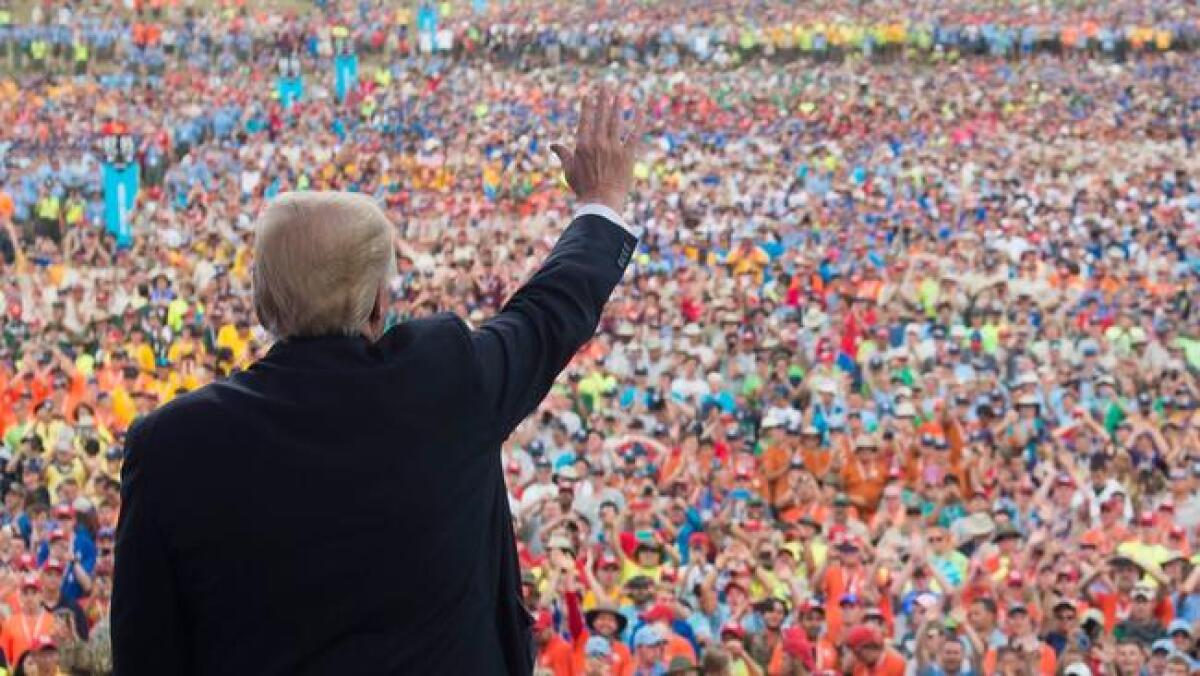
When President Trump campaigned this spring at the Hermitage, the home of Andrew Jackson, one part of his predecessor’s approach got a special endorsement.
‚ÄúIt was during the Revolution that Jackson first confronted and defied an arrogant elite. Does that sound familiar?‚ÄĚ Trump asked to laughs from his audience.
When Trump ally and National Rifle Assn. President Wayne LaPierre teed off six weeks later on America‚Äôs greatest domestic threats, he cited not homegrown terrorists but what he termed ‚Äúthe three most dangerous voices in America: academic elites, political elites, and media elites.‚ÄĚ
The rhetoric against elites came from two men who would seem to be card-carrying members of the club: LaPierre made more than $5 million in 2015, the most recent year for which his compensation was publicly released. Trump lived before his inauguration in a gold-plated home in the sky above New York’s Fifth Avenue, a billionaire’s luxurious domain.
Yet for Trump and his allies, a war on elites has been central to the campaign which put him in the presidency and has maintained the loyalty of his core voters. Trump has taken particular aim at entities that could counter his power, which has helped stoke the ardor of his political backers.
Top Trump advisor Kellyanne Conway says colleagues ‚Äėusing the press to shiv each other‚Äô
White House staffers continued their angry campaign against leaks -- and each other -- as top advisor Kellyanne Conway used vivid language in a Fox interview Thursday to denounce colleagues who are ‚Äúusing the press to shiv each other in the ribs.‚ÄĚ
The comments came shortly after Anthony Scaramucci, the new White House communications director, delivered his own attack on leakers -- all but blaming Reince Priebus, the White House chief of staff -- in an interview on CNN.
If the Trump White House at times resembles a reality show, cable television has become the confessional booth where the players vent their anger at each other. That dynamic was on vivid display Thursday morning.
Conway largely backed Scaramucci without explicitly taking sides in his public war against Priebus, whom he publicly suggested leaked Scaramucci’s financial disclosure forms to the press. The forms are public and available through a request.
‚ÄúWe just have to cut down on people thinking it‚Äôs cute and it‚Äôs popular and it somehow enhances their resume and their portfolio for later on to curry favor with folks who are more interested in covering the style and not the substance here,‚ÄĚ Conway said of those who leak to he press.
Asked specifically whether she agrees with Scaramucci that Priebus leaked the financial forms, Conway passed on the opportunity to defend Priebus.
‚ÄúLeakers are easier to figure out than many think,‚ÄĚ she said, perhaps ominously given Scaramucci‚Äôs threats to fire suspects. ‚ÄúThis West Wing is a very small place.‚ÄĚ
Warfare in the West Wing breaks into the open as Scaramucci takes aim at Priebus
A knife fight for control of the West Wing broke into the open Thursday morning as President Trump’s new communications director Anthony Scaramucci lashed out at White House Chief of Staff Reince Priebus in a televised interview, accusing Priebus of leaking and standing in the way of Trump’s agenda.
‚ÄúThe fish stinks from the head down, I can tell you two fish that don‚Äôt stink, OK, and that‚Äôs me and the president,‚ÄĚ Scaramucci said, calling in to CNN‚Äôs morning show ‚ÄúNew Day.‚ÄĚ
‚ÄúI don‚Äôt like the activity that‚Äôs going in the White House,‚ÄĚ he said.
Scaramucci, who had said the day he was named to the White House job that he and Priebus were like brothers, drastically amended that in the interview, comparing the two of them to the brothers who, in the Bible, were the characters in the first murder.
‚ÄúSome brothers are like Cain and Abel, other brothers can fight with each other and get along. I don‚Äôt know if this is reparable or not ‚ÄĒ that will be up to the president,‚ÄĚ he said.
President Trump has a track record of encouraging rivalries among people who work for him. Scaramucci said he had spoken with Trump for 15 minutes to go over what he was going to say before he called CNN, implying his warning to Priebus carried Trump’s backing.
Trump, Scaramucci said, ‚Äúhas given me his full support and his full blessing.‚ÄĚ
When Scaramucci was hired, Trump told him he would report directly to the president, bypassing the chief of staff, and setting up the clash that played out Thursday on national television.
‚ÄúIf you want to talk about the chief of staff, we have had odds, we have had differences. When I said we were brothers from the podium, that‚Äôs because we‚Äôre rough on each other,‚ÄĚ Scaramucci said.
The tension between Scaramucci and Priebus flared after Politico published a story Wednesday about Scaramucci’s publicly available financial disclosure form showing he still stands to profit from his stake in an investment firm he founded.
The disclosure form was available to the public because Scaramucci had been nominated earlier this year for a job at the Export-Import Bank of the U.S., and the forms become public 30 days after they are filed.
But Scaramucci, in a tweet Wednesday night, seemed to imply Priebus had leaked the form to make him look bad, or knew who did, and called for an FBI investigation. He later deleted the tweet, apparently after being informed that the form was not leaked.
Over the last five days, Scaramucci said to CNN, he has done ‚Äúa major amount of work‚ÄĚ interviewing assistants to the president and communications staff. He also had dinner with Trump on Wednesday night in addition to his phone conversation with the president Thursday morning.
The two of them want everyone to know ‚Äúwe have a very, very good idea of who the leakers are, who the senior leakers are, in the White House,‚ÄĚ he said.
Scaramucci took aim specifically at Priebus for leaking details about internal White House discussions and maneuvers.
‚ÄúIf Reince wants to explain that he‚Äôs not a leaker, let him do that,‚ÄĚ Scaramucci said.
Scaramucci appears to be giving voice to Trump’s frustration with people in the White House the president believes are slowing down policy efforts, even though Trump has shown a pattern of repeatedly stepping on his own efforts on healthcare, job creation and other initiatives with unplanned tweets on topics such as Russia, transgender troops and unfounded allegations of voter fraud.
‚ÄúThere are people inside this administration who think it‚Äôs their job to save America from this president,‚ÄĚ Scaramucci said. ‚ÄúIt‚Äôs not their jobs ... to rein him in or do things to him that slow down his agenda.‚ÄĚ
People in the Washington are back-stabbers, Scaramucci said.
‚ÄúI‚Äôm more of a front-stabbing person.‚ÄĚ
Scaramucci tweets, then deletes, confusing statement that referred to information in Politico report as a ‚Äėleak‚Äô
In a now deleted tweet, incoming White House communications director Anthony Scaramucci sent out a confusing statement Wednesday night, addressing information reported earlier by Politico as a ‚Äúleak.‚ÄĚ The article reported on Scaramucci‚Äôs financial disclosures. According to Politico, those details had been filed with the Office of Government Ethics, so it‚Äôs unclear what ‚Äď if anything ‚Äď was leaked information.
Scaramucci’s tweet further confused as it ended with White House Chief of Staff Reince Priebus’ Twitter handle. Just before those characters, he noted that he intended to contact the FBI and the Justice Department. Some speculated that Scaramucci was implying that Priebus was behind the leak.
But in a new tweet roughly two hours after the original, he tweeted what appeared to be a clarification, correcting a headline of news site Axios. ‚ÄúWrong! Tweet was public notice to leakers that all Sr Adm officials are helping to end illegal leaks,‚ÄĚ he tweeted, ending it ‚Äď once again ‚Äď with Priebus‚Äô handle.
Five days ago, Scaramucci, responding to a question about reported tensions between him and the chief of staff, said he and Priebus ‚Äúare a little bit like brothers, where we rough each other up a little, which is totally normal for brothers.‚ÄĚ
10:15 p.m. PT: This post was originally published at 8:52 p.m. It was updated with information from Scaramucci’s new tweet.
Senate Judiciary chair fires off warning to Trump about Sessions
Sen. Charles E. Grassley (R-Iowa), the chairman of the Senate Judiciary Committee, fired off an unmistakable warning to President Trump on Wednesday evening: Don’t even think about trying to get a new attorney general confirmed this year.
Trump has been publicly tormenting Jeff Sessions, appearing to want to push the attorney general into stepping down from his job. But in a tweet, Grassley made it clear that if Trump pushed Sessions out, he would have to live with an acting attorney general for a long time.
Any nominee for attorney general would have to pass through the Judiciary Committee before getting a confirmation vote, so Grassley‚Äôs ‚Äúno way‚ÄĚ would be a formidable barrier.
Grassley has been an administration loyalist on nearly all issues so far, but as a veteran senator, he has a strong independent streak and, as previous administrations have found, he can be implacable if angered.
His message comes as conservative allies rally support for Sessions. Several other Republican senators have spoken out in favor of the attorney general, a former colleague who was well liked during his years as senator from Alabama.
Senate Democrats already have said they would use procedural motions to prevent the Senate from formally going on a recess this summer, blocking Trump from making a recess appointment that would bypass the Senate. Republicans used similar maneuvers to block recess appointments by President Obama.
If Sessions were to step down and not be replaced, Deputy Atty. Gen. Rod Rosenstein would become acting attorney general. Trump has been critical of Rosenstein as well as Sessions, so that option presumably would not appeal to him.
Under fire from Trump, Sessions should ‚Äėstay focused‚Äô on his job, White House says
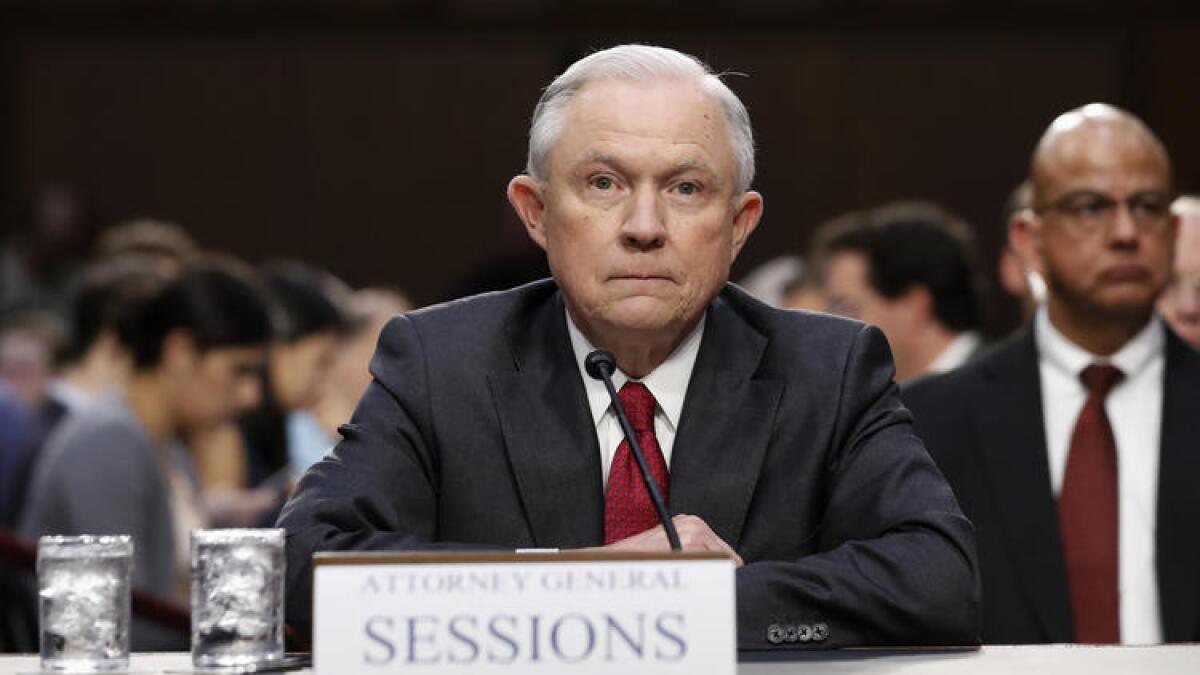
In spite of a daily barrage of Twitter attacks from President Trump, the White House press secretary said Wednesday that Atty. Gen. Jeff Sessions should ‚Äústay focused‚ÄĚ on performing his duties as the nation‚Äôs top law enforcement officer.
‚ÄúYou can be disappointed in someone and still want someone to continue to do their job,‚ÄĚ Sarah Huckabee Sanders said Wednesday, hours after Trump criticized Sessions for the third straight day ‚Äď this time for not replacing acting FBI Director Andrew McCabe.
Sessions was one of Trump’s earliest and most loyal supporters, but the relationship has turned icy as Trump continues to seethe about Sessions’ decision to step aside from supervising the investigation into alleged Russian interference with last year’s election.
Sessions was at the White House for meetings Wednesday, the second time this week he’s visited the West Wing, but once again did not see Trump, Sanders said.
Sanders did not clear up the main question surrounding Trump’s strategy of publicly battering the attorney general: If the president is so unhappy, why doesn’t he simply fire Sessions?
Sen. Lindsey Graham (R-S.C.) said Wednesday that Trump‚Äôs apparent attempt to humiliate Sessions into quitting was ‚Äúa sign of weakness.‚ÄĚ
‚ÄúTo me, weakness is when you play around the edges, and you don‚Äôt use the power you have,‚ÄĚ Graham said in an interview on CNN.
Sanders said that Trump wants Sessions to continue to ‚Äúlead the Department of Justice.‚ÄĚ
‚ÄúHe wants him to focus on things like immigration, leaks and a number of other issues,‚ÄĚ she said. One of Trump‚Äôs public complaints has been that Sessions hasn‚Äôt been aggressive enough in pursuing leakers of classified information.
In fact, the Justice Department is expected to announce next week some leak prosecutions.
On Tuesday, Sessions also announced new measures to cut off some federal funds to so-called sanctuary cities that don’t cooperate with immigration enforcement, another favorite issue for the president.
But Sanders added that, at this point, a leak investigation would not salvage Sessions’ standing with Trump.
‚ÄúI don‚Äôt think that‚Äôs the nature of the relationship,‚ÄĚ she said.
In two tweets Wednesday morning, Trump criticized Sessions for not replacing McCabe, whose wife ran for office as a Democrat in Virginia in 2015. He suggested that McCabe had a conflict of interest in his duties as deputy director of the FBI during the investigation of Hillary Clinton’s handling of classified emails as secretary of State, although McCabe did not move into that job until months after his wife’s campaign was over.
McCabe took over the bureau as acting director when Trump fired James B. Comey in May.
Sanders also declined to answer a question on why Trump did not fire McCabe himself, saying only that Trump looked forward to seeing his nominee as FBI director, Christopher Wray, be confirmed by the Senate soon.
Trump, on Twitter, announced a ban on transgender service members. Now the military has to figure out what he means
President Trump surprised even the Pentagon on Wednesday morning by his unexpected announcement, via Twitter, of a ban on transgender service members.
The military has not had a chance to decide how to put such a ban into effect, acknowledged Trump’s top spokeswoman, Sarah Huckabee Sanders, as she fielded numerous questions on the topic later from White House reporters.
Secretary of Defense James Mattis, who was on vacation, wasn’t informed until Tuesday that Trump had decided to bar transgender service members from serving in any way.
‚ÄúSometimes you have to make a decision and once he made a decision, he didn‚Äôt feel it was necessary to hold that decision,‚ÄĚ Sanders said.
The president concluded, based on consultations with his national security team, that allowing transgender individuals to serve ‚Äúerodes military readiness and unit cohesion,‚ÄĚ she said.
White House and Pentagon officials had been discussing details of medical coverage for transgender service members on active duty. But Trump went far beyond that with his series of tweets that the military will ‚Äúnot accept or allow‚ÄĚ transgender individuals to serve ‚Äúin any capacity‚ÄĚ in the military.
It will be up to the Defense Department to determine the specifics of the policy, including whether active-duty transgender service members will be kicked out of the military, Sanders said. Estimates of the number of current service members who are transgender range from 1,300 to about 16,000.
‚ÄúThe implementation policy is going to be something that the White House and Department of Defense will have to work together to lawfully determine,‚ÄĚ Sanders said. ‚ÄúI would imagine the Department of Defense will be the lead on that,‚ÄĚ she added.
Trump’s tweets overshadowed other announcements he had planned to make Wednesday about adding manufacturing jobs to the economy and donating $100,000 of his second-quarter paycheck to the Department of Education to support science and math education.
‚ÄúThe president has expressed concerns since this Obama policy came into effect,‚ÄĚ Sanders said. She added that the president considered allowing transgender people in the ranks is ‚Äúa very expensive and disruptive policy.‚ÄĚ
At one point, an exasperated Sanders said she would end the briefing if she continued to get questions on the issue.
Trump refused to answer a question about the transgender policy after he spoke in the afternoon to youths from the American Legion‚Äôs Boys Nation and Auxiliary Girls Nation at the White House. ‚ÄúShe‚Äôs very rude,‚ÄĚ Trump said of the reporter who shouted the question.
Decision on transgender people in military has a ‚Äėcart before horse feel,‚Äô Times analyst says
L.A. Times political analyst Cathleen Decker sees President Trump’s announcement about transgender people in the military as an example of his administration’s need to play defense. She says on Twitter that the decision is a play to Trump’s base and that a jobs announcement would have resonance with more voters.
Here’s some more analysis of White House spokeswoman Sarah Huckabee Sanders’ responses to reporters’ questions about the announcement.
Sanders also said this about Trump’s continued disparagement of Atty. Gen. Jeff Sessions.
Senate Republicans reject a straight repeal of Obamacare, leaving few options for overhaul
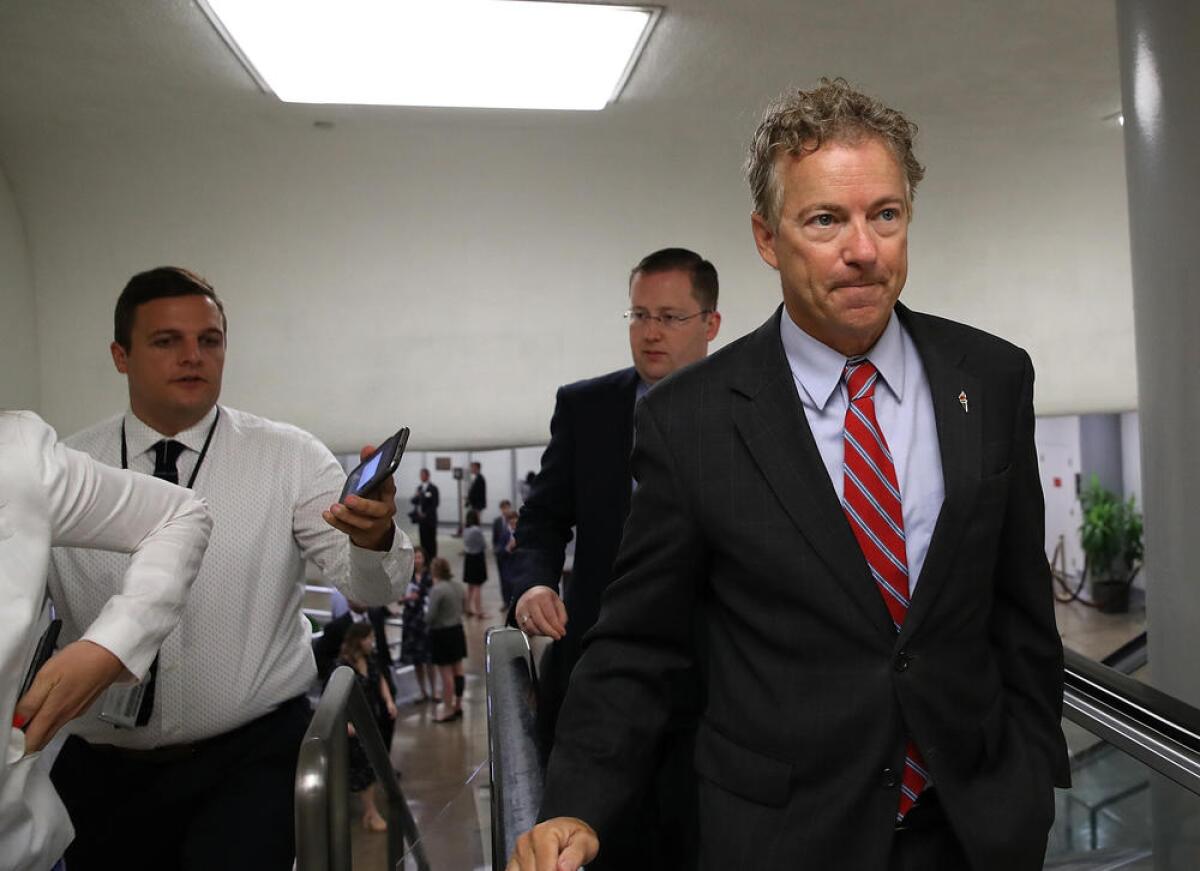
After already voting down one of their leaders’ plans to replace the Affordable Care Act, Senate Republicans on Wednesday rejected another one, this time a proposal to simply repeal most of Obamacare.
That left GOP senators with few remaining options to fulfill their campaign promise to gut the 2010 law.
The amendment from Sen. Rand Paul (R-Ky.) mirrored an earlier 2015 bill from conservatives to repeal the Affordable Care Act by 2020.
President Trump at various times has pushed the repeal-only idea, which was seen as the most straightforward approach to take amid disagreement within the party over how to reform the law.
But Paul’s proposal failed to reach the 50 votes needed for passage, despite the Republican 52-seat Senate majority and the fact that a similar measure passed in 2015. Seven Republicans joined all Democrats in the 45-55 vote.
The Senate reached a pivotal moment this week when Vice President Mike Pence cast a tie-breaking vote to open debate on a House-passed healthcare overhaul.
But after that victory, the next steps are proving much more difficult for the GOP.
Late Tuesday, nine Republican senators broke with the party to reject their most comprehensive proposal, the Better Care Reconciliation Act, even after sweeteners were added to attract support from conservatives who want full repeal and centrists who worry about cuts to Medicaid.
The chamber is engaged in a prolonged process over the next two days to vote on various amendments and proposals, but few, if any, are expected to gain traction.
Leaders best hope may come later in the week with the so-called ‚Äúskinny repeal‚ÄĚ that would simply end the Affordable Care Act‚Äôs mandate that all Americans carry insurance and that employers of bigger companies provide coverage to their workers. That plan would also repeal some of the taxes imposed by Obamacare on medical firms to pay for expanded coverage.
One military that has no problem with transgender soldiers: Israel’s

Retired Gen. Elazar Stern was stupefied when a reporter from Israel Army Radio called Wednesday to ask for his reaction to President Trump’s series of tweets about banning the service of transgender military personnel.
‚ÄúWhat?‚ÄĚ Stern asked. ‚ÄúWhy?‚ÄĚ
‚ÄúIt makes us strong that we don‚Äôt waste time on questions like this,‚ÄĚ said Stern, the former commander of the Israel Defense Forces Manpower Command. ‚ÄúIt‚Äôs something to be proud of.‚ÄĚ
Speaking with The Times, Stern, now a member of Israel‚Äôs parliament for the centrist Yesh Atid party, said that throughout his 34-year career in the army, ‚Äúin every post, at every level, always, I knew there were homosexual individuals serving with me. No transgendered people that I knew of, but maybe. We would never ask, honestly, and we‚Äôre not supposed to know. The army‚Äôs task is to support its soldiers no matter what their needs, not meddle about in their lives.‚ÄĚ
News of Trump’s tweets was greeted with widespread derision in Israel. The popular political blogger Tal Schneider was quick to respond on Twitter.
The Israel Defense Forces have knowingly included transgender soldiers since 1998. In 2014, the Israeli military said it had at least five transgender members and would support future such conscripts. As of last year, it was among 19 countries, including the United States, that allowed transgender people to serve in the military.
Israel’s national healthcare plan provides stipends to citizens who are transitioning.
Stern said he believes politicians bring up military matters ‚Äúonly because they feel there‚Äôs a public for it. In many countries, you see politicians getting votes using superficial, simplistic messages.‚ÄĚ
‚ÄúIt‚Äôs always more about who I hate than who I love,‚ÄĚ he added.
Trump administration hits Venezuela with more sanctions, targeting civilian and military officials

The Trump administration hit Venezuela with a new round of economic sanctions Wednesday in a bid to discourage President Nicolas Maduro from rewriting his nation’s constitution, which U.S. officials said could doom Venezuela’s democracy.
The sanctions target 13 current and former civilian and military officials, including the heads of several police agencies and the electoral board.
They represent the third round of sanctions for Venezuela in the six months of the Trump presidency in what one administration official called the ‚Äústeady drumbeat‚ÄĚ of efforts to put pressure on Maduro.
The Venezuelan president has scheduled a Sunday meeting of the constituent assembly, a body stacked with his supporters, that would be in charge of rewriting the constitution. Opponents of Maduro say the project is a thinly veiled attempt by the leftist president to hold on to power indefinitely.
‚ÄúIt could be the end of democracy in Venezuela,‚ÄĚ a senior administration official said. The official and two others briefed reporters on condition of anonymity in keeping with White House practices.
Trump has said he would take additional ‚Äústrong and swift‚ÄĚ actions if Maduro goes ahead with the assembly. The administration officials would not say what those actions might be, only that all options are on the table.
One option might include imposing restrictions on the oil that the U.S. imports from Venezuela. Before the current crisis, oil-rich Venezuela was a top supplier of crude to the United States.
After months of mismanagement, corruption and falling oil prices, once-prosperous Venezuela has plunged into social and economic disaster. It suffers triple-digit inflation, massive shortages of basic consumer goods and one of the highest rates of murder and violence in the hemisphere.
Near-daily protests against the Maduro government have grown increasingly desperate. More than 100 people have been killed and 4,000 arrested.
Millions of government opponents voted July 16 in a symbolic referendum against holding the constituent assembly. The action was praised by the Trump administration.
But it seems likely Maduro will proceed with the assembly.
‚ÄúThe United States will have a strong and swift response,‚ÄĚ one administration official said. ‚ÄúThe president will keep his word.‚ÄĚ
Previously, the administration has sanctioned numerous Venezuelan officials, including executive Vice President Tareck El Aissami, who is accused of drug trafficking and has amassed a fortune in the ‚Äúhundreds of millions of dollars‚ÄĚ despite being a career public servant, an official said.
It remains unclear why Trump, who has shown little interest in human rights or democracy-building elsewhere in the world, has focused so much attention on Venezuela. The country does have close ties to Cuba and Iran, two countries that Trump often condemns, as well as an abundant supply of oil that could be fully available to the United States once more if the government in Caracas were acceptable.
Moscow reacts with anger and frustration over new sanctions bill
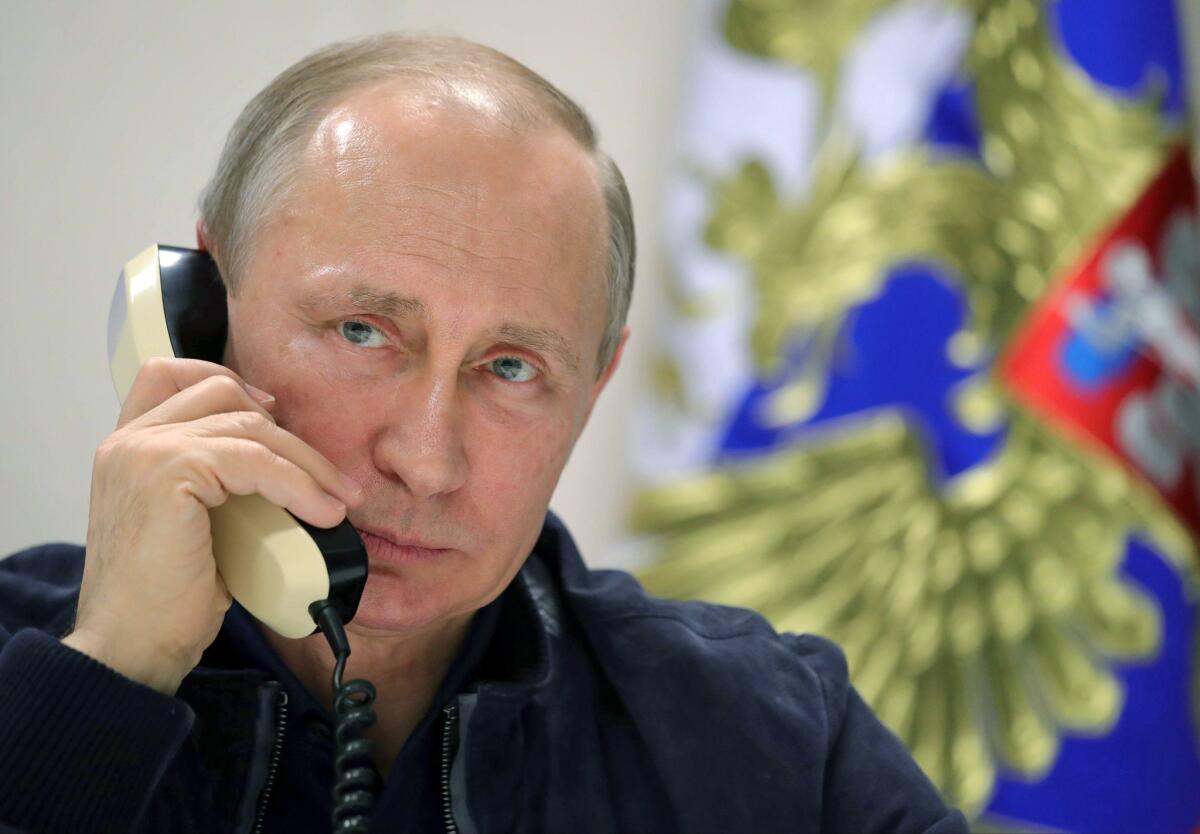
Russian officials expressed anger and frustration Wednesday at the new sanctions bill passed Tuesday in the House of Representatives, calling the proposal a devastating step in already fragile Russia-U.S. relations.
‚ÄúThe situation is highly worrisome,‚ÄĚ said Konstantin Kosachev, a Russian senator in the upper house of parliament and the chair of that body‚Äôs Foreign Affairs Committee.
‚ÄúWe will have to get used to the new situation when we don‚Äôt have any major reasons left to build relations with the U.S.,‚ÄĚ he said at a press conference in Moscow.
Russian Deputy Foreign Minister Sergei Ryabkov criticized the sanctions, saying that by adopting them, Washington was ‚Äúclosing off the prospect for normalizing ties.‚ÄĚ
‚ÄúThis is sad news for Russian-U.S. relations and for international law, relations and trade and economy,‚ÄĚ Kremlin spokesman Dmitry Peskov told reporters in a conference call Wednesday.
Many blamed the move on Russophobic ‚Äúhysteria‚ÄĚ infecting Washington politics. The bill has yet to be signed into law by President Trump, but the assumption in Moscow is that the White House has been backed into a corner and the president has no choice.
‚ÄúThe law about new sanctions is adopted. Trump will sign it confirming that he is a hostage of the Congress and of the anti-Russian hysteria. It‚Äôs a new level of confrontation,‚ÄĚ wrote Alexey Pushkov, an outspoken Russian senator, on Twitter.
‚ÄúThere can‚Äôt be any illusions: The goal of new sanctions is to increase pressure on Russia. Trump is forced to conduct Obama‚Äôs politics, turning him into H.Clinton,‚ÄĚ he said in another tweet.
For many Russian officials, the sanctions bill seemed to end any speculation that Trump’s election would mean a restart on improving U.S.-Russia relations. A meeting between the two leaders in Hamburg, Germany, seemed to give many in Moscow hope that things might improve. Indeed, Putin’s performance at the July G20 summit in Germany was hailed as a success back home.
But the sanctions bill suggested to some in Moscow that Trump’s struggles on the U.S. political stage were a wider challenge than previously understood.
Kosachev posted on Facebook [link in Russian] urging Russia to retaliate in a way that would be painful to America. In a press conference later in the day, he said that although the law had not yet been signed by Trump, engaging in a retaliation game would not serve either country’s best interests.
‚ÄúWe should look for counter measures that won‚Äôt harm our national interests, but will be painful for the Americans. It should not be just symbolic,‚ÄĚ he said at a news conference in Moscow.
Six weeks after Alexandria shooting, Rep. Steve Scalise is discharged from the hospital
House Majority Whip Steve Scalise (R-La.) was discharged from the hospital Tuesday, six weeks after he was shot at a congressional baseball team practice in Alexandria, Va.
Scalise and four other people were injured when a gunman opened fire at the practice. U.S. Capitol Police and other officers returned fire and killed the gunman.
‚ÄúCongressman Steve Scalise has made excellent progress in his recovery from a life-threatening gunshot wound six weeks ago,‚ÄĚ according to a statement from MedStar Washington Hospital Center released by Scalise‚Äôs office.
Scalise will begin an ‚Äúintensive‚ÄĚ inpatient rehabilitation, the statement said. ‚ÄúHe is in good spirits and is looking forward to his return to work once he completes rehabilitation.‚ÄĚ
U.S. Energy Secretary Rick Perry pranked by Russia‚Äôs ‚ÄėJerky Boys‚Äô
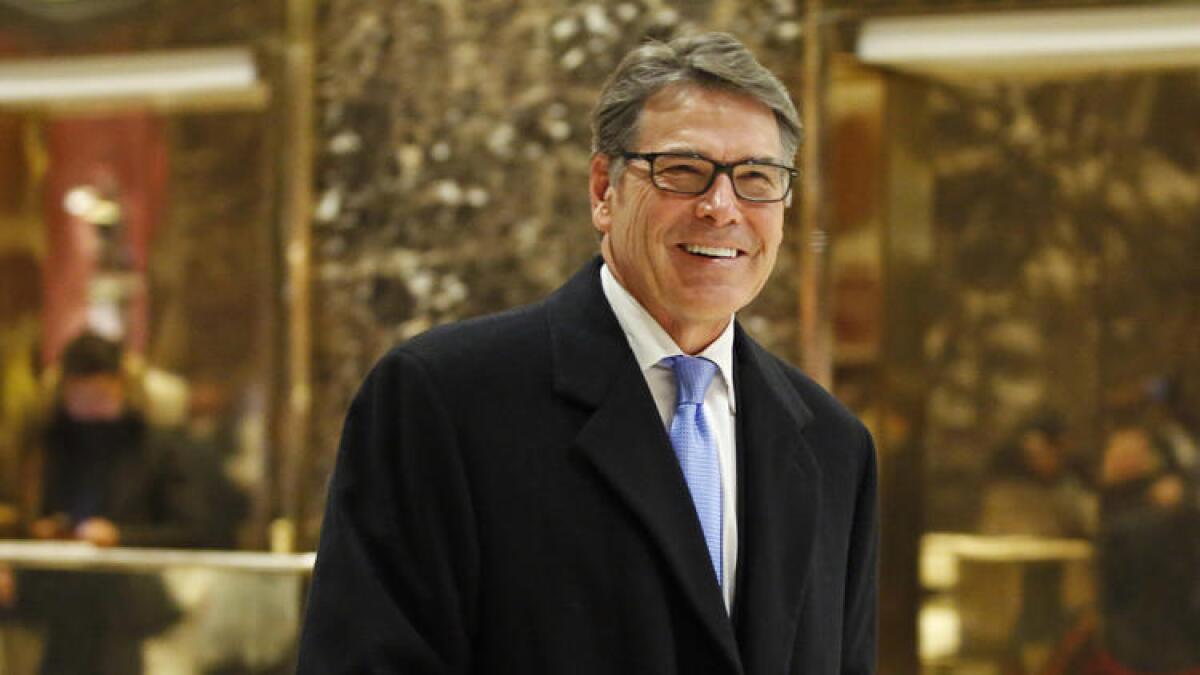
Sometimes jokes do cross cultural boundaries.
U.S. Energy Secretary Rick Perry was the butt of a practical joke this month after two Russian comedians engaged him in a 22-minute phone call in which Perry was led to believe that he was speaking to Ukrainian Prime Minister Volodymyr Groysman.
During the conversation, Perry discussed supplying coal to Ukraine, whose own supplies have been cut because of the conflict in its eastern regions, where Russia-backed rebels control large swaths of coal-rich territory.
The jokers also inquired about whether Ukraine could get a bargain on U.S. coal exports.
‚ÄúGiving Ukraine more options with some of our technology is, I think, in everyone‚Äôs best interest, with the exception of the Russians, but that‚Äôs OK,‚ÄĚ he said during the call, which was posted on a Russian news site on July 25.
Perry also said during the call that the Trump administration opposed Nord Stream 2, a Russian project to bring natural gas to Europe across the Baltic Sea.
The release of the call came on the same day that the U.S. Congress passed new sanctions against Russia.
The call with Perry isn‚Äôt the first time the Russian pranksters, Alexei ‚ÄúLexus‚ÄĚ Stolyarov and Vladimir ‚ÄúVovan‚ÄĚ Krasnov, have caught celebrities and politicians off guard with their phony phone calls. The duo is known as Russia‚Äôs version of the ‚ÄúJerky Boys‚ÄĚ and once fooled Elton John into thinking he was speaking by phone with Russian President Vladimir Putin and his spokesman, Dmitry Peskov. Another prank tricked Ukrainian President Petro Poroshenko into believing he had his counterpart in Kyrgyzstan, Almazbek Atambayev, on the other line.
Interestingly, the pranksters chose to speak to Perry in Russian and not in Ukrainian, using a translator. Ukrainian is Groysman’s primary language and the language in which all official government business is conducted in Ukraine.
Trump pressures Sessions to replace the acting FBI director
President Trump ratcheted up pressure on Atty. Gen. Jeff Sessions to fire the acting FBI director, who has been a periodic target of conservative attacks.
In two tweets Wednesday morning, Trump criticized Sessions for not replacing Acting FBI Director Andrew McCabe, whose wife ran for office in Virginia as a Democrat in 2015 and received contributions from the state Democratic Party.
‚ÄúWhy didn‚Äôt A.G. Sessions replace Acting FBI Director Andrew McCabe,‚ÄĚ Trump wrote.
Trump called McCabe, a 31-year veteran of the FBI, a ‚ÄúComey friend who was in charge of the Clinton investigation.‚ÄĚ McCabe was James B. Comey‚Äôs deputy before Trump fired Comey in June. At that point, McCabe took over running the bureau, but he hasn‚Äôt been running the Russia investigation, which is directed by special counsel Robert S. Mueller III.
Trump’s tweets are based on several false claims.
McCabe’s wife Jill McCabe, a pediatrician, ran for a seat in the Virginia State Senate in 2015 and lost to the Republican incumbent.
At the time, McCabe had no role in the Clinton investigation. When Jill McCabe entered the race, her husband was not working at FBI headquarters, but was a senior official in the Washington field office, working primarily on counter-terrorism investigations.
By the time Andrew McCabe did become FBI deputy director in February 2016, which would have given him some role in overseeing the Russia investigation, his wife’s campaign had been over for three months.
Jill McCabe, like most Democratic candidates in Virginia, did receive money from Gov. Terry McAuliffe, a Democrat, and from the state Democratic Party. McAuliffe is a longtime political ally of the Clintons, but there is no evidence that Hillary Clinton was involved in the donations.
In recent days Trump has taken aim at Sessions, calling him ‚Äúbeleaguered‚ÄĚ and criticizing Sessions for stepping aside from oversight of the investigation into Russian efforts to sway the 2016 election.
The FBI decided last year to not bring charges against Clinton over her mishandling of State Department emails. Trump supporters often chanted ‚Äúlock her up‚ÄĚ at campaign rallies.
Trump’s criticism of Sessions has sparked speculation that Trump wants Sessions to resign and open the door for another attorney general who would fire Mueller.
In an interview with the Wall Street Journal on Tuesday, Trump said he was ‚Äúdisappointed‚ÄĚ Sessions had not done more to investigate intelligence leaks and had not restarted the FBI‚Äôs investigation into Clinton.
Trump added: ‚ÄúSo many people say to me: Why are they going after you on nothing and they leave Hillary Clinton alone on, you know, really major things?‚ÄĚ
Trump’s nominee to become FBI Director, Christopher Wray, is awaiting Senate confirmation. Once he is confirmed, which is expected, McCabe will no longer be acting director.
Trump bars transgender people from serving ‚Äėin any capacity‚Äô in the U.S. military
President Trump messaged Wednesday that he has decided to bar transgender individuals from serving ‚Äúin any capacity‚ÄĚ in the U.S. armed forces, a policy that could affect thousands of Americans now in uniform and others hoping to serve.
In a decision he disclosed on Twitter, Trump said the military would not ‚Äúallow or accept‚ÄĚ transgender service members, reversing a policy begun by the Obama administration last year.
It wasn’t immediately clear what would happen to transgender service members now in the Army, Navy, Air Force and Marines. Estimates vary widely, from about 1,300 to 16,000 members of the armed services who are transgender.
A Pentagon spokesman described Trump‚Äôs Twitter post as ‚Äúnew guidance‚ÄĚ rather than an order from the commander-in-chief, and said the Pentagon would issue ‚Äúrevised guidance‚ÄĚ to the military ‚Äúin the near future.‚ÄĚ
LGBT groups vowed to challenge Trump in court, and Sen. John McCain (R-Ariz), chairman of the Senate Armed Services Committee, all but urged the Pentagon to ignore the tweet, saying there is ‚Äúno reason‚ÄĚ to change current policy.
In a series of tweets, the president said he had consulted with ‚Äúmy Generals and military experts‚ÄĚ in deciding to reverse the current policy.
‚ÄúOur military must be focused on decisive and overwhelming victory and cannot be burdened with the tremendous medical costs and disruption that transgender in the military would entail,‚ÄĚ he wrote.
A study commissioned by the Pentagon last year found the expected medical costs to be negligible.
It wasn’t immediately clear when Trump’s decision might be implemented by the Pentagon.
Secretary of Defense James Mattis is out of Washington on vacation this week and the Pentagon appeared caught off guard by the president’s tweet. Military officials referred all questions to the White House.
‚ÄúWe will continue to work closely with the White House to address the new guidance provided by the Commander-in-Chief on transgender individuals serving the military,‚ÄĚ Pentagon spokesman Capt. Jeff Davis said in a statement. ‚ÄúWe will provide revised guidance to the Department in the near future.‚ÄĚ
Democrats in Congress, as well as several senior Republicans, offered strong support for transgender individuals serving honorably, and condemned Trump’s tweet.
‚ÄúAny American who meets current medical and readiness standards should be allowed to continue serving,‚ÄĚ McCain said in a statement. ‚ÄúThere is no reason to force service members who are able to fight, train, and deploy to leave the military - regardless of their gender identity.‚ÄĚ
He said the Defense department is conducting a study on the medical obligations, impact on military readiness and other questions regarding transgender individuals who want to join the military.
‚ÄúI do not believe that ay new policy decision is appropriate until that study is complete and thoroughly reviewed by the Secretary of Defense, our military leadership and the Congress,‚ÄĚ McCain added.
Sen. Orrin Hatch, (R-Utah) also announced his opposition.
‚ÄúI don‚Äôt think we should be discriminating against anyone,‚ÄĚ he said. ‚ÄúTransgender people are people and deserve the best we can do for them.‚ÄĚ
The LGBT community vowed to go to federal court to challenge Trump’s decision on transgender people in uniform. .
‚ÄúWe are going to fight for them as hard as they are fighting for the country,‚ÄĚ the OutServe-Servicemembers Legal Defense Network, a Washington-based group that seeks LGBT equality in the military, said in a statement.
The legal group estimates about 16,000 transgender individuals currently serve in the military.
Last July, the Pentagon lifted a long-standing ban against transgender men and women serving openly in the military, removing one of its last discriminatory hurdles and placing protection of gender rights on par with race, religion, color, sex and sexual orientation.
The policy part of the Obama administration’s Force of the Future initiative, which aimed to make the strait-laced, male-dominated U.S. military more inclusive.
In 2015, the administration opened all combat positions to women and in 2016 appointed the first openly gay Secretary of the Army, Eric K. Fanning.
The Obama policy allowed transgender service members currently on duty to immediately serve openly. Armed services had to come up with medical and training plans and until July 1, 2017, for full implementation. The Trump administration initially pushed that date back, and now has reversed the policy.
The Pentagon says it does not know how many transgender people serve in uniform because until last year, they faced discharge if they revealed their identities.
A 2016 study by Rand Corp., the Santa Monica-based think tank, estimated 6,630 transgender individuals were in active military service. The total force is about 1.3 million.
The Rand study, commissioned by the Pentagon, estimated that between 30 and 140 new hormone treatments a year could be initiated by transgender service members under the Obama-era opening. It also predicted 25 to 130 gender transition-related surgeries a year among active service members.
As a result, it said, military healthcare costs could increase by $2.4 million to $8.4 million a year -- a 0.13% increase in current medical spending.
Gender reassignment surgery and other treatment deemed medically necessary by a physician was to be covered under the policy.
Prior to the Obama rule, the Pentagon banned transgender troops from openly serving. If they revealed their transgender identity, they could be kicked out or denied reenlistment.
In the most famous case, former Army Pvt. Chelsea E. Manning had treatment while in a military prison after a court martial convicted her in 2013 of leaking classified material to Wikileaks while serving in Iraq. Obama pardoned her just before he left office and she was released from prison in May.
Manning mocked Trump’s decision in her own tweets Wednesday.
‚Äúso, biggest baddest most $$ military on earth cries about a few trans people but funds the F-35? sounds like cowardice ,‚ÄĚ she wrote.
UPDATES:
9:33 a.m.: This post was updated with statements from the Pentagon, Sen. John McCain, Chelsea Manning and other details.
6:56 a.m.: This post was updated with staff reporting.
6:28 a.m.: This post was updated with material from the Associated Press.
This post was originally published at 6:14 a.m.
Senate committee withdraws subpoena for Paul Manafort
President Trump’s former campaign chairman will not be testifying Wednesday before the Senate Judiciary Committee, as originally scheduled, after the committee rescinded its subpoena.
The committee withdrew its subpoena for Paul Manafort late Tuesday after Manafort agreed to turn over documents and to continue negotiating about setting up an interview with the panel, according to Taylor Foy, a spokesman for Sen. Charles E. Grassley, the Judiciary Committee chairman. The committee also removed Donald Trump Jr. from the list of witnesses scheduled for Wednesday’s public hearing.
The panel has sought to talk with Manafort about a June 2016 Trump Tower meeting in New York with Russian lawyer Natalia Veselnitskaya, among other issues including his foreign political work on behalf of Ukrainian interests.
On Tuesday, Manafort met with Senate Intelligence Committee staff, providing his recollection of the Veselnitskaya meeting and agreeing to turn over contemporaneous notes of the gathering last year, according to people familiar with the closed-door interview. Manafort ‚Äúanswered their questions fully,‚ÄĚ said his spokesman, Jason Maloni.
Trump’s son-in-law and advisor Jared Kushner was also on Capitol Hill on Tuesday for a second day of private meetings, this time for a conversation with lawmakers on the House Intelligence Committee.
Both Manafort and Kushner have been cooperating with the committees which, along with Special Counsel Robert Mueller, are probing Russia’s interference in the 2016 presidential election and possible collusion with Trump associates.
The two men have faced particular scrutiny about attending the Trump Tower meeting because it was flatly described in emails to Donald Trump Jr. as being part of a Russian government effort to aid Trump’s presidential campaign.
Manafort’s discussion with committee staff was limited to his recollection of the June 2016 meeting, according to two people familiar with the interview. Both demanded anonymity to discuss details because the interview occurred behind closed doors. Manafort had previously disclosed the meeting in documents he turned over to the committee. He has now provided the committee with notes he took at the time, one of the people said.
The other person said Manafort has also said he will participate in additional interviews with the Senate Intelligence Committee staff on other topics if necessary. Those meetings haven’t yet been scheduled.
Kushner spent about three hours behind closed doors Tuesday with the House intelligence panel. Republican Rep. Mike Conaway of Texas, who is leading the committee‚Äôs Russia probe, said he found Kushner to be ‚Äústraightforward, forthcoming, wanted to answer every question we had.‚ÄĚ He said Kushner was willing to follow up with the committee if it has additional questions.
The committee‚Äôs ranking Democrat, Rep. Adam B. Schiff of Burbank, said the questions touched on ‚Äúa range of issues the committee had been concerned about.‚ÄĚ
‚ÄúWe appreciate his voluntary willingness to come and testify today,‚ÄĚ Schiff added.
On Monday, Kushner answered questions from staff on the Senate‚Äôs Intelligence Committee, acknowledging four meetings with Russians during and after Trump‚Äôs victorious White House bid and insisting he had ‚Äúnothing to hide.‚ÄĚ
Emails released this month show that Trump Jr., the president’s eldest son, accepted a June 2016 meeting with Veselnitskaya with the understanding that he would receive damaging information on Democrat Hillary Clinton as part of a Russian government effort to help Trump’s campaign. But, in his statement for the two intelligence committees, Kushner said he hadn’t read those emails until being recently shown them by his lawyers.
Kushner’s statement was the first detailed defense from a campaign insider responding to the controversy that has all but consumed the first six months of Trump’s presidency.
Kushner called the meeting with Veselnitskaya such a ‚Äúwaste of time‚ÄĚ that he asked his assistant to call him out of the gathering.
‚ÄúNo part of the meeting I attended included anything about the campaign; there was no follow-up to the meeting that I am aware of; I do not recall how many people were there (or their names), and I have no knowledge of any documents being offered or accepted,‚ÄĚ he said.
Kushner on Monday confirmed earlier media reports that he had suggested using Russian diplomatic facilities to set up secure communications between Trump advisor Michael Flynn, who would become national security advisor, and Russian officials. But he disputed that it was an effort to establish a ‚Äúsecret back channel.‚ÄĚ
His statement describes a December meeting with Flynn and Russian Ambassador Sergey Kislyak in which Kushner and Kislyak discussed establishing a secure line for the Trump transition team and Moscow to communicate about policy in Syria.
As debate opens on Obamacare bill, Senate quickly rejects the first Republican amendment
After Senate Republicans agreed to open debate Tuesday to overhaul the Affordable Care Act, they quickly shot down what was once their leading proposal for repealing and replacing Obamacare.
Republicans rejected their revised bill, the Better Care Reconciliation Act, despite having added a provision from Sen. Ted Cruz (R-Texas) favored by conservatives and another from Sen. Rob Portman (R-Ohio) to court centrists worried about Medicaid cuts.
It failed 43 to 57, not reaching the 60-vote threshold needed to advance. Nine Republicans voted against it.
President Trump warned Republicans during a rally in Youngstown, Ohio, late Tuesday that they needed to act after having promised for seven years to repeal and replace the healthcare law.
‚ÄúNow they must keep their promise,‚ÄĚ Trump said. ‚ÄúAny senator who votes against repeal-and-replace is telling America that they are fine with the Obamacare nightmare, and I predict they will have a lot of problems.‚ÄĚ
But dispatching with the bill that was once considered to be the GOP’s best chances at fulfilling their campaign promise to end the law now leaves Republicans with few options.
Senate Majority Leader Mitch McConnell (R-Ky.) promised senators a robust debate if they agreed earlier Tuesday to vote on the motion to open the legislative process.
Typically, that means round-the-clock voting, with senators able to offer unlimited amendments as part of the special budget process Republicans are using for the healthcare debate. More votes are set for Wednesday.
But with Democrats preferring to fix the healthcare law rather than end it, Republicans are largely left on their own. Even though most votes will require only 51 votes for passage, the 52-seat Republican majority is split on key healthcare issues, making various GOP proposals unable to win support.
Instead, Republicans may settle on an idea leaders floated this week -- what‚Äôs being called ‚Äúskinny repeal‚ÄĚ -- a measure that would end just a few key parts of Obamacare. It would repeal the law‚Äôs mandate that all Americans carry insurance and that bigger employers must provide it to their workers, or pay fines. The skinny repeal could also end some taxes, including one on medical device makers.
Passage of the skinny repeal would be far from the Republican promise to repeal Obamacare completely and replace it with another healthcare program. It would also need approval by the House, where Republicans have passed a more sweeping repeal and replacement bill.
No, Goldwater Rule has not been overturned. Psychiatrists are still prohibited from commenting on mental state of Trump
Shortly after Barry Goldwater was named the Republican presidential nominee in 1964, Fact magazine published an article headlined, ‚Äú1,189 Psychiatrists say Goldwater is Psychologically Unfit to be President!‚ÄĚ
Goldwater sued the magazine for libel, and in 1973 the American Psychiatric Assn. implemented an ethics rule that prohibits psychiatrists from publicly commenting on the mental state of public figures they have not examined in person and from whom they have not obtained consent to discuss.
The so-called Goldwater Rule has gained renewed attention in the age of President Trump, as his speeches and tweets have prompted some psychiatrists to argue that they have a responsibility to the public to speak up about his mental state. Confusion over the rule grew Tuesday after an article on health site Stat News reported that the American Psychoanalytic Assn. ‚Äď not to be confused with the much larger American Psychiatric Assn. ‚Äď told its members that the long-standing rule should not restrict them from publicly commenting on Trump or any other public figure.
‚ÄúThe American Psychiatric Association‚Äôs ethical stance on the Goldwater Rule applies to its members only. APsaA does not consider political commentary by its individual members an ethical matter. APsaA‚Äôs ethical code concerns clinical practice, not public commentary,‚ÄĚ the group said in an email to its 3,500 members.
Soon after, the group tweeted that the original article was misleading.
In a statement to NPR, the group‚Äôs director of public affairs, Wylie Tene, said members ‚Äúhave always been free to comment on public figures, but have been cautioned against diagnosing.‚ÄĚ
The American Psychiatric Assn. also tweeted, clarifying that its policy has never changed and that the Goldwater Rule remains in effect for its 37,000 members.
Much of the confusion seems to have stemmed from people wrongly using ‚Äúpsychiatry‚ÄĚ and ‚Äúpsychoanalysis‚ÄĚ interchangeably.
According to the American Psychiatric Assn., psychiatry ‚Äúis the branch of medicine focused on the diagnosis, treatment and prevention of mental, emotional and behavioral disorders.‚ÄĚ
The American Psychoanalytic Assn. describes psychoanalysis as a method that ‚Äúteaches us about the unconscious psychological forces within us outside of everyday awareness,‚ÄĚ pulling from people‚Äôs ‚Äústories, fantasies and dreams.‚ÄĚ
Sen. Dean Heller votes to debate Obamacare repeal bill, and Nevadans give him an earful
Nevada Sen. Dean Heller, considered to be a vulnerable Republican in next year’s midterm election, voted Tuesday to allow debate to go forward on a bill that would attempt to repeal and replace Obamacare.
On Twitter, this did not go unnoticed.
His statement attached to his tweet about why he chose to ‚Äúvote to move forward and give us the chance to address the unworkable aspects of Obamacare‚ÄĚ generated more than 5,300 replies within three hours of posting it.
Heller received some positive replies, like one from Duane Maddy, who praised his vote as wise.
But the vast majority of replies expressed anger, or eagerness to donate to his opponent.
For context, Heller’s next most replied-to Twitter message this month was on July 13, when he received 472 responses to his tweet about having a meeting with Treasury Secretary Steven T. Mnunchin.
Of Hellers‚Äô 33 tweets in July, 22 generated fewer than 100 replies ‚ÄĒ with most in the 20-to-30 range, which seems low for someone with 57,000 followers.
But Heller’s position on repealing Obamacare has been one of constant speculation as he’s been cast as a deciding vote on whether the GOP scraps the Affordable Care Act. He’s been under pressure by both sides of the political aisle on the issue.
He’s also in a bind given that Nevada Gov. Brian Sandoval, a moderate Republican, appointed him to his Senate seat in the wake of John Ensign’s resignation in 2011 and was the first GOP governor to sign onto Obamacare’s Medicaid expansion.
Sandoval has been a critic of the repeal-and-replace legislation being sought by congressional Republicans, and he has Heller’s ear.
But Heller‚Äôs statement suggested that he was simply voting for debate and that ‚Äúif the final product isn‚Äôt improved for the state of Nevada, then I will not vote for it; if it is improved, I will support it.‚ÄĚ
In case he needed a reminder, the response to his tweeted statement showed how much anger there is at the attempt to repeal Obamacare in a state that went for Hillary Clinton and has been trending blue for a few years. There were links in the replies for likely challengers for his seat, including Jacky Rosen, a Democratic Nevada congresswoman.
Trump administration toughens policy against sanctuary cities

The Trump administration on Tuesday strengthened its crackdown on so-called sanctuary cities, announcing a new policy that says local governments will lose some federal grants if they do not give federal officials advance notice when immigrants who are in the country illegally are about to be released from custody and allow immigration agents access to local jails.
The new policy, announced by the Department of Justice, will apply to all cities that get grants from the so-called Byrne Justice Assistance grant program, for which the administration has requested just over $380 million for the coming year.
Under the policy, cities will have to meet three conditions if they want the grants: honoring requests to give 48-hour notice when detainees are about to be released; allowing agents access to local and state jails, in order to pick up undocumented people who are being released; and compliance with a law that prohibits any jurisdictions from stopping the exchange of information about an individual’s immigration status.
The policy, announced as Atty. Gen. Jeff Sessions comes under extraordinary criticism from President Trump, seems guaranteed to garner strong opposition from cities and the courts. In some states, courts have held that state and local authorities cannot detain people who are not charged with a crime simply because of a federal detainer request.
3:40 p.m.: This post was corrected. Under the new policy, cities will have to honor requests to give 48 hour notice when a detainee is about to be released. The policy does not require cities to hold detainees at federal request.
Trump speech to Boy Scout Jamboree elicits widespread criticism for its partisanship, and profanity
President Trump earned no merit badge for his address to the Boy Scouts of America on Monday evening.
The president got plenty of applause from the more than 30,000 Scouts, troop leaders and parents during his 38-minute speech at the National Scout Jamboree in Glen Jean, W.Va., along with chants of ‚ÄúUSA‚ÄĚ and ‚ÄúTrump‚ÄĚ and hearty boos at his references to former rival Hillary Clinton and his predecessor, President Obama.
To many, that was the problem.
Almost immediately, the 107-year-old organization was forced to respond to a barrage of complaints from former Scouts, other parents and the general public that Trump’s speech, which was carried live at least in part on cable television networks, violated Scout values by its partisanship and, at his start, profanity.
In a statement to news organizations late Monday, the Boy Scouts said its invitation to the president to speak was ‚Äúa longstanding tradition and is in no way an endorsement of any political party or specific policies.‚ÄĚ
Yet the protests kept coming Tuesday. On the Facebook page of the Boy Scouts of America, one woman wrote, ‚ÄúSince when does this organization get involved in politics? In fact, isn‚Äôt it NOT allowed? Who let this happen? I can‚Äôt believe the Boy Scouts booed a living American President.‚ÄĚ
‚ÄúWhat kind of message does this send to scouts?‚ÄĚ one critic asked. And a number of respondents echoed a man who posted, ‚ÄúMy son and I, along with others I am sure, will be dropping out of Scouts due to supporting behavior that is contrary‚ÄĚ to the Scouts‚Äô Mission Statement.
The organization did not respond to requests for additional comment.
The president began his remarks ‚ÄĒ falsely, it would turn out ‚ÄĒ by telling the enthusiastic throng of youths that he would leave ‚Äúthe policy fights‚ÄĚ and ‚Äúthe fake news‚ÄĚ aside for the moment.
Yet even in making that pledge, he went off-script: ‚ÄúI said, who the hell wants to speak about politics when I‚Äôm in front of the Boy Scouts?‚ÄĚ
Trump repeatedly departed from his prepared remarks on Scouts’ honor and American values, either to take a shot at some political foe and the media or to relive the glory of his election victory, or both at once.
He took swipes not only at Clinton and Obama, but also at his fellow Republicans in Congress and, pointing toward reporters at the event, ‚Äúthese dishonest people.‚ÄĚ
Instead of a paean to public service typical of such events, the president told the teenagers that Washington, where his party controls both the White House and Congress, is ‚Äúnot a good place.‚ÄĚ
It‚Äôs worse than a swamp ‚ÄĒ his usual metaphor ‚ÄĒ and actually is ‚Äúa cesspool‚ÄĚ or even ‚Äúa sewer,‚ÄĚ he added.
The president recalled the ‚Äúbeautiful date‚ÄĚ of Nov. 8, when he won the election ‚ÄĒ ‚ÄúDo we remember that date?‚ÄĚ he asked, to applause. The television network maps were ‚Äúso red‚ÄĚ ‚ÄĒ for Republican state wins ‚ÄĒ ‚Äúit was unbelievable,‚ÄĚ Trump added.
He recounted his against-the-odds electoral college tally of swing states, and castigated Clinton because she ‚Äúdidn‚Äôt work hard.‚ÄĚ
Though much of his audience was too young to vote, Trump gave the Scouts come credit for his triumph, calling his election ‚Äúan unbelievable tribute to you and all of the other millions and millions of people that came out and voted for ‚ÄėMake America Great Again.‚Äô ‚ÄĚ
Trump introduced his secretary of Health and Human Services, Tom Price, and then threatened ‚ÄĒ jokingly, it seemed ‚ÄĒ to fire Price if he didn‚Äôt wangle the votes to kill ‚Äúthis horrible thing known as Obamacare.‚ÄĚ He singled out West Virginia‚Äôs Republican Sen. Shelley Moore Capito, who has criticized previous versions of the healthcare bill, alluding to the Scout Law tenet to be loyal.
‚ÄúWe could use some more loyalty, I will tell you that,‚ÄĚ he said.
After some Scouts broke into a chant of ‚ÄúWe love Trump,‚ÄĚ he digressed to ask them, ‚ÄúBy the way, just a question: Did President Obama ever come to a jamboree?‚ÄĚ Many yelled ‚ÄúNo!‚ÄĚ and he concurred, ‚ÄúThe answer is no.‚ÄĚ
Obama, who, unlike Trump, was a Scout as a boy, sent a video greeting to the National Jamboree in 2010, the 100th anniversary of the Boy Scouts of America. For much of his presidency, the organization was the subject of controversy for not allowing gay people to be Scouts, troop leaders or employees. It opened the door to gay Scouts in 2013, and to gay adults in 2015.
According to the organization, Trump was the eighth of 11 presidents in its history to join the annual Jamboree, starting with Franklin D. Roosevelt in 1937 to, most recently, George W. Bush in 2005. While Ronald Reagan never attended, his wife, Nancy Reagan, did.
A history of those past appearances and Obama‚Äôs video remarks on the Scouts‚Äô website suggest Trump‚Äôs address likely was unique for its political tinge. Others‚Äô speeches focused on the Scout Law, which commands that Scouts be ‚Äútrustworthy, loyal, helpful, friendly, courteous, kind, obedient, cheerful, thrifty, brave, clean, and reverent.‚ÄĚ
In a long, confusing and suggestive digression, Trump spoke of a meeting years ago at a cocktail party with an aged William Levitt, the real estate pioneer of American suburbia who later went bankrupt. He told how Levitt had lived a fast life, with ‚Äúa big yacht,‚ÄĚ adding, ‚ÄúI won‚Äôt go any more than that because you‚Äôre Boy Scouts, so I‚Äôm not going to tell you what he did.‚ÄĚ
He laughed, and many Scouts booed good-naturedly that the president wouldn‚Äôt tell them more. Trump added of the washed-up Levitt, ‚ÄúIt was very sad because the hottest people in New York were at this party.‚ÄĚ
By their chants, the Scouts, too, may have skirted close to violating the group‚Äôs norms. Ahead of Trump‚Äôs visit, organizers circulated word to troop leaders that ‚Äúchants of certain phrases heard during the campaign (e.g. ‚ÄėBuild the wall,‚Äô ‚ÄėLock her up‚Äô) are considered divisive by many members of our audience, and may cause unnecessary friction between individuals and units.‚ÄĚ
Trump signaled most of his off-script asides by saying, ‚ÄúBy the way,‚ÄĚ and his final such departure near the end of his speech seemed a bit out of sync with the steamy July day.
‚ÄúAnd by the way,‚ÄĚ he told them, ‚Äúunder the Trump administration, you‚Äôll be saying, ‚ÄėMerry Christmas‚Äô again when you go shopping. Believe me. Merry Christmas.‚ÄĚ
Sen. John McCain saves GOP healthcare bill in partisan vote, then calls for more bipartisanship
After casting a critical vote that allowed Republicans to move forward in their efforts to repeal and replace the Affordable Care Act ‚ÄĒ a move that narrowly passed along partisan lines ‚ÄĒ Sen. John McCain called on the Senate to focus more on bipartisan debate than on ‚Äúwinning.‚ÄĚ
McCain, who was diagnosed with brain cancer last week, made a dramatic, sooner-than-expected return to the Senate floor in time to vote for the motion to proceed on a GOP healthcare bill. The motion was opposed by every Democrat and two Republican senators, with Vice President Mike Pence casting the tie-breaker vote.
Immediately following the vote, McCain scolded senators for ‚Äúnot producing much for the American people‚ÄĚ because of partisan, trivial debates.
‚ÄúLet‚Äôs trust each other. Let‚Äôs return to regular order. We‚Äôve been spinning our wheels on too many important issues,‚ÄĚ McCain said. ‚ÄúWe‚Äôre getting nothing done, my friends. We‚Äôre getting nothing done.‚ÄĚ
McCain previously had criticized the Republican’s secretive process for the healthcare bill and encouraged senators to start over with a bipartisan process. That left some unclear whether McCain would support Tuesday’s procedural vote.
Although he voted on the motion to proceed, McCain said he would not vote on the bill as it currently stands.
‚ÄúOur healthcare system is a mess; we all know it,‚ÄĚ he said. ‚ÄúSomething has to be done. ... All we‚Äôve managed to do is make more popular a policy that wasn‚Äôt very popular when we started trying to get rid of it.‚ÄĚ
The senator has received an outpouring of support since his diagnosis with brain cancer, but many opponents of repealing the current healthcare system criticized his vote Tuesday as hypocritical, particularly in light of his subsequent comments.
Trump also voiced support for McCain, tweeting Tuesday morning that the senator was a ‚Äúbrave American hero.‚ÄĚ During the presidential campaign, Trump had questioned whether McCain, a Vietnam War veteran who spent years as a prisoner, was a hero because he was captured.
McCain announced late Monday night he would be returning to the Senate to vote on healthcare, sanctions against Russia and the budget for the Department of Defense.
The senator also reiterated Tuesday he would not be stepping down from his seat, despite his illness.
President Trump on Jeff Sessions‚Äô fate: ‚ÄėTime will tell‚Äô
President Trump offered Atty. Gen. Jeff Sessions something between a lifeline and an expiration date during a brief news conference Tuesday, after spending days undermining and criticizing the former close ally.
‚ÄúI‚Äôm very disappointed with the attorney general, but we‚Äôll see what happens,‚ÄĚ Trump said at a Rose Garden appearance with Lebanese Prime Minister Saad Hariri. ‚ÄúTime will tell. Time will tell.‚ÄĚ
Trump, asked twice whether Sessions’ job is safe and what he can do to preserve it, declined to call on the attorney general to resign.
‚ÄúI want the attorney general to be much tougher on the leaks from intelligence agencies, which are leaking like rarely have they ever leaked before,‚ÄĚ Trump said.
Trump, responding to another reporter’s question, also denied he was letting Sessions twist in the wind.
‚ÄúI don‚Äôt think I am doing that,‚ÄĚ Trump said. ‚ÄúBut I am disappointed in the attorney general.‚ÄĚ
Why? He reiterated comments he made in an interview with the New York Times last week in which he complained that Sessions had recused himself from the investigation into Russian meddling in the 2016 election and potential collusion with his campaign.
‚ÄúHe should not have recused himself,‚ÄĚ Trump said.
‚ÄúIf he was going to recuse himself, he should have told me prior to taking office and I would have quite simply picked somebody else. ‚Ķ I think it‚Äôs unfair to the presidency.‚ÄĚ
GOP senator says ‚ÄėI‚Äôm worried‚Äô about Donald Trump, calls Republican congressman ‚Äėso unattractive‚Äô
Sen. Susan Collins is not a big fan of President Trump, but it‚Äôs doubtful the Maine Republican would have said ‚ÄúI‚Äôm worried‚ÄĚ about his administration if she had known the comments would be broadcast to the world.
That’s what happened Tuesday when she and Sen. Jack Reed, a Rhode Island Democrat, were caught in a candid conversation on a hot microphone, after an appropriations subcommittee session.
The two were overheard expressing concern with Trump‚Äôs grasp of reality and policy while Collins was heard disparaging the appearance of a Republican House member who had publicly chastised her and other ‚Äúfemale senators from the Northeast‚ÄĚ who opposed Republican efforts to repeal Obamacare.
The comments were first reported by the Washington Post.
‚ÄúI think he‚Äôs crazy. I mean, I don‚Äôt say that lightly and as a kind of a goofy guy,‚ÄĚ Reed says at one point, apparently referring to Trump. The remark came after Collins expressed concern that the White House had drafted a budget that has ‚Äúno thinking‚ÄĚ and is ‚Äúincredibly irresponsible.‚ÄĚ
‚ÄúI‚Äôm worried,‚ÄĚ Collins replied.
The comments from sitting senators from each party are not only embarrassing to Trump, but could also make life difficult for Collins, who is already facing heat for bucking the Republican Party on healthcare.
She’s been the most consistent critic of the party’s plans to repeal or rewrite Obamacare -- one of two Republicans who voted Tuesday against the motion to begin debate on the healthcare bill.
While many Republican lawmakers express private frustration with Trump, polls show large majorities of Republican voters still approve of his performance in office.
Later Tuesday, Collins‚Äô office sent a statement from communications director Annie Clark saying that Collins was ‚Äúworried‚ÄĚ about Trump‚Äôs budget.
‚ÄúSenator Collins is worried about the elimination of transportation and housing programs in the President‚Äôs budget request that are critically important to local communities across our country,‚ÄĚ she said, pointing out specific grant programs that Trump has proposed eliminating.
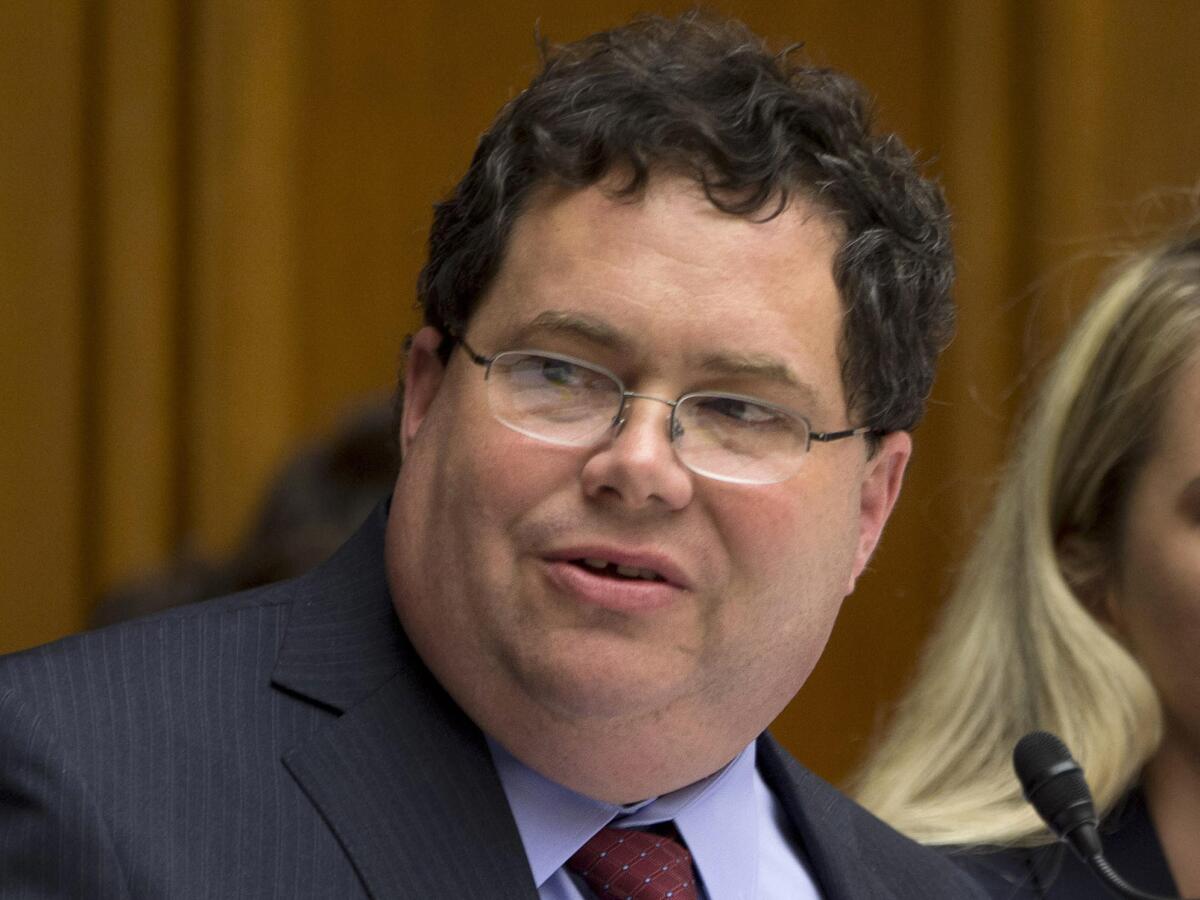
In addition to agreeing with Reed that Trump lacks understanding of the budget process, Collins engages in banter with him about Texas GOP Rep. Blake Farenthold. Last week, Farenthold told a radio host that he would love to challenge Collins and other female Republicans who opposed the GOP health bill to a duel.
‚ÄúIf it was a guy from South Texas, I might ask him to step outside and settle this Aaron Burr-style,‚ÄĚ he said.
On Tuesday, Collins referred to the incident with a laugh.
‚ÄúDo you know why he challenged you to a duel? ‚ÄėCause you could beat the [expletive] out of him,‚ÄĚ said Reed.
‚ÄúHe‚Äôs huge,‚ÄĚ Collins replies. ‚Äú...I don‚Äôt mean to be unkind, but he‚Äôs so unattractive it‚Äôs unbelievable.‚ÄĚ
In the same email that clarified her ‚Äúworried‚ÄĚ comments, Collins‚Äô office tried to make peace with Farenthold, with a statement from Collins.
‚ÄúNeither weapons nor inappropriate words are the right way to resolve legislative disputes,‚ÄĚ she said. ‚ÄúI received a handwritten apology from Rep. Farenthold late this morning. I accept his apology, and I offer him mine.‚ÄĚ
With Sessions’ job security uncertain, some conservatives question Trump’s criticism

He was among President Trump’s earliest supporters, but now it appears U.S. Atty. Gen. Jeff Sessions is headed for the exit.
In recent days, Trump has criticized Sessions on Twitter and during interviews for recusing himself from any investigation into possible collusion last year between Trump’s presidential campaign and Russia.
While Trump throws jabs at Sessions, not everyone in conservative media is on board. Here are some story lines:
Is Trump eyeing Rudy to replace ‚Äúbeleaguered AG‚ÄĚ Sessions? (Rush Limbaugh)
Sessions, then a U.S. senator from Alabama, was the first in the chamber to endorse Trump during the 2016 campaign.
Right-wing radio host Rush Limbaugh homes in on this loyalty and expresses some reservations about Trump’s anger with Sessions.
‚ÄúSessions is a by-the-book attorney general, a by-the-book legal mind. That‚Äôs, I think, one of the bones of contention here, because it is arguable that he didn‚Äôt need to recuse himself,‚ÄĚ Limbaugh said on his radio show.
Limbaugh added it‚Äôs ‚Äúa little bit discomforting, unseemly for Trump to go after such a loyal supporter this way.‚ÄĚ
Some reports, which Limbaugh notes, have pegged former New York Mayor Rudolph W. Giuliani as a possible successor to Sessions.
Trump has himself, not Sessions, to blame for the limitless special prosecutor investigation (National Review)
In this piece, Andrew C. McCarthy writes that Trump must blame himself for his woes with the Russia investigation ‚ÄĒ not Sessions.
‚ÄúPresident Trump accomplished only one thing by railing at Atty. Gen. Sessions: He added to the growing disinclination of quality people to work in his administration,‚ÄĚ he writes. ‚ÄúNo one with self-respect wants to work in a place where the boss not only won‚Äôt back you up when the going gets tough, but will turn on you with a vengeance ‚ÄĒ especially when there‚Äôs a need to divert attention from his own shortcomings.‚ÄĚ
Jeff Sessions is indeed on the way out (American Spectator)
The public criticism from Trump has baffled many conservatives.
Arnold Steinberg writes that Sessions deserves more respect.
‚ÄúI myself have had occasion to relieve people of their responsibilities, that is, to fire them. But I would treat those people with respect and courtesy and surely not criticize them in semi-public or, worse, in a public situation,‚ÄĚ Steinberg writes.
He adds: ‚ÄúThe fact that Jeff Sessions was the first major political figure to endorse Donald Trump early in the primary season entitled (and entitles) him, at the least, to respectful consideration and professional courtesy by the administration.‚ÄĚ
Watch live: Senate to vote on first step toward Obamacare repeal
Senate healthcare vote presents critical test for GOP and Trump
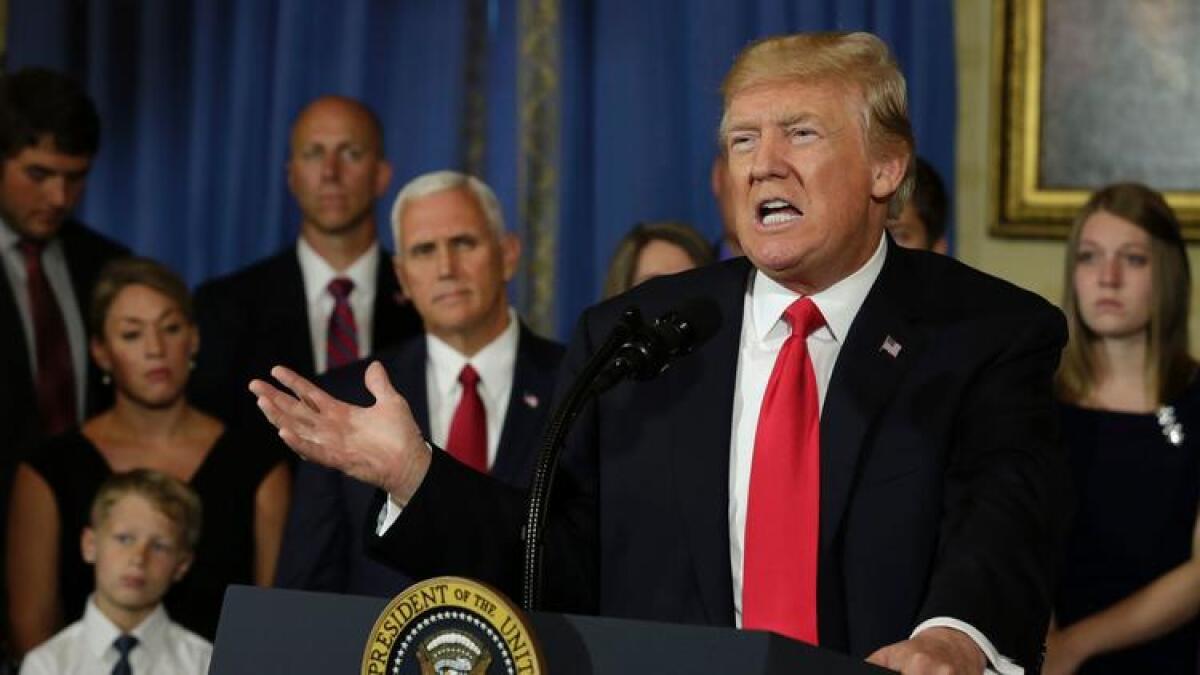
With a strong, last-minute push from President Trump, Senate Republicans face a pivotal vote Tuesday in their long bid to repeal or replace the Affordable Care Act.
But the outcome remained in doubt, largely because senators have not even been told which of the various GOP plans will be considered.
Many GOP senators remain reluctant to begin formal debate on legislation without knowing where the process will end.
Trump warned senators Monday that Tuesday‚Äôs planned ‚Äúmotion to proceed‚ÄĚ ‚ÄĒ the first legislative hurdle to passing a Senate bill ‚ÄĒ could be Republicans‚Äô ‚Äúlast chance‚ÄĚ to undo the Affordable Care Act, also known as Obamacare.
He warned in a tweet that ‚Äúthe repercussions will be far greater than any of them understand!‚ÄĚ ‚ÄĒ hinting of political fallout for senators who vote against the measure.
‚ÄúFor Senate Republicans this is their chance to keep their promise. Over and over again they said ‚Äėrepeal and replace, repeal and replace,‚Äô ‚ÄĚ he said. ‚ÄúThere‚Äôs been enough talk and no action. Now is the time for action.‚ÄĚ
For Trump, a failure Tuesday could expose the limits of his ability to implement his agenda, even with a GOP-controlled Congress.
‚ÄúAny senator who votes against starting debate is telling America that you are fine with the Obamacare nightmare,‚ÄĚ Trump said during an event at the White House.
Senate Committee issues subpoena for Paul Manafort to testify
The Senate Judiciary Committee has subpoenaed Paul Manafort, the former Trump campaign manager, saying that negotiations for him to testify voluntarily had broken down.
Manafort, whose testimony has also been requested by the House and Senate Intelligence Committees, ‚Äúthrough his attorney, said that he would be willing to provide only a single transcribed interview to Congress, which would not be available to the Judiciary Committee members or staff,‚ÄĚ the Judiciary Committee chair, Sen. Chuck Grassley (R-Iowa) and its senior Democrat, Sen. Dianne Feinstein of California, said in a statement Tuesday morning.
The committee could not agree to that plan, the senators said.
The subpoena, issued Monday night, seeks to compel Manafort to appear at a hearing on Wednesday, although the statement left open the possibility that his testimony could be postponed to a later date.
Manafort could refuse to comply with the subpoena, in which case the committee could seek to hold him in contempt.
The Judiciary Committee has wanted Manafort to testify about how the government enforces the law that requires people who represent foreign governments and their agencies to register. The firm Manafort heads retroactively registered in June under the Foreign Agents Registration Act admitting that it had received some $17 million to represent the pro-Russian party that dominated Ukraine’s government until it was overthrown in 2014.
The Kremlin did not order the meeting between a Russian banker and Kushner, says Putin spokesman
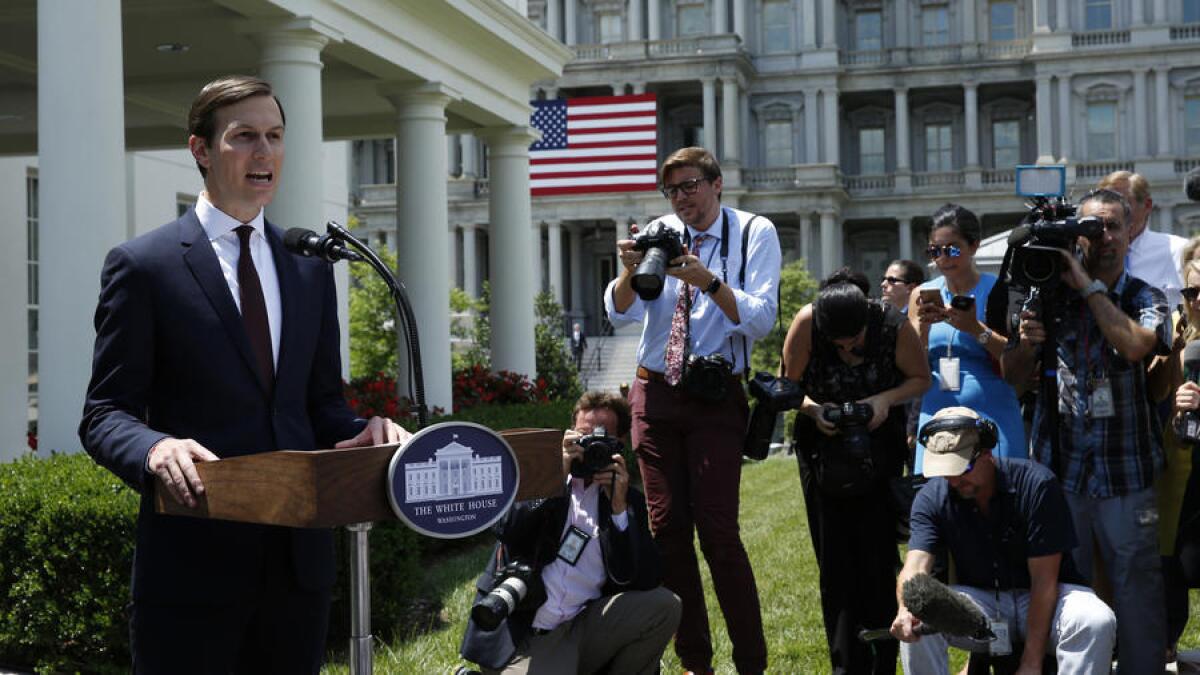
The Russian bank chairman with whom Jared Kushner said he met in December in the lead-up to President Trump’s inauguration did not do so under Kremlin orders, a spokesman for Russian President Vladimir Putin told reporters Tuesday.
Kushner, Trump’s son-in-law and senior advisor, disclosed during a Senate hearing Monday that he had met with Sergei Gorkov, the head of Russian state-owned Vnesheconombank, on Dec. 13. Kushner’s comments came as part of an ongoing congressional investigation into possible Kremlin meddling in the 2016 presidential election. The Kremlin has denied such interference.
Kushner said in his statement Monday the meeting was arranged at the suggestion of Sergei Kislyak, the outgoing Russian ambassador in Washington.
Vnesheconombank is a Russian development bank, and Gorkov was in the U.S. at the time of the meeting with Kushner for a routine roadshow. It‚Äôs ‚Äúnormal practice‚ÄĚ for a senior banker to hold meetings with U.S. representatives, Peskov said during a conference call with reporters.
‚ÄúThese contacts do not require any authorization from the Kremlin, and they were not carried out on behalf of the Kremlin,‚ÄĚ Peskov said.
Trump accuses Jeff Sessions of taking a ‚Äėvery weak‚Äô position on ‚ÄėHillary Clinton crimes‚Äô
President Trump is keeping up pressure on Atty. Gen. Jeff Sessions, taking to Twitter at daybreak Tuesday to accuse the former senator and campaign ally and advisor of taking a ‚ÄúVERY weak‚ÄĚ position at the Justice Department on ‚ÄúHillary Clinton crimes.‚ÄĚ
In a post shortly after 6 a.m. EDT, the president also said: ‚ÄúUkrainian efforts to sabotage Trump campaign ‚ÄĒ quietly working to boost Clinton. So where is the investigation A.G.‚ÄĚ He also tweeted: ‚ÄúAttorney General Jeff Sessions has taken a VERY weak position on Hillary Clinton crimes (where are E-mails & DNC server) & Intel leakers!‚ÄĚ
The social network flares sent out from the White House followed a pattern that intensified earlier this month with Trump‚Äôs harsh criticism of Sessions in an interview with the New York Times. Earlier, Trump referred to the attorney general in a tweet as ‚Äúbeleaguered.‚ÄĚ Trump has been angry that Sessions chose to recuse himself from the government‚Äôs investigation of Russian meddling in last year‚Äôs U.S. election.
McCain says he’ll return to Senate for healthcare vote
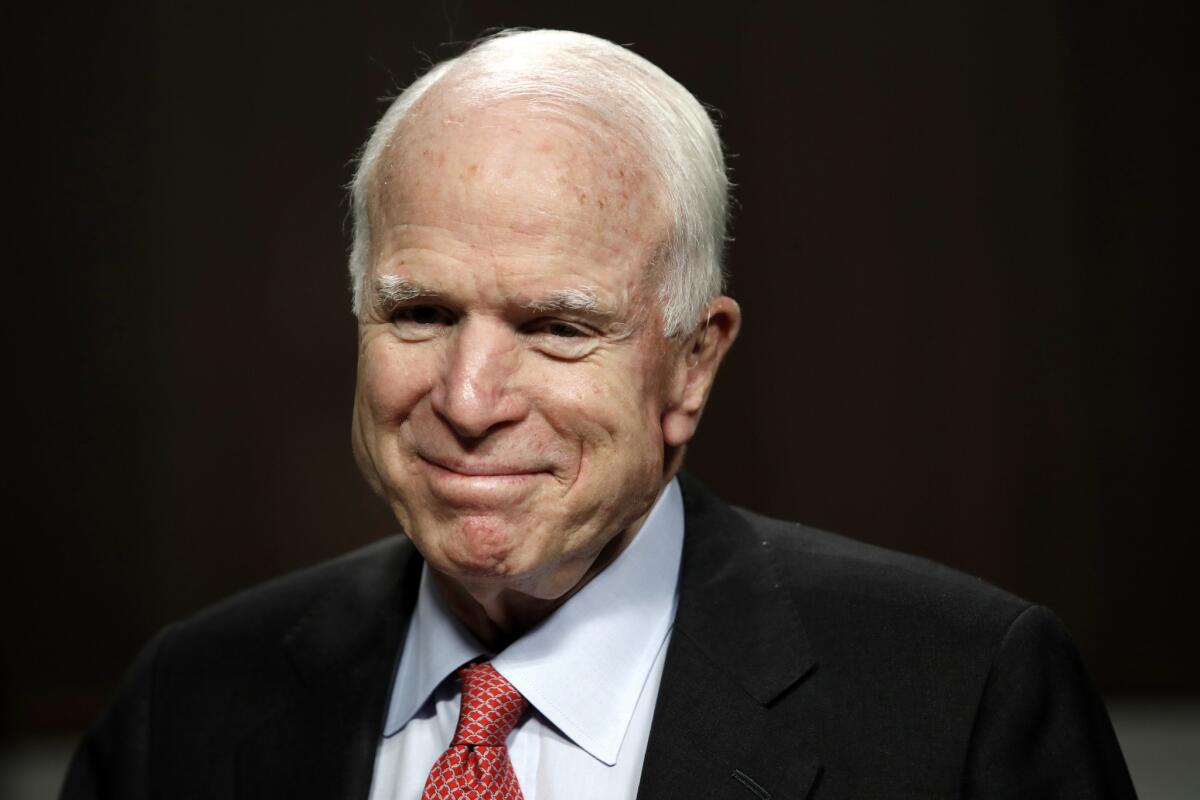
Sen. John McCain (R-Ariz.) is returning to the Senate on Tuesday to vote on GOP healthcare legislation just days after being diagnosed with a brain tumor.
McCain’s office made the dramatic announcement late Monday in a brief statement.
Senator McCain looks forward to returning to the United States Senate tomorrow to continue working on important legislation, including health care reform, the National Defense Authorization Act, and new sanctions on Russia, Iran and North Korea.
— Statement released by McCain‚Äôs office
Republicans are holding a high-stakes vote on Tuesday to open debate on legislation to repeal and replace the Affordable Care Act, also known as Obamacare.
They have almost no margin for error, making the presence of the 80-year-old McCain crucial if the vote is to succeed.
Trump slams GOP senators, ‚Äėdishonest‚Äô press, Obama and Clinton in a rambling speech to national Boy Scouts Jamboree
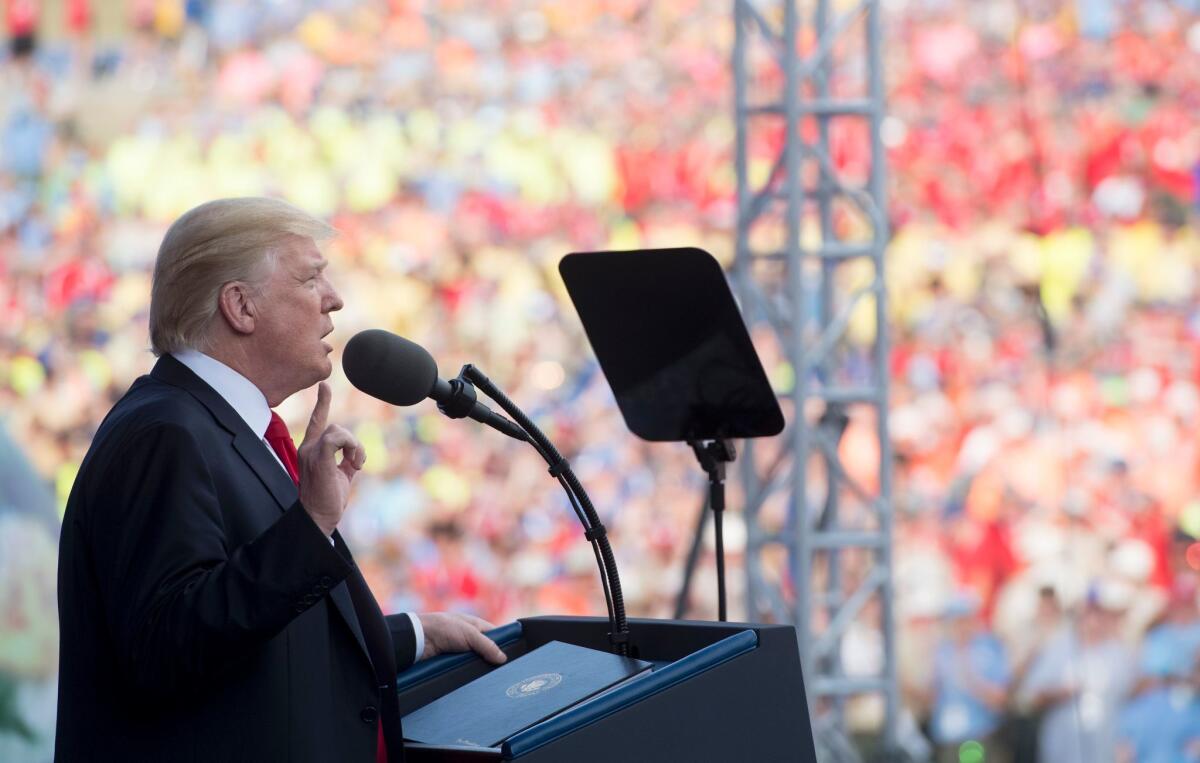
President Trump took jabs at Republican senators, ‚Äúdishonest‚ÄĚ reporters, his predecessor and his 2016 election rival in a rambling and surprisingly partisan speech before about 30,000 Boy Scouts and their troop leaders Monday evening in West Virginia.
In one aside during remarks to the National Scout Jamboree in Glen Jean, W.V., the president asked, ‚ÄúWho the hell wants to speak about politics when I‚Äôm in front of the Boy Scouts?‚ÄĚ Yet he launched into an extended a critique of Washington politics.
That included jibes at senators in his own party -- including by name the home state senator, Shelley Moore Capito -- who have balked at ending the Affordable Care Act and replacing it with a still uncertain plan that would cut hundreds of billions of dollars from Medicaid.
‚ÄúI go to Washington and I see all these politicians, and I see the swamp. In fact it‚Äôs not a good place -- we should change it from the swamp to the cesspool or perhaps use the word sewer,‚ÄĚ he said.
Trump introduced several of his Cabinet members who had been Boy Scouts, including Interior Secretary Ryan Zinke, there in Scout uniform; Energy Secretary Rick Perry’ and Health and Human Services Secretary Tom Price.
Price, the president said, ‚Äúis going to start our path toward killing this horrible thing known as Obamacare that‚Äôs really hurting us.‚ÄĚ
‚ÄúYou going to get the votes?‚ÄĚ Trump asked Price. ‚ÄúHe better get them,‚ÄĚ Trump told the enthusiastic youths. ‚ÄúOtherwise, I‚Äôm going to say, ‚ÄėTom, you‚Äôre fired!‚Äô‚ÄĚ
He added, ‚ÄúYou‚Äôd better get Sen. Capito to vote for it.‚ÄĚ
The Trump administration and Republican Senate leaders are pressing party colleagues to vote on Tuesday to allow debate on the House-passed healthcare measure so that they can then amend it with a different Senate version. They need at least 50 of the 52 Republican senators to consider the bill, a hurdle made more difficult with Sen. John McCain (R-Ariz.) undergoing treatment for a brain tumor.
Trump praised the Scouts for their pledges to be trustworthy and loyal, and encouraged them to ‚Äúnever quit‚ÄĚ and to ‚Äúdo something you love.‚ÄĚ But repeatedly he went off script to make political points.
‚ÄúWe could use some more loyalty, I could tell you that,‚ÄĚ Trump said of Republicans in Congress. Within the first minute he attacked the press -- ‚Äúfake news‚ÄĚ -- twice and came back to the subject of ‚Äúthese dishonest people‚ÄĚ later.
Of his predecessor, Trump interjected, ‚ÄúBy the way, did President Obama ever come to a jamboree? The answer‚Äôs no.‚ÄĚ When he vowed to kill Obamacare, the crowd chanted, ‚ÄúUSA! USA!‚ÄĚ
Trump criticized Democratic election opponent Hillary Clinton and recalled at length the surprise of his victory on Nov. 8, boasting of how red he’d made the TV networks’ maps of the states.
In one extended tangent that surely confused many Scouts, Trump described a long-ago cocktail party conversation with pioneering real estate developer William Levitt. Levitt was ‚Äúa very successful man,‚ÄĚ Trump told the Scouts, but sold his business and ‚Äúlost his momentum.‚ÄĚ Although Levitt is considered the architect of postwar American suburbia, he was also known for ensuring that properties were sold only to whites and non-Jews.
Doubts on Atty. Gen. Sessions’ tenure deepen amid Trump tweets and White House comments
Atty. Gen. Jeff Sessions faced increasing questions about his future on Monday, a day that began with a fresh public slap from his boss, President Trump, and continued with new calls to testify about his conversations with the Russian ambassador last year.
Sessions, the first senator to endorse Trump and a strong influence during last year’s campaign, raised the president’s ire earlier this year with his decision to step aside from overseeing the investigation into Russian interference in the 2016 election and any possible cooperation by people associated with the Trump campaign.
Sessions acted on advice from the department’s ethics lawyers, who said he should not play a role in an investigation involving a campaign on which he worked. But in a startling interview with the New York Times last week, Trump said Sessions’ decision to recuse was unfair to him, and he made it clear that he blamed Sessions for the fact that he is now facing a widening special counsel investigation.
Since then, things have gotten worse for the attorney general.
On Monday morning, Trump tweeted that Sessions was ‚Äúbeleaguered‚ÄĚ and questioned why the Justice Department wasn‚Äôt doing more to investigate Hillary Clinton‚Äôs dealings with Russia.
Later in the day, Trump’s new communications director, Anthony Scaramucci, did nothing to allay doubts about Sessions’ future, refusing to say in an interview whether Trump wants him to resign.
‚ÄúThey need to sit down face to face and have a reconciliation and a discussion of the future,‚ÄĚ he said in an interview with CNN. ‚ÄúThey need to speak and determine what the future of the relationship looks like.‚ÄĚ
Sessions visited the White House on Monday, sparking a quick flurry of speculation that he was about to resign or be fired.
But Justice Department spokesperson Sarah Isgur Flores said Sessions was there for a standing Monday lunch meeting with White House Counsel Donald McGahn. The attorney general had a discussion with McGahn and Tom Price, the Health and Human Services secretary, she said.
Sessions did not see Trump, she said, and no meeting with the president has been scheduled.
Sessions said last week that he has no plans to step down, saying he loved his job and would stay as long as it was ‚Äúappropriate.‚ÄĚ Flores said Monday that hasn‚Äôt changed. She had no comment on Scaramucci‚Äôs interview or on Trump‚Äôs ‚Äúbeleaguered‚ÄĚ comment.
Trump takes aim at Senate Republicans on healthcare
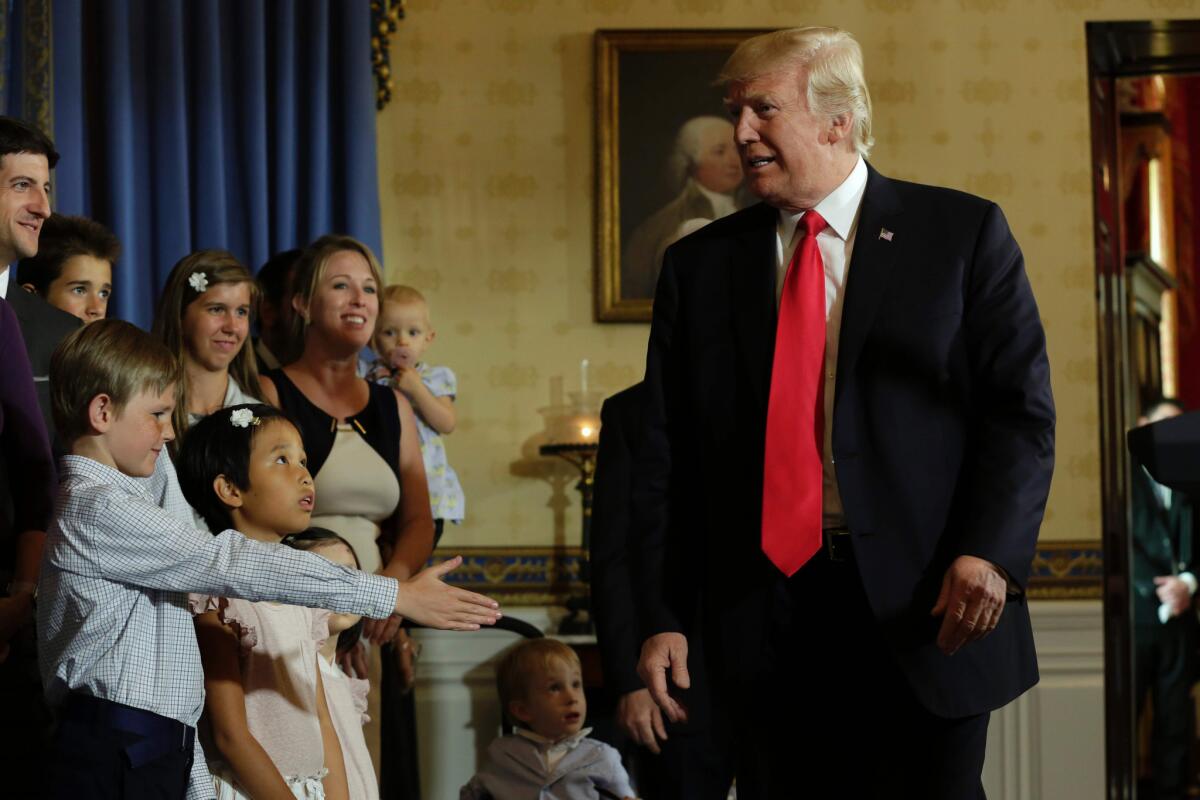
President Trump made a late-hour attempt to pressure Republican senators to act this week to repeal and replace the Affordable Care Act, commonly known as Obamacare.
‚ÄúFor Senate Republicans, this is the time to keep their promise. So many times they said, ‚Äėrepeal and replace,‚Äô‚ÄĚ Trump said at a White House event carried live on cable television news channels, with people he said were ‚Äúvictims of Obamacare‚ÄĚ arrayed behind him.
It was an unusual pitch, as a sitting president used the presidential bully pulpit to take his own party to task, at one point in mocking tones.
Republican Senate leaders are pressing party colleagues to vote on Tuesday to allow debate on the House-passed healthcare measure, so they can then amend it with a different Senate version. They need at least 50 of the 52 Republican senators to consider the bill, a hurdle made more difficult with Sen. John McCain (R-Ariz.) undergoing treatment for a brain tumor.
‚ÄúAny senator that votes against starting debate is saying they are fine with the Obamacare nightmare, which is what it is,‚ÄĚ Trump said.
The president stood in front of families he said had been hurt by increased premiums under the Affordable Care Act and by insurance companies withdrawing from state healthcare exchanges, and he condemned the existing program at length. But he made little affirmative case for a Republican alternative.
Trump said Democrats have provided ‚Äúzero help‚ÄĚ to come up with a solution to problems in the exchanges.
He called Democrats ‚Äúobstructionists‚ÄĚ but also focused his fire on Republicans. ‚ÄúThere‚Äôs been more than enough talk and no action. Now is the time for action,‚ÄĚ he said.
‚ÄėI had no improper contacts,‚Äô Kushner says after speaking to senators about Russia and election meddling
President Trump‚Äôs son-in-law and senior advisor Jared Kushner said Monday he ‚Äúdid not collude‚ÄĚ with Russia and doesn‚Äôt know of ‚Äúanyone else in the campaign‚ÄĚ who did.
Kushner, in a rare appearance before reporters at the White House, spoke within an hour of being interviewed behind closed doors on Capitol Hill by staff investigators of the Senate Intelligence Committee, which is looking into Russia’s meddling in the election and possible Trump campaign collusion.
‚ÄúLet me be very clear: I did not collude with Russia, nor do I know of anyone else in the campaign who did so,‚ÄĚ Kushner said, reading from a prepared statement.
‚ÄúI had no improper contacts. I have not relied on Russian funds for my businesses and I have been fully transparent in providing all requested information,‚ÄĚ he added.
Kushner is to meet with both members and staff of the House Intelligence Committee on Tuesday. His brief comments about his Senate session mostly repeated what he wrote in an 11-page statement he publicly released in advance of Monday’s questioning.
That statement was Kushner’s account of his contacts with Russians during the campaign and Trump’s post-election transition. He described four meetings with Russian nationals. Two of those were with Russia’s ambassador to the U.S. at the time, Sergey Kislyak.
Kushner initially did not disclose the meetings as required on forms he submitted to get a government security clearance for his White House job. He has since revised those forms several times.
In his comments outside the West Wing, Kushner added a political note, echoing his father-in-law in insisting that Trump won the election because of his appeal to voters, not because of help from any foreign government.
‚ÄúDonald Trump has a better message and ran a better campaign and that is why he won,‚ÄĚ Kushner said. ‚ÄúSuggesting otherwise ridicules those who voted for him.‚ÄĚ
Officials frequently speak to reporters on camera from just outside the West Wing doors, but the White House provided an unusual bit of stagecraft for the presidential son-in-law. Kushner spoke at a lectern that had been set up with a White House seal affixed.
After reading his prepared remarks, Kushner turned stiffly and walked back into the West Wing. He did not respond to questions shouted by reporters behind him.
Since the first questions were raised in March, I have been consistent in saying that I was eager to share any information I have with the investigating bodies and I have done so today. The record and documents I have voluntarily provided will show that all of my actions were proper and occurred in the normal course of events of a unique campaign. Let me be very clear: I did not collude with Russia, nor do I know of anyone else in the campaign who did so. I had no improper contacts. I have not relied on Russian funds for my businesses and I have been fully transparent in providing all requested information.
— Jared Kushner, senior advisor and son-in-law to Trump
Watch live: Jared Kushner to give a statement following hearing on Russia
Jared Kushner, Trump’s son-in-law and senior advisor, will give a statement at 10:15 a.m. following a closed session hearing with investigators and Senate Intelligence Committee members over Russian meddling in the election.
Early Monday, ahead of the hearing, Kushner’s representatives released an 11-page statement in which he described four meetings he had with Russians, including two with Ambassador Sergei Kislyak. He confirmed a report first published in the Washington Post that at a meeting in December, he had inquired about using a secure communications line at the Russian embassy to conduct talks with Russian officials.
Kushner did not initially disclose any meetings with Russians on forms he submitted to get a government security clearance. He has since revised those forms several times.
Democrats unveil ‚ÄėBetter Deal‚Äô agenda as party tries to retake Trump‚Äôs mantle on jobs, economy
Congressional Democrats launched a progressive-leaning economic agenda Monday as they try to wrestle the populist mantle from President Trump ahead of the 2018 midterm election.
Leaders of the House and Senate -- along with top lawmakers, including Sen. Elizabeth Warren (D-Mass.) -- believe their ‚ÄúBetter Deal‚ÄĚ platform of higher wages, child care support and job training will appeal to working families and those who abandoned the party last year to elect Trump.
‚ÄúIn the last two elections, Democrats, including in the Senate, failed to articulate a strong, bold economic program for the middle class and those working hard to get there,‚ÄĚ wrote Senate Minority Leader Charles E. Schumer (D-N.Y.) in an op-ed in the New York Times.
‚ÄúWe also failed to communicate our values to show that we were on the side of working people, not the special interests. We will not repeat the same mistake. This is the start of a new vision for the party.‚ÄĚ
House Minority Leader Nancy Pelosi pointed her criticism at Trump and Republicans, who control both the House and Senate, for spending their first six months of GOP control ‚Äútrying to raise Americans‚Äô health costs to fund tax breaks for billionaires.‚ÄĚ
‚ÄúDemocrats have a better approach,‚ÄĚ she wrote in the Washington Post.
Democrats headed to rural Berryville, Va., which is just the kind of outside-the-Beltway swing district, now held by Republican Rep. Barbara Comstock, that Democrats hope to flip in the 2018 midterm.
Democrats need to pick up 24 seats to control the House, which some analysts believe is possible because the party in the White House tends to lose as many seats in midterm elections.
The ‚ÄúBetter Deal‚ÄĚ agenda is filled with the kind of populist rhetoric championed by Trump -- and progressive favorites Warren and Sen. Bernie Sanders (I-Vt.) -- as it promises policies that aim to appeal to voter unrest over corporate ‚Äúmonopolies‚ÄĚ and the ‚Äúrigged‚ÄĚ economy. It promises a government ‚Äúon the sides of all Americans, not just those at the top.‚ÄĚ
As the minority party, the plan is merely a blueprint for future governing, rather than a legislative to-do list.
Republicans, under Speaker Paul D. Ryan, presented a similar document last year -- ‚ÄúA Better Way‚ÄĚ -- that was an aspirational check list of legislative goals to accomplish if in power.
Passing bills is a heavier political lift, but both parties use such documents as calling cards in the run up to the campaigns ahead.
‚ÄúThe feeling is that this is what we should be talking about,‚ÄĚ said Rep. Cheri Bustos (D-Ill.), part of the team that helped draft the document.
Bustos is that rare Democrat, among 12 in the House, who represents a district where voters elected Trump but also gave the Democrat another term in Congress.
‚ÄúThey feel like folks in Washington see this whole thing as a game -- winners and losers -- at the expense of people back home,‚ÄĚ she said in an interview. ‚ÄúPeople have the feeling that things are stacked against them.‚ÄĚ
She added: ‚ÄúIt‚Äôs our message to build an America where working people know we have their back.‚ÄĚ
‚ÄėI did not collude‚Äô with foreign officials, Jared Kushner says in advance of testimony
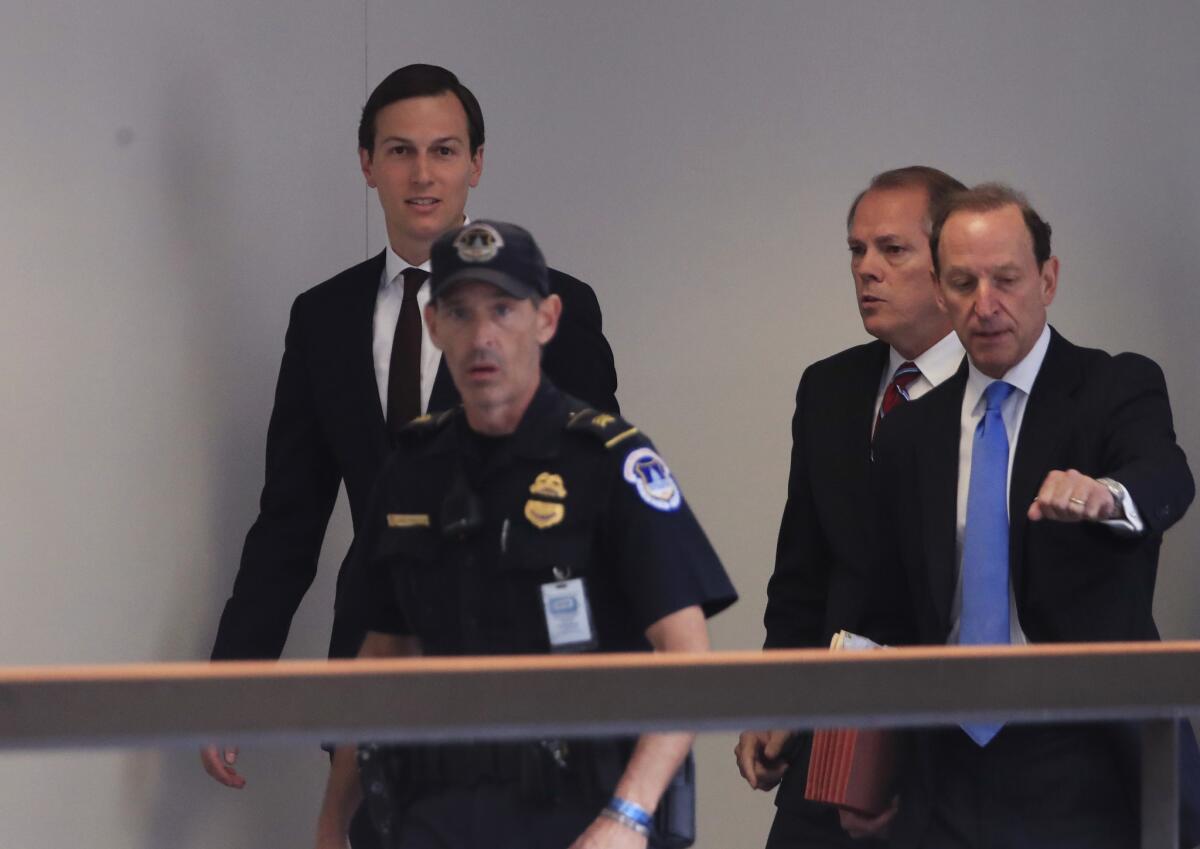
‚ÄúI did not collude‚ÄĚ and ‚Äúhad no improper contacts‚ÄĚ with Russia or any other foreign government, Jared Kushner, the president‚Äôs son-in-law and senior advisor, declared Monday.
Kushner’s representatives released the statement early Monday morning. Later in the day, he met with investigators and members of the Senate Intelligence Committee.
In the statement, Kushner described four meetings he had with Russians, including two with Ambassador Sergei Kislyak. He confirmed a report first published in the Washington Post that at a meeting in December, he had inquired about using a secure communications line at the Russian embassy to conduct talks with Russian officials.
Kushner did not initially disclose any meetings with Russians on forms he submitted to get a government security clearance. He has since revised those forms several times.
According to Kushner, the topic of secure communications came up after Kislyak asked if there was a secure line in the Trump transition office for a discussion about Syria between Trump transition officials and Russian generals.
Kushner said he suggested using a communications channel at the Russian embassy, but he denied the suggestion that he was trying to set up a secret back channel for communications between Trump advisors and the Kremlin.
Kushner did not say why he would not have used U.S. government secure communications for the discussion Kislyak wanted to have.
After Kislyak said using embassy facilities was not possible, they agreed to follow up after the inauguration, Kushner said.
‚ÄúNothing else occurred. I did not suggest a ‚Äėsecret back channel.‚Äô I did not suggest an ongoing secret form of communication for then or for when the administration took office,‚ÄĚ Kushner said.
He did not discuss lifting U.S. sanctions on Russia with Kislyak, Kushner added.
‚ÄúI did not raise the possibility of using the embassy or any other Russian facility for any purpose other than this one possible conversation in the transition period. We did not discuss sanctions.‚ÄĚ
Kushner said he also did not discuss sanctions at a Dec. 13 meeting with Sergey Gorkov, the head of Russian state-owned Vnesheconombank. He had the meeting at Kislyak‚Äôs urging because Gorkov had a ‚Äúdirect relationship‚ÄĚ with Russian President Vladimir Putin, he said.
‚ÄúI did not know or have any contact with Mr. Gorkov before that meeting, and I have had no reason to connect with him since,‚ÄĚ Kushner wrote.
Kushner also said he had not ‚Äúrelied on Russian funds‚ÄĚ to finance his real estate business.
‚ÄúI had no improper contacts. I have not relied on Russian funds to finance my business activities in the private sector,‚ÄĚ he said.
Later this week, Kushner is scheduled to meet with the House Intelligence Committee. Both panels are investigating Russian actions to sway the 2016 election in Donald Trump’s favor and whether any people associated with the Trump campaign cooperated in that effort.
The Senate panel plans two days of closed-door questioning of Kushner as part of its investigation.
Separately, Donald Trump Jr. and Paul Manafort are expected to be interviewed by investigators for the Senate Judiciary Committee, which is conducting its own probe. Those meetings will be behind closed doors, but the two are expected to testify publicly at some point, Judiciary Chairman Sen. Chuck Grassley of Iowa said last week.
Kushner also described a June 9, 2016, meeting with a Russian lawyer who claimed to have information damaging to Hillary Clinton.
The session was a ‚Äúwaste of our time,‚ÄĚ he said. No information about Clinton or the Democrats was discussed during the part of the meeting he attended, Kushner said, although he said he arrived late and left early.
Kushner said he knew nothing about the purpose of the meeting to which he had been invited by Trump Jr., his brother-in-law.
He said he did not read the lengthy email chain that Trump Jr. forwarded to him before the meeting. In those emails, the friend of Trump Jr.’s who set up the meeting said a Russian lawyer would deliver derogatory information about Clinton as part of Russia’s efforts to help Trump.
Once he arrived at the meeting and determined it was a poor use of his time, he sent a message to an assistant asking that someone call him on his cell phone to give him an excuse to leave, Kushner said.
He only became aware of the emails in recent weeks when his lawyers found them while going through his records, he said.
‚ÄúNo part of the meeting I attended included anything about the campaign, there was no follow up to the meeting that I am aware of, I do not recall how many people were there (or their names), and I have no knowledge of any documents being offered or accepted,‚ÄĚ he wrote.
In addition to that meeting and the two in December, Kushner, who is married to Trump’s daughter, Ivanka, said he had only one other meeting with a Russian during the campaign or transition. That was a brief encounter with Kislyakat a reception in the spring of 2016.
The meeting was so unmemorable, he said, that after the election, when Trump received a congratulatory message from Russian President Vladimir Putin, and Kushner was asked to authenticate it, he had to ask someone to remind him of the ambassador’s name.
He disputed a report by the Reuters news agency that he had two telephone calls with Kislyak, saying he had no recollection of that, and his lawyers had found no record of such calls.
Kushner also offered an explanation for having initially submitted a federal form for a security clearance that did not report his meetings with Russians or other foreigners, something the form specifically asks for.
He said his assistant had misunderstood a message from other staff members and had believed the form was complete when it was still just a draft. The assistant submitted the form, known as an SF-86, erroneously, he said, adding that his office had submitted updated information detailing his foreign contacts before that became the subject of news reports.
9:25 a.m.: This post was updated with Kushner’s arrival to meet with senators and with additional information.
Trump still harbors doubts about Russian hacking, new White House communications director says
President Trump still isn’t convinced that Russia meddled in last year’s presidential election, his new communications director says, despite the conclusions of the FBI and U.S. intelligence agencies.
Anthony Scaramucci said on CNN‚Äôs ‚ÄúState of the Union‚ÄĚ that an unidentified person had recently told him that if the Kremlin had in fact interfered, the United States would not have been able to detect the activity.
Pressed as to the identity of the person holding that opinion, Scaramucci said it was Trump.
‚ÄúHe called me from Air Force One,‚ÄĚ said Scaramucci. ‚ÄúAnd he basically said to me, ‚ÄėHey, you know, this is ‚ÄĒ maybe they did it. Maybe they didn‚Äôt do it.‚Äô‚ÄĚ
The U.S. intelligence community stated definitively in January that Russia was behind attempts to hack Democratic Party emails and influence the election in Trump’s favor.
Whether his campaign aides colluded in that effort is the subject of a widening criminal investigation by the special counsel, Robert S. Mueller III, as well as multiple inquiries in Congress.
Scaramucci, a former Wall Street hedge fund magnate who was named to Trump’s staff on Friday, said he has not yet obtained a security clearance to see classified information.
He said if he sees information in the future that convinced him that Russia had meddled in the election, he would not hesitate to tell the president.
In a series of Sunday talk show appearances, Scaramucci was also asked if Trump might pardon himself and family members and other associates if they were suspected of or found to have taken part in illegal activities. The president raised the issue Saturday in a statement on Twitter that he had an absolute right to issue pardons.
Asked on CNN if Trump was thinking of pardoning himself, Scaramucci called that a ‚Äúanother one of those stupid hypotheticals.‚ÄĚ
‚ÄúHe‚Äôs not going to have to pardon himself because he‚Äôs done absolutely nothing wrong,‚ÄĚ he said.
A senior member of Trump’s personal legal team, Jay Sekulow, made a similar assertion.
Sekulow, interviewed on ABC‚Äôs ‚ÄúThis Week,‚ÄĚ said the issue of a presidential self-pardon has ‚Äúnever been adjudicated‚ÄĚ in court because no president has ever issued one.
But he said that was irrelevant.
‚ÄúPardons are not on the table ‚Ķ there‚Äôs nothing to pardon from,‚ÄĚ he said.
Russia, Iran sanctions deal is said to clear way for House vote
Republican and Democratic leaders in the House appear to have reached a deal on a bill that would sharply limit President Trump’s ability to suspend or terminate sanctions on Russia.
If the bill ultimately passes, Trump would face a difficult choice ‚ÄĒ whether to veto a bill and fuel concerns that he is aiding Russian President Vladimir Putin while the FBI is investigating allegations of collusion with Moscow, or sign legislation that his administration strongly opposes.
The agreement to fix procedural concerns, add sanctions against North Korea and modify restrictions on the participation of U.S. energy companies in some international projects, clears the way for a House vote next week.
A version of the bill released by House Republican leaders follows passage of a Senate bill in June that would prohibit U.S. businesses from working on or supporting energy projects that include any participation by Russian companies, even outside Russia’s borders.
The House version would set a threshold for Russian involvement, applying that restriction to projects where sanctioned Russian entities have at least a 33% interest.
Sen. Ben Cardin of Maryland, the top Democrat on the Senate Foreign Relations Committee, said the revised legislation was ‚Äúthe product of intense negotiations.‚ÄĚ
With the changes, ‚Äúa nearly united Congress is poised to send [Russian] President Putin a clear message on behalf of the American people and our allies, and we need President Trump to help us deliver that message,‚ÄĚ Cardin said in a statement.
The legislation follows U.S. intelligence agencies’ assessments that Russia sought to influence the U.S. presidential election last year and tilt it toward Trump.
A special counsel and several congressional committees are investigating whether there was any collusion with Trump’s campaign.
The measure gained urgency as evidence emerged in recent weeks that members of Trump’s family and several top aides were in contact with Russians during the campaign last year.
White House officials asked lawmakers this month to reconsider the Russia provisions that the Senate added to an Iran sanctions bill that passed 98-2.
The new version also will include sanctions against North Korea, modeled after language that passed the House 419-1 in May and hasn’t been taken up by the Senate.
If the House passes the modified sanctions package, the Senate will have to hold another vote on the legislation that would now punish North Korea, Iran and Russia.
Could Trump pardon himself? No president ever has, and legal opinions are mixed
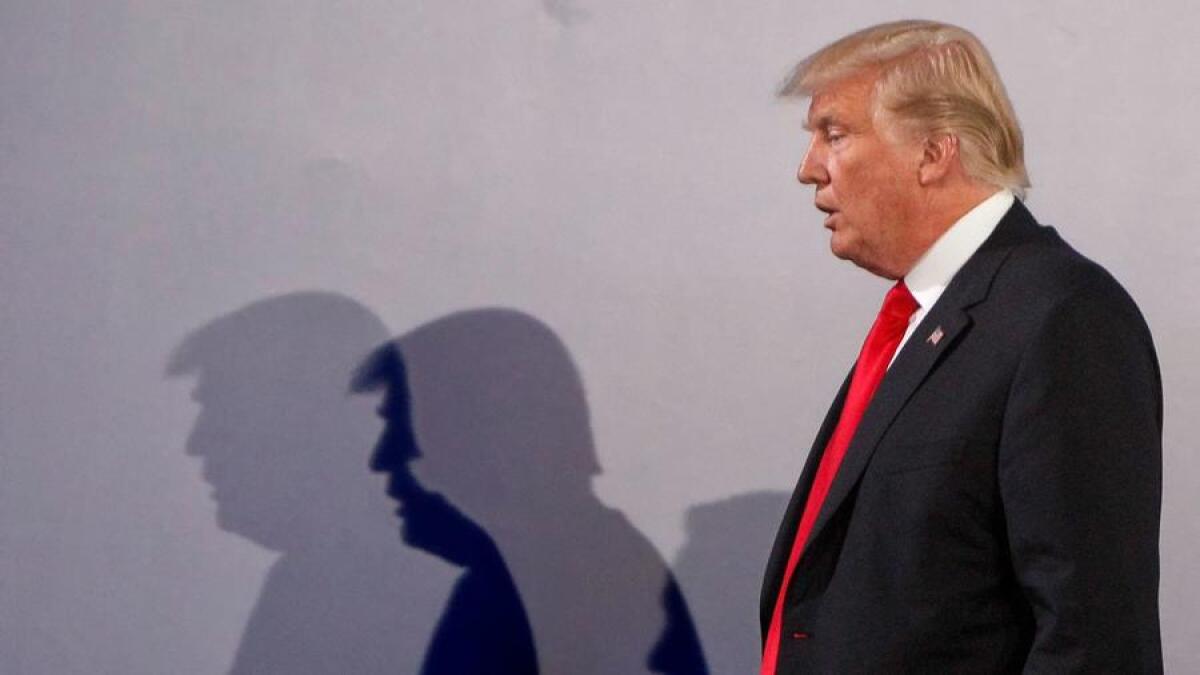
It’s not rare for presidents to dole out pardons. They’ve pardoned friends and felons, political donors and even a former president.
But can a president pardon himself? Well, we’ve now reached that question, six months into President Trump’s administration.
As a special counsel’s investigation into possible collusion between Trump’s presidential campaign and Russia continues, reports have surfaced in recent days that the president has inquired about pardoning family members and even whether he can give himself a pardon. Trump, in a report first published by the Washington Post, has questioned aides about the scope of his pardoning powers.
But could this happen? Here are some answers:
Trump tweets that the president ‚Äėhas complete power to pardon‚Äô
President Trump, in one of a long string of Saturday morning tweets venting various frustrations, confirmed that he is pondering presidential pardons related to the probe into his campaign’s potential collusion with Russia.
In the tweet, Trump said a president ‚Äúhas complete power to pardon,‚ÄĚ suggesting he believes he can pardon himself, or is at least not ruling it out.
There are mixed opinions as to whether the law would allow him to pardon himself.
But, he added, ‚Äúwhy think of that when only crime so far is LEAKS against us,‚ÄĚ using all caps a second time to complain about ‚ÄúFAKE NEWS.‚ÄĚ
In claiming not to be thinking about pardons, Trump revealed that he does indeed have them on his mind. The Washington Post reported Thursday that Trump has discussed pardons of close associates, and even himself, with staff in recent days.
Trump’s tweets underscored his growing concern about the Russia investigation and frustration with the media that is reporting it.
Trump also complained that Atty. Gen. Jeff Sessions and Robert Mueller, the special counsel looking into Russian election meddling, are not investigating Hillary Clinton and James Comey, whom Trump fired as FBI director, and lambasted the Washington Post and New York Times.
It‚Äôs likely that the tweets were not vetted by his staff or attorneys. He misspelled counsel as ‚Äúcouncil.‚ÄĚ
No public testimony next week for Trump Jr. and Manafort
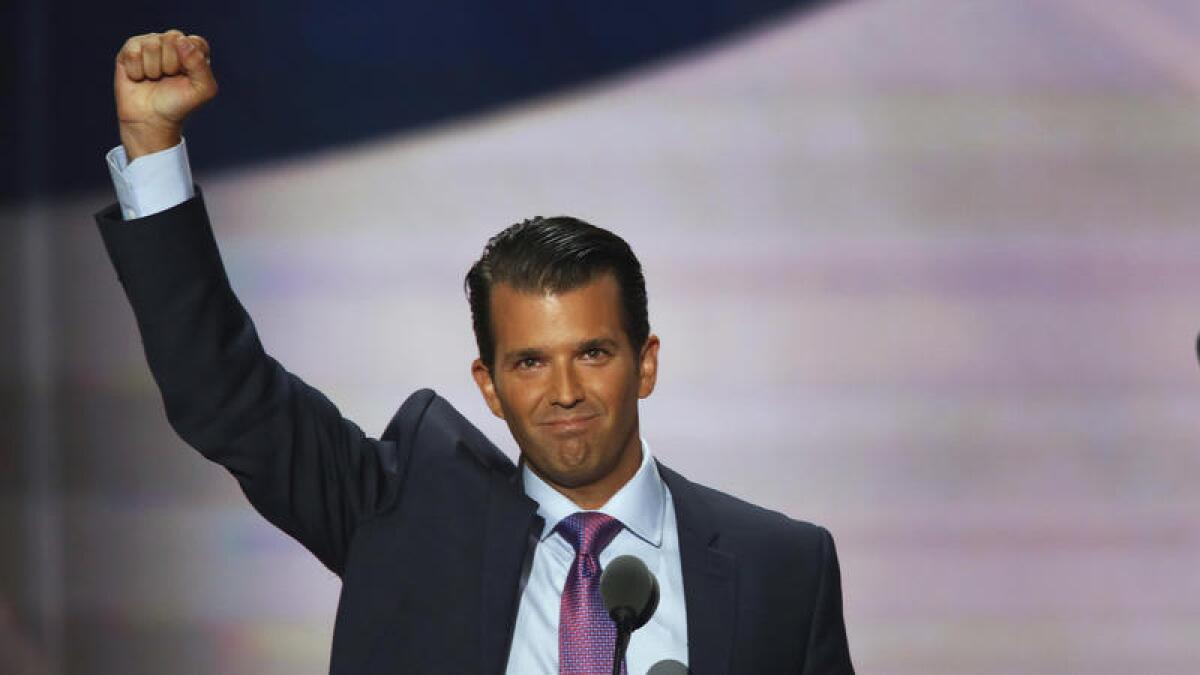
Donald Trump Jr. and Paul Manafort, the former Trump campaign manager, will not testify publicly next week under a deal worked out Friday with the Senate Judiciary Committee.
The two will meet with committee members and staff privately, the committee chairman, Sen. Chuck Grassley (R-Iowa), announced. Grassley said they were still expected to give public testimony later.
Grassley said that another witness, Glenn Simpson, the head of Fusion GPS, an investigative firm based in Washington, would be subpoenaed after declining to testify.
Simpson’s firm hired a former British spy, Christopher Steele, to look into reports that Russian intelligence held compromising information about Trump. Steele produced a lengthy dossier of reported kompromat, which became public shortly before Trump’s inauguration.
Trump has denied the accusations in the dossier.
Simpson’s attorney has said he would resist the subpoena, arguing that the committee’s questions would violate his client’s 1st Amendment rights as well as his 5th Amendment rights against self-incrimination.
Pentagon holds back $50 million from Pakistan for not pursuing Taliban network
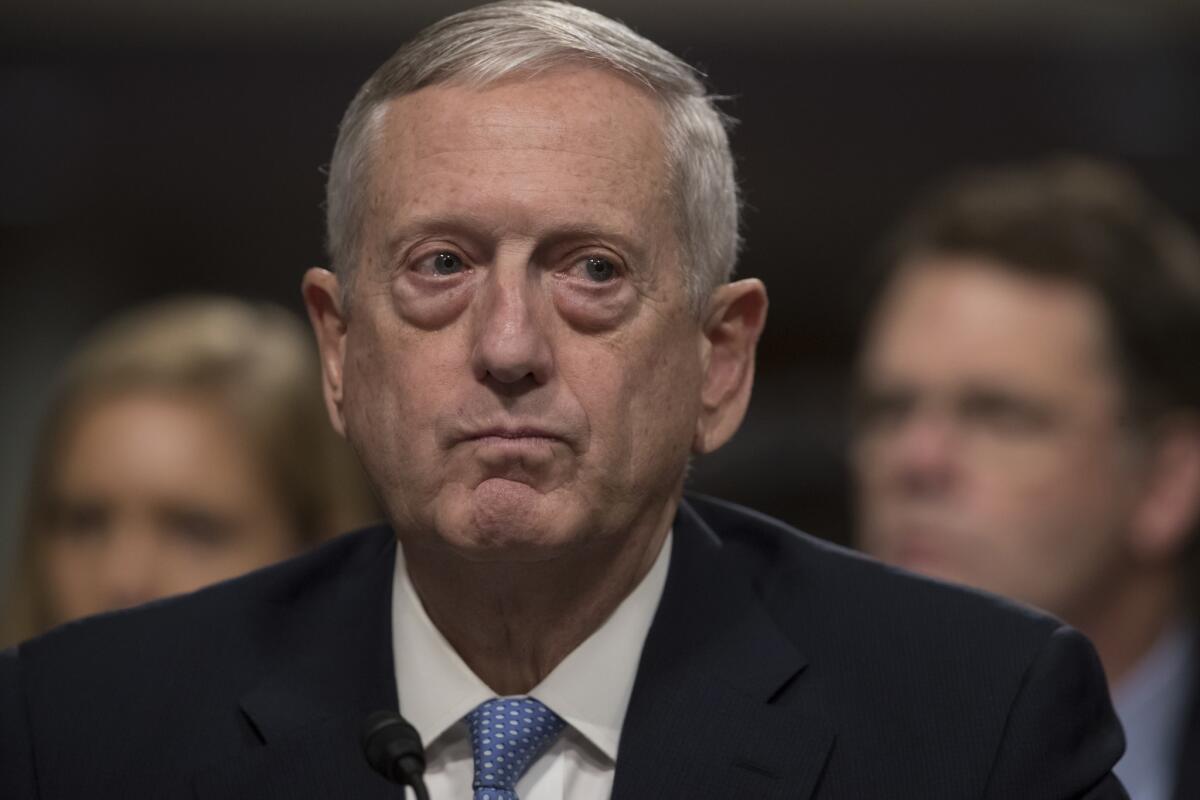
The Pentagon will withhold $50 million in reimbursements to Pakistan because it was unable to verify that Islamabad conducted adequate counter-terrorism operations against the Haqqani network, a hard-line branch of the Taliban, officials said Friday.
The decision comes as the Trump administration considers a tougher stance against Pakistan, an ostensible ally, as part of a new military strategy for the nearly 16-year-old war in neighboring Afghanistan.
Despite the $50-million cut, Pakistan received $550 million in U.S. aid in the last fiscal year for operations against militants in the Federally Administered Tribal Areas, or FATA, a rugged northwest region where the central government has limited control.
‚ÄúThis is simply an assessment on the current state of play,‚ÄĚ Defense Secretary James Mattis told a Pentagon news conference. ‚ÄúWe‚Äôre just defining the reality.‚ÄĚ
Washington has urged Pakistan to step up counter-terrorism operations against the Haqqani network for more than a decade with limited success.
The militants use Pakistan’s rugged tribal regions as sanctuary to launch assaults on U.S. and allied troops battling Taliban fighters across the border in Afghanistan.
Under U.S. law, the secretary of Defense is required to certify that Pakistan has taken aggressive action against the Haqqani network. Last year, the Pentagon held back $300 million in funds for not pursuing the group.
The United States reimburses foreign governments for the cost of military operations against certain militant groups under a program called the Coalition Support Fund.
Pakistan has been the largest beneficiary, taking in more than $14 billion since 2002.
‚ÄúPakistan‚Äôs efforts have reduced the ability of some militant groups to use North Waziristan and the FATA as a safe haven for terrorism,‚ÄĚ Pentagon spokesman Adam Stump said. ‚ÄúHowever, the Taliban and the Haqqani network continue to operate in other locations in Pakistan.‚ÄĚ
Aizaz Ahmad Chaudhry, Pakistan‚Äôs ambassador in Washington, said in a statement that it ‚Äúis a well-known fact that Pakistan‚Äôs counter-terrorism efforts have resulted in a significant decline in terrorists attacks.‚ÄĚ
Without naming the Haqqani network, he pointed to Pakistan’s recent counter-terror operations aimed at routing militant groups from the tribal areas.
‚ÄúPakistan has been a victim of terrorism and has paid a staggering human and financial cost over the past decade,‚ÄĚ he said.
U.S. relations with Pakistan have been fraught for years, and nose-dived after U.S. Navy Seals secretly flew into the country in 2011 and killed Al Qaeda founder Osama bin Laden at a compound in Abbottabad, a garrison town for the Pakistani military.
The Haqqanis have been a potent fighting force for years and U.S. officials believe they played a role in the Taliban’s recent resurgence in Afghanistan.
The Taliban holds more ground in Afghanistan today than at any point since the U.S.-led invasion in late 2001, according to recent U.N. estimates.
The Haqqani network dates back to the 1980s when Jalaluddin Haqqani organized fighters against Soviet troops that then occupied Afghanistan. He had links with Pakistani intelligence and the CIA, which both supported anti-Soviet militias.
Haqqani reportedly died in 2014, though it’s never been confirmed. His son Sirajuddin now leads the group.
The CIA launched thousands of drone strikes along the Afghan border in northwest Pakistan in the years after the 2001 terrorist attacks on New York and Washington.
U.S. officials believe those attacks killed numerous Haqqani leaders and forced its operatives into hiding, hampering the group’s ability to carry out attacks.
The CIA drone strikes, which were widely unpopular in Pakistan, largely stopped by late last year. They have resumed under President Trump as Afghanistan has suffered an alarming increase in terrorist attacks, especially in Kabul, the capital.
U.S. officials believe the Haqqanis were behind a massive bombing in Kabul that killed nearly 100 people in May. The group has not claimed responsibility, however.
New White House communications chief thanks Sean Spicer, who quit over the appointment
I want to thank personally Sean Spicer, not only on behalf of myself, the president, the administration, but Sean is a true American patriot. He is a military serviceman. He’s got a great family, and he’s done an amazing job. This is obviously a difficult situation to be in, and I applaud his efforts here, and I love the guy and I wish him well. And I hope he goes on to make a tremendous amount of money. 
— Anthony Scaramucci, Trump‚Äôs new communications director, whose appointment Sean Spicer reportedly resigned over
Trump keeps focus on ‚Äėfake‚Äô news
President Trump’s statement on Sean Spicer’s resignation
I am grateful for Sean’s work on behalf of my administration and the American people. I wish him continued success as he moves on to pursue new opportunities.  Just look at his great television ratings. Sean will continue to serve the administration through August.   
— Donald Trump
The Sean Spicer show comes to an end
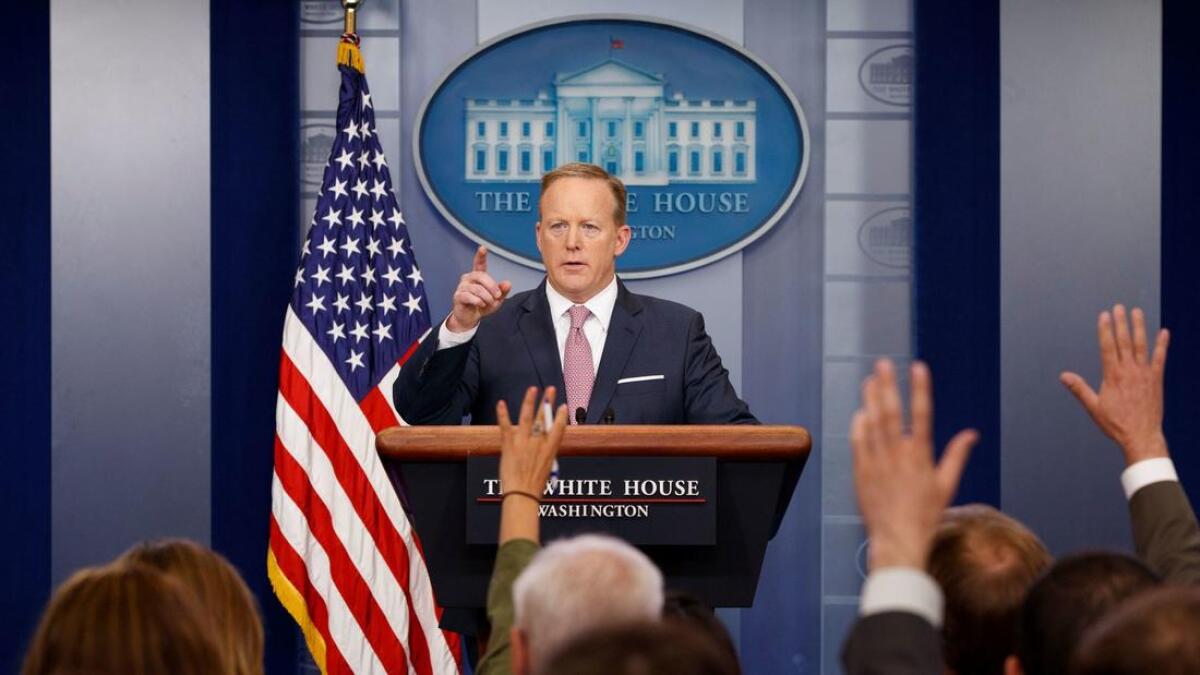
With White House press secretary Sean Spicer saying farewell, here’s a look back at his greatest hits (and misses).
Sean Spicer out as White House press secretary
White House Press Secretary Sean Spicer has resigned, it was announced Friday.
The decision came after President Trump hired Anthony Scaramucci, a New York financier, as communications director.
In a Twitter statement, Spicer said he will leave the White House in August.
For months, Spicer’s daily news briefings were must-see television although he took on a more behind-the-scenes role in recent weeks. Deputy Press Secretary Sarah Huckabee Sanders has largely taken over the briefings, with most of them taking place off-camera.
Spicer hasn’t given a news briefing since June 23.
Trump has grown increasingly frustrated with his administration’s agenda being overshadowed by the FBI’s investigation into Russian meddling in the presidential election and what he sees as the inability of the White House communications team to counter the steady drip of damaging headlines linking his campaign to the Russian government.
In recent weeks, Spicer has born the brunt of the president’s ire. Trump has told close advisors that Spicer had been beaten into submission by the press, according to a person close to Trump, and was no longer able to punch back forcefully enough.
Those concerns came to a head this week, as Spicer continued to be absent from the podium, and Scaramucci’s name was floated as someone who could jab and parry more effectively with the media.
Spicer was an ally of White House Chief of Staff Reince Priebus for whom he worked when Priebus headed the Republican National Committee.
Trump has admired Scaramucci’s defense of him on television. But Preibus and White House strategist Steve Bannon were reported to have opposed Scaramucci’s appointment.
Spicer’s out. At least we have the memories
UPDATE
9:47 a.m.: This post was updated throughout with additional details and background.
Watch live: Atty. Gen. Jeff Sessions discusses sanctuary city laws
Trump’s war with his Justice Department: Just his latest with major institutions and alliances
It would be hard to find someone more loyal to President Trump than Atty. Gen. Jeff Sessions.
He was the first senator to grab a cherry-red ‚ÄúMake America Great Again‚ÄĚ cap and endorse Trump for president, when few in Washington took Trump seriously. Now Sessions is perhaps the most zealous member of the president‚Äôs Cabinet, pressing his nationalistic agenda of tougher policies on crime and immigration.
Yet this week Trump all but declared war on Sessions for having recused himself from the Russia election-meddling investigation, as well as with nearly every top official at the Justice Department. In an interview Wednesday with the New York Times, the president said he regretted having chosen Sessions and once again raised the possibility of firing special counsel Robert S. Mueller III ‚ÄĒ a move that he could more easily accomplish if Sessions were out as attorney general.
Trump has shown repeatedly that he thrives on such fights with allies and enemies alike ‚ÄĒ to bend them to his will, to enforce loyalty or, failing that, to strike back.
Trump’s lawyers look for conflicts of interest among Mueller’s investigators amid a legal team shakeup
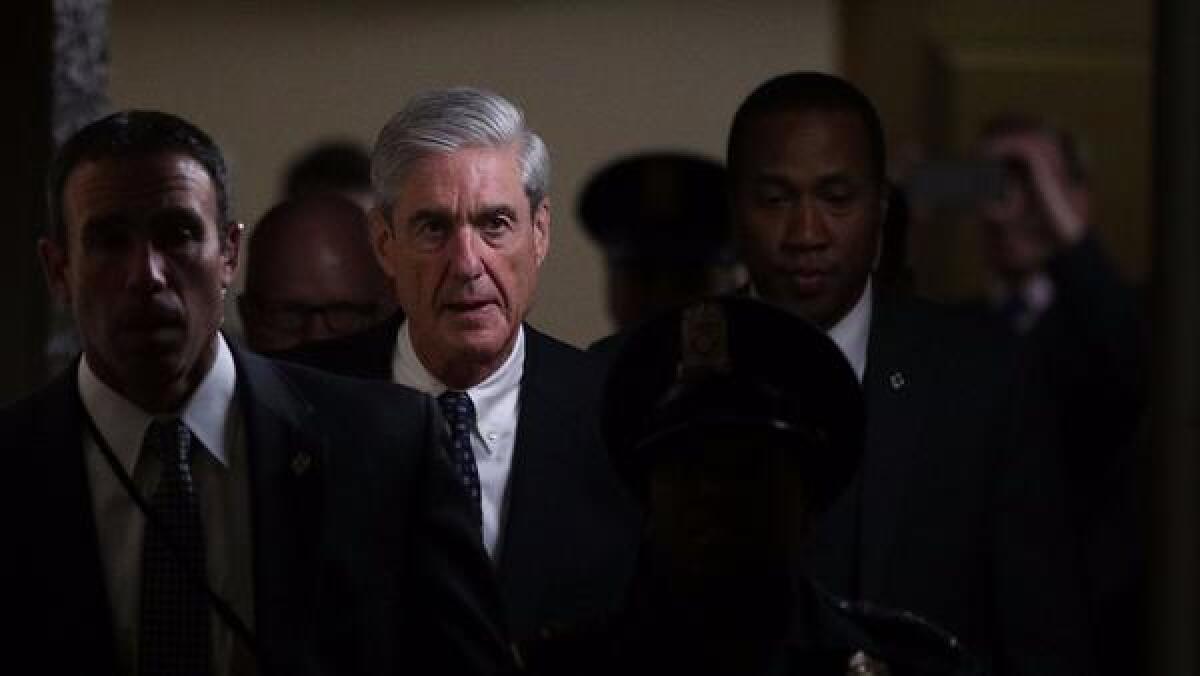
President Trump‚Äôs legal staff is evaluating potential conflicts of interest among members of special counsel Robert S. Mueller III‚Äės investigative team, according to three people with knowledge of the matter. The revelation comes as Mueller‚Äôs probe into Russia‚Äôs meddling in the 2016 U.S. presidential election appears likely to include some of the Trump family‚Äôs business ties.
Attorney Jay Sekulow, a member of the president‚Äôs external legal team, told the Associated Press on Thursday that the lawyers ‚Äúwill consistently evaluate the issue of conflicts and raise them in the appropriate venue.‚ÄĚ
Two of the people with knowledge of that process say those efforts include probing the political affiliations of Mueller’s investigators and their past work history. Trump himself has publicly challenged Mueller, declaring this week that the former FBI director would be crossing a line if he investigated the president’s personal business ties.
The focus on potential conflicts with Mueller‚Äôs team may well be an effort to distract from snowballing federal and congressional investigations into possible election-year coordination between Trump‚Äôs campaign and Russia. While Trump has assailed the probes as a partisan ‚Äúwitch hunt,‚ÄĚ the investigations have increasingly ensnared his family and close advisors, including son Donald Trump Jr. and son-in-law and White House senior advisor Jared Kushner.
As the investigations intensify, Trump’s legal team is also undergoing a shakeup. New York-based attorney Marc Kasowitz, whose unconventional style has irked some White House aides, is seen as a diminishing presence in the operation, according to the two people with knowledge of the matter.
John Dowd, an experienced Washington attorney, is expected to step up his role on the president’s outside legal team, which also includes Sekulow. They’re just a few of the fast-growing cadre of attorneys stepping up to represent the president, his family and close advisors as the investigations continue to expand.
In another sign of a shakeup, Mark Corallo, who has been working as a spokesman for the legal team, is no longer part of the operation, according to those familiar with the situation. They insisted on anonymity because they were not authorized to discuss the matter publicly.
State Department to ban Americans from traveling to North Korea
The State Department said Friday it will prohibit U.S. citizens from traveling to North Korea starting late next month, citing the risk of arrest and imprisonment by the authoritarian regime.
The move follows the death of an American student last month who was imprisoned for nearly 18 months in Pyongyang before he was flown home to Ohio in a coma.
The State Department long has advised Americans not to visit but the decision by Secretary of State Rex Tillerson flatly bars use of U.S. passports ‚Äúto travel in, through, or to North Korea,‚ÄĚ spokeswoman Heather Nauert said in a statement.
Several hundred Americans visit North Korea each year on tour groups that specialize in the country. Some aid workers, journalists and academics also travel there.
Actions that are not criminal, or not major crimes, elsewhere can lead to harsh punishment under North Korea’s totalitarian system. More than a dozen Americans have been arrested and detained since 2009, and three are still held there.
Nauert said Tillerson decided to ban U.S. travel to North Korea ‚Äúdue to mounting concerns over the serious risk of arrest and long-term detention‚ÄĚ there.
‚ÄúThe safety and security of U.S. citizens overseas is one of our highest priorities,‚ÄĚ she added.
The restriction will be published next week in the Federal Register and take effect 30 days later. Exceptions can be made on a case-by-case basis for some humanitarian travel, Nauert said.
The action comes as President Trump grapples to find a strategy to pressure North Korea to rein in its robust nuclear weapons and ballistic missile tests in a period of rising tensions.
In April, Trump personally sought the help of Chinese President Xi Jinping to influence North Korean leader Kim Jong Un, but that strategy has largely failed to produce results.
Since then, the administration has added new sanctions on people or companies, including some in China, that do business in or with North Korea.
Earlier this month, North Korea tested a missile that flew a trajectory that U.S. experts said indicated an ability for the first time to cross the Pacific and potentially threaten the United States.
U.S. officials say the country has yet to build a nuclear weapon small enough to fit atop a missile and survive, but that is probably a matter of time.
The State Department announcement focused, however, on the risk of arrests and imprisonment.
A University of Virginia student, Otto F. Warmbier, was arrested at the end of his trip to Pyongyang with a tour group in January 2016 for attempting to steal a propaganda poster from his hotel.
Two months later, he was sentenced to 15 years in prison with hard labor. In June, he was released on medical grounds and flown to Cincinnati in a coma. He died six days later.
Warmbier’s family says they have not received a satisfactory explanation of what happened.
North Korea said Warmbier contracted botulism shortly after he was imprisoned, was given a sleeping pill and never woke up. U.S. doctors did not find that version plausible.
For ‚ÄėMade in America‚Äô week, Trump campaign highlights Southern California factory that makes his MAGA hats

Remember that Southern California factory that makes most of Donald Trump‚Äôs ‚ÄúMake America Great Again‚ÄĚ hats?
This week, the president’s campaign wants you to.
It‚Äôs ‚ÄúMade in America‚ÄĚ week, an initiative by the Trump administration to highlight products made in each of the 50 states.
A statement released Thursday by Trump‚Äôs reelection campaign reiterated its commitment to selling American-made merchandise, saying it has ‚Äúproudly produced and manufactured all of our merchandise right here in America from day one.‚ÄĚ
The statement linked to a video published by the campaign in May, which gives an inside look at the Carson, Calif. factory of Cali-Fame, where many of the hats are produced. In it, company president Brian Kennedy says Cali-Fame has made ‚Äújust under a million hats‚ÄĚ since the campaign began and calls them ‚Äúthe official cap, making America great again‚ÄĚ despite knockoffs made elsewhere.
The Los Angeles Times was the first to get a glimpse inside the factory making the Trump hats, where many of the workers are immigrants from Mexico and El Salvador. Kennedy assured The Times then that the hats and their materials were all made in the U.S.
But the claim hasn’t been without controversy. Following The Times’ story, a fiber analysis done by an expert for the Associated Press found that at least one hat was not made of the all-American-made fabric the manufacturer says is used for the hats.
‚ÄúI pay a good price for that hat,‚ÄĚ Trump said at the time. ‚ÄúIf it‚Äôs not made in the USA, we‚Äôll bring a lawsuit.‚ÄĚ
But Thursday‚Äôs statement, and the video released in May, seemed to strike a different tone, saying the ‚Äúnow-famous MAGA hats‚ÄĚ are ‚Äú100% Made in the USA.‚ÄĚ
Kennedy did not respond to a request for comment.
The statement appeared to be in response to renewed questions this week about Trump‚Äôs corporate brands that continue to manufacture goods abroad despite the president‚Äôs campaign promise to get the country to ‚Äúbuy American and hire American.‚ÄĚ
At a news briefing earlier this week, White House spokesman Sean Spicer responded to questions about foreign-made goods in Ivanka Trump‚Äôs fashion line, saying it was ‚Äúinappropriate‚ÄĚ to discuss the president‚Äôs business empire and that it was still an ‚Äúoverall objective‚ÄĚ of the administration to grow manufacturing stateside.
Cancer diagnosis spotlights Sen. John McCain’s rare ability to bring partisans together
John McCain, with his short fuse and lashing tongue, is not always an easy man to like, or to get along with.
The Arizona senator acknowledged as much in a wry tweet he dispatched Thursday morning ‚ÄĒ candor and self-deprecation always being two of his strongest, most appealing suits.
‚ÄúI greatly appreciate the outpouring of support,‚ÄĚ McCain wrote hours after revealing he had been diagnosed with an aggressive form of brain cancer. ‚ÄúUnfortunately for my sparring partners in Congress, I‚Äôll be back soon, so stand-by!‚ÄĚ
At a time of bone-deep political division, the two-time Republican presidential hopeful is a rare unifier.
Conservative, temperamental, pugnacious, he nevertheless commands not just respect but a deep regard among Democrats, Republicans and the reporters who cover them.
The bulletin on his health Wednesday night brought a flood of tributes and the sort of hopeful wishes to be expected from the White House and bipartisan leaders of Congress.
More striking were the heartfelt paeans from his ideological opposites.
White House says Trump actually does have confidence in Atty. Gen. Jeff Sessions, for now
President Trump still has confidence in Atty. Gen. Jeff Sessions and special counsel Robert S. Mueller III’s job is safe, at least for now, White House spokeswoman Sarah Huckabee Sanders told reporters on Thursday.
‚ÄúHe was disappointed in Atty. Gen. Sessions‚Äô decision to recuse himself‚ÄĚ from the Justice Department investigation into potential collusion last year between the Russian government and the Trump campaign, Sanders said. ‚ÄúBut clearly he has confidence in him or he would not be the attorney general.‚ÄĚ
That was unclear, however, after the scathing comments Trump made in an interview with the New York Times published late Wednesday. The president lashed out at the top leaders at the Justice Department and FBI, but especially at Sessions, provoking immediate speculation whether the attorney general would resign or be fired.
On Thursday, Sessions told reporters he would continue in his job as long as ‚Äúappropriate.‚ÄĚ
In the interview, Trump said he would not have picked Sessions, the former Alabama senator who was one of his earliest and closest supporters, had he known Sessions would recuse himself from the Russia investigation.
Sessions’ recusal early in the administration, which was widely praised at the time given his own previously undisclosed contacts with Russian officials during the 2016 campaign, began a series of developments that led to the appointment of Mueller as special counsel in May.
Trump also accused Mueller, a former FBI director, as well as others in his office and at the top of the Justice Department of having conflicts of interest.
Sanders said that if Trump wanted Sessions to resign, he would not use hints.
‚ÄúYou know this president well enough to know that if he wanted somebody to take an action he would make that quite clear,‚ÄĚ she said.
But in the case of Mueller, she did not back off Trump‚Äôs implied threat in the interview that the president could try to have him removed as special counsel should Mueller‚Äôs investigation expand to encompass Trump‚Äôs financial affairs. Sanders said only that his job is safe ‚Äúat this time.‚ÄĚ
‚ÄúI can‚Äôt predict everything that could possibly take place in the future and what Mueller could potentially do,‚ÄĚ she said.
Sanders fended off several questions about whether Trump was threatening Mueller or the independence of the investigation and of the Justice Department generally.
Asked whether the president believes Sessions serves him personally or is beholden to the Constitution, she said, ‚ÄúI think that‚Äôs kind of a ‚Äėboth‚Äô.‚ÄĚ she said.
‚ÄúObviously the attorney general‚Äôs job is to follow and uphold the Constitution, but also every member of the Cabinet and the administration serves at the pleasure of the president,‚ÄĚ Sanders said.
Americans are paying more attention to politics, and finding it stressful
Americans are paying more attention to politics since Donald Trump’s election, but many find the experience a stressful one, according to new data from the nonpartisan Pew Research Center.
Just over half of those surveyed by Pew said they were paying more attention to politics since Trump’s victory; only about one in eight said they were paying less attention, and one-third said their level of attention had not changed.
Women were especially likely to say they were paying more attention to politics, with about six in ten saying so, compared with just under half of men.
About one in six Americans said they had attended a political event since the election, with most of those saying the events were opposed to Trump or his policies.
About six in ten said that they found talking about politics with people who disagree about Trump ‚Äústressful and frustrating,‚ÄĚ compared with 35% who find such conversations ‚Äúinteresting and informative.‚ÄĚ
Democrats were more likely than Republicans to say they found conversations with the other side about Trump to be stressful, with about seven in ten Democrats and about half of Republicans taking that position.
A much smaller share of the public, about one in five, said that knowing that a friend supported Trump would strain the friendship. Among Democrats, college graduates and liberals were the most likely to take that position, with about four in ten college-educated Democrats saying so.
Aside from politics, most partisans of both parties, however, said that followers of the opposing party ‚Äúprobably share many of my other values and goals.‚ÄĚ
For all the polarization that has surrounded Trump’s administration, the percentage of Americans who said that members of the other party did not share their values and goals is lower now than it was a decade ago, during the final years of the George W. Bush administration.
Conservative Republicans were the most likely to say that members of the other party don‚Äôt share their values ‚ÄĒ nearly half took that position. Among liberal Democrats, about four in ten did so.
The Pew data is based on a survey conducted June 27 to July 9 among a national sample of 2,505 adults. The results have a margin of error of 2.2 points in either direction.
AlphaBay, the largest marketplace on the dark web, is seized by U.S.
The Justice Department announced Thursday that it had seized AlphaBay, the Internet’s largest secret marketplace for drugs and other crime, in the government’s latest effort to penetrate the so-called dark web.
AlphaBay operated on the encrypted Tor network and carried more than 250,000 listings for drugs, including heroin and powerful synthetic opioids, officials said.
The two-year-old site was 10 times larger than Silk Road, the notorious online marketplace seized in 2013.
Andrew McCabe, acting director of the FBI, said the case should serve as a warning that authorities will crack down on encrypted websites that support criminal enterprises.
‚ÄúThey‚Äôre living on borrowed time,‚ÄĚ he said at a news conference at the Justice Department.
Alexandre Cazes, 25, who was accused of owning the site, was arrested in Thailand on July 5; authorities seized millions in digital currencies, officials said.
Cazes, a Canadian citizen, died in Thai custody a week later in what officials said was an apparent suicide.
At the time, authorities in the Netherlands were secretly monitoring another dark web marketplace called Hansa and were watching as AlphaBay’s sellers flocked to the site.
Hansa was also seized Thursday, and U.S. authorities say the evidence in that case will lead to more arrests in Europe.
More than two-thirds of the sales listings on AlphaBay were for illicit drugs, authorities said, but people also used the site to sell firearms, counterfeit goods, fake identification documents and malware for cybercrimes.
Atty. Gen. Jeff Sessions said drugs sold on the site have been linked to several deaths in the U.S., including a 13-year-old boy in Park City, Utah, who died after taking a synthetic drug that a classmate had bought on AlphaBay.
‚ÄúThe dark net is not a place to hide,‚ÄĚ Sessions said.
Trump says he sat with Putin at dinner because the wife of Japan’s leader doesn’t speak English. But she does.
President Trump says he went over to chat with Russian President Vladimir Putin during a dinner in Germany this month because his seat mate, the wife of Prime Minister Shinzo Abe, didn’t speak any English.
Akie Abe ‚Äúdoesn‚Äôt speak English ‚Ķ like, not ‚ÄėHello,‚Äô‚ÄĚ Trump told the New York Times in an interview Wednesday.
Not so.
Mrs. Abe, the daughter of a wealthy Japanese family, attended a private Roman Catholic international school in Tokyo before she attended college.
The elementary-through-high-school academy, the Sacred Heart School, includes rigorous English-language instruction as part of its curriculum.
Social media swiftly found clips of the 55-year-old Abe making speeches in somewhat accented but perfectly serviceable English.
Trump’s dinnertime encounter with Putin at the Group of 20 summit in Hamburg has come under scrutiny because the White House did not disclose it for ten days and because no other U.S. official, not even an interpreter, was privy to the conversation.
Putin used his own interpreter and there is no U.S. record of what was said other than Trump‚Äôs assertion in the interview that the two leaders discussed ‚Äúadoption.‚ÄĚ
Putin cut off adoptions of Russian children by Americans several years ago in retaliation for U.S. sanctions against Russian figures accused of human rights abuses.
Some veteran diplomats and foreign policy experts have expressed alarm over the U.S. and Russian presidents having an extended discussion without any official record or aides present.
Trump said in the interview that he and Putin spoke for about 15 minutes. Other accounts have said the two talked for closer to an hour.
While some social media speculated that Mrs. Abe deliberately did not speak to Trump, a deliberate snub is highly unlikely.
Even if Mrs. Abe had decided she could express herself better in Japanese, there was an interpreter tasked with assisting her as needed.
Moreover, it would be almost unheard of for a Japanese figure in public life and in a formal social setting, to behave with deliberate rudeness.
She also once worked as a radio disc jockey, pointing to a likely ability to engage in easy patter when necessary. (Her on-air name was ‚ÄúAkky.‚ÄĚ)
The flap over her non-conversation with Trump, however, generated a fresh social-media backlash over Abe’s involvement in right-wing causes.
Both she and her husband have become figures in a scandal in Japan over an ultra-nationalist kindergarten, with some alleging that the two made a secret donation to the school.
Sen. John McCain tweets ‚ÄėI‚Äôll be back soon, so stand-by!‚Äô
Sessions says he‚Äôll stay on the job ‚Äėas long as that is appropriate‚Äô
We love this job, we love this department and I plan to continue to do so as long as that is appropriate. I’m totally confident we can continue to run this office in an effective way.
— Atty. Gen. Jeff Sessions responding to questions about President Trump‚Äôs bitter complaints about him.
Atty. Gen. Jeff Sessions said Thursday he has no immediate plans to resign as the nation’s top lawman despite President Trump’s sharp criticism of him for recusing himself from the investigation into Russia’s interference into the 2016 presidential election.
Trump said in an interview Wednesday that he never would have chosen Sessions to head the Justice Department if he had known Sessions would remove himself from the high-stakes probe, a decision that ultimately led to appointment of a special counsel.
Sessions told reporters at a news conference that he still shares Trump’s priorities to crack down on crime, and said he is focused on leading the department.
‚ÄúWe love this job, we love the department, and I plan on continuing to do so as long as that is appropriate,‚ÄĚ Sessions said. ‚ÄúI‚Äôm totally confident we can continue to run this office in an effective way.‚ÄĚ
In the interview with the New York Times on Wednesday, Trump slammed Sessions‚Äô decision to recuse himself from the FBI investigation of alleged Trump campaign cooperation with Russia as ‚Äúvery unfair to the president.‚ÄĚ
‚ÄúSessions should have never recused himself, and if he was going to recuse himself, he should have told me before he took the job and I would have picked somebody else,‚ÄĚ Trump said.
Trump’s criticism of Sessions was especially striking because the former four-term U.S. senator from Alabama was one of Trump’s earliest and most loyal campaign advisors. His comments also amounted to an attack on the independence of the Justice Department and the FBI.
‚ÄúHow do you take a job and then recuse yourself? If he would have recused himself before the job, I would have said, ‚ÄėThanks, Jeff, but I‚Äôm not going to take you.‚Äô It‚Äôs extremely unfair ‚ÄĒ and that‚Äôs a mild word ‚ÄĒ to the president,‚ÄĚ Trump told the Times.
Sessions announced his recusal in March after news reports revealed that he had failed to tell his Senate confirmation hearing about several private meetings he held with the Russian ambassador during the campaign.
Sessions later said that he stepped back from the probe to avoid a conflict of interest because he had played such a prominent role in Trump’s presidential campaign.
Sessions did not say Thursday if he had talked with Trump since the interview was published or if a conversation was scheduled. A Justice Department spokesman said he was not aware of any planned meetings between Sessions and the president.
In the interview, Trump also excoriated both Deputy Atty. Gen. Rod Rosenstein, the No. 2 man in the Justice Department, and Robert S. Mueller III, the special counsel who Rosenstein appointed in May to lead the Russia investigation.
Trump said he was unhappy that Rosenstein, a career federal prosecutor and former U.S. attorney in Maryland, came from mostly Democratic Baltimore.
Trump made clear that he was growing impatient with the FBI investigation and said Mueller would be committing a ‚Äúviolation‚ÄĚ if he moved beyond the Russian meddling in the 2016 election began looking into Trump‚Äôs business interests.
Rosenstein did not directly respond to Trump’s criticisms during the news conference Thursday.
‚ÄúAs the attorney general said, we are working here every day to advance the priorities of the Department of Justice,‚ÄĚ he said.
Exxon Mobil fined $2 million for violating sanctions against Russia when Rex Tillerson was CEO
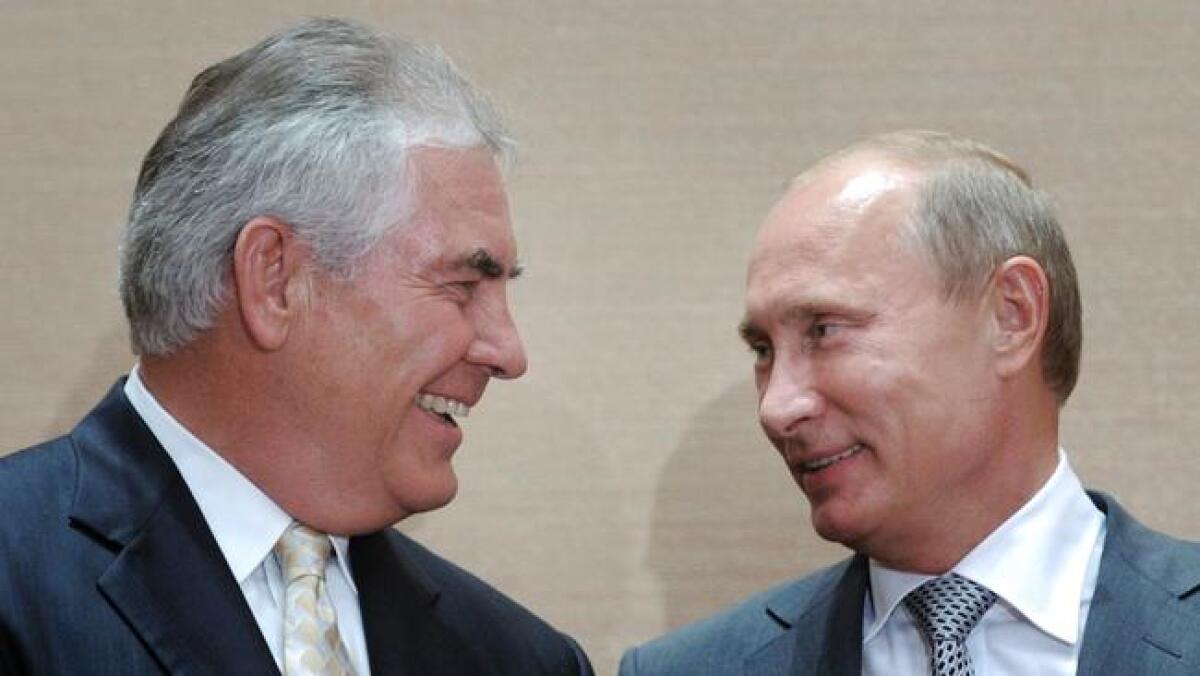
Exxon Mobil Corp. showed ‚Äúreckless disregard‚ÄĚ for U.S. sanctions on Russia three years ago while Secretary of State Rex Tillerson was the oil giant‚Äôs chief executive officer, the Treasury Department said Thursday.
It fined the company $2 million, the maximum civil penalty under the law, calling the violation an ‚Äúegregious case.‚ÄĚ
Exxon ‚Äúis a sophisticated and experienced oil and gas company that has global operations‚ÄĚ and should know better when it comes to U.S. sanctions, Treasury said.
The Texas-based company has denied wrong doing and indicated late Thursday that it would sue the U.S. government to block the fine.
In a statement, Treasury said Exxon had violated U.S. sanctions when it signed contracts in May 2014 with Russian oil magnate Igor Sechin, chairman of government-owned energy giant Rosneft.
The Obama administration had blacklisted Sechin, Tillerson’s longtime business associate, as part of its response to Moscow’s annexation of Crimea and its support for armed separatists in eastern Ukraine.
The same month Exxon signed the contracts, Tillerson said the energy company generally opposes sanctions and finds them ‚Äúineffective.‚ÄĚ
Since taking over the State Department, however, Tillerson has declared that U.S. sanctions will stay in place until the Kremlin reverses course in Ukraine and gives back Crimea to the government in Kiev.
‚ÄúThe U.S. and [European Union] sanctions on Russia will remain in place until Moscow reverses the actions that triggered these particular sanctions,‚ÄĚ Tillerson said this month during a visit to Ukraine.
Critics say the breach of U.S. sanctions when he led Exxon could undermine his ability to credibly enforce the sanctions on Russia and persuade European countries to keep doing so.
In a statement, Exxon complained that the $2 million fine was ‚Äúfundamentally unfair‚ÄĚ because the government was ‚Äútrying to retroactively enforce a new interpretation of an executive order.‚ÄĚ
Concerns about Tillerson’s potential conflict of interest as a former oil executive dominated his confirmation hearings in January. After taking office, he recused himself from matters dealing with his former company.
The State Department said Thursday it wasn’t involved in the decision to punish Exxon for violating the sanctions. It declined comment on Tillerson’s role.
‚ÄúThe secretary continues to abide by his ethical commitments, including that recusal from Exxon-related commitments,‚ÄĚ said State Department spokeswoman Heather Nauert.
In its announcement Thursday, the Treasury Department said Exxon‚Äôs ‚Äúsenior-most executives‚ÄĚ knew Sechin was on a U.S. blacklist when the presidents of two Exxon subsidiaries signed eight legal documents with Sechen in May 2014.
The Office of Foreign Assets Control, or OFAC, said Exxon caused ‚Äúsignificant harm‚ÄĚ to the sanctions program by engaging in transactions with a Russian government official contributing to the Ukraine crisis.
Exxon‚Äôs dispute with the government involves, in part, a disagreement over whether U.S. sanctions differentiated between ‚Äúprofessional‚ÄĚ and ‚Äúpersonal‚ÄĚ interactions with Sechin, who had been blacklisted weeks before the contracts were signed.
Exxon said ‚Äúclear guidance‚ÄĚ from the White House and the Treasury Department at the time had indicated that only engaging with Sechin in a personal capacity was prohibited.
It noted that Rosneft, the Russian oil company that he headed, was not under U.S. sanctions.
But the Treasury Department rejected that argument, saying the U.S. government never gave Exxon or anyone else a reason to believe there was an exception for professional dealings.
The department noted that its sanctions website explicitly warned companies not to enter into any contracts with people on the blacklist.
In May 2014, Neil Duffin, president of subsidiary Exxon Mobil Development, signed several deals to continue work on the massive Sakhalin oil and natural gas project on Russia’s eastern coast.
A photo posted on Rosneft’s website shows Sechin and Duffin smiling broadly and shaking hands at a conference table with documents and a pen in front of them.
A few days later, Tillerson was publicly stated Exxon’s opposition to the sanctions during his company’s annual meeting.
‚ÄúWe do not support sanctions, generally, because we don‚Äôt find them to be effective unless they are very well implemented comprehensibly and that‚Äôs a very hard thing to do,‚ÄĚ he said.
As head of Exxon, Tillerson played a central role in developing the multi-billion dollar Sakhalin deal. He knew both Sechin and Russian President Vladimir Putin for more than a decade before President Trump chose him as secretary of State.
After the Obama administration imposed sanctions on Russia, Tillerson saw a direct threat to Exxon’s stake in the then-promising offshore drilling project.
Tillerson visited the White House numerous times after the sanctions were announced, but they were not lifted.
This article was originally published at 7:36 a.m.
Updated at 12:27 p.m. to include reaction from State Department.
Watch live: Atty. Gen. Jeff Sessions speaks on cybersecurity, faces questions on Trump comments
Donald Trump Jr., Paul Manafort and Jared Kushner set to testify before Senate committees next week
Members of the Trump campaign’s inner circle, including his eldest son and son-in-law, are being called before Senate committees next week to talk about the 2016 election.
The week has the potential to deliver the most high-profile congressional testimony involving the Russian meddling probes since former FBI Director James Comey appeared in June.
Donald Trump Jr. is scheduled to appear July 26 before the Senate Judiciary Committee along with former campaign chairman Paul Manafort, according to a witness list released by the panel Wednesday.
Also, a lawyer for Trump’s powerful son-in-law and advisor said Jared Kushner will speak to the Senate Intelligence Committee on Monday.
‚ÄúAs Mr. Kushner has been saying since March, he has been and is prepared to voluntarily cooperate and provide whatever information he has on the investigations to Congress,‚ÄĚ said attorney Abbe Lowell. ‚ÄúHe will continue to cooperate and appreciates the opportunity to assist in putting this matter to rest.‚ÄĚ
That meeting will apparently take place behind closed doors.
Alan Futerfas, a lawyer for Trump Jr., did not immediately respond to a request seeking comment about his scheduled testimony. Manafort spokesman Jason Maloni said Manafort received the request Wednesday afternoon and is reading it over.
The three men will almost certainly be asked about their attendance at a June 2016 meeting with a Russian lawyer. That gathering was arranged via emails that advertised it would reveal damaging information about Hillary Clinton.
The lawyer, Natalia Veselnitskaya, also said Wednesday she was ready to testify before the U.S. Senate and ‚Äúclarify the situation.‚ÄĚ
The meeting raised new questions about the Trump campaign’s possible ties to Moscow, which are being scrutinized by federal and congressional investigators. These questions have only intensified as the identities of other Russia-connected participants have become known.
‚ÄúI am ready to clarify the situation behind the mass hysteria, but only through lawyers or testifying in the Senate,‚ÄĚ Veselnitskaya said in an interview broadcast Wednesday on Kremlin-funded RT television.
‚ÄúIf the Senate wishes to hear the real story, I will be happy to speak up and share everything I wanted to tell Mr. Trump,‚ÄĚ she added. That appeared to be a reference to Veselnitskaya‚Äôs previous statement that the meeting with Trump Jr. focused on U.S.-Russian adoption policies and a U.S. sanctions law.
Veselnitskaya has denied working for the Russian government. She has not responded to repeated attempts by the Associated Press to reach her for comment.
Congressional investigators in both parties have said they want to hear from those involved in the meeting. The top Democrat on the Senate intelligence panel, Virginia’s Mark Warner, said Wednesday afternoon that the panel hasn’t yet invited Veselnitskaya to testify, but he wants to hear from her and others who attended.
Warner said ‚Äúit‚Äôs still being worked out‚ÄĚ whether some of his committee‚Äôs more high-profile witnesses, including Trump Jr. and Manafort, should testify publicly or privately. The Senate and House intelligence panels conduct most of their interviews in private, but occasionally hold open hearings.
Warner said Trump Jr. has ‚Äúno security clearances that I am aware of, so he should be able to testify in public.‚ÄĚ
The GOP chairman of the Senate Judiciary panel, Iowa Sen. Charles E. Grassley, told Iowa reporters Wednesday that he‚Äôs been talking to Trump Jr.‚Äôs lawyer and ‚Äúdidn‚Äôt get any pushback‚ÄĚ when suggesting he testify this week. But he said ‚Äúit‚Äôs kind of rushy‚ÄĚ to call him in so quickly, and said Democrats had requested documents and emails that they wanted to see before a hearing.
Grassley had said he would subpoena the witnesses if necessary.
The Senate Judiciary Committee hearing will review a law that oversees the registration of foreign agents. The panel has been investigating one of the participants at the Trump Jr. meeting, Russian-American lobbyist and former Soviet military officer Rinat Akhmetshin, as part of its probe into the law.
The top Democrat on the Judiciary panel, Sen. Dianne Feinstein of California, said this week that special counsel Robert Mueller has cleared Trump Jr. and Manafort for public testimony. Mueller is conducting the Justice Department’s investigation, and Grassley has said he wants to avoid conflicts.
The House Intelligence Committee is also probing the Russian meddling, and the top Democrat on that panel, Rep. Adam B. Schiff of Burbank, says the committee is contacting participants in the Trump Jr. meeting. Referencing Feinstein‚Äôs comments about Mueller‚Äôs clearance, he said his committee may consider public hearings ‚Äúfor particular witnesses‚ÄĚ but noted it rarely holds open hearings.
The House panel is ‚Äúreaching out to participants in the meeting with a request for testimony and documents, so that is very much in process at the moment,‚ÄĚ Schiff said.
What you need to know about President Trump’s voter fraud commission
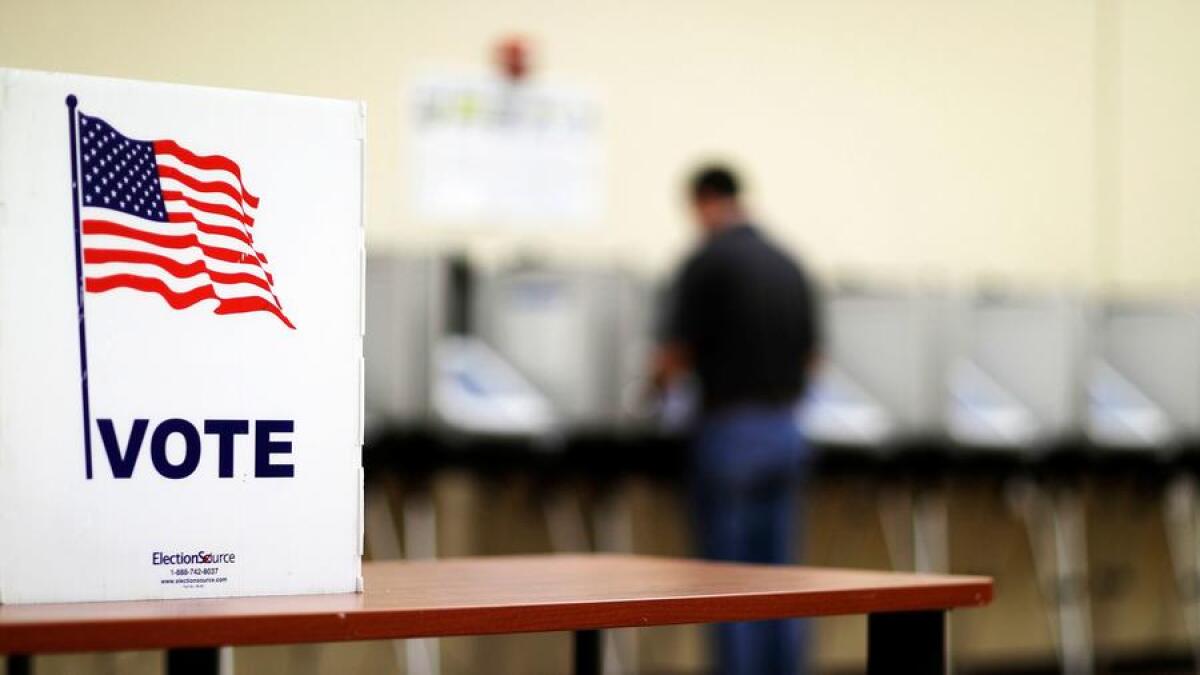
The stated goal of President Trump’s voter fraud commission is to restore confidence and integrity in the electoral process.
But so far the panel, which opponents have assailed as a sham created by an insecure president and a tool to suppress votes, has faced strong pushback from Democrats and Republicans alike.
On Wednesday, the bipartisan commission held its first meeting in Washington to discuss the voting process and registration.
Here’s a look at the goals of the panel and some of the uproar it has faced:
Trump criticizes Sessions and vents frustration at Russia investigation and leaders of the Justice Department and FBI
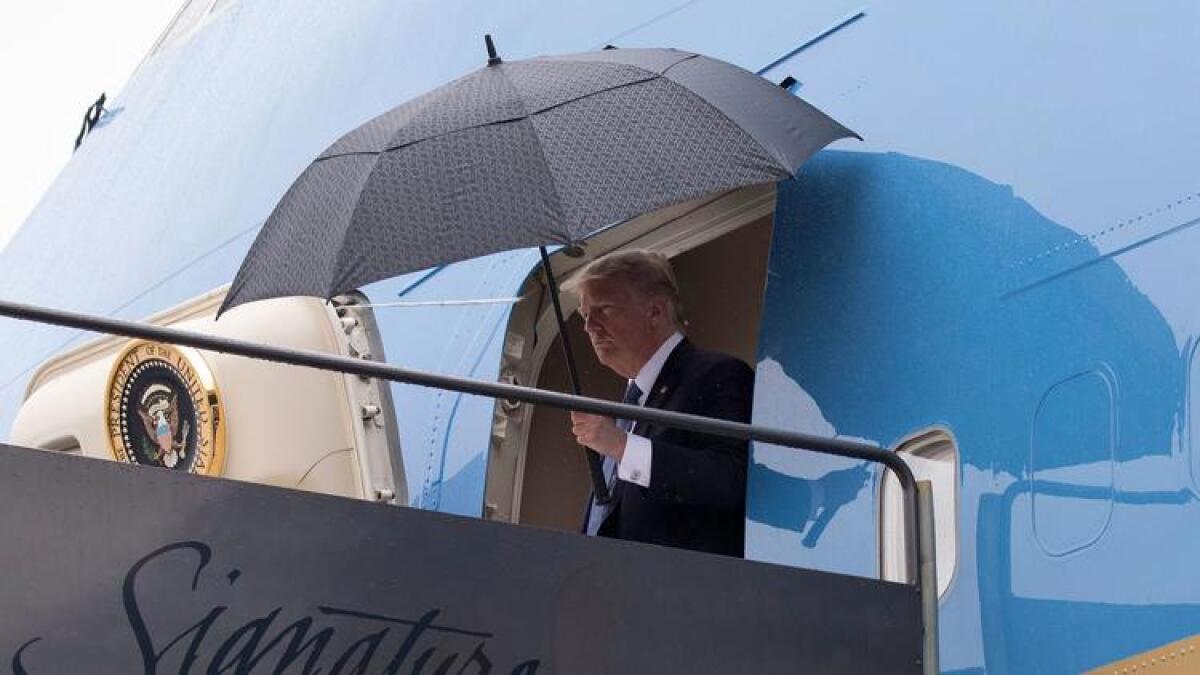
President Trump expressed regret for hiring Atty. Gen. Jeff Sessions, saying it was ‚Äúvery unfair‚ÄĚ that he recused himself from the investigation into Russia‚Äôs election meddling, and left open the possibility of seeking the firing of special counsel Robert S. Mueller III.
Trump made the remarks in an interview with the New York Times.
The interview featured an array of complaints against Justice Department leaders and the investigation into potential collusion between Trump’s campaign and Russia during the 2016 election.
Trump’s criticism of Sessions was especially striking because the former Alabama senator was one of Trump’s earliest and most loyal campaign advisors. His comments also amounted to an attack on the independence of the Justice Department and the FBI.
‚ÄúHow do you take a job and then recuse yourself? If he would have recused himself before the job, I would have said, ‚ÄėThanks, Jeff, but I‚Äôm not going to take you.‚Äô It‚Äôs extremely unfair ‚ÄĒ and that‚Äôs a mild word ‚ÄĒ to the president,‚ÄĚ Trump told the Times.
The Justice Department declined to comment on the remarks.
In the interview, Trump also criticized James B. Comey, the former FBI director he fired in May; Andrew McCabe, the acting FBI director; and Deputy Atty. Gen. Rod Rosenstein, the No. 2 official at the Justice Department.
Of Mueller, a former longtime FBI director, Trump complained that he and others in the special counsel’s office had conflicts of interest. After Comey was fired, Trump said he spoke with Mueller about once again heading the FBI.
‚ÄúHe was up here and he wanted the job‚ÄĚ of FBI director, Trump complained to the Times.
‚ÄúI said, ‚ÄėWhat the hell is this all about?‚Äô‚ÄĚ after learning that Mueller was named to lead the Russia investigation, Trump said. ‚ÄúTalk about conflicts. But he was interviewing for the job. There were many other conflicts that I haven‚Äôt said, but I will at some point.‚ÄĚ
The Times said Trump did not say whether he would order Mueller to be fired by the Justice Department. But the interview underscored Trump’s continuing exasperation with the investigation into his circle’s ties to Russia.
Trump told the Times that it would be a ‚Äúviolation‚ÄĚ and a crossing of a line if Mueller‚Äôs investigation expanded to include his family‚Äôs financial issues.
McCain’s current and former colleagues react to his diagnosis
Sen. John McCain has been diagnosed with glioblastoma, an aggressive type of brain cancer. Doctors discovered a tumor when they were operating to remove a blood clot above his eye.
News of the diagnosis broke Wednesday afternoon. On social media, messages of support flowed in from the longtime Republican senator’s current and former colleagues in Washington and Arizona.
The White House issued a statement on behalf of the president.
This post will be updated.
Trump singles out GOP Sen. Dean Heller, implying that he’ll lose his seat if he doesn’t support healthcare plan
Just a day after saying he would ‚Äúlet Obamacare fail,‚ÄĚ President Trump reversed course Wednesday and told Republican senators they should stay in Washington and work through August to salvage and pass a measure to replace it.
During a White House lunch, Trump used a familiar approach with senators ‚ÄĒ mixing friendly banter with pointed attacks ‚ÄĒ and referred to ‚Äútheir‚ÄĚ promise to end Obamacare.
At one point, Trump singled out Republican Sen. Dean Heller of Nevada, who was sitting next to the president. Heller’s Senate seat is considered the most endangered of any Republican facing reelection in 2018. He isn’t likely to part ways on healthcare with his state’s GOP governor, Brian Sandoval, who has been a vocal critic of the overhaul effort in Congress.
The president awkwardly implied Heller could lose his job over the issue. Trump pointed his thumb at Heller and remarked that he‚Äôd been ‚Äúthe one we were worried about.‚ÄĚ
‚ÄúLook, he wants to remain a senator doesn‚Äôt he, OK?‚ÄĚ Trump said.
Heller, who‚Äôd been laughing, reacted with an ‚Äúoh.‚ÄĚ
Senate Majority Leader Mitch McConnell (R-Ky.) had previously announced that senators had to forfeit the first two weeks of what was to have been the traditional August recess.
CBO says repealing Obamacare without replacement would leave 32 million more Americans without coverage
Senate Republicans’ proposal to repeal much of the Affordable Care Act without a replacement would leave 32 million more Americans without health insurance over the next decade, according to an updated analysis by the nonpartisan Congressional Budget Office.
At the same time, it would double healthcare insurance premiums by 2026, budget analysts concluded.
The report, which comes as the White House scrambles to salvage the faltering GOP Obamacare overhaul campaign, offers a grim picture of what would happen if Congress moves forward with a plan to repeal much of the current healthcare law while waiting to develop a replacement.
That approach parallels a similar repeal bill that Republicans successfully passed in 2015 and sent to President Obama, who subsequently vetoed it.
The latest CBO score is similar to ones the office has previously released to study the impact of repealing Obamacare without a replacement.
Amendment to give Charlie Gard residency in the U.S. clears House committee
A congressional committee has taken a step toward granting a terminally ill British baby residency in the United States so he can receive experimental treatment.
The House Committee on Appropriations voted unanimously Tuesday to approve an amendment introduced by Rep. Jaime Herrera Beutler (R-Wash.) that would grant permanent residency to 11-month-old Charlie Gard and his parents, who have waged a lengthy court battle to prevent a London hospital from withdrawing life support.
The case has drawn intense media scrutiny in Britain, and some outlets reported Wednesday that the committee vote means Charlie could soon be on his way to the U.S. for treatment. But the amendment would need to clear several more hurdles ‚ÄĒ including votes by the full House and the Senate ‚ÄĒ to become law.
That is likely to take some time. The amendment was added to a controversial spending bill that includes funding for President Trump’s border wall.
A British judge is expected to rule next week on whether Charlie, who suffers from a rare genetic condition that has left him with severe brain damage and unable to move or breath on his own, can be transferred to the U.S. or Italy, where there are hospitals offering to take over his care.
Great Ormond Street Hospital for Children, which has been treating Charlie since October, obtained a court order in April allowing doctors to take the boy off a ventilator because they don’t think the proposed treatment will help and could cause him additional pain and distress.
Two other British courts agreed with the decision, and the European Court of Human Rights in Strasbourg, France, declined to take up the case last month. But when hospital officials were contacted by the other facilities, they agreed to return to the original court to give the judge a chance to reconsider.
At an emotional hearing last week, a U.S. doctor testified over a video link that there was clinical evidence suggesting that Charlie might improve with the treatment. The judge asked the doctor to go to London to evaluate Charlie and meet with his medical team, which the doctor did on Monday and Tuesday.
The case has become an international cause célèbre, with both Trump and Pope Francis tweeting their support for Charlie’s parents, Connie Yates and Chris Gard. Conservative Christian and anti-abortion groups in the U.S. have also taken up their cause.
‚ÄúParents have the most at stake when it comes to standing up for their children and right now, we have an incredible opportunity to stand with a family and save a child‚Äôs life,‚ÄĚ Beutler said in a statement Tuesday.
Last week, Rep. Brad Wenstrup (R-Ohio) and Rep. Trent Franks (R-Ariz.) introduced legislation to grant permanent resident status to Charlie and his family. That bill has not come up for a vote yet.
Democratic senator questions independence of FCC nominee who worked for the agency’s chairman
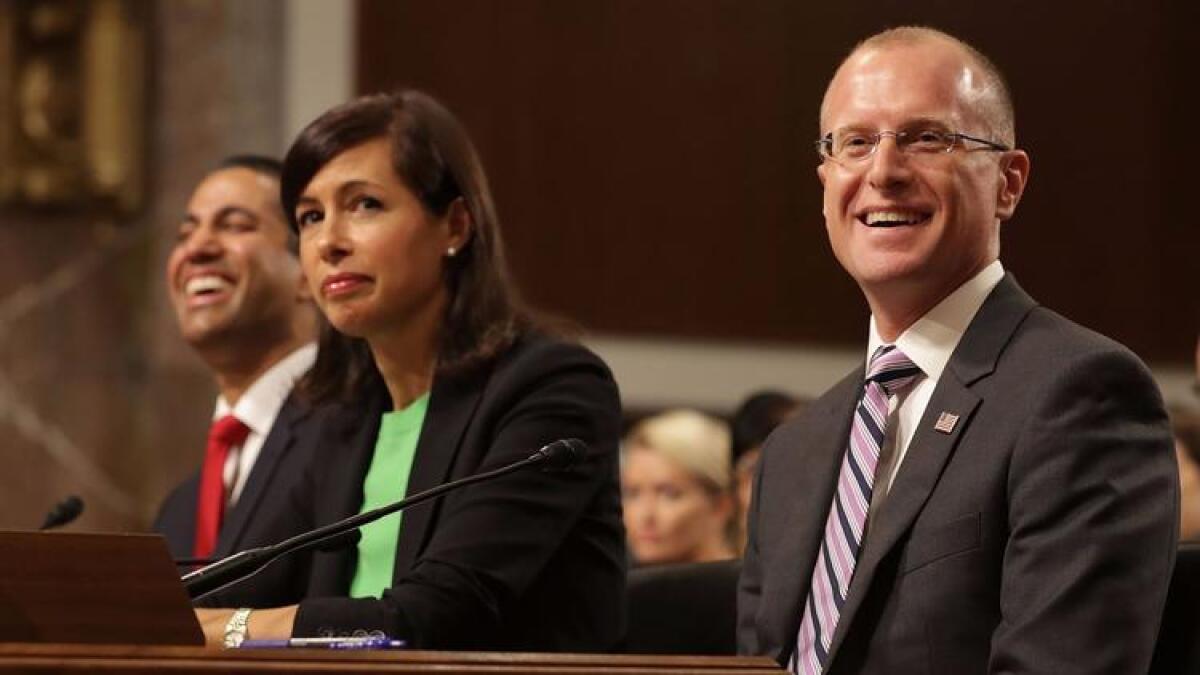
A leading Senate Democrat on Wednesday questioned the independence of a Federal Communications Commission nominee who worked as a top aide to the current chairman.
If confirmed, Brendan Carr, a Republican nominated last month by President Trump, would be the commission’s swing vote on Chairman Ajit Pai’s proposal to dismantle tough net neutrality rules for online traffic.
Carr hasn’t publicly stated his position on the matter, but the assumption is he would support Pai, a fellow Republican and his former boss.
Members of the Senate Commerce Committee did not ask Carr for his position on net neutrality during a confirmation hearing Wednesday.
But Sen. Bill Nelson of Florida, the committee‚Äôs top Democrat, pressed him to name an example of an issue on which he ‚Äúsubstantively disagreed‚ÄĚ with Pai.
Carr, an attorney who served as a legal advisor to Pai from 2014 to 2017, promised to be independent but said he did not want to discuss advice he gave to Pai.
Trump reverses course and tells Republican senators to stay in town to repeal and replace Obamacare
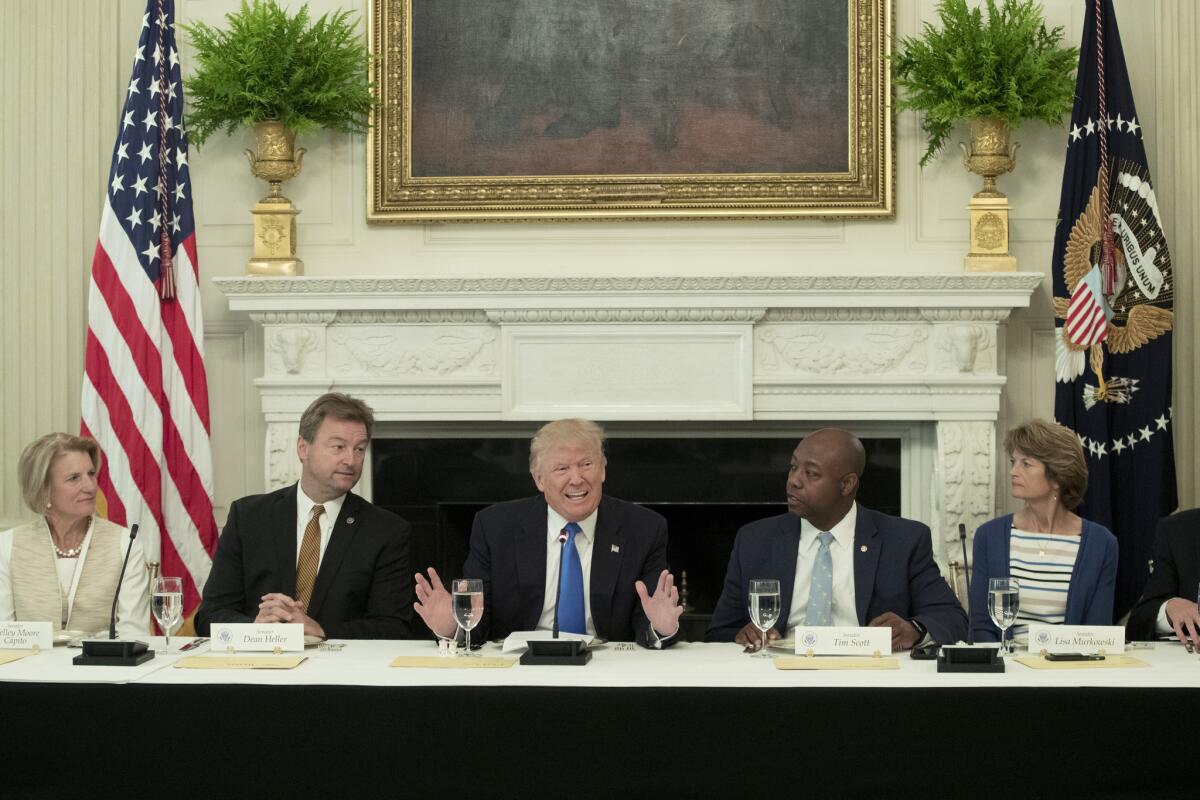
Just a day after saying he would ‚Äúlet Obamacare fail,‚ÄĚ President Trump reversed course Wednesday and told Republican senators they should stay in Washington and work through August to salvage and pass a measure to replace it.
‚ÄúFor seven years, you promised,‚ÄĚ Trump scolded senators as they sat down for lunch at the White House after the latest Senate healthcare bill had been largely given up for dead.
‚ÄúI don‚Äôt think we should leave town unless we have a health insurance plan,‚ÄĚ the president said.
‚ÄúAnd not just the repeal‚ÄĚ of the Affordable Care Act, he added. ‚ÄúThey need a repeal and a replace.‚ÄĚ
After the Senate Republican legislation collapsed this week, that prospect of repealing and replacing the healthcare law appeared doomed. Even though Trump repeatedly portrayed the Senate as ‚Äúclose‚ÄĚ to reaching agreement, Republican senators in fact remain deeply divided over healthcare.
Conservatives want to fully end what they call Obamacare while more centrist senators want to preserve aspects of the law, including its Medicaid expansion in their states.
Republican governors are among the more powerful critics of the overhaul effort in Congress, and key senators, including GOP Sens. Dean Heller of Nevada and Rob Portman of Ohio, are not likely to part ways with governors from their own party who have been among the most vocal.
Trump used a familiar approach with senators ‚ÄĒ mixing friendly banter with pointed attacks ‚ÄĒ and referring to ‚Äútheir‚ÄĚ promise to end Obamacare.
At one point, Trump singled out Heller, who was seated on the president’s immediate right at the table, and is considered the most endangered Republican senator facing reelection in 2018. The president awkwardly implied Heller could lose his job over the issue.
‚ÄúHe wants to remain a senator doesn‚Äôt he?‚ÄĚ Trump said, prompting a weak smile from Heller.
Senate Majority Leader Mitch McConnell (R-Ky.) had already announced that senators had to forfeit the first two weeks of what was to have been the traditional August recess.
Most Americans say they want Republicans and Democrats to work together to fix Obamacare, rather than repeal it. But that bipartisan approach did not appear to be on the lunch menu at the White House.
Trump repeatedly said that his predecessor, President Obama, had lied about his signature domestic initiative as he worked in 2010 for its passage. The president also dismissed congressional Democrats as uninterested in working on solutions, even though Democratic leaders have repeatedly called on Republicans to work together with them to improve the ACA, not repeal it.
Netanyahu dig on ‚Äėcrazy‚Äô EU policies caught on hot mike
An unvarnished critique of the European Union by Prime Minister Benjamin Netanyahu in a private meeting with Central European leaders was picked up on an open mike on Wednesday, as the Israeli leader accused the EU of ‚Äúundermining‚ÄĚ Israel and assailed as ‚Äúcrazy‚ÄĚ Europe‚Äôs conditioning of cooperation with Israel on the Palestinian peace process.
The remarks were made at a summit in Hungary with the prime ministers of Hungary, Slovakia, the Czech Republic and Poland, as Netanyahu lobbied the leaders to persuade other EU member states to ease the group’s criticism of Israeli policies in the West Bank.
The leaders were unaware that Netanyahu’s remarks were being transmitted to headphones distributed to journalists at the summit, and that Israeli reporters had started to record the conversation.
‚ÄúThere is no logic here. Europe is undermining its security by undermining Israel,‚Äô‚Äô Netanyahu said. ‚ÄúEurope is undermining its progress by a crazy attempt to create conditions.‚ÄĚ
Netanyahu was referring to an EU policy to link talks on enhancing economic ties with Israel to the county’s progress on relations with the Palestinians and on Israeli settlement policy in the West Bank. Several years ago, the EU held up an agreement on funding research in Israel, insisting that none of the money be spent in Jewish settlements.
EU and Israeli disagreements concerning Israeli’s policies in the West Bank have been the source of ongoing diplomatic tension for years. Netanyahu said his country’s relations with China and India are better than those with Europe because those countries are less interested in the peace process.
The prime minister argued that Israel is the one country in the region that ‚Äúdefends European values‚ÄĚ and stops ‚Äúmass migration‚ÄĚ to Europe. European ‚Äúprogress‚ÄĚ depends on enhancing ties with Israel‚Äôs technology community, he said.
‚ÄúEurope has to decide whether it wants to live and thrive, or whether it wants to shrivel and disappear,‚Äô‚Äô Netanyahu said. I‚Äôm not very politically correct ‚Ķ but the truth is the truth.‚ÄĚ
Netanyahu told the leaders that American policy in the Middle East has improved under the Trump administration, with the U.S. boosting its presence in Syria and taking a more aggressive stance toward Iran.
Israel had ‚Äúa big problem‚ÄĚ with U.S. policies, but now ‚Äúit‚Äôs different,‚ÄĚ he said.
As the Russia investigation continues, Art Buchwald’s Nixon excuses column resurfaces
President Trump‚Äôs supporters ‚Äď and Trump himself ‚Äď have plenty of answers to the Russia question.
‚ÄúEverybody would do that.‚ÄĚ
Trump ‚Äúwasn‚Äôt aware‚ÄĚ of what was happening.
‚ÄúRussia talk is fake news.‚ÄĚ
Russia is ‚Äúan excuse by the Democrats for having lost an election.‚ÄĚ
Trump Jr. is a ‚Äúwonderful young man‚ÄĚ who just happened to take a meeting with a Russian lawyer.
People don’t want to hear any more about Russia.
In an everything-old-is-new-again happenstance, a column by the late political satirist Art Buchwald has resurfaced on social media as people compare Trump and the late President Nixon.
Published in the L.A. Times 44 years ago this month, it detailed the excuses Nixon’s supporters used to defend him while he was under pressure over Watergate.
‚ÄúOh Yeah! What About Chappaquiddick?‚ÄĚ (alternately titled ‚ÄúHandy excuses for Nixon backers‚ÄĚ and ‚ÄúA Response Checklist,‚ÄĚ depending on which newspaper the syndicated column was published in) included Watergate justifications like:
‚ÄúEveryone does it.‚ÄĚ
‚ÄúA President can‚Äôt keep track of everything his staff does.‚ÄĚ
‚ÄúThe press is blowing the whole thing up.‚ÄĚ
‚ÄúThe Democrats are sore because they lost.‚ÄĚ
‚ÄúMaybe [they] went a little too far, but they were just a bunch of eager kids.‚ÄĚ
‚ÄúI‚Äôm sick and tired of hearing about Watergate and so is everybody else.‚ÄĚ
Buchwald died in 2007, but it seems safe to say the Pulitzer-winning humorist (who recorded his own video obituary for the New York Times before he died) would have appreciated the irony.
Grandparents are exempt from Trump’s travel ban, refugees aren’t -- for now, Supreme Court says
The Supreme Court is granting the Trump administration’s request to more strictly enforce its ban on refugees, at least until a federal appeals court weighs in.
But the justices are leaving in place a lower-court order that makes it easier for travelers from six mostly Muslim countries to enter the United States.
The administration had appealed last week’s ruling by U.S. District Judge Derrick Watson that required the government to allow in refugees formally working with a resettlement agency in the United States. Watson also vastly expanded the family relations that refugees and visitors can use to get into the country.
The high court on Wednesday blocked Watson’s order as it applies to refugees, but not the expanded list of relatives. The justices said the U.S. 9th Circuit Court of Appeals in San Francisco should now consider the appeal. It’s not clear how quickly that will happen.
In the meantime, though, up to 24,000 refugees who already have been assigned to a charity or religious organization in the U.S. will not be able to use that connection to get into the country.
The Supreme Court also denied the administration’s request to clarify the high court’s ruling last month that allowed the administration to partially reinstate a 90-day ban on visitors from Iran, Libya, Somalia, Sudan, Syria and Yemen and a 120-day ban on refugees from anywhere in the world.
The court‚Äôs ruling exempted a large swath of refugees and travelers with a ‚Äúbona fide relationship‚ÄĚ with a person or an entity in the U.S. The justices did not define those relationships but said they could include a close relative, a job offer or admission to a college or university.
Watson’s order added grandparents, grandchildren, brothers-in-law, sisters-in-law, aunts, uncles, nieces, nephews and cousins to a Trump administration list that included a parent, spouse, fiance, son, daughter, son-in-law, daughter-in-law or sibling already in the U.S. The expanded list of relatives remains in effect.
Justices Samuel A. Alito Jr., Neil Gorsuch and Clarence Thomas would have blocked Watson’s order in its entirety. Those same three justices said last month they would have allowed the Trump travel ban to take full effect.
UPDATE
10:49 a.m. This story has been updated with additional details and background on the portion of the high court’s order that pertains to exemptions for relatives.
This article was originally published at 10:15 a.m.
Iran blasted as ‚Äėleading sponsor‚Äô of terrorism in new U.S. report

The Trump administration Wednesday continued its sharp criticism of Iran, labeling Tehran the world’s top government sponsor of terrorism.
In a new report, the State Department said terrorist attacks and deaths from terrorism declined worldwide last year. The Islamic State militant group remained the most active ‚Äúnonstate‚ÄĚ perpetrator, the report said, despite having suffered a significant loss of territory.
The document, formally titled Country Reports on Terrorism 2016, is issued annually under congressional mandate.
A section on state sponsors of terrorism highlights Iran, its arming of the Hezbollah organization in Lebanon and anti-Israel groups like Hamas, plus its support for Syrian President Bashar Assad, whom the U.S. accuses of committing numerous atrocities against his citizenry.
‚ÄúIran is the leading state sponsor of terrorism,‚ÄĚ Justin Siberell, the State Department‚Äôs acting coordinator for counterterrorism, said in a briefing for reporters.
Iran has been on the list since 1984.
The report noted that Iran‚Äôs Islamic Revolutionary Guard Corps served as the government‚Äôs ‚Äúprimary mechanism for cultivating and supporting terrorists abroad.‚ÄĚ
It is used to ‚Äúimplement foreign policy goals, provide cover for intelligence operations and create instability in the Middle East,‚ÄĚ the report said.
On Tuesday, the administration hit Iran with a new batch of economic sanctions, targeting 18 individuals and entities accused of supporting or working in Tehran’s ballistic missile program.
That came a day after the administration -- reluctantly -- certified that Iran was obeying the terms of a landmark deal limiting its nuclear weapons capabilities.
The deal with Iran was brokered by the Obama administration in 2015 along with the four other permanent members of the United Nations Security Council plus Germany.
When he campaigned for the presidency, Trump threatened to ‚Äúrip up‚ÄĚ the agreement, which he claimed was a terrible deal. So far, though, Trump has stuck with the accord, while at the same time adding new punishment for unrelated issues.
Hezbollah also made an appearance in the report in discussion about Venezuela, which came under heaviest criticism among Western Hemisphere countries.
‚ÄúFor the 11th consecutive year, the Department of State determined ... that Venezuela was not cooperating fully with U.S. counterterrorism efforts,‚ÄĚ the report said, noting the leftist Caracas government had provided safe haven for Hezbollah ‚Äúsupporters and sympathizers,‚ÄĚ along with other militants like Colombian guerrillas and Basque separatists.
Successive U.S. administrations have called on Venezuelan President Nicolas Maduro to return the country to democracy after he attempted to shut down parliament and embarked on a campaign to rewrite the constitution in what his critics see as a bald power grab.
Trump said this week he was considering new economic sanctions to pressure Maduro’s government as well. Previously Maduro’s vice president was sanctioned and accused by U.S. officials of being a drug trafficker with ties to Hezbollah.
The State Department report, citing statistics compiled by the University of Maryland, said the total number of terrorist attacks in 2016 decreased by 9% from 11,774 in 2015 to 11,072. Deaths from terror attacks fell 13% in the same year, from 28,328 to 25,621. Sixteen of the dead were American citizens.
Trump set out to uproot Obama’s legacy. So far, that’s failed
Rarely has a president taken office so focused on undoing his predecessor’s works as Donald Trump. Six months in, he has little to show.
Monday brought twin blows. Not only did the Affordable Care Act survive another Republican repeal effort, maintaining President Obama’s signature domestic achievement, but Trump was forced to certify that Iran continues to comply with the nuclear deal that was the biggest foreign policy accomplishment of Obama’s second term.
Beyond those two headlines, Obama’s program to shield some 750,000 so-called Dreamers from deportation continues intact, much to the frustration of some of Trump’s most ardent backers. The tax hikes on upper-income earners, which were among the hardest-won battles of Obama’s first term, remain in effect. U.S. relations with Cuba remain open, following Obama’s normalization policy, despite Trump’s public show last month of tightening some travel and trade restrictions. And the sharp increases in U.S. use of solar, wind and other forms of renewable energy, largely at the expense of coal, continues, Trump’s rhetoric notwithstanding.
None of that means Trump has failed. But ....
Trump, Pence defend voter fraud panel at first meeting
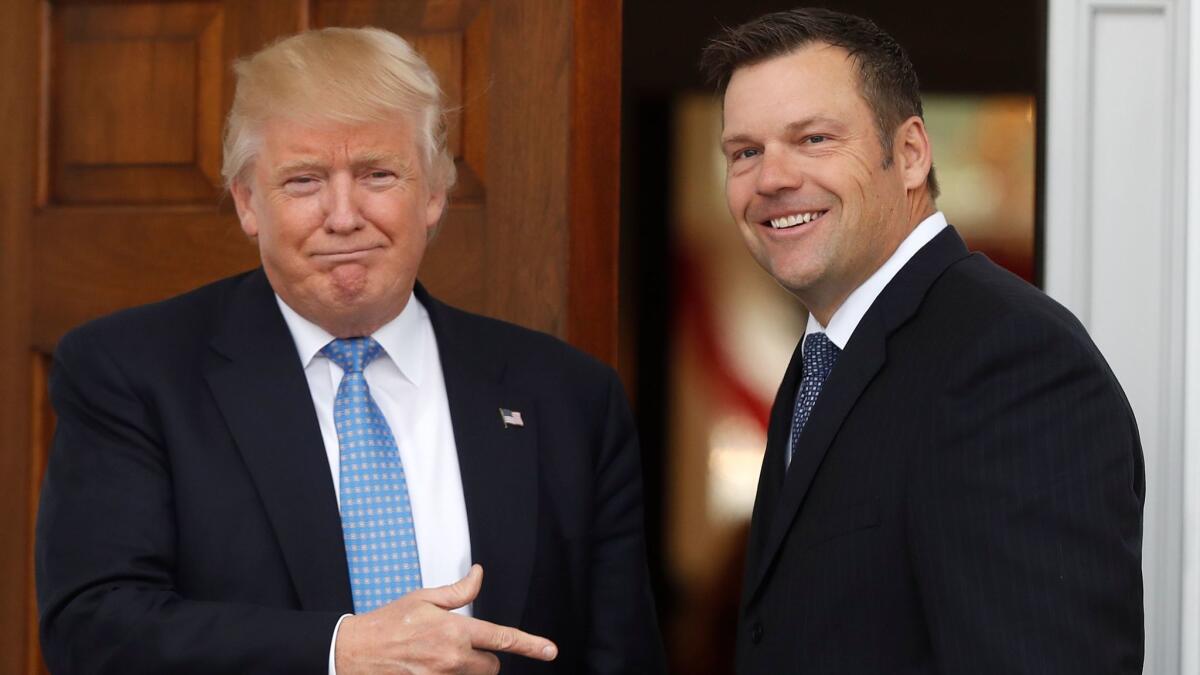
At the first official meeting of President Trump’s voter-fraud task force, he and Vice President Mike Pence defended the commission’s purpose amid complaints over its transparency, potential bias and data-collection efforts.
The meeting of the Presidential Advisory Commission on Election Integrity was closed to the public and media, but live-streamed on the White House website.
Pence, who chairs the commission, said it ‚Äúhas no preconceived notions or preordained results.‚ÄĚ
‚ÄúOne person, one vote is foundational,‚ÄĚ Pence said. ‚ÄúThe commission will identify laws, rules, policies, strategies and practices that will enhance the American people‚Äôs confidence in our electoral system.‚ÄĚ
Critics, however, have said the commission appears to have been stacked with members who support Trump’s unfounded claims that millions of fraudulent votes were cast in the 2016 election. Trump, who trailed in the popular vote by nearly 3 million, blamed that loss on immigrants in the country illegally who voted.
Most Americans ‚ÄĒ and many GOP senators ‚ÄĒ want a bipartisan fix to Obamacare. Will Republicans reach across the aisle?
Congressional Republicans, their campaign to repeal and replace the Affordable Care Act in shambles, face mounting pressure to work with Democrats to make fixes to the 2010 healthcare law rather than roll it back.
But it remains unclear whether the White House and GOP leaders are prepared to reach across the aisle to stabilize insurance markets and shield Americans from rising healthcare costs, especially if that also means being seen as betraying their years-long promise to repeal Obamacare.
President Trump continued to attack Democrats after the collapse of the GOP healthcare overhaul bill Monday, followed the next morning by Senate Majority Leader Mitch McConnell’s failure to rally Republicans around a last-ditch bid to repeal most of the law without a replacement.
‚ÄúWe‚Äôre not going to own it. I‚Äôm not going to own it. I can tell you the Republicans are not going to own it. We‚Äôll let Obamacare fail, and then the Democrats are going to come to us,‚ÄĚ Trump said Tuesday.
With Trump appearing increasingly isolated, however, and support evaporating for the GOP campaign against the law, Republicans in Congress may have little choice but to reset their healthcare strategy.
‚ÄúCongress should go back to the drawing board and work in partnership with patient groups like the March of Dimes and other stakeholders to craft a bipartisan plan that seeks to provide affordable, quality health coverage to all Americans,‚ÄĚ March of Dimes President Stacey D. Stewart said.
Analysis: Gov. Jerry Brown shows President Trump the upside of experience
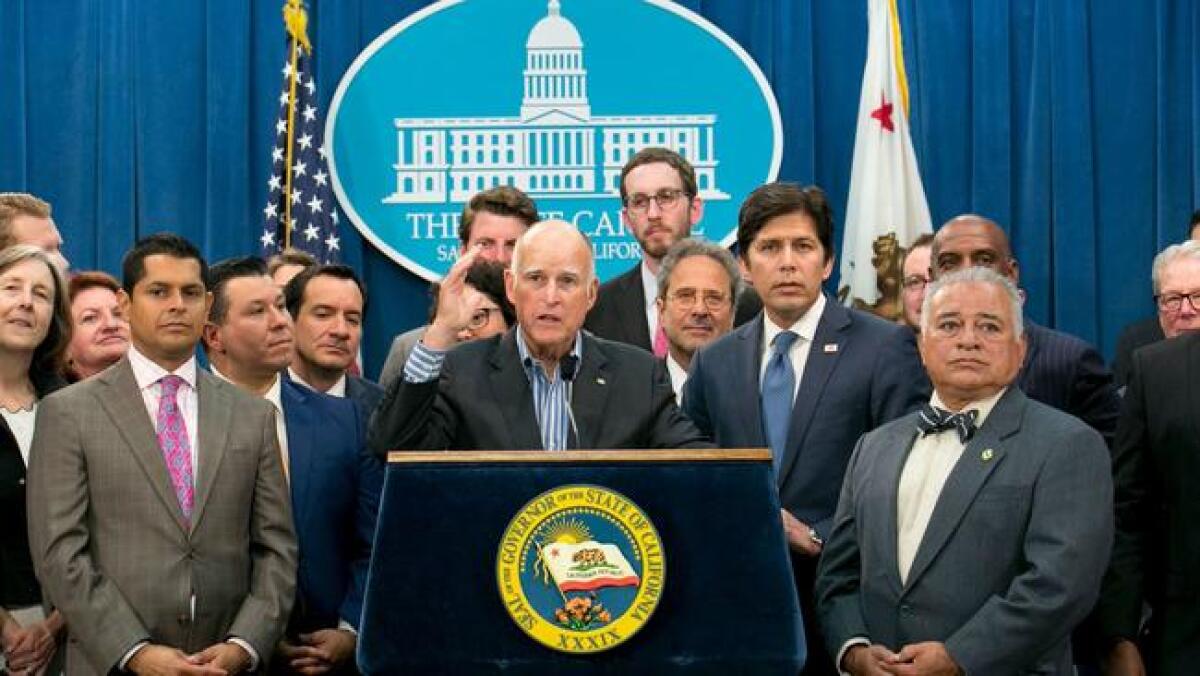
As his party’s healthcare plan imploded Monday night, President Trump could look across the country to the state he seems to disdain the most and see success forged by the very thing he ran against: old-fashioned politics.
California Gov. Jerry Brown and legislative Democrats worked with Republicans to craft a climate change measure that found just enough support among Republicans to pass even though many in the party continue to oppose it.
The victory was surely propelled by the Democratic advantage in the Legislature, but undeniably benefited from the singular focus of an executive steeped in government experience and willing to publicly plead and deliver concessions to get his measure over the line.
The effort to repeal and replace Obamacare was marked by neither those executive attributes, nor the overwhelming partisan advantage. Together, that made all the difference.
After Trump reluctantly certifies Iran is obeying nuclear deal, he slaps it with new sanctions
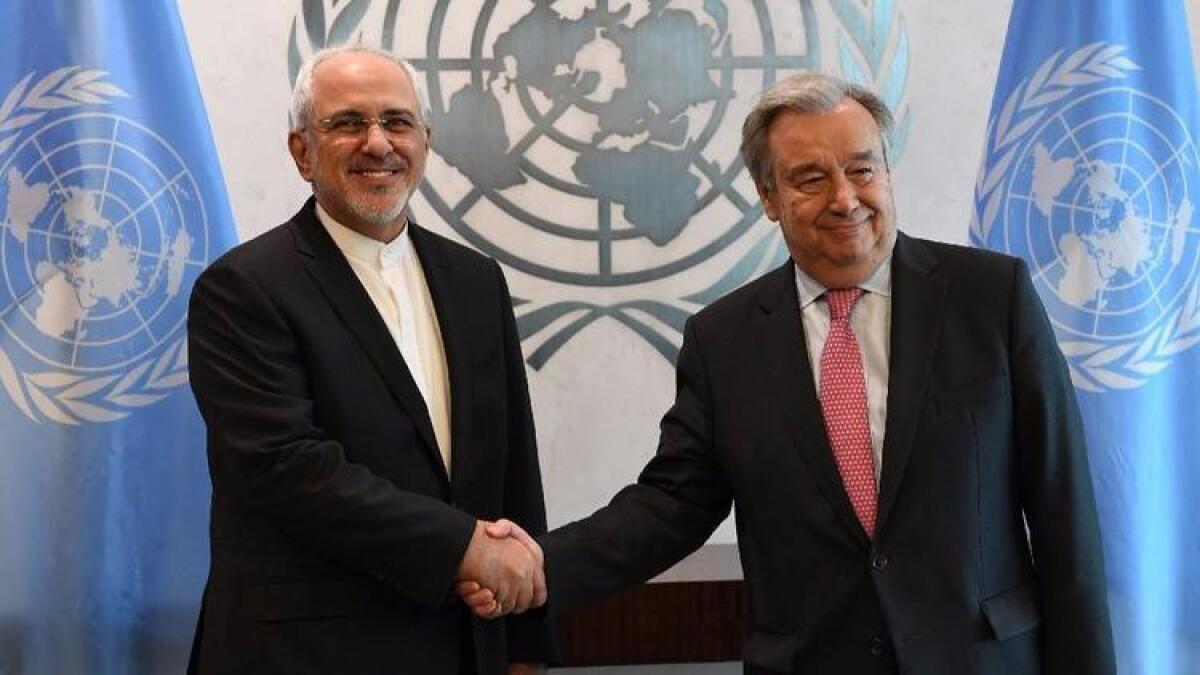
A day after certifying that Iran is obeying international restrictions on its nuclear program, the Trump administration went in the opposite direction Tuesday and slapped new sanctions on Tehran for unrelated alleged transgressions.
The Treasury Department blacklisted 18 people and entities for supporting Iran’s military and Islamic Revolutionary Guard, which it said harassed U.S. naval vessels and tried to build ballistic missiles and steal U.S. computer software.
The sanctions mean it is illegal for U.S. citizens or companies to do business with those on the list, and any assets they have in the U.S. can be seized. It’s unclear whether the 18 have such assets or businesses.
The back-to-back actions reflect the policy crosscurrents for President Trump in trying to reconcile his campaign promises with the realities of foreign policy governance.
Russian senator accuses U.S. media of scandalizing Trump-Putin dinner meeting
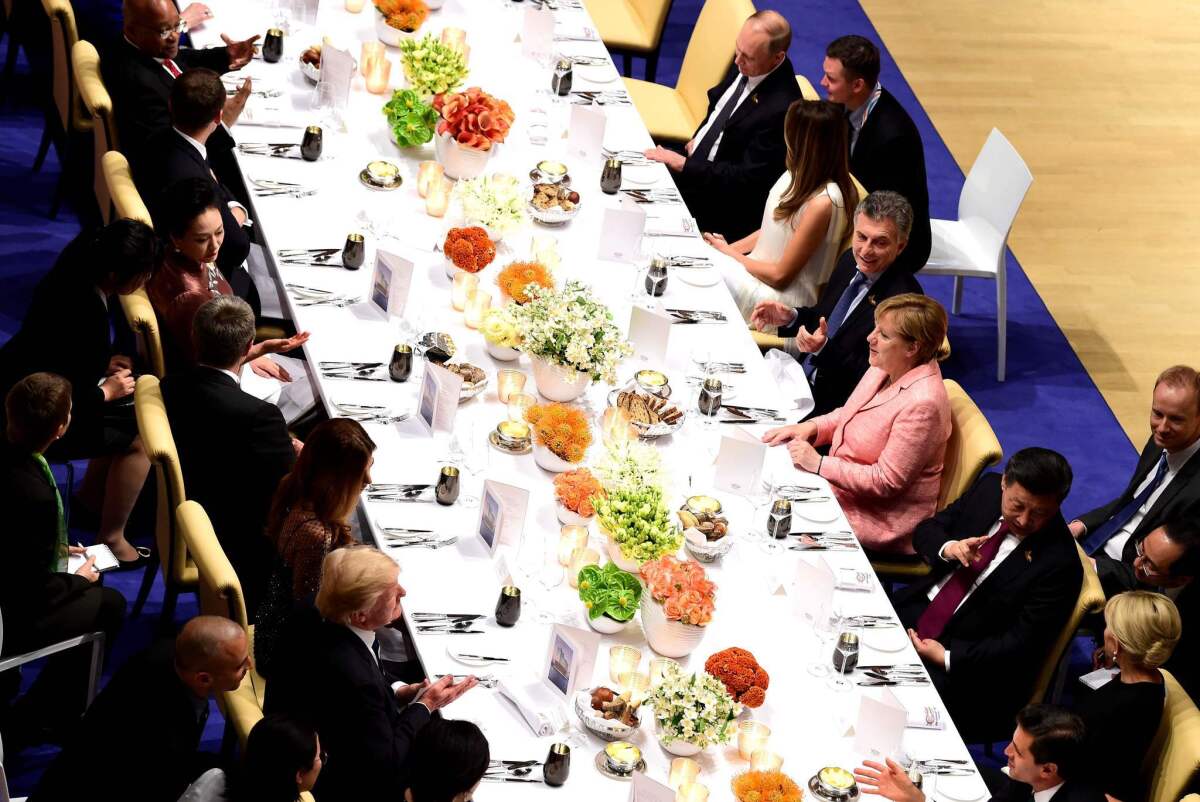
A Russian senator who frequently voices staunchly pro-Kremlin views on social media blamed the U.S. news media for overblowing reports about a previously undisclosed dinner conversation between President Trump and Russian President Vladimir Putin at the G-20 summit.
The White House confirmed that Trump and Putin spoke at a dinner during the summit, attended by several world leaders and their spouses, in Hamburg, Germany, earlier this month. During the meal, Trump reportedly spoke with Putin at his table, where the Russian president was seated next to First Lady Melania Trump, for close to an hour. Critics have said Trump broke protocol by using the Kremlin’s translator to communicate with Putin.
Trump defended the meeting in his own set of angry tweets late Tuesday, saying it had been on his public schedule.
Alexey Pushkov, chairman of information policy in the upper house of the Russian parliament, sided with Trump.
‚ÄúNow in the US they are making a scandal about Trump and Putin‚Äôs fake ‚Äėsecret dinner.‚Äô Asking to give details of a secret conversation that didn‚Äôt take place. They are sick,‚ÄĚ Pushkov tweeted Wednesday.
House approves measure to delay Obama-era smog reductions
The House voted Tuesday to pass a Republican-backed bill delaying implementation of Obama-era reductions in smog-causing air pollutants.
Lawmakers voted 229 to 199 to approve the Ozone Standards Implementation Act of 2017. The measure delays by eight more years the implementation of 2015 air pollution standards issued by the Environmental Protection Agency under the prior administration.
The bill also makes key technical changes that environmentalists say will weaken the Clean Air Act, including switching the EPA’s mandated review of air-quality standards from every five years to every 10. Ground-level ozone can cause breathing problems among sensitive groups, causing thousands of premature deaths each year.
The House voted largely along party lines to approve the bill and defeat a series of Democratic amendments. Similar legislation is advancing in the GOP-controlled Senate.
More than a dozen major health organizations opposed the bill, including the National Medical Assn., the American Academy of Pediatrics and the American Public Health Assn. The head of the American Lung Assn. called the industry-backed bill a ‚Äúdirect assault‚ÄĚ on the right of Americans to breathe healthy air, and urged senators from both parties to reject it.
‚ÄúThe bill would delay lifesaving protections against ozone pollution, exposing Americans to unnecessary pollution levels that will lead to asthma attacks and premature deaths that could have been prevented,‚ÄĚ said Harold P. Wimmer, the group‚Äôs national president and CEO.
House Republicans on Tuesday lauded what they called common-sense legislation to protect American jobs. The GOP bill is supported by several pro-business groups, including the American Petroleum Institute, the American Chemistry Council and the U.S. Chamber of Commerce.
It is part of a larger push by the Trump administration and congressional Republicans to weaken, block or delay stricter pollution and public health standards approved under President Obama.
Primary sponsor Rep. Pete Olson (R-Texas) praised the progress made in cleaning up the nation’s air since the 1970s, when choking blankets of smog regularly blanketed U.S. cities. But he said the stricter standards approved by Obama’s EPA would force American companies to invest billions of dollars in new pollution reduction measures.
‚ÄúThis bill keeps us moving forward toward cleaner air,‚ÄĚ said Olson, whose Houston-area district depends on the oil and gas industry. ‚ÄúThis bill is about listening to job creators back home.‚ÄĚ
Democrats countered that the GOP bill, which they derided as the ‚ÄúSmoggy Skies Act,‚ÄĚ would cost lives through increased rates of asthma and lung disease while endangering decades of hard-won progress in cleaning up the environment.
‚ÄúThis is a blueprint to Make America Sick Again,‚ÄĚ said Rep. Gerald Connolly (D-Va.), mocking the Trump campaign slogan.
Ground-level ozone is created when common pollutants emitted by cars, power plants, oil refineries, chemical plants and other sources react in the atmosphere to sunlight. The National Ambient Air Quality Standards adopted by the EPA in 2015 reduced the allowed amount of ground-level ozone from 75 parts per billion to 70 parts per billion.
The EPA estimated at the time that the $1.4 billion it would cost to meet the stricter standards would be far outweighed by billions of dollars saved from fewer emergency room visits and other public health gains.
The agency cited recent studies showing ozone at 72 parts per billion is harmful to healthy adults exercising outdoors. Children are at increased risk because their lungs are still developing and they are more likely to be active outdoors when ozone levels are high, the agency said.
The EPA projected that the ‚Äúvast majority‚ÄĚ of U.S. counties would meet the stricter standards by 2025 under state and federal rules and programs then underway. Many of those clean-air initiatives are now in the crosshairs of regulatory rollbacks and budget cuts championed by the Trump administration.
Trump and Putin held second, undisclosed talk
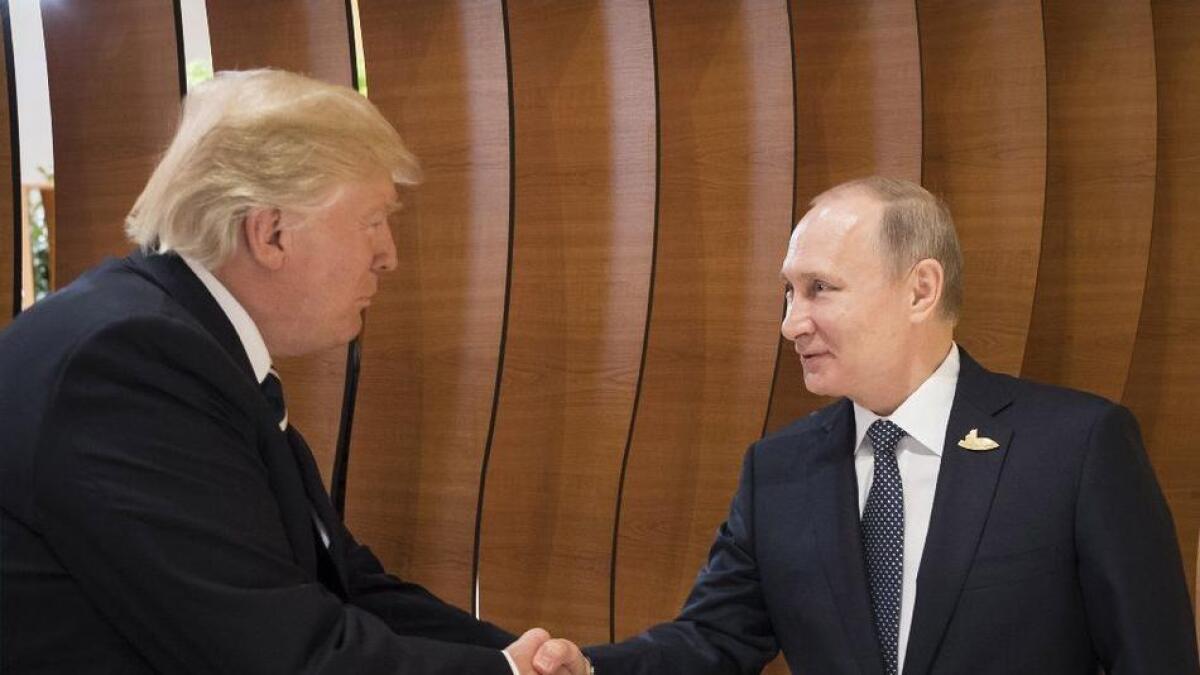
President Trump and Russian President Vladimir Putin held a second, previously undisclosed meeting earlier this month at the Group of 20 summit in Hamburg, Germany.
The talk, during a dinner for G-20 leaders and their spouses, was first disclosed by Ian Bremmer, the head of the Eurasia Group, an international consulting firm. Bremmer said he was told about the meeting by two people who were at the dinner and watched Putin and Trump talk but could not hear what they said.
The dinner attendees said that the two presidents talked for an hour, he said.
White House officials subsequently confirmed the meeting in a statement Tuesday, characterizing the encounter as ‚Äúbrief.‚ÄĚ
Television coverage of the beginning of the dinner showed First Lady Melania Trump seated next to Putin. According to Bremmer, Trump, who was sitting next to Japanese Prime Minister Shinzo Abe, got up midway through the dinner and sat next to Putin, talking ‚Äúprivately and animatedly.‚ÄĚ
The two talked for roughly an hour, with no aides present and using only Putin’s interpreter for translation, Bremmer said.
Trump responded angrily to news reports about the conversation with Putin, saying in a message on Twitter that the news accounts were ‚Äúsick‚ÄĚ and that ‚ÄúPress knew!‚ÄĚ about the dinner.
Reporters certainly knew about the dinner. The press pool that sat outside the ballroom where the dinner took place saw both presidents leave around the same time, shortly after 11 p.m. local time.
But reporters had no way to know about what took place inside.
The White House did an extensive read out of Trump’s formal meeting with Putin, which lasted more than two hours, but made no mention of the second, informal discussion.
4:35 p.m.: This story was updated with the White House statement.
6:13 p.m.: This story was updated with Trump’s tweets.
U.S. threatens more sanctions on Venezuela
The United States is planning ‚Äústrong and swift‚ÄĚ sanctions against the leftist government of Venezuela if it moves ahead with plans to rewrite its constitution and weaken its democracy.
New sanctions aimed at crippling major players in Venezuela’s political and economic arenas would be the Trump administration’s latest steps to punish the South American country.
‚ÄúThe United States will not stand by as Venezuela crumbles,‚ÄĚ Trump said in a statement Tuesday.
Venezuelans opposed to the government of President Nicolas Maduro held a symbolic referendum on Sunday, voting overwhelmingly against efforts to change the political system and allow the current administration to stay in office indefinitely.
Trump and other Western countries called on Maduro to respect that vote.
Venezuelans‚Äô ‚Äústrong and courageous actions continue to be ignored by a bad leader who dreams of becoming a dictator,‚ÄĚ Trump said.
But the Venezuelan government plans its own election July 30 to create a constituent assembly that would rewrite the constitution. Maduro insisted Tuesday he would not be intimidated by what he saw as threats from Washington and others.
Once an oil-rich, wealthy nation, Venezuela has descended into severe poverty, shortages of basic goods and violent antigovernment demonstrations because of bad management by Maduro, the fall in oil prices and a corrupt system profiting off drug trafficking.
A senior Trump administration official, briefing reporters Tuesday on condition of anonymity to discuss planning, said ‚Äúall options‚ÄĚ were on the table to pressure Venezuela.
The administration is planning ‚Äústrong and swift‚ÄĚ sanctions against unspecified Venezuelan officials, the official said.
The official said Trump has been extremely concerned about Venezuela’s plight, though it is unclear why the president has taken such a strong interest.
Issues of human rights and democracy have not been a priority of the administration so far. It may be that Trump has been convinced that Venezuela has served as a gateway for Iran to make inroads in the Americas.
One of the Venezuelans previously sanctioned by the United States, Vice President Tareck El Aissami, has been accused by the U.S. of being a drug trafficker with ties to the Iranian-backed militant group Hezbollah in Lebanon.
The United States also sanctioned members of the Venezuelan Supreme Court who are seen as rubber-stamp supporters of Maduro.
Trump appointee wants to delay rule that lets consumers bring class-action suits against banks
A new federal rule allowing Americans to file class-action suits against banks instead of being forced into private arbitration has become entangled in a dispute over consumer protection between appointees by Presidents Trump and Obama
The disagreement poses another potential obstacle to the rule unveiled last week by the Consumer Financial Protection Bureau over the strong objections of the banking industry. Some congressional Republicans already have vowed to pass legislation repealing the regulation before it takes effect early next year.
Now, Keith Noreika, the acting comptroller of the currency, has asked the bureau to delay implementing the rule until his staff can determine whether it would threaten the health of the banking system.
Talks for U.S. to return Russian compounds fail, sparking anger from Moscow
Russia said Tuesday that it is losing patience over the return of properties that the United States seized as penalty for Moscow’s election interference, as tense talks between the two countries have yielded no resolution.
In Moscow, officials threatened to take ‚Äúretaliatory measures‚ÄĚ if the United States continued to ‚Äúhinder‚ÄĚ their government‚Äôs diplomatic mission, and the spokesman for President Vladimir Putin said the Kremlin‚Äôs patience ‚Äúis expiring.‚ÄĚ
‚ÄúWe are still counting on the reasonableness of our American counterparts to at least bring the situation into the legal framework in accordance with the international law,‚ÄĚ said the spokesman, Dmitry Peskov.
In late December, the Obama administration expelled 35 Russian diplomats and seized two elaborate estates, one on Long Island and the other on Maryland’s Eastern Shore, in response to the conclusion of U.S. intelligence services that Russia had meddled in the election to benefit Donald Trump. The United States also said the Russians were using the properties for espionage.
Russia has denied the charges and demanded return of the diplomatic compounds, which the then-Soviet Union purchased during the Cold War. It had expected a favorable result from the new Trump administration after the discord of the Obama years.
Yet U.S. and Russian officials agree that relations between the two countries remain dismal, despite the apparent mutual affinity of their presidents, Trump and Putin. Trump has hinted he would be willing to return the properties and end additional U.S. sanctions against Russia that were imposed because of its 2014 occupation of Crimea.
Still, talks held on Monday in Washington between Russian Deputy Foreign Minister Sergei Ryabkov and U.S. Undersecretary of State Thomas Shannon did not go well, U.S. and Russian officials said Tuesday.
‚ÄúThe conversation was tough, forthright and deliberate,‚ÄĚ State Department spokeswoman Heather Nauert said, quoting Shannon, ‚Äúreflecting both parties‚Äô commitment to a resolution.‚ÄĚ
‚ÄúNothing is coming together anytime soon,‚ÄĚ she added in a briefing with reporters.
Nauert refused to be pinned down on whether the United States was willing to return the properties. But she said Secretary of State Rex Tillerson, following Trump‚Äôs wishes, wanted a ‚Äúbetter path‚ÄĚ for Moscow-Washington relations that would ‚Äúsmooth out‚ÄĚ some of the ‚Äúirritants.‚ÄĚ
Russia wants the return of the properties and permission to reassign some of the expelled diplomats.
‚ÄúWe expected big difficulties in talks with Americans not only concerning the diplomatic property, but on other issues as well,‚ÄĚ Ryabkov told reporters after his meeting with Shannon. ‚ÄúAnd that‚Äôs what happened.‚ÄĚ
The talks come against the backdrop of the growing scandal over whether members of Trump’s campaign and family circle met with Russian operatives as part of Moscow’s broader effort to damage the candidacy of Trump’s Democratic rival, Hillary Clinton. That question as well as Russia’s interference are subjects of an investigation by a Justice Department special counsel.
Trump and Putin earlier this month announced a limited ceasefire in a small part of Syria, which the U.S. president hailed as evidence of the two longtime rivals’ newfound ability to cooperate.
Ayres reported from Moscow.
Eighth man at Trump Tower meeting was focus of congressional probe into Russian money laundering in 2000
The California businessman who took part in a meeting between Donald Trump Jr. and a Russian lawyer in June 2016 was the focus of a congressional inquiry into possible Russian money laundering in November 2000.
Irakly (Ike) Kaveladze, who immigrated to the United States from the former Soviet republic of Georgia in the early 1990s, set up 2,000 corporations in Delaware for Russian brokers, according to the report by an arm of Congress that is now known as the Government Accountability Office.
Some of the corporations operated as shell companies and were used to move about $1.4 billion through more than 100 accounts at Citibank of New York and the Commercial Bank of San Francisco, the GAO report said.
‚ÄúThese banking activities raise questions about whether the U.S. banks were used to launder money,‚ÄĚ said the report.
The banks said ‚Äúno illegal activity in the Kaveladze-related accounts‚ÄĚ was found, but they closed the accounts after they were contacted by investigators.
Kaveladze told investigators that he did not know who owned the corporations because the law in Delaware, which permits an unusual degree of secrecy for registered corporations, did not require it.
He told the New York Times at the time that he had done nothing wrong, calling the congressional inquiry ‚Äúanother Russian witch hunt in the United States.‚ÄĚ
Kaveladze’s attorney, Scott Balber, did not immediately return a request for comment on Tuesday.
Earlier Tuesday, Balber confirmed that Robert S. Mueller III, the special counsel investigating possible collusion between Donald Trump’s presidential campaign and the Russian government, had contacted Kaveladze for information about a meeting he attended at Trump Tower on June 9, 2016.
At that meeting, a Russian lawyer, Natalia Veselnitskaya, provided Donald Trump Jr., the candidate’s oldest son, what he was told was damaging information on Trump’s rival, Hillary Clinton.
Kaveladze attended the meeting at the request of Aras Agalarov, a billionaire Russian developer with close ties to the Kremlin, Balber said. Kaveladze has worked for the Agalarov firm, one of the largest development companies in Russia, since 2004, he said.
President Trump said he won‚Äôt ‚Äėown‚Äô Obamacare. But businessman Trump said leaders are always responsible
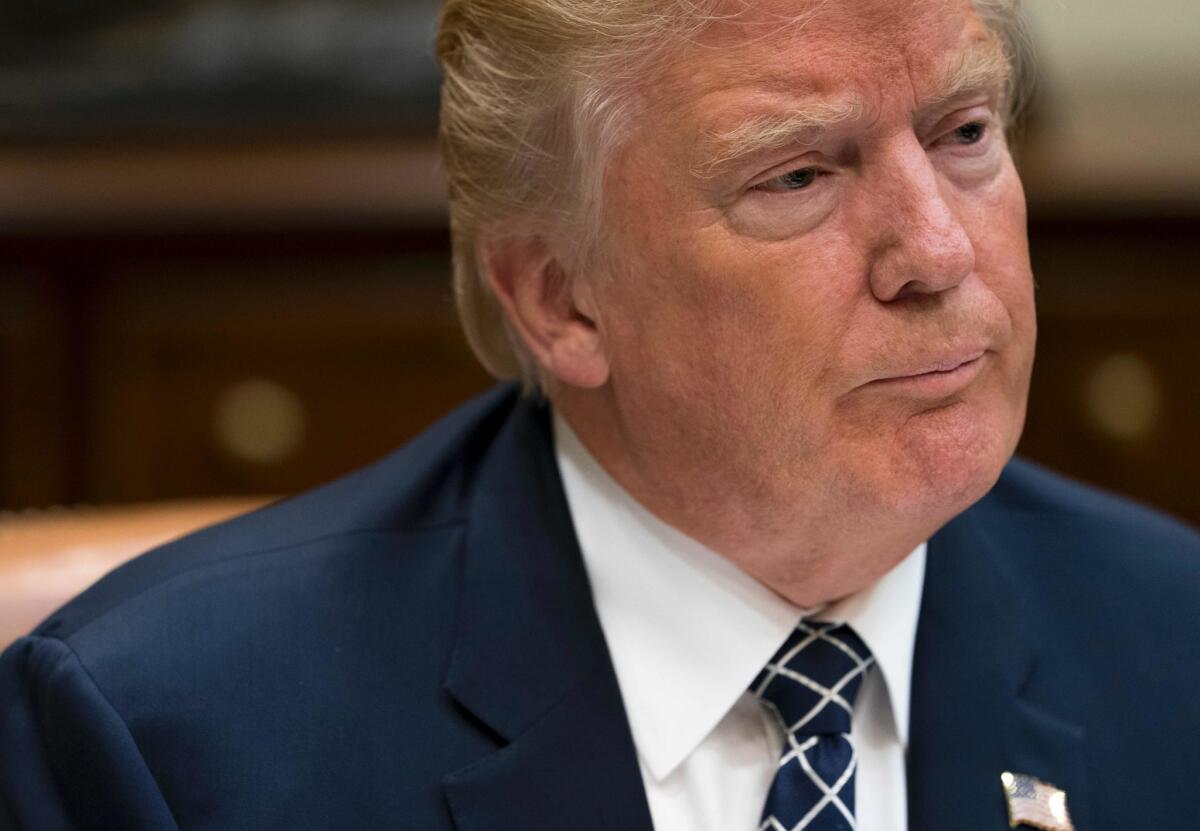
The buck stops... The buck stops... How does that saying go again?
President Trump said he would not take responsibility for the Affordable Care Act on Tuesday, telling reporters he wanted to ‚Äúlet Obamacare fail‚ÄĚ after congressional Republicans failed to pass a repeal or a replacement of the Democratic-designed healthcare law.
‚ÄúWe‚Äôre not going to own it. I‚Äôm not going to own it,‚ÄĚ the president said. ‚ÄúI can tell you the Republicans are not going to own it.‚ÄĚ
That’s a contrast to many of Trump’s past remarks about leadership when he was a businessman, when he had many thoughts about the responsibility.
Grumbling on the right: Why can’t Republicans find consensus on healthcare?
The effort to repeal and replace the Affordable Care Act appears doomed ‚Äď for now.
On Tuesday, as Senate Republicans failed to agree on a measure to overhaul Obamacare, some on the right were questioning why the party is struggling to find common ground. Here are some headlines:
The party of bad faith? (National Review)
In this piece, Rich Lowry writes about the current woes of Republicans.
‚ÄúIf the Republican attempt to repeal and replace Obamacare ultimately fails, it will be a lesson in the wages of political bad faith,‚ÄĚ Lowry writes. ‚ÄúThe bill has plenty of obstacles, including the sheer inertia of the Obamacare status quo and the fact that no one has made the public case for the Republican legislation. But the effort also suffers from a mismatch between the longtime public posture of Republicans (Obamacare must and will be fully repealed) and their private misgivings (do we really have to do this, even partially?).‚ÄĚ
Do Republicans retain any credibility if they fail to repeal Obamacare? (American Spectator)
For the past seven years, Congressional Republicans have vowed to repeal Obamacare. It’s been touted in the corridors of Capitol Hill, at campaign rallies and in television advertisements.
Even so, Republicans have struggled to pass a plan.
‚ÄúIf it‚Äôs not one thing causing GOP senators and governors to equivocate on the repeal and replacement of Obamacare, it‚Äôs something else: Medicaid expansion vs. Medicaid contraction; cheaper vs. costlier insurance policies; eligibility for coverage of pre-existing conditions; contraception coverage,‚ÄĚ writes William Murchison.
Painful question: ‚ÄėWhy Republican health reform?‚Äô (Daily Caller)
The choices for Republicans when it comes to repeal are limited.
In this piece, Michael Cronin offers a handful of options for Republicans when it comes to Obamacare.
‚ÄúRepublicans have three choices: They can postpone or proceed divided to a vote, effectively defeating their own legislation and regroup. Second, they could pass a straight repeal and resign themselves to making bipartisan magic with the Democrats,‚ÄĚ he writes. ‚ÄúThe third course is the most tempting. Negotiate a Republican-only compromise to get to 50 votes and declare victory. But three months out, it will be painfully clear; while the sign above the bar reads Obamacare, the Republicans own it now.‚ÄĚ
A nice dinner at the White House, then suddenly Republican healthcare bill was dead
Senators were just wrapping up dinner at the White House ‚Äď an upbeat chat with President Trump about next steps for healthcare once they passed the long-promised Republican Obamacare overhaul.
And then the news broke ‚Äď with barely a heads-up to GOP leadership -- that two more Republicans had announced their opposition to the Senate legislation, effectively killing the bill.
Republican senators struggled Tuesday to make sense of what happened ‚Äď and what comes next ‚Äď now that their long promise to repeal and replace the Affordable Care Act appears to have hit the end of the road.
‚ÄúIt‚Äôs unfortunate,‚ÄĚ Sen. Marco Rubio (R-Fla.) told reporters. ‚ÄúI still think it will happen -- just not this week or this month.‚ÄĚ
Republicans did not necessarily blame Trump, who failed to roll up his sleeves to become involved in the process until just this week. Nor did they openly criticize Senate Majority Leader Mitch McConnell for pushing a hodgepodge bill that had scant support.
Ultimately, senators said, they have come to realize that their campaign promise may be easier said than done, and impossible to accomplish with their 52-seat majority.
‚ÄúAt the end of the day, just being so close in number and having a few people having different views ‚Äď that‚Äôs just part of being a senator,‚ÄĚ said veteran Sen. Orrin Hatch of Utah.
‚ÄúThe bottom line was there were plenty of members here who understood the president‚Äôs preference and were willing to vote against it anyway,‚ÄĚ Rubio said. ‚ÄúThis is the Senate. In the Senate leadership sets agendas, but senators by and large vote for the interests of their states.‚ÄĚ
Still some Republicans were unable to admit defeat.
Sen. Ted Cruz (R-Texas), a key architect of the failed strategy, vowed to press on, even though there appears to be no viable path to repealing the Affordable Care Act or replacing it any time soon with an agreed-upon alternative.
‚ÄúI continue to believe we can get this done,‚ÄĚ Cruz told reporters. ‚ÄúWe can honor our promise and repeal Obamcare.‚ÄĚ
Senators were blindsided late Monday when two colleagues, Sen. Mike Lee (R-Utah), a longtime ally of Cruz, and Sen. Jerry Moran, a more low-key colleague from Kansas, jointly announced they would oppose the bill.
With two other Republicans, Sens. Rand Paul (R-Ky.) and Susan Collins (R-Maine), already withholding support, leaders had lost the votes needed to advance the bill.
McConnell quickly produced a back-up plan ‚Äď a vote in ‚Äúcoming days‚ÄĚ on simply repealing ACA now, and replacing it later. That had been McConnell‚Äôs original idea months ago, but he abandoned it when Trump and others sought repeal and replace at the same time.
But by early Tuesday McConnell’s new plan soon fizzled amid opposition.
Sen. Tim Scott (R-S.C.) called the episode ‚Äúa very painful process,‚ÄĚ Scott said. ‚ÄúWe are watching the thing unfold on the screens of our TV and the papers you guys write for.‚ÄĚ
He added, ‚ÄúThe fact of the matter is we need to find a way to get traction among enough senators to get something accomplished. We don‚Äôt seem to be there yet.‚ÄĚ
Sen. James Lankford (R-Okla.), who attended the dinner with a handful of other Republican senators, said the evening had been ‚Äúvery positive‚ÄĚ as they discussed healthcare and other topics with the president.
‚ÄúThat‚Äôs what was interesting. It was the assumption: We‚Äôre going to finish this bill. We were talking about the next step.‚Äô‚ÄĚ
McConnell’s latest Obamacare repeal plan also collapsing amid more Republican defections
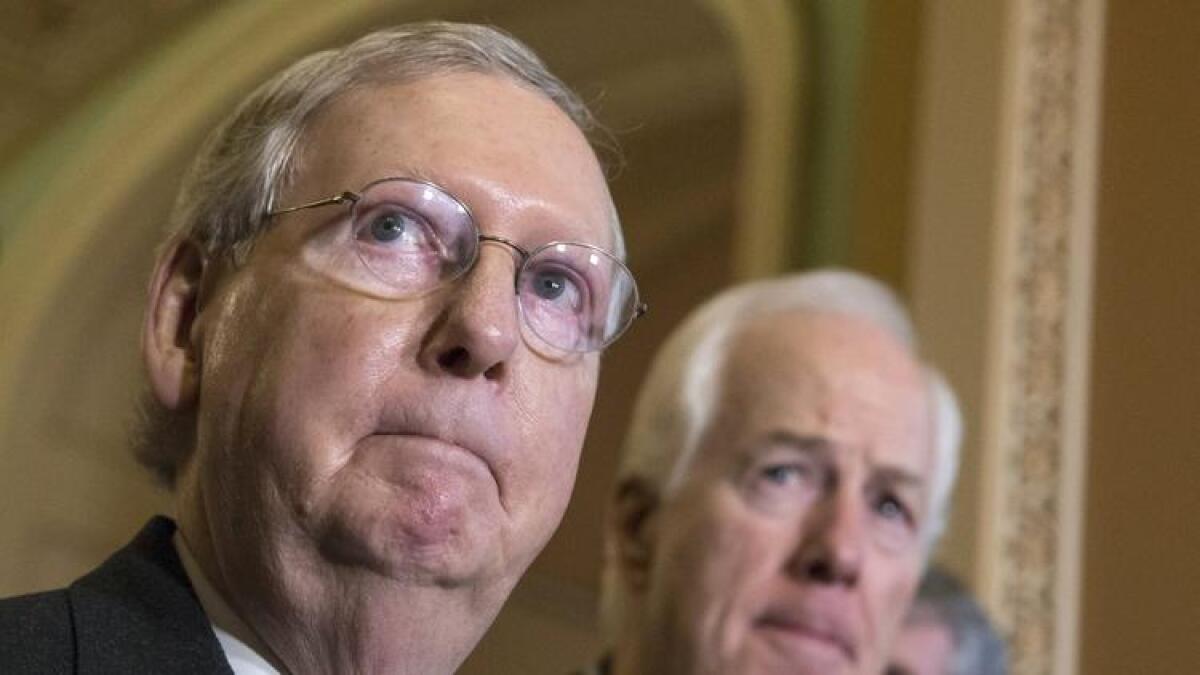
Senate Majority Leader Mitch McConnell’s latest bid to salvage the GOP campaign to roll back the Affordable Care Act collapsed Tuesday as centrist Republicans balked at legislation to repeal the healthcare law now and develop an alternative later.
Alaska Sen. Lisa Murkowski became the third GOP lawmaker to reject McConnell’s new strategy, making it impossible for Senate Republicans to bring up the plan.
Earlier Tuesday, Maine Sen. Susan Collins and West Virginia Sen. Shelley Moore Capito, said they would not back the ‚Äúrepeal and delay‚ÄĚ approach.
‚ÄúI cannot vote to repeal Obamacare without a replacement plan that addresses my concerns and the needs of West Virginians,‚ÄĚ Capito said in a statement.
McConnell on Monday night floated the plan to vote for legislation repealing most of Obamacare now with a plan to develop an alternative over the next two years.
That strategy, which GOP leaders once championed, was revived after it became clear that McConnell, of Kentucky, could not get enough Republican votes for his bill repealing and replacing large parts of the 2010 law at the same time.
But the ‚Äúrepeal-and-delay‚ÄĚ plan would cause even more widespread disruption to the nation‚Äôs healthcare system and throw millions more Americans off the insurance rolls.
An independent analysis of such an approach by the nonpartisan Congressional Budget Office earlier this year concluded that it would lead to 32 million more uninsured Americans over the next decade.
That is some 10 million more than predicted under the Senate repeal-and-replace plan that was scuttled Monday night, which was projected to increase the number of uninsured by 22 million by 2026.
At the same time, repealing major planks of Obamacare without a replacement would cause insurance premiums to jump by 20% to 25% next year for Americans who rely on insurance marketplaces, budget analysts concluded.
And premiums would double by 2026, according to the report.
Similar warnings came from across the nation‚Äôs healthcare system earlier this year when Republicans contemplated a straight repeal bill that followed the template of a ‚Äúrepeal-and-delay‚ÄĚ plan that Congress sent President Obama in 2015 and which he subsequently vetoed.
‚ÄúDelaying such a replacement could create unacceptable instability in the insurance market jeopardizing the healthcare of more than 20 million Americans ‚ÄĒ many of whom are cancer patients and cancer survivors with a preexisting condition,‚ÄĚ Chris Hansen, head of the American Cancer Society‚Äôs advocacy arm, said in January.
Even many leading Republican senators have voiced major concerns about repealing the current law without some replacement.
‚ÄúCongress should replace and repeal at the same time, which requires figuring out how to replace it before fully repealing it,‚ÄĚ Senate health committee chairman Lamar Alexander (R-Tenn.) said in December.
UPDATES:
10:20 a.m.: This article was updated with Sen. Murkowski’s rejection of the new Obamacare repeal plan.
This story originally published at 8:02 a.m.
Trump: ‚ÄėLet Obamacare fail; it will be a lot easier‚Äô
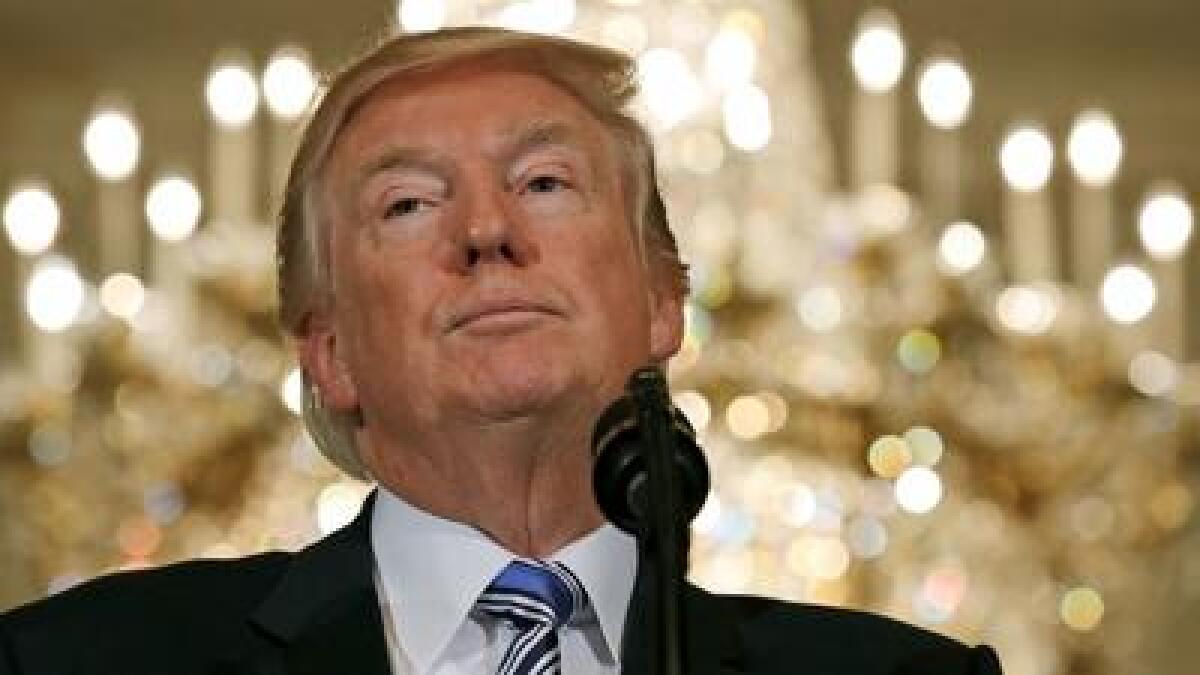
President Trump said he was ‚Äúdisappointed‚ÄĚ to lose his latest attempt to rewrite President Obama‚Äôs healthcare law and went into immediate damage control.
‚ÄúLet Obamacare fail, it will be a lot easier,‚ÄĚ he told reporters during a brief public appearance with Vice President Mike Pence and others at the White House on Tuesday.
He insisted that Republicans would not face voter wrath if they simply do nothing.
‚ÄúWe‚Äôre not going to own it. I‚Äôm not going to own it,‚ÄĚ he said. ‚ÄúI can tell you the Republicans are not going to own it. We‚Äôll let Obamacare fail and then the Democrats are going to come to us.‚ÄĚ
The comments are in line with others Trump has made between intermittent attempts to overhaul the law, a key campaign promise for him and other members of his party. Trump has faced criticism for his lack of engagement in negotiations and selling attempts to pass a replacement.
Trump’s comments were the first since Senate Majority Leader Mitch McConnell (R-Ky.) announced late Monday that he was dropping the latest rewrite effort amid growing opposition from fellow Republicans. McConnell immediately switched plans, announcing he would seek to repeal the law without a replacement. But that idea also quickly died after centrist senators rejected it.
Certify and punish: U.S. slaps new sanctions on Iran after saying Tehran was complying with nuclear deal
A day after declaring that Iran was obeying international restrictions on its nuclear program, the Trump administration went in the opposite direction and slapped new sanctions on the Tehran government for separate alleged transgressions.
The Treasury Department on Tuesday blacklisted 18 individuals and entities for supporting Iran’s military and Revolutionary Guards Corps, accusing them of trying to build ballistic missiles and steal U.S. computer software and of harassing U.S. naval vessels.
The sanctions mean it is illegal for American citizens or companies to do business with those on the list, and any assets they have in the U.S. can be seized.
The back-to-back actions reflect the policy crosscurrents for President Trump in trying to reconcile his campaign promises with the realities of foreign policy governance.
As a candidate, he vowed to ‚Äúrip up‚ÄĚ the 2015 Iranian nuclear deal, which was brokered by the United States with five other countries and the European Union. It required the Islamic Republic to get rid of most of its nuclear material and infrastructure and to submit to intense monitoring.
The United Nations has repeatedly said Iran is complying.
But the administration has sought a way to thread the needle between not walking away from the deal ‚ÄĒ which would have potentially disastrous international consequences ‚ÄĒ and holding Iran accountable for other behaviors, such as its support for militant groups in Lebanon and Yemen.
Iran, along with Russia, also backs Syrian President Bashar Assad, whom the U.S. accuses of numerous atrocities against his citizenry.
‚ÄúThe United States remains deeply concerned about Iran‚Äôs malign activities across the Middle East, which undermine regional stability, security and prosperity,‚ÄĚ State Department spokeswoman Heather Nauert said Tuesday.
The nuclear agreement’s terms are limited to the nuclear weaponry issue. It does not address Iran’s ballistic missile program or any other aspects of its military activities or human rights record. Diplomats said at the time it would have been impossible to reach the nuclear agreement if the other issues were mixed in.
At a midnight deadline Monday, the Trump administration certified that Iran was complying with the nuclear deal. By law, the U.S. must issue certification every 90 days. This is the second time Trump‚Äôs government has done so. It came with last-minute drama this time, as Trump balked at certification ‚ÄĒ against the wishes of his principal national security advisors, according to by a person close to the White House who spoke on the condition of anonymity to describe the internal debate.
On Monday, after talking points for certifying Iran’s compliance already had been distributed within the administration, Trump told senior advisors he was having second thoughts and wanted other options.
Secretary of State Rex Tillerson came to the Oval Office around 1:30 p.m. for a previously scheduled and unrelated meeting with Trump, but the discussion was dominated by what to do with the Iran deal.
Tillerson argued that allies needed more notice before stating Iran wasn’t complying with the deal. Trump national security advisor H.R. McMaster and other senior advisors present, including Gen. Joseph Dunford, chairman of the Joint Chiefs of Staff, also made the case for holding off.
But Steve Bannon, Trump’s strategic advisor who keeps a list of Trump’s campaign pledges on a white board in his White House office, said Trump should follow through with his promise to tear up the deal.
After nearly an hour, Trump agreed to support certification, but demanded a plan for getting tougher on Iran. Facing the midnight deadline to inform Congress, advisors were still were tweaking the wording of the announcement as late as 9:30 p.m.
Hours after the certification, the administration announced the new sanctions for Iran’s separate actions. The penalties are the latest in a long list of attempts to punish Tehran.
‚ÄúIran‚Äôs other malign activities are serving to undercut whatever ‚Äėpositive contributions‚Äô to regional and international peace and security were intended to emerge from the‚ÄĚ nuclear agreement, Nauert said.
Besides Iran‚Äôs Revolutionary Guards, the new sanctions target the military‚Äôs support of so-called ‚Äúfast attack boats,‚ÄĚ which are the small vessels Iran uses to harass U.S. ships in the region‚Äôs waters.
Most of those sanctioned Tuesday were Iranian, but one company is based in Turkey and one individual is a Chinese national.
The sanctions ‚Äúsend a strong signal that the United States cannot and will not tolerate Iran‚Äôs provocative and destabilizing behavior,‚ÄĚ Treasury Secretary Steven Mnuchin said.
As part of the nuclear accord, numerous international sanctions on Iran were lifted, allowing it to export oil and rejoin the global financial system.
The State Department also reissued calls for the release of U.S. citizens arrested in Iran.
A California businessman born in the former Soviet Union also attended Trump Jr. meeting
Donald Trump Jr.’s controversial meeting with a Russian lawyer in June 2016 was attended by a California businessman born in the former Soviet republic of Georgia, according to two people familiar with the meeting.
Irakly ‚ÄúIke‚ÄĚ Kaveladze, a 52-year-old businessman from Huntington Beach, was the eighth individual at the controversial meeting, The Times has learned. His identity had not previously been revealed.
Kaveladze was asked to attend the meeting at Trump Tower by Aras Agalarov, a billionaire Azerbaijani real estate developer who once planned to build a hotel in Moscow with Donald Trump, according to his Kaveladze’s lawyer, Scott Balber.
Neither the White House nor Trump Jr. previously had revealed Kaveladze’s presence at the meeting, despite repeated public statements about it.
At the meeting, Natalia Veselnitskaya, a Russian lawyer purportedly also sent by Agalarov, provided Trump with material that she said showed improper donations to the Democratic National Committee, information that she said could be useful against Hillary Clinton.
Kaveladze ‚Äúwas asked to attend the meeting purely to ‚Ķ make sure it happened,‚ÄĚ said Balber. ‚ÄúHe literally had no idea what the meeting was about until he showed up right before.‚ÄĚ
Kaveladze has been contacted by prosecutors working for special counsel Robert Mueller, who is investigating possible coordination between the Trump campaign and the Russian government, according to Balber, who said his client was ‚Äúcooperating fully,‚ÄĚ with investigators.
Balber said Kaveladze did not recall saying anything at the half-hour meeting on June 9, 2016.
Trump Jr. agreed to the meeting after he was told he would be given derogatory information about Clinton, the Democratic presidential nominee, as ‚Äúpart of Russia and its government‚Äôs support for Mr. Trump,‚ÄĚ according to emails that Trump Jr. released last week.
President Trump’s son-in-law, Jared Kushner, and his then-campaign chairman, Paul Manafort, also attended.
Balber, who is based in New York, said Kaveladze does not understand why the meeting became so controversial.
‚ÄúHe‚Äôs absolutely baffled,‚ÄĚ said Balber. ‚ÄúEven the Agalarovs are absolutely baffled. Nobody had any expectation this would be what it‚Äôs become, especially this poor guy, who had not been involved before.‚ÄĚ
Also at the meeting was Rinat Akhmetshin, a Washington lobbyist born in the former Soviet Union, who said he was attending at Veselnitskaya’s request.
According to Balber, Veselnitskaya ---who had done real estate work for the Agalarovs in Moscow -- asked one of the Agalarovs to provide an introduction to the Trumps.
The Agalarovs then asked a publicist, Rob Goldstone, to contact Donald Trump Jr.
‚ÄúThis was not a highly important item to the Agalarovs,‚ÄĚ Balber said. ‚ÄúIf it were, I suspect it would have happened very differently.‚ÄĚ
After giving Trump Jr. papers purporting to describe illegal donations, Veselnitskaya and Akhmetshin shifted the conversation to the Magnitsky Act, the U.S. law that imposes sanctions on Russian businessmen, which both have lobbied against.
A spokesman for Mueller’s office declined to comment.
House Republicans unveil their 10-year budget blueprint
House Republicans on Tuesday unveiled a 10-year budget blueprint that would dramatically increase military spending while putting the GOP on record favoring Medicare cuts opposed by President Trump.
The GOP plan, authored by Budget Committee Chairwoman Diane Black (R-Tenn.), would also pave the way for overhauling the U.S. tax code this fall, and would pair that effort with cuts to benefit programs such as food stamps. It also lays out a path to balance the budget inside a decade through deep cuts to a wide swath of domestic programs ‚ÄĒ though GOP leaders have no intention of actually carrying out the cuts.
Black announced a committee vote for Wednesday, but action by the entire House could be delayed by an ongoing quarrel between the GOP’s tea party and moderate factions over spending cuts.
Medicare is the second-largest mandatory program after Social Security, and the House GOP plan again proposes to turn Medicare into a voucher-like program in which future retirees would receive a fixed benefit to purchase health insurance on the open market. Republicans have proposed the idea each year since taking back the House in 2011, but they‚Äôve never tried to implement it ‚ÄĒ and that‚Äôs not going to change now, even with a Republican as president.
The plan, in theory at least, promises to balance the budget through unprecedented and unworkable cuts across the budget. It calls for turning this year’s projected $700-billion or so deficit into a tiny $9-billion surplus by 2027. It would do so by slashing $5.4 trillion over the coming decade, including almost $500 billion from Medicare, $1.5 trillion from Medicaid and the Obama administration healthcare law, along with enormous cuts to benefits such as federal employee pensions, food stamps, and tax credits for the working poor.
Trump administration says Iran is in compliance with the nuclear deal
President Trump apparently will wait for another day to ‚Äúrip up‚ÄĚ the Iran deal, as he promised on the campaign trial.
Late Monday, three senior officials said the Trump administration would formally certify by midnight that Iran is in compliance with the restrictions on its nuclear program under the 2015 deal negotiated with the United States, Britain, France, Russia, China and Germany. The action keeps in place sanctions relief for Iran in exchange for its continued freeze of its weapons program.
By law, the administration has to decide every 90 days whether Iran had fulfilled its obligations under the pact brokered by the Obama administration. Trump made the first such certification earlier this year.
Secretary of State Rex Tillerson ‚Äúwill make certification today on behalf of the president‚ÄĚ that the accord‚Äôs terms agreed to in Geneva two years ago ‚Äúhave been met based on the information available to the United States as of today,‚ÄĚ a senior administration official told reporters late Monday. The official spoke on condition of anonymity to discuss the decision before it was formally announced and Congress was informed.
Tillerson also plans to criticize Iran, saying it ‚Äúremains one of the most dangerous threats to U.S. interests and to regional stability‚ÄĚ and ‚Äúis unequivocally in default of the spirit‚ÄĚ of the agreement, the official said.
The U.S. has criticized Iran for supporting the government of Bashar Assad in Syria and fomenting unrest in Yemen and elsewhere in the region.
In addition, Tillerson will push to more strictly enforce the deal, impose additional restrictions and eliminate the aspect of the deal that allows Iran to resume some nuclear production after 10 years, the official said.
The U.S. is considering new sanctions against Iran‚Äôs ballistic missile program as well as its ‚Äúfast boat‚ÄĚ program in which Iran uses small vessels to harass U.S. Navy patrol boats in the Persian Gulf, the official said.
‚ÄúI think you all know that the president has made very clear that he thought this was a bad deal, a bad deal for the United States,‚ÄĚ Sean Spicer told reporters Monday.
Pulling out of the deal would upset allies who helped negotiate the deal and force the administration to come up with another strategy to curtail Iran’s nuclear program, a problem it is far from fixing in North Korea.
The deal was agreed to by Iran, the European Union, Germany, and the five permanent members of the United Nations Security Council -- China, France, Russia, Britain and the United States.
Yet the deal is very unpopular among many conservatives. John Bolton, an influential former ambassador, called for immediate withdrawal in an opinion column published Sunday in the Hill.
‚ÄúThe administration should stop reviewing and start deciding,‚ÄĚ he wrote.
Two more Republican senators oppose healthcare bill, dooming current GOP plan
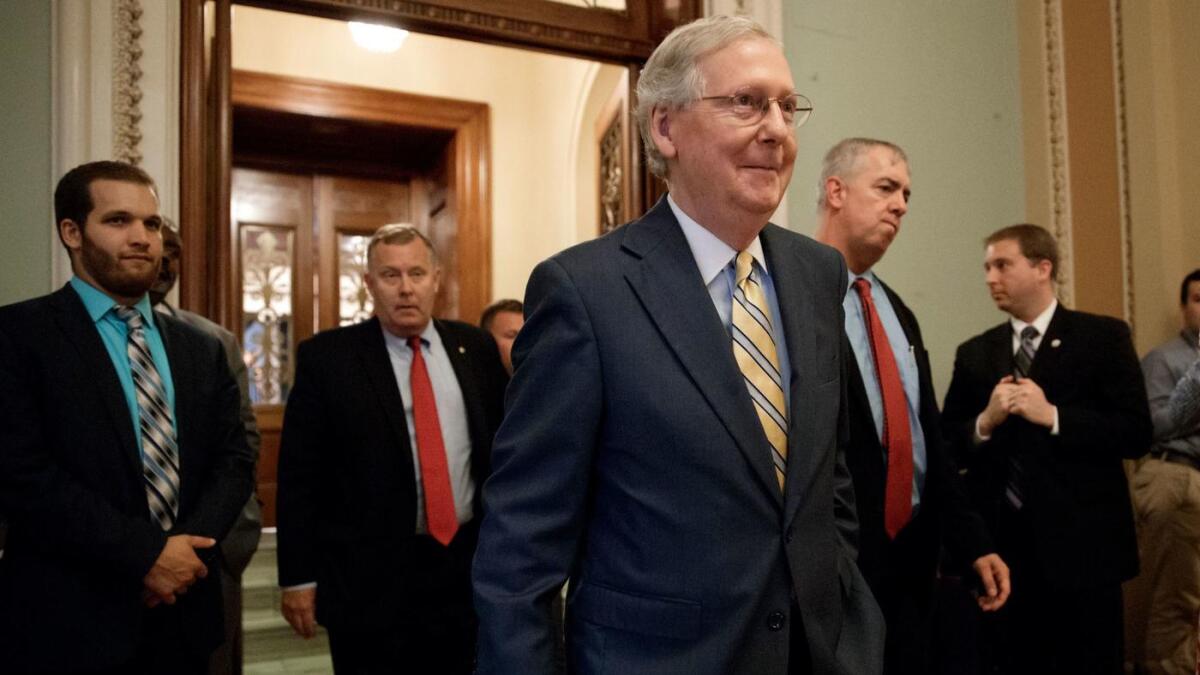
Republican efforts to replace the Affordable Care Act collapsed in the Senate on Monday evening as two more GOP senators announced they would oppose the plan backed by their party’s leadership.
The announcements by Sens. Mike Lee of Utah and Jerry Moran of Kansas brought to four the number of Republican senators opposed to bringing the bill to the Senate floor for debate. With all Senate Democrats against the bill, their opposition was enough to kill the current measure.
‚ÄúWe should not put our stamp of approval on bad policy,‚ÄĚ Moran said in a statement. ‚ÄúWe must now start fresh.‚ÄĚ
Lee said that he opposed the plan because it would not lower costs for healthy Americans whose insurance premiums were pushed up by the need to subsidize costs for those who were ill.
‚ÄúIn addition to not repealing all of the Obamacare taxes, it doesn‚Äôt go far enough in lowering premiums for middle-class families; nor does it create enough free space from the most costly Obamacare regulations,‚ÄĚ Lee said in a statement, referring to the current bill.
The sudden announcement from Lee, a leading conservative, and Moran, who headed the Senate Republican Campaign Committee in the 2014 election, came as President Trump was dining at the White House with several GOP supporters of the bill. That timing made their announcements a more stinging rebuke of the White House’s efforts on behalf of the measure.
A White House spokesperson said that Trump would continue to push for repeal of the Affordable Care Act, also known as Obamacare.
‚ÄúInaction is not an option,‚ÄĚ the spokesperson said. ‚ÄúWe look forward to Congress continuing to work toward a bill the president can sign to end the Obamacare nightmare and restore quality care at affordable prices.‚ÄĚ
Two other Republican lawmakers, Sens. Susan Collins of Maine and Rand Paul of Kentucky, had previously announced that they would oppose the bill. With 52 Republicans in the Senate, Majority Leader Mitch McConnell could afford their two defections, but no additional ones.
Throughout the last few weeks, Republican lawmakers have been under intense pressure not to be the senator whose vote was the final one to kill the bill. By making their announcement together, Moran and Lee may have hoped to avoid that label.
McConnell could now attempt to pull together a new version of the legislation, but Moran’s call for a fresh start indicated that he, at least, would be difficult to sway.
House Republicans failed in several attempts before finally passing their version of a repeal bill earlier this year. But the White House has been unable, or unwilling, to exert similar pressure on Republican senators, and time is dwindling on the legislative calendar to accomplish other GOP goals.
Beyond the four announced opponents, several other Republican senators had strong doubts about the bill. Earlier in the day, Sen. Ron Johnson of Wisconsin, one of the Senate’s most conservative members, had said he might oppose the bill.
Johnson said he objected to statements McConnell had made in efforts to reassure centrist senators. According to Johnson, McConnell had told those senators that the steep cuts in Medicaid the bill called for wouldn’t take effect for years and might never happen.
The Republican bill also faced mounting opposition from the health insurance industry. Insurers until recently had resisted public criticism of the GOP healthcare campaign. On Friday, however, they issued a blistering critique of the latest version of the Senate legislation.
The industry‚Äôs two leading trade groups called the bill ‚Äúunworkable‚ÄĚ and warned that it would make it more difficult for sicker Americans to get coverage, echoing warnings from the nonpartisan Congressional Budget Office, the American Academy of Actuaries and others.
As many as 10 Republican senators had remained undecided as leaders worked behind closed doors to try to solidify support for the bill. Others are likely to break ranks now that it is clear the bill does not have the support to pass.
The move also exposes a new rupture among conservatives. An amendment from Sen. Ted Cruz (R-Texas) to allow insurers to offer low-priced, bare-bones plans was supposed to draw conservative support.
But it was not enough for either Paul or Lee, a longtime Cruz friend and ally.
Democrats welcomed another, potentially insurmountable, setback as they push Republicans to end their efforts to repeal the healthcare law, also called Obamacare, and work together to fix it.
‚ÄúThis second failure of Trumpcare is proof positive that the core of this bill is unworkable,‚ÄĚ said Sen. Charles E. Schumer (D-N.Y.).
‚ÄúRather than repeating the same failed, partisan process yet again, Republicans should start from scratch and work with Democrats on a bill that lowers premiums, provides long-term stability to the markets and improves our healthcare system.‚ÄĚ
Deadline looming for Trump to say if Iran is still complying with nuclear deal
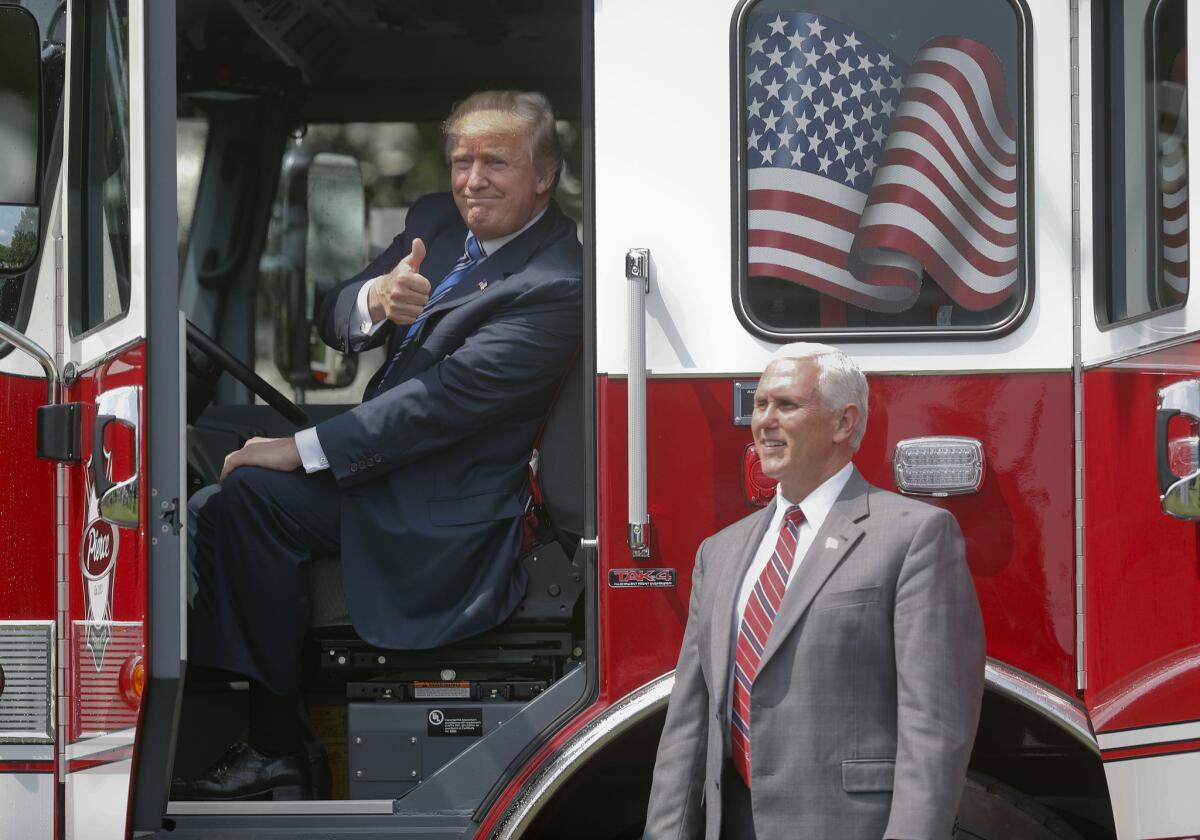
The administration is hitting a deadline to say whether it believes Iran is in compliance with the nuclear deal that President Trump in his campaign promised to obliterate; an announcement is expected soon, White House Press Secretary Sean Spicer said.
‚ÄúThe secretary of State will have an announcement very shortly on that deal,‚ÄĚ Spicer told reporters Monday during an off-camera briefing at the White House.
‚ÄúI think you all know that the president has made very clear that he thought this was a bad deal, a bad deal for the United States.‚ÄĚ
Calling the agreement bad is hardly an assurance that Trump will rip it up, as he promised on the campaign trail.
By law, every 90 days the administration has to decide whether to certify that Iran is in compliance with the pact negotiated by the Obama administration. Earlier this year, Trump made the first such certification, and numerous reports have quoted White House officials saying he is likely to do so again.
Spicer defended the first certification Monday, saying Trump ‚Äúhad the luxury of having an entire team‚ÄĚ reexamine the deal before he decided whether to dismantle it.
‚ÄúThat time is up,‚ÄĚ he said, and Secretary of State Rex Tillerson will make his announcement shortly.
The decision puts intense pressure on the White House.
Pulling out of the deal would upset allies who helped negotiate the deal and force the administration to come up with another strategy to curtail Iran’s nuclear program, a problem it is far from fixing in North Korea.
Yet the deal is very unpopular among many conservatives. John Bolton, an influential former ambassador, called for immediate withdrawal in an opinion column published Sunday in the Hill.
‚ÄúThe administration should stop reviewing and start deciding,‚ÄĚ he wrote.
CBO analysis of latest GOP healthcare bill delayed
There’s another possible delay to the Senate’s consideration of a Republican bill to repeal and replace the Obama administration healthcare law.
The Congressional Budget Office had been scheduled to release an analysis on the latest GOP bill on Monday, including its estimated cost and scope of insurance coverage.
But the Senate Budget Committee on Sunday said the release had been postponed. The committee did not provide an explanation or indicate when the analysis was expected, saying it will provide further information and updates as appropriate.
The CBO’s announcement comes after Senate Majority Leader Mitch McConnell said he was delaying a highly anticipated Senate vote on the bill this week, after Sen. John McCain disclosed that he had undergone surgery. Doctors had advised McCain to recover in Arizona this week.
In his small hometown, Arizona’s Jeff Flake faces perils and pressure of Senate healthcare debate
Ron McArthur is a man with big plans.
As head of the chief medical provider in this rural slice of eastern Arizona, McArthur firmly believes what‚Äôs good for Summit Healthcare is good for communities tucked in the foothills of the White Mountains. ‚ÄúWe‚Äôre the economic engine,‚ÄĚ he said. ‚ÄúWe sponsor everything, we‚Äôre the biggest employer, we offer the highest-paying jobs.‚ÄĚ
But right now, he said, a proposed surgery center and other expansion plans are imperiled by Republican efforts to drastically overhaul the nation’s healthcare system, leaving the state’s GOP lawmakers to choose, as McArthur sees it, between party loyalty and their hard-pressed constituents.
Snowflake Mayor Lynn Johnson is one of those constituents.
He runs a physical therapy practice that has suffered, he said, a double whammy under the healthcare law signed by President Obama. Johnson receives less for each patient he treats under Medicare and Medicaid and pays more to insure his employees.
‚ÄúYou used to be able to make a decent living,‚ÄĚ Johnson said. ‚ÄúNow you‚Äôre fighting for everything you get.‚ÄĚ
All of which leaves Sen. Jeff Flake of Arizona in a tough spot.
Democrats say Donald Trump Jr.‚Äôs meeting takes Russia inquiry to a ‚Äėnew level‚Äô
During what would normally be a time of summer doldrums in Washington D.C., President Trump ‚ÄĒ following a pomp-filled visit to Paris and a weekend getaway to his New Jersey golf property ‚ÄĒ returns to the nation‚Äôs capital roiled by the burgeoning Russia probe, a faltering GOP healthcare plan and sinking opinion polls.
Trump goes back to work after a four-day absence and another news cycle dominated by disclosures stemming from last summer’s meeting of his eldest son, a Kremlin-linked lawyer and at least one other controversial Russian figure.
New polling confirms Trump’s slide as healthcare, Russia investigation drag down his standing
New polling released Sunday confirmed how deep the hole is that President Trump finds himself in six months into his presidency, but also offered some warnings to his Democratic opponents.
A new Washington Post/ABC News survey found that Americans by 36%-58% disapprove of Trump’s performance in office.
That’s a significantly worse grade than the public has given any president at this point in his tenure since modern polling began in the 1940s.
The poll does not suggest that recent headlines have worsened Trump’s standing -- although some were interpreting it that way.
There‚Äôs no evidence, for example, that news of Donald Trump Jr.‚Äôs meeting with a Russian lawyer and a Russian American lobbyist last year has affected the president‚Äôs standing so far -- although the poll did find that by 63%-26%, Americans thought the meeting was ‚Äúinappropriate.‚ÄĚ
The Post/ABC poll showed a slide in Trump’s standing since the survey was last taken in April. Many other polls in the intervening weeks have documented that drop.
Most of the decline appears to have taken place in early May -- around the time that Trump fired FBI Director James B. Comey and the House passed the Republican healthcare bill, which is extremely unpopular.
Trump tried to brush aside the new poll, saying in a tweet that the Post/ABC poll had been inaccurate during the 2016 election.
That’s untrue. The Post/ABC was off by about 2 percentage points from the actual election results. If it’s currently wrong by the same amount, Trump would remain far more unpopular than any of his predecessors.
But the poll offers some potential good news for the president: He has largely kept support within his own party.
While Democrats and independents disapprove of Trump’s performance by large margins, those who identify themselves as Republicans continue to approve, 82%-15%.
That could give Trump a base on which to rebuild.
In that regard, Trump’s position somewhat resembles that of former President Clinton -- the only other modern president who suffered from the disapproval of a majority of voters at this stage of his presidency.
Clinton’s low approval helped cost his party control of the House in the midterm election two years into his tenure. Trump’s poor standing similarly threatens Republican control of the House in 2018.
But Clinton eventually was able to climb back up and win reelection, in part because of some spectacular errors by his Republican opponents.
Clinton had another factor in his favor that Trump may not, however -- the economy. He won the presidency just as the economy had started to recover from a short, but sharp, recession. Strong economic growth in his reelection year helped him win.
Trump, by contrast, took office with the economy seven years into a slow recovery from the worst recession since the 1930s. So far this year, economic growth has been lagging a bit. Whether the economy will continue to grow for the next four years is a wide-open question.
The president also could benefit from the Democrats’ failure so far to convince the public that they stand for something other than opposition to Trump. In the Post/ABC poll, 37% said the Democrats stand for something, while 52% said they just oppose Trump.
Separately, a new NBC/Wall St. Journal survey which looked at counties Trump carried in 2016 found that 50% of adults in those areas now approve of Trump. That level is significantly below Trump’s showing in those counties in the election, which averaged around 60%. The two numbers are not entirely comparable, but the figure suggests some weakening of Trump’s backing in the places crucial to his victory.
The Washington Post/ABC poll was conducted July 10-13 among 1,001 adults nationwide. The margin of sampling error is 3.5 points in either direction. The NBC/Wall St. Journal survey was conducted July 8-12 among 600 adults in the targeted counties. The margin of error for the full sample is 4.0 percentage points in either direction.
Obamacare repeal bills could put coverage out of reach for millions of sick Americans
President Trump and congressional Republicans, despite repeated pledges to preserve sick Americans’ access to health coverage, are poised to scrap this core insurance protection in their campaign to roll back the Affordable Care Act.
Both the House GOP bill that passed in May and the revised Senate GOP bill unveiled last week effectively eliminate the coverage guarantee by allowing health insurers to once again sell skimpier plans and charge more to people with preexisting health conditions who need more-comprehensive coverage.
At the same time, the House and Senate bills dramatically scale back financial aid to low- and moderate-income consumers, and slash funding for Medicaid, the government safety-net plan that has helped millions of sick and poor Americans gain coverage.
That combination ‚ÄĒ looser insurance requirements and less financial assistance for patients ‚ÄĒ will once again put health plans out of reach for millions of sick Americans, according to numerous analyses.
McConnell postpones healthcare vote after McCain undergoes surgery
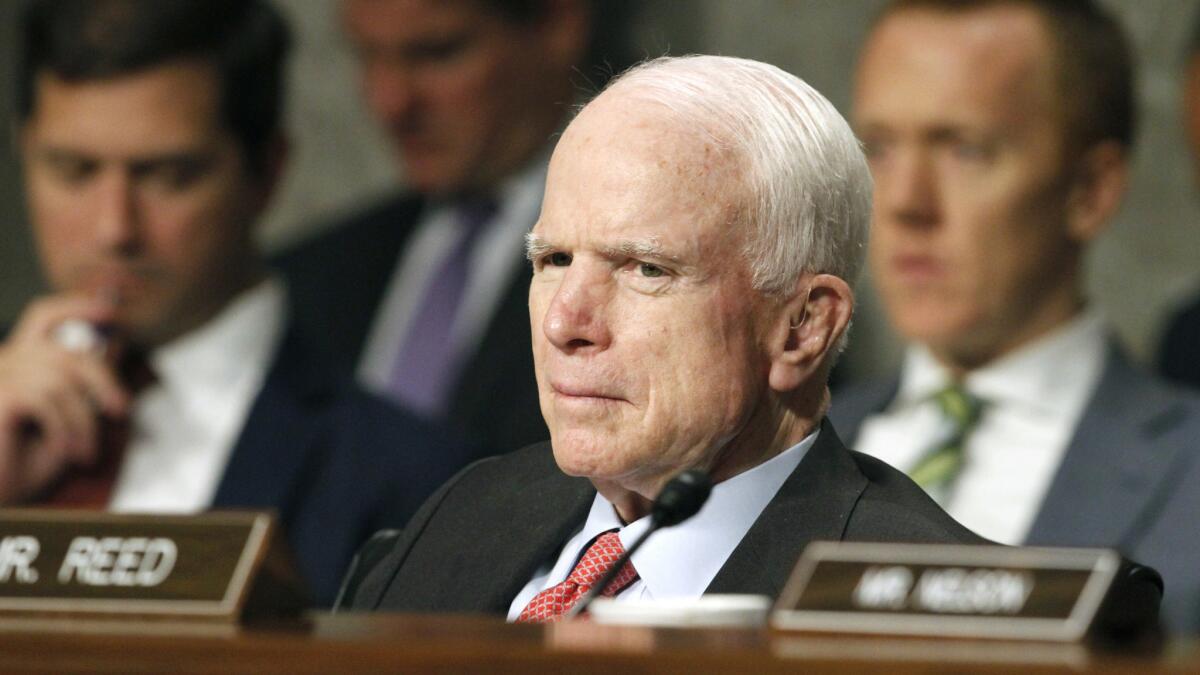
Senate Majority Leader Mitch McConnell (R-Ky.) said he is deferring consideration of the GOP healthcare bill.
McConnell had planned action on the controversial bill next week. But Sen. John McCain announced Saturday that he would be staying in Arizona after surgery for a blood clot.
McCain’s absence put the measure in jeopardy in the closely divided Senate.
He’ll always have Paris: Trump was buoyed by the pomp of his France trip, only to return to dysfunction and scandal

President Trump returned Friday from being feted in France to confront new, damaging revelations in the investigation into whether his associates coordinated with Russian efforts to sway the 2016 election, as well as perilous signs in Congress for the Republican healthcare bill that represents one of his major campaign pledges.
Frustrated and unhappy with how his team has handled the response to the steady drip of damaging information, Trump has reportedly decided to hire Ty Cobb, a longtime Washington lawyer, to manage the White House’s political and legal responses to the Russia investigation.
Trump’s lawyers ask Supreme Court to rein in Hawaii judge
Trump administration lawyers voicing frustration with a federal judge in Hawaii have asked the Supreme Court to intervene again and to allow the government to strictly enforce its temporary foreign travel ban.
The acting U.S. solicitor general said the justices should issue a ruling to clarify the travel ban or, at minimum, block the latest ruling by U.S. District Judge Derrick Watson in Hawaii.
‚ÄúAt this point, this court‚Äôs intervention is both necessary and warranted,‚ÄĚ Jeffery Wall, the acting Solicitor General, said in an appeal filed Friday evening.
At issue now is whether the ban can be enforced to deny entry to grandparents, aunts, uncles, nieces, nephews and cousins as well as what the government calls ‚Äúmore distant relatives.‚ÄĚ
On June 26, the high court said the travel ban could be enforced, but not against foreigner travelers who had a ‚Äúclose‚ÄĚ family member in the United States. But its short opinion did not carefully define who qualified under that standard.
Lawyers for Hawaii then went back to Judge Watson, who this week adopted a broader standard that would allow more family members and refugees to enter the country.
Atty. Gen. Jeff Sessions had earlier complained that a single judge in Hawaii should not be permitted to determine the government‚Äôs policy, and he repeated that complaint in a statement issued Friday evening. ‚ÄúOnce again, we are faced with a situation in which a single federal district court has undertaken by a nationwide injunction to micromanage decisions of the co-equal executive branch related to our national security,‚ÄĚ he said.
The justices are on their summer recess, and many have left Washington.
The emergency appeal comes at a particularly inconvenient time for Justice Anthony Kennedy, who oversees such appeals coming from the 9th Circuit and the West Coast.
Kennedy had traveled to Salzburg, Austria, where he teaches a summer class for the University of the Pacific. He had planned to be in San Francisco next week for the 9th Circuit’s conference of judges.
But his wife, Mary, fell and broke her hip, and the court announced on Friday that Kennedy will remain in Austria while she recovers. Justice Neil M. Gorsuch will take his place at the 9th Circuit conference.
Nonetheless, the justices regularly decide on emergency orders even when they are scattered around the country, and they likely will take action on the government’s appeal within a few days.
Russia sanctions bill stalls in Congress as lawmakers warn Trump administration not to ease restrictions
A bill bolstering sanctions on Russia has stalled in Congress amid partisan finger-pointing, leaving lawmakers worried that the inaction could limit their legislative check on the Trump administration.
Top Democratic senators warned administration officials ahead of bilateral talks next week not to give back Russian diplomatic compounds in New York and Maryland that were seized amid revelations of Russian interference in the 2016 presidential election.
Returning the compounds or lifting other sanctions would have required congressional review under legislation approved by the Senate in an overwhelming 98-2 vote last month.
The legislation, however, has stalled in the House as the administration works to soften the congressional reach.
‚ÄúSimply put, the Russian government has done nothing to deserve renewed access to these compounds,‚ÄĚ wrote Sen. Ben Cardin (D-Md.) of the Foreign Relations Committee, and Senate Minority Leader Charles E. Schumer (D-N.Y.), along with Democratic colleagues from their states.
‚ÄúThere is clearly very strong support in Congress for vigilance with regards to the Russian government presence in the United States,‚ÄĚ the senators wrote. ‚ÄúWe urge you to be similarly vigilant as you broach negotiations on a range of bilateral issues with the Russians.‚ÄĚ
Congress drafted the sanctions bill to backstop then-President Obama’s efforts to reprimand Russia after the election interference. The bill would enable the legislative branch to halt a reversal or lifting of sanctions by the White House with a majority vote.
House Speaker Paul D. Ryan said this week he intended to pass the bill.
‚ÄúI‚Äôm a Russia hawk. I believe in strong, bold Russian sanctions. We want to move this Russia sanctions bill,‚ÄĚ the speaker said.
Problems arose in part because the Senate version would have allowed any member of Congress to force a vote. But House Republicans and the administration objected, saying that gave too much authority to the legislative branch and allowed the minority Democratic Party to gum up floor operations.
The Senate quickly approved a revised version of the bill, but House Democrats objected to having their power curtailed.
The standoff continues as investigations deepen into links between President Trump’s team and Russia, and Donald Trump Jr.’s emails about his meeting with a Russian lawyer during the campaign.
In public, Republicans in Congress have downplayed the Russian inquiry as not a top priority for constituents back home.
Rep. Dave Brat (R-Va.) said the top Democrat on the Senate Intelligence Committee, which is conducting a bipartisan investigation of the matter, is ‚Äúseeing smoke everywhere, like a ‚ÄėCheech and Chong‚Äô movie.‚ÄĚ
House Minority Leader Nancy Pelosi said Republicans, by refusing to more directly confront and criticize the White House over its Russian ties, have become ‚Äúenablers‚ÄĚ of behavior that is threatening to undermine American institutions.
‚ÄúRepublicans in Congress should stop hiding from the truth and stop hiding the truth from the American people,‚ÄĚ she said Friday.
House Democrats have promised to step up their oversight of Trump’s possible connections with Russia by using other floor procedures.
This week, Democrats offered several symbolic amendments on a must-pass defense bill. One would have endorsed the intelligence community’s January report that found Russian interference in the election. Others would have blocked Trump’s proposed cyber-task force with Russia. They failed largely along party lines.
Former Russian military intelligence officer attended Trump Tower meeting
Donald Trump Jr.’s meeting with a Russian lawyer aimed at obtaining derogatory information about Hillary Clinton in June 2016 had another, previously undisclosed participant: a former Soviet military counterintelligence officer.
Rinat Akhmetshin, who received U.S. citizenship and became a Washington lobbyist after emigrating from Russia more than a decade ago, confirmed in an email message Friday that he had joined the meeting with the lawyer, Natalia Veselnitskaya.
Veselnitskaya brought a memo to the meeting to present to Trump Jr., Akhmetshin said, adding that he was not aware of the contents.
Neither the White House nor Trump Jr. previously had revealed Akhmetshin’s presence at the meeting, despite repeated public statements about it.
The belated disclosure almost surely will increase the controversy that already surrounds the session.
A friend of Trump Jr.‚Äôs who helped set up the meeting had described Veselnitskaya to him in emails as a Russian government lawyer. The friend said she could offer information about Clinton as ‚Äúpart of Russia and its government‚Äôs support for Mr. Trump,‚ÄĚ according to emails released Tuesday by Trump Jr.
Akhmetshin also spoke with the Associated Press and said that at the June 9, 2016, meeting, also attended by Trump son-in-law Jared Kushner and campaign chairman Paul Manafort, Trump Jr. asked Veselnitskaya for evidence of illicit money flowing to the Democratic National Committee.
When Veselnitskaya said she didn‚Äôt have that information, Trump Jr. lost interest, Akhmetshin told the AP. ‚ÄúThey couldn‚Äôt wait for the meeting to end,‚ÄĚ he said.
Akhmetshin, who describes himself as a friend of Veselnitskaya’s, denies any current links to Russian intelligence. He lobbies the U.S. Congress, often on behalf of wealthy businessmen or politicians from former Soviet republics, records show.
His role at the meeting is unclear. He is fluent in Russian and English, however. Veselnitskaya has said that she cannot read or write English, but may speak some. NBC reported Friday that a translator also participated in the meeting, in addition to Akhmetshin and Veselnitskaya.
Trump Jr. said in statements this week that Veselnitskaya had no information about Clinton and shifted the conversation to the Magnitsky Act, the U.S. law that imposes sanctions on Russian businessmen.
Akhmetshin said the meeting was ‚Äúnot substantive‚ÄĚ and he ‚Äúactually expected more serious‚ÄĚ discussion.
‚ÄúI never thought this would be such a big deal, to be honest,‚ÄĚ he told AP.
This post was updated with Akhmetshin’s statement that Veselnitskaya had a written memo with her at the meeting.
Three Marines from Southern California were among 16 killed in military plane crash
The Pentagon identified 16 service members, three from Southern California, who were killed this week when their military cargo plane suffered a mid-air failure on a cross-country flight and crashed in a soybean field in rural Mississippi.
The KC-130T aircraft was carrying one Navy sailor, six Marines and nine crew members on a mission from North Carolina to California when it disappeared from air traffic control radar Monday afternoon as it passed over Leflore County, Miss.
Investigators have yet to determine what happened to the plane, which was transporting equipment and personnel from the elite 2nd Marine Raider Battalion, based at Camp Lejeune in Jacksonville, N.C., for pre-deployment training.
The KC-130T, which took off from Cherry Point, N.C., was set to drop off the special operations forces in Yuma, Ariz., before continuing to Naval Air Facility El Centro in Imperial County.
It had traveled about 900 miles westward and was flying above a stretch of the Mississippi Delta when witnesses said they heard a loud bang and saw a smoking plane corkscrew toward the ground near U.S. Highway 82.
Brig. Gen. Bradley James, commander of the 4th Marine Air Wing, told reporters Wednesday in Mississippi that there were two impact sites separated by about a mile.
‚ÄúIndications are something went wrong at cruise altitude,‚ÄĚ he said. ‚ÄúThere is a large debris pattern.‚ÄĚ
Among those killed were Marine Capt. Sean E. Elliott, 30, of Orange. Elliott was a KC-130 commander assigned to the Marine Aerial Refueler Transport Squadron 452, based in Newburgh, N.Y.
Staff Sft. Robert H. Cox, 28, of Ventura was a special operations Marine with the 2nd Raider Battalion headquartered at Camp Lejeune. He had deployed to Afghanistan in 2011 and Iraq three times since 2009, most recently in July 2016.
Sgt. Chad E. Jenson, 25, of Los Angeles was also a member of the special operations 2nd Raider Battalion. He was awaiting his first deployment.
Trump tweets at Senate Republicans to pass Obamacare overhaul, but vote remains in doubt
Divided Senate Republicans unveil new version of Obamacare repeal bill
With their bid to roll back the Affordable Care Act only a vote away from collapse, Republican leaders scrambled Thursday to rally GOP senators behind revised healthcare legislation in hopes of passing it next week.
The new version ‚ÄĒ which represents Senate Majority Leader Mitch McConnell‚Äôs latest bid to unite his fractious caucus ‚ÄĒ still would enact historic cuts in federal healthcare assistance to low- and moderate-income Americans and fundamentally scale back Medicaid‚Äôs half-century-old guarantee of health coverage for the poor.
The revised bill would further loosen insurance requirements to allow health plans to offer stripped-down, cheaper plans, a move designed to win over skeptical conservative senators.
Trump incorrectly blames Obama administration attorney general for letting Russian lawyer into U.S.
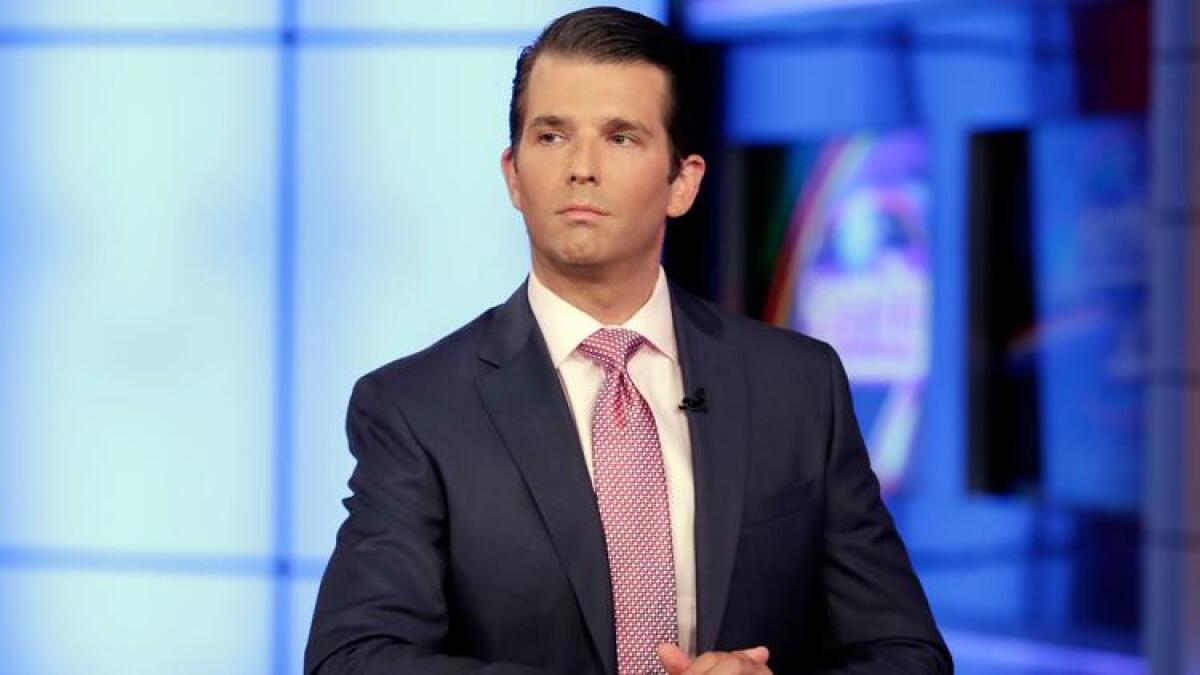
President Trump tried to deflect questions Thursday about his son’s meeting last year with a Russian lawyer, implying that the attorney had been let into the U.S. under murky circumstances by the Obama administration’s attorney general.
Trump, employing an attribution that he often uses, ‚Äúsomebody said,‚ÄĚ remarked that he had heard the lawyer, Natalia Veselnitskaya, had been allowed into the U.S. by then-Atty. Gen. Loretta Lynch, a frequent target of Trump aides and supporters.
‚ÄúSomebody said that her visa or her passport, to come into the country, was approved by Attorney General Lynch,‚ÄĚ Trump said at a news conference in Paris.
‚ÄúNow, maybe that‚Äôs wrong. I just heard that a little while ago, but a little surprised to hear that. So, she was here because of Lynch.‚ÄĚ
There is no evidence that Lynch was involved in the decision to admit Veselnitskaya, and Trump provided none.
Robert Raben, a spokesman for Lynch, denied that she was involved in admitting Veselnitskaya.
‚ÄúAtty. Gen. Lynch, as the former head of the Justice Department, does not have any personal knowledge of Ms. Veselnitskaya‚Äôs travel,‚ÄĚ Raben said.
‚ÄúThe State Department issues visas, and the Department of Homeland Security oversees entry to the United States at airports.‚ÄĚ
At the Homeland Security Department, officials said that the Russian lawyer had been admitted to the country to handle a court case.
‚ÄúBecause she was coming here for a court case, there was a specific reason behind it,‚ÄĚ spokesman Dave Lapan said.
Getting into the U.S. appears to have been extremely difficult for Veselnitskaya, however.
Before meeting Donald Trump Jr., Veselnitskaya had been traveling to the U.S. while defending a Russian firm against civil charges of money laundering and fraud filed by Justice Department lawyers in New York.
Prosecutors from the U.S. attorney’s office in the Manhattan repeatedly impeded her entry, according to a person close to Veselnitskaya. In 2015, she publicly complained that the U.S. government had denied her a visa.
To attend court proceedings in the case, she was granted ‚Äúparole,‚ÄĚ a short-term entry authorization for noncitizens, after she was turned down for a regular visa.
It’s not known why she was turned down.
When she met with Trump Jr. at Trump Tower last June, she was in the U.S. on parole in connection with the case, the person close to Veselnitskaya said.
The State Department issues visas, but the three main subunits of the Department of Homeland Security ‚Äď Citizenship and Immigration Services, Immigration and Customs Enforcement, and Customs and Border Protection ‚Äďcan grant parole allowing people to be in the country without a visa.
Such paroles are granted for short periods for humanitarian or public-interest reasons. Travelers who receive parole are given a written authorization to enter the U.S., usually for short periods of time.
Sen. Charles E. Grassley (R-Iowa), chairman of the Judiciary Committee, sent a letter to DHS and the State Department on Wednesday asking for information about the decision to admit Veselnitskaya to the U.S.
In 2015 and 2016, before the Trump meeting, Veselnitskaya claimed in court papers that the U.S. government had harassed her and tried to prevent her from being present to defend her clients
In November 2015, she said she was detained for two hours at Heathrow Airport in Britain on her way to the U.S. Officials ‚Äúspecifically targeted me on the basis of the parole numbers that the United States government had assigned to me,‚ÄĚ she said.
She added that she was ‚Äúunjustifiably subjected to a strip search, for no apparent reason.‚ÄĚ
In January, 2016, her request to have her parole extended was denied, she claimed in the court filing, prompting her to appeal to the judge in the case to intervene.
‚ÄúIf I am forced to leave New York, the defense of this lawsuit will suffer,‚ÄĚ she said.
Her parole was eventually extended, and the harassment diminished, the person close to Veselnitskaya said.
In a subpoena from September, prosecutors from the Southern District of New York summoned another figure in the alleged scheme, Andrei Pavlov, to testify before a grand jury in New York. According to the subpoena, which was attached to a court filing, prosecutors wanted Pavlov to bring documents and copies of his correspondence with six people ‚Äď including Veselnitskaya.
The United States attorney supervising that investigation, Preet Bharara, was fired by Trump in January after what the lawyer said were a series of ‚Äúuncomfortable‚ÄĚ calls in which Trump seemed to be trying to compromise his independence.
Trump says he’ll make the final call on DACA, not subordinates
President Trump said Thursday that he, and not subordinate officials, would make the decision about what to do with President Obama’s program that shields more than 750,000 people from deportation who were brought to the U.S. illegally as children.
‚ÄúIt‚Äôs a decision that I make, and it‚Äôs a decision that‚Äôs very very hard to make. I really understand the situation now,‚ÄĚ Trump said.
‚ÄúI understand the situation very well. What I‚Äôd like to do is a comprehensive immigration plan. But our country and political forces are not ready yet,‚ÄĚ he added.
Trump’s Homeland Security secretary, John F. Kelly, had suggested in remarks Wednesday that Atty. Gen. Jeff Sessions might make the final decision about the program, known as DACA, if it is challenged in court.
Trump‚Äôs remarks appeared to suggest that he would not delegate the decision about the future of the young people known as ‚ÄúDreamers‚ÄĚ to Sessions.
California Atty. Gen. Xavier Becerra said this week he is prepared to do everything in his power to defend the program ‚Äď including standing with the Trump administration against a legal threat from Republican states.
Last month, Kelly released a memorandum that formally ended the legal fight over a related program, the Deferred Action for Parents of Americans and Lawful Permanent Residents, or DAPA. That initiative sought to temporarily remove the threat of deportation for the parents of children who are U.S. citizens or lawful permanent residents but was never fully implemented.
Secretary of State Rex Tillerson, in a rare and candid moment, talks about the frustrations of his job
His boss contradicts him. Sometimes sends him off to clean up messes. Makes him explain controversial policies.
When you have been chief executive of one of the largest companies on the planet, and suddenly you find yourself taking orders from an unpredictable politician with no government experience, it can be, well, complicated.
‚ÄúWell it is a lot different than being CEO of Exxon because I was the ultimate decision-maker,‚ÄĚ Secretary of State Rex Tillerson said Thursday in unusually candid comments to reporters.
‚ÄúThat always makes life easier.‚ÄĚ
Tillerson was speaking to two pool reporters on a flight returning to the United States after a whirlwind of shuttle diplomacy in the Middle East -- tacked on unexpectedly to previously scheduled stops in Germany, Ukraine and Turkey. In all, he saw the capitals or major cities of six countries in about a week’s time.
Tillerson spent most of his adult life as an executive at ExxonMobil, and his appointment by President Trump this year to be secretary of State was a bit of a surprise.
Did the skill sets really mesh? Some around Tillerson have complained that he still runs things as though he were a corporate titan, keeping decisions close to the vest, consulting only a narrow circle and not publicizing his moves.
Tillerson, who acknowledged being exhausted Thursday, allowed a rare glimpse into his thinking.
As a chief executive, he said, “You own it, you make the decision, and I had a very different organization around me. One that I spent my whole life with, people knew me very well and they knew what to expect.
‚ÄúWe had very long-standing, disciplined processes and decision-making -- I mean, highly structured -- that allows you to accomplish a lot, to accomplish a lot in a very efficient way.‚ÄĚ
Tillerson has reportedly expressed frustration privately about being cut out of some Oval Office foreign policy initiatives and of being overruled by Trump on picking his staff.
In his comments aboard his flight home, Tillerson said he did not mean to criticize the U.S. government but that, on a whole, ‚Äúit‚Äôs largely not a highly disciplined organization.‚ÄĚ
‚ÄúDecision-making is fragmented, and sometimes people don‚Äôt want to take decisions. Coordination is difficult through the interagency [process].‚ÄĚ
And while true to some degree for every administration, he added, ‚ÄúYou know, in all honesty, we have a president that doesn‚Äôt come from the political world either.... In my old life, I spent a lot of time around the political world because I had to deal with governments all over the world.... I‚Äôm quite comfortable in these settings.‚ÄĚ
Tillerson spent much of the last week attempting to push Qatar and its neighboring Persian Gulf countries into negotiations after a Saudi-led coalition, apparently with Trump’s blessing, imposed severe economic and diplomatic sanctions on the tiny gas-rich emirate. The Saudis argue that Qatar’s leaders have supported militant groups.
Tillerson said he believed that, at the least, he had gotten the countries to speak to each other once again.
‚ÄúEngagement with the rest of the world is actually very easy for me,‚ÄĚ Tillerson said. ‚ÄúNone of it is new to me. It is more difficult, it is more difficult, because of just the elements we talked about.‚ÄĚ
Trump‚Äôs top lawyer threatens critic who emailed him: ‚ÄėWatch your back‚Äô
President Trump’s chief private attorney in the ongoing Russia inquiry says he acted inappropriately when he threatened a stranger in a series of profane emails Wednesday night.
New York attorney Marc Kasowitz, who has represented Trump in several legal matters over the years, appeared to be set off by an email from a retired public relations professional who told Kasowitz he ought to resign, according to messages obtained by the investigative nonprofit ProPublica news site.
‚ÄúMarc, You don‚Äôt know me. I don‚Äôt know you,‚ÄĚ the man wrote to Kasowitz, apparently in response to a recent ProPublica report alleging that Kasowitz was struggling with alcohol abuse. ‚ÄúBut, I believe it is in your interest and the long-term interest of your firm for you to resign from your position advising the President re. pending federal legal matters. No good can come from this and, in fact, your name may ... turn out to be a disparaging historical footnote to the presidency of DJT.‚ÄĚ
According to screenshots posted by ProPublica, Kasowitz immediately responded with a profanity, followed by a series of threatening, profane messages, including:
‚ÄĒ ‚ÄúI‚Äôm on you now. You are ... with me now Let‚Äôs see who you are Watch your back....‚ÄĚ
‚ÄĒ ‚ÄúCall me. Don‚Äôt be afraid, you piece of .... Stand up. If you don‚Äôt call, you‚Äôre just afraid.‚ÄĚ
‚ÄĒ ‚ÄúI already know where you live, I‚Äôm on you. You might as well call me. You will see me. I promise. Bro.‚ÄĚ
In response to a query from the Los Angeles Times, Kasowitz‚Äôs spokesman, Mike Sitrick, said that ‚Äúwhile no excuse, the email came at the end of a very long day that at 10 p.m. was not yet over,‚ÄĚ and he said Kasowitz intends to apologize to the writer.
‚ÄúThe person sending that email is entitled to his opinion and I should not have responded in that inappropriate manner,‚ÄĚ Kasowitz said in a statement provided through his spokesman. ‚ÄúI intend to send him an email stating just that. This is one of those times where one wishes he could reverse the clock, but of course I can‚Äôt.‚ÄĚ
Kasowitz has previously represented Trump in matters related to divorce, bankruptcy and allegations of sexual harassment and fraud. After Trump won the presidency, he hired Kasowitz in May to represent him in any matters related to the widening inquiry into Russia’s involvement in the 2016 presidential election.
But ProPublica reported earlier this week that Kasowitz does not have a security clearance to review sensitive information related to the investigation and doesn’t expect to get one. The report said problems with alcohol might disqualify a person from receiving such a clearance.
A spokesman for Kasowitz later disputed parts of the report, saying the attorney ‚Äúhas not struggled with alcoholism‚ÄĚ and did not come into the office intoxicated.
No need for a full border wall, Trump says

President Trump, who made the building of a wall along the border with Mexico a central promise of his campaign, significantly scaled back the pledge Thursday.
‚ÄúYou don‚Äôt need 2,000 miles of wall because you have a lot of natural barriers,‚ÄĚ Trump said to reporters on Air Force One during his flight to Paris.
‚ÄúYou have mountains. You have some rivers that are violent and vicious. You have some areas that are so far away that you don‚Äôt really have people crossing. So you don‚Äôt need that.‚ÄĚ
‚ÄúYou‚Äôll need anywhere from 700 to 900 miles,‚ÄĚ he said.
About 600 miles of the southern border already are protected by walls, fences or other barriers. It was not clear from Trump’s remarks if the figure he cited referred to new border protections or included those already in existence, but he appeared to suggest that fixing current border fences would count against the total he had in mind.
‚ÄúYou know, we‚Äôve already started the wall because we‚Äôre fixing large portions of wall right now,‚ÄĚ he said. ‚ÄúWe‚Äôre taking wall that was good but it‚Äôs in very bad shape, and we‚Äôre making it new.‚ÄĚ
Conservative groups that had supported Trump’s tough stance on immigration during the campaign expressed concern that the president was changing course.
‚ÄúIt appears things are being walked back on and there are various narratives going around in the White House,‚ÄĚ said Stephen Steinlight, a senior policy analyst at the Center for Immigration Studies in Washington.
‚ÄúWe don‚Äôt have the rule of law when it comes to immigration,‚ÄĚ he said. ‚ÄúIt doesn‚Äôt exist. There‚Äôs immigration anarchy.‚ÄĚ
Ira Mehlman, a spokesman for Federation for American Immigration Reform in Washington, said Trump’s backsliding on the wall casts doubt on whether he will keep his other campaign promises on immigration.
‚ÄúWe expect he will fulfill the promises he made and we are going to continue to hold him accountable,‚ÄĚ he said. ‚ÄúHe needs to push Congress to do these things he was elected for. Now it‚Äôs time he deliver.‚ÄĚ
In particular, Mehlman’s group wants Trump to rescind the program known as DACA, which was created by President Obama and shields more than 750,000 people from deportation who were brought to the U.S. illegally as children.
Trump told reporters on his plane Thursday that he, and not subordinate officials, would make the decision about what to do with DACA.
‚ÄúIt‚Äôs a decision that I make, and it‚Äôs a decision that‚Äôs very very hard to make. I really understand the situation now,‚ÄĚ Trump said.
‚ÄúI understand the situation very well. What I‚Äôd like to do is a comprehensive immigration plan. But our country and political forces are not ready yet,‚ÄĚ he added.
Trump’s Homeland Security secretary, John F. Kelly, had suggested in remarks Wednesday that Atty. Gen. Jeff Sessions might make the final decision about the program if it is challenged in court.
Trump appeared to suggest that he would not delegate the decision to Sessions.
With regard to the border wall, Trump also offered a very different description of the barrier than he portrayed in campaign rallies, where he would sometimes talk about a wall 30 feet high.
His new description closely resembles the border fencing built under Presidents George W. Bush and Obama.
‚ÄúYou need transparency. You have to be able to see through it,‚ÄĚ Trump said.
‚ÄúIn other words, if you can‚Äôt see through that wall ‚ÄĒ so it could be a steel wall with openings, but you have to have openings because you have to see what‚Äôs on the other side of the wall.‚ÄĚ
Both that physical description and his account of the extent of the wall he has in mind bring the president’s version of the barrier much closer to what Kelly and his deputies have described.
Trump‚Äôs comments to the reporters on the plane initially were off the record ‚ÄĒ a standard practice during previous administrations as well as the current one. But the president decided to put the conversation on the record, and White House officials released a transcript Thursday afternoon.
1:10 p.m.: This post was updated to include Trump’s remark about DACA.
3:42 p.m.: This post was updated to include reaction to Trump’s remarks.
Yellen says risk of financial crisis increases if some Trump regulatory rollbacks are enacted
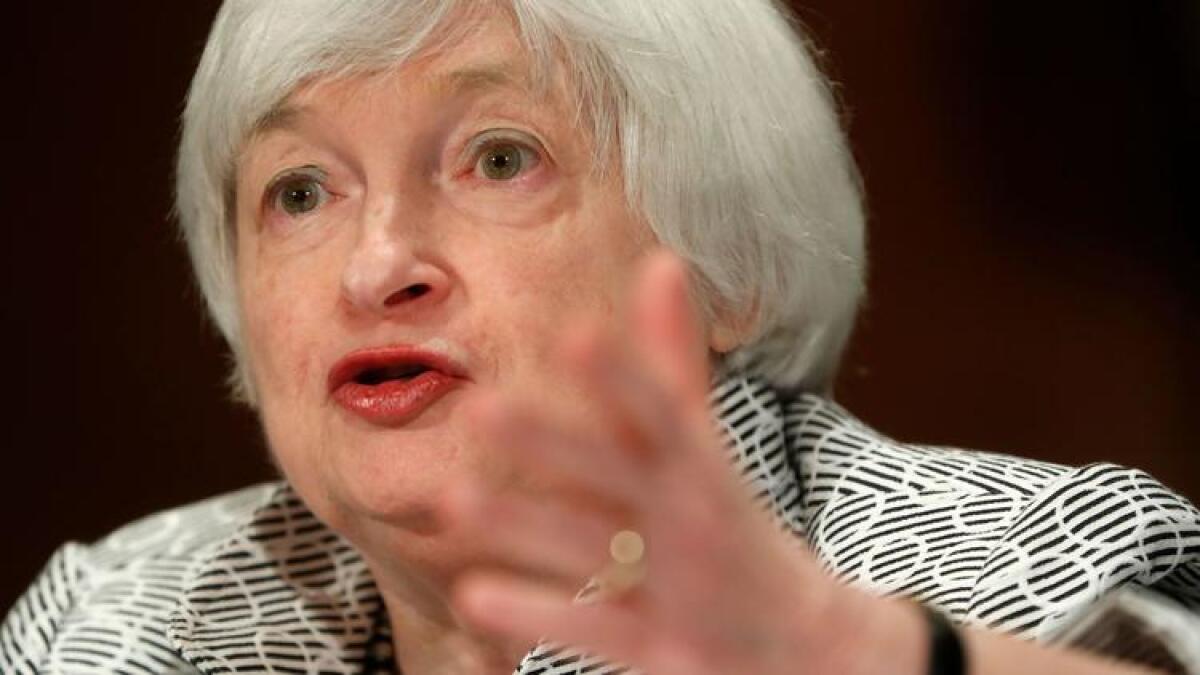
Federal Reserve Chairwoman Janet L. Yellen told senators Thursday that the risk of another financial crisis would increase if some Trump administration proposals to roll back regulations were enacted.
In her second straight day of Capitol Hill testimony, she walked back her statement last month that she didn‚Äôt expect another financial crisis ‚Äúin our lifetimes.‚ÄĚ
‚ÄúI think we can never be confident there won‚Äôt be another financial crisis,‚ÄĚ Yellen told members of the Senate Banking Committee.
Trump’s ambassador picks so far include the usual mix of rich donors and loyal supporters
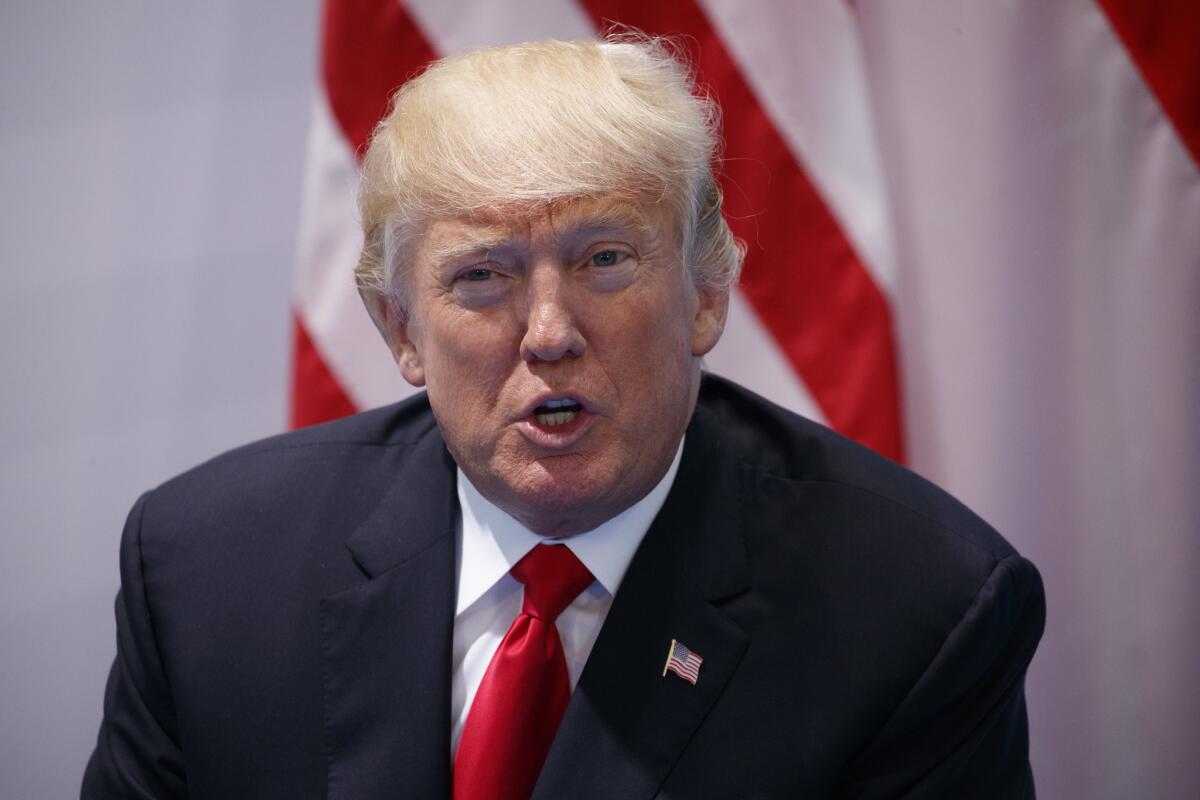
Presidents have long been known to essentially auction off ambassadorships as a reward for political and financial support, and President Trump has been no exception.
As of Thursday, Trump has nominated 25 ambassadors out of the 77 posts he now gets to fill.
Eighteen of the picks are so-called political appointments, meaning they were nominated based on their personal ties to Trump. These are typically the more desirable postings, like those in Europe.
The nonpolitical career appointments usually go to long-serving State Department diplomats with experience in less-coveted regions, such as Africa.
Of the 18, six are known to have made significant financial contributions to the Trump Victory Fund, while the other 12 nominees do not appear to have made any identifiable personal donations to the campaign.
Trump arrives in Paris, seeking respite from trouble at home
President Trump arrived in Paris early Thursday morning, preparing for meetings with French President Emmanuel Macron that likely will be shadowed by political controversies back home.
Trump and First Lady Melania Trump arrived in Paris shortly after 8:30 a.m. local time. The president headed for the U.S. ambassador’s residence, where he was scheduled to talk with U.S. diplomatic and military officials before his meeting with Macron. The first lady toured a children’s hospital.
Later in the morning, the Trumps greeted Macron and his wife, Brigitte, at Les Invalides, the French military museum and memorial. The two couples toured Napoleon’s Tomb and other landmarks.
Much of the day’s attention will focus on a news conference that Trump and Macron are scheduled to hold after their meetings. The session will be reporters’ first opportunity to question Trump after the disclosure that his eldest son, Donald Jr., met last summer with a Russian attorney who was described to him as part of a Russian government effort to help the Trump campaign.
Republicans in Congress still don’t want to talk about possible collusion between Trump and Russia
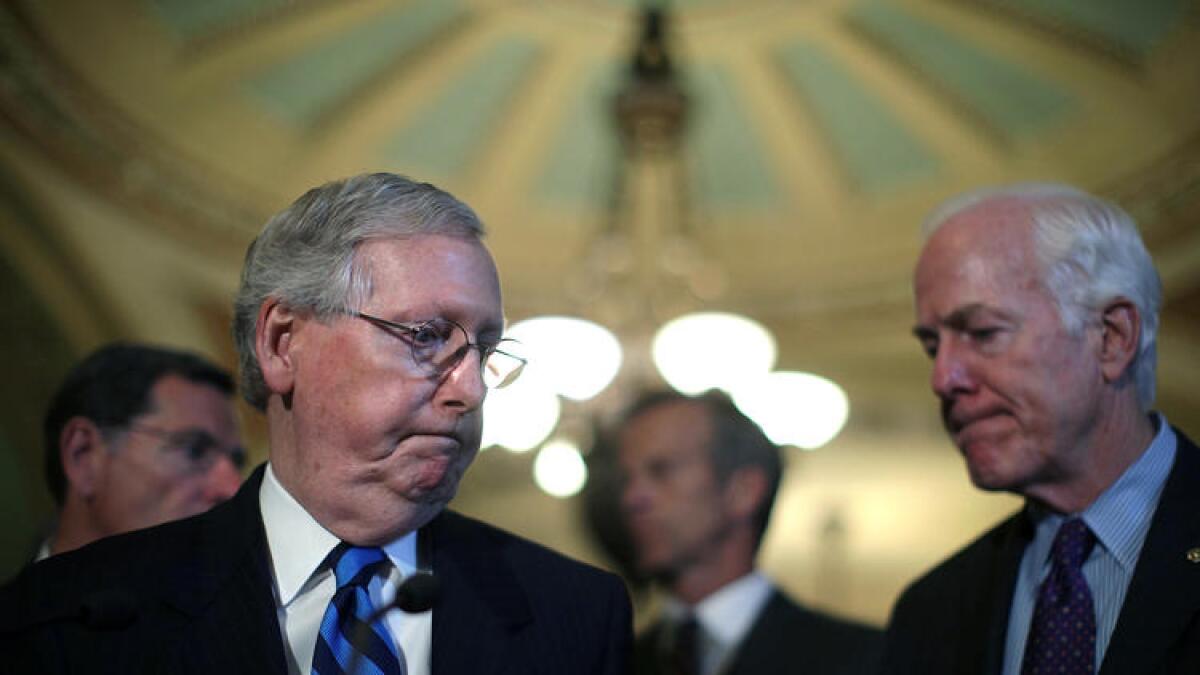
Three times on Tuesday Senate Majority Leader Mitch McConnell was asked about Donald Trump Jr.’s attempt during the campaign to collect damaging information about Democrat Hillary Clinton from Russia.
And three times the Republican leader swatted back the inquiries, bluntly saying he would rely on the investigations already underway into the Trump administration’s Russia ties and make no further comment.
The back-and-forth was a well-worn script that continues to play out on Capitol Hill amid the almost daily drip-drip-drip of new details about possible collusion between the Trump campaign and Russia in the 2016 election.
Republicans may privately grumble about the president ‚ÄĒ and many do ‚ÄĒ but they have been reluctant to publicly criticize President Trump and risk the wrath of his Twitter assaults, from which they have little political cover.
My guess is they‚Äôll continue to stick by him,‚ÄĚ said Matt Mackowiak, a Republican strategist based in Texas. ‚ÄúThere‚Äôs a real sense of, ‚ÄėLet‚Äôs make the most of what we have.‚Äô‚ÄĚ
Mackowiak added, ‚ÄúNo one wants to be the first Republican to step out and distance themselves.‚ÄĚ
Net neutrality supporters say online rally is just the start of the fight to keep tough FCC rules
Some of the Web‚Äôs biggest names ‚ÄĒ Amazon, Google, Netflix and Twitter ‚ÄĒ joined thousands of smaller websites Wednesday in urging users to tell Washington to leave the Internet the way it is.
On website banners, pop-up widgets, blog posts and videos, Web companies said that could only be accomplished by keeping tough net neutrality rules for online traffic in place in the face of a push by Republicans and Internet service providers to dismantle them.
Net neutrality supporters said the ‚Äúday of action‚ÄĚ was the first major salvo of what they promised would be a long battle involving the Federal Communications Commission, the courts and possible congressional legislation over the fate of the controversial rules.
U.S. hits cap of 50,000 refugee admissions

The State Department announced Wednesday that the country had hit its cap of 50,000 refugee admissions for the fiscal year.
Refugees scheduled to travel Wednesday would be allowed to proceed before travel ban restrictions kick in the next day, the department said in a statement.
The cap is set each year by the president. President Obama increased it from 85,000 in 2016 to 110,000 this year.
But President Trump knocked it down to 50,000 as part of his executive order banning travel from six majority-Muslim countries for 90 days and suspending refugee resettlement for 120 days.
The order still leaves open a path for some refugees to enter the country. Because of a U.S. Supreme Court decision, those with ‚Äúbona fide‚ÄĚ relationships to the U.S. will still be allowed in.
What qualifies as a ‚Äúbona fide‚ÄĚ connection, though, has become the subject of a legal battle.
The administration includes parents, spouses, children, adult sons or daughters, sons-in-law, daughters-in-law, siblings, fiances or fiancees, and in-law parents.
But it excludes grandparents, grandchildren, aunts, uncles, nieces, nephews, cousins, brothers- and sisters-in-law.
The administration also says it won’t count resettlement agencies as U.S. connections.
Refugee resettlement agencies have gone to court to expand who qualifies.
They say the administration’s policies will prevent thousands of refugees who lack family in the country but have already passed U.S. vetting from relocating.
Former White House economists urge Trump not to impose emergency tariffs on steel imports

Fifteen former top White House economists, from both political parties and dating back to the Ford administration, are urging President Trump not to go through with plans to impose tariffs on steel imports in the name of national security.
In an extraordinary letter Wednesday to Trump, these former chairs of the White House Council of Economic Advisors say they represent a wide range of political and economic views but are of one accord in opposing Trump’s plan to slap new tariffs on imported steel.
The Trump administration is undertaking a review of the issue, which would provide a basis for the president to levy new tariffs on the grounds that foreign steel presents a threat to American security interests.
Such tariffs would not only come with diplomatic costs, as most imported steel comes from important allies, but they also would actually damage the U.S. economy, these economists write.
The U.S. already has many duties on a variety of steel imports that were found to have been dumped into the U.S. at unfair prices or receiving government subsidies. The additional tariffs that Trump is contemplating, the letter states, ‚Äúwould raise costs for manufacturers, reduce employment in manufacturing, and increase prices for consumers.‚ÄĚ
‚ÄúWe urge you to avoid a policy that would likely incur greater economic and diplomatic costs than any conceivable national security gain,‚ÄĚ it says.
Most economists are not in favor of protectionist policies. Still, the letter is highly unusual in that such a sizable number of prominent economists, who seldom agree on major policy issues, would join in raising opposition to a potential policy action by a sitting president.
The list of signatories include two former chairmen of the Federal Reserve ‚ÄĒ Ben S. Bernanke, who served in the George W. Bush White House, and Alan Greenspan, the chair of the council under Gerald Ford in the mid-1970s. Others who penned their name on the one-page letter include Nobel laureate Joseph Stiglitz of Columbia University and Laura Tyson of Berkeley, both of whom advised Bill Clinton, and conservative economists Glenn Hubbard of Columbia and Greg Mankiw of Harvard.
Janet L. Yellen, the current Fed chairrwoman and chair of the Council of Economic Advisers from February 1997 to August 1999, was not asked to sign.
The White House and the Commerce Department, which is preparing the report on steel imports and national security, did not immediately respond to requests for comment.
Veteran trade analyst William Reinsch, who is a fellow at the Stimson Center, said he could not recall a time when so many economists had joined in such a letter addressed to the president. Even so, he doubted that it would have much effect.
‚ÄúThis is the economic establishment that he enjoys thumbing his nose at,‚ÄĚ Reinsch said. ‚ÄúI don‚Äôt think he‚Äôll be inclined to take their advice.‚ÄĚ
At the same time, some of Trump’s own top advisors inside the White House are likely to be advising caution against imposing sweeping measures that could anger allies and risk a trade war. At the Group of 20 major economies’ summit last week, European Union officials warned that such tariffs on foreign steel would be met by swift retaliation.
The letter by the economists noted that the experience with steel tariffs under George W. Bush should serve as a lesson.
In 2002, Bush applied emergency tariffs of up to 30% on steel imports, but he lifted the measures 16 months before they were scheduled to expire. The World Trade Organization ruled that action illegal and Europe threatened to retaliate with tariffs of its own ‚ÄĒ on citrus from Florida, motorcycles made in Wisconsin and other U.S. goods.
‚ÄúThe diplomatic costs might be worth it if the tariffs generated economic benefits,‚ÄĚ the letter said. ‚ÄúBut they would not.‚ÄĚ
Wounded Congressman Steve Scalise is out of intensive care, but remains in serious condition
House Majority Whip Steve Scalise, grievously wounded in a shooting at a baseball practice nearly a month ago, has been moved out of the intensive care unit of a Washington hospital but remains in serious condition.
The Louisiana congressman and third-ranking House Republican underwent surgery last week at MedStar Washington Hospital Center and is being treated for infection, according to an official familiar with his condition.
The official spoke on condition of anonymity to freely discuss Scalise’s condition.
Scalise and four other people were injured June 14 when a gunman opened fire on a practice in nearby Alexandria, Va. U.S. Capitol Police and other officers returned fire and killed the gunman.
The 51-year-old congressman was struck in the hip and the bullet tore into blood vessels, bones and internal organs.
Kremlin says the Trump Jr. email story is like a plot in a dragging soap opera
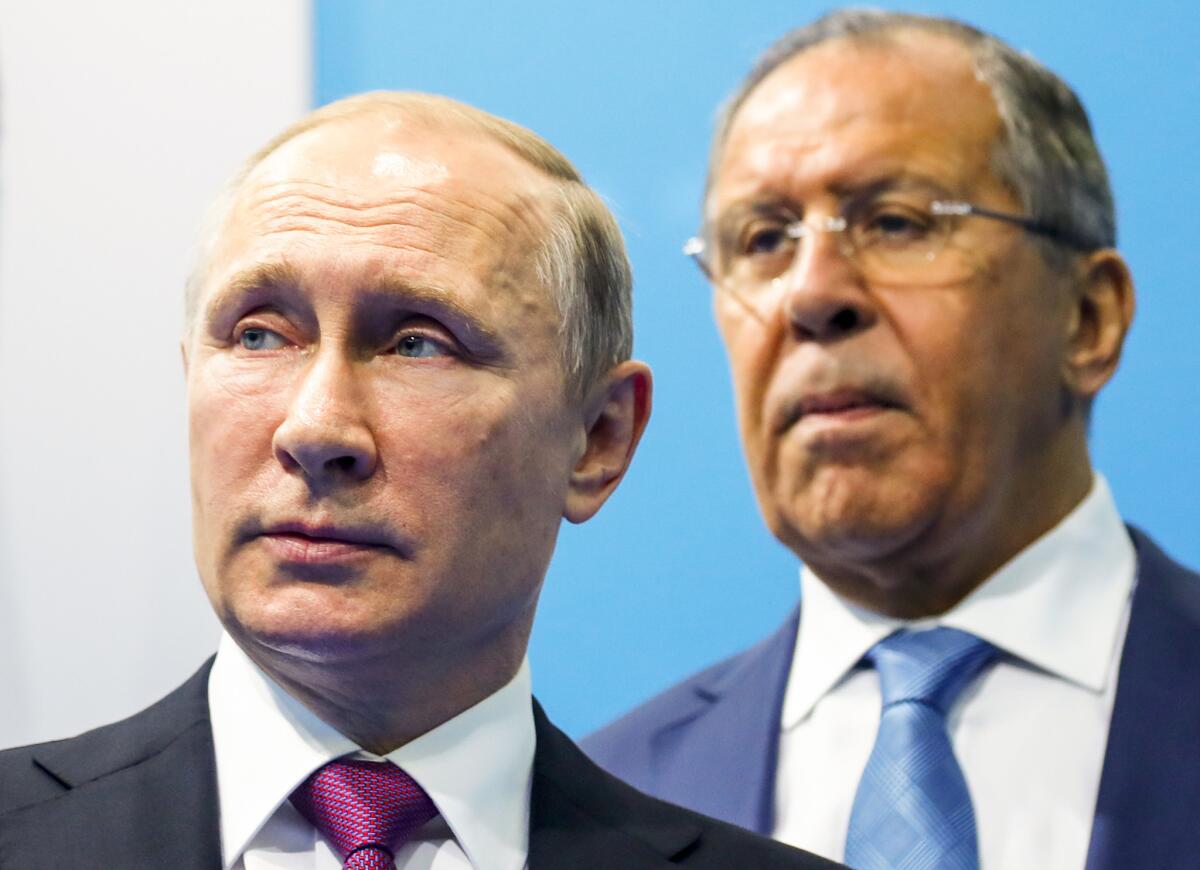
Kremlin officials on Wednesday likened reports about Donald Trump Jr.‚Äôs meeting with a Russian lawyer who has been labeled as ‚ÄúKremlin-connected‚ÄĚ to a dragging soap opera saga like some on television in the United States.
‚ÄúThis is the next, predictable spin to the plot following the bilateral meeting,‚ÄĚ Kremlin spokesman Dmitry Peskov said, referencing last week‚Äôs meeting in Hamburg between Russian President Vladimir Putin and President Trump.
‚ÄúOnce again, you shouldn‚Äôt drag us into this TV show, we don‚Äôt want to participate,‚ÄĚ he said.
The Kremlin does not know the lawyer, Natalia Veselnitskaya, and had nothing to do with the meeting, Peskov said.
‚ÄúWe have never been in contact with this lawyer and, therefore, we have nothing more to say about it,‚ÄĚ he said.
Peskov declined to identify which American television drama series he was referring to when asked by a Russian reporter to elaborate. The Netflix series ‚ÄúHouse of Cards‚ÄĚ ‚ÄĒ which has dramatized a tense relationship between the U.S. president, played by Kevin Spacey, and his Russian counterpart ‚ÄĒ is well known in Russia.
Russian Foreign Minister Sergei Lavrov also expressed frustration with the nonstop Western media coverage of the Trump Tower meeting in June 2016 and Trump Jr.’s released emails on the matter. He said there was still no facts to prove Russia had tried to interfere in the 2016 presidential election.
‚ÄúIt is amazing how serious people are making an elephant out of a fly,‚ÄĚ Lavrov said at a news conference in Brussels. His comments were broadcast on Russian state television.
Veselnitskaya said this week that she met with Trump Jr., Jared Kushner, the president‚Äôs son-in-law and close advisor, and then-campaign manager Paul Manafort in June 2016 after a meeting was set up by publicist Rob Goldstone. The publicist reached out to Trump Jr., saying that he wanted to arrange a meeting with a ‚ÄúRussian-government lawyer‚ÄĚ who had incriminating information about Hillary Clinton.
According to emails posted online by Trump Jr., the meeting was arranged at the request of Emin Agalarov, the son of the billionaire developer Aras Agalarov.
The Agalarov family partnered with Trump in 2013 to bring the Miss Universe contest to Moscow. The older Agalarov is the head of the Crocus Group, one of Russia’s largest developers. Putin presented Aras Agalarov in 2013 with the Kremlin’s Order of Honor for his achievements in the development industry.
Emin Agalarov is a singer who once featured the elder Trump in his music video. In interviews before Trump’s election, Emin Agalarov described a close friendship with the Trump siblings.
‚ÄúI‚Äôm not going to comment,‚ÄĚ Emin Agalarov said when reached by telephone in Moscow by a Los Angeles Times reporter Wednesday.
Agalarov asked that all questions be directed to his press office, which had not immediately responded to an email request for an interview.
Some on the right say Trump Jr. development justifies Russia probes; others call it a ‚Äėsetup‚Äô
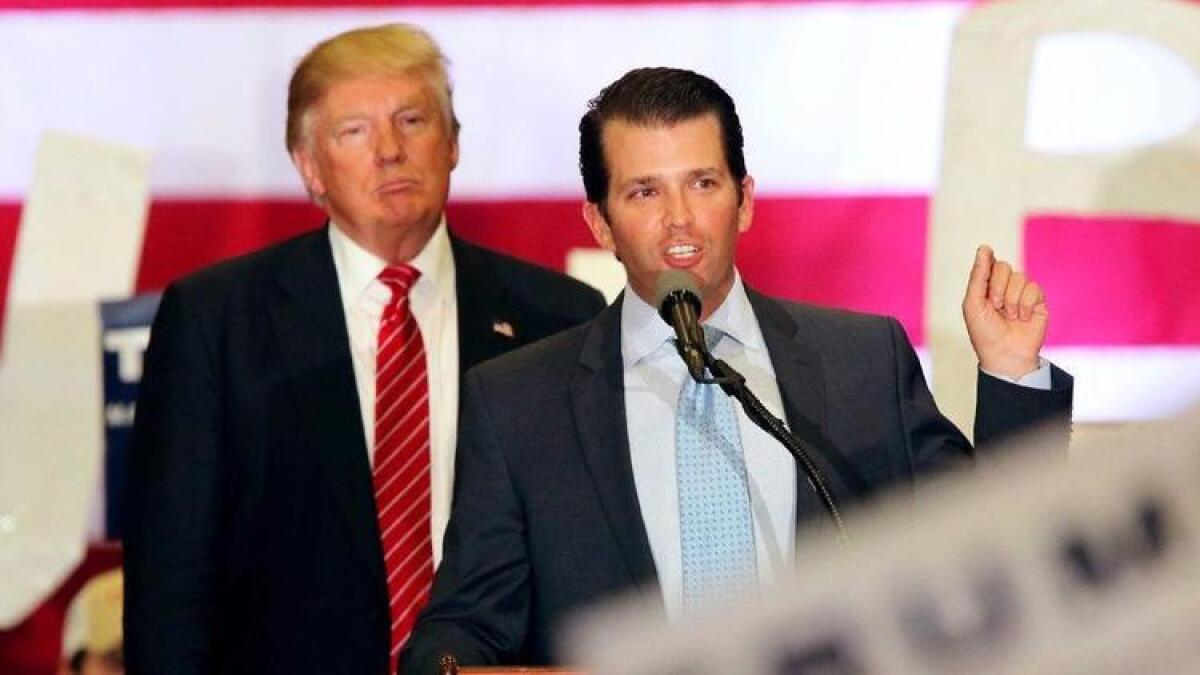
Some are staunch defenders, others not so much.
In the days since it’s been reported that the president’s oldest son, Donald Trump Jr., was eager to meet last year with a well-connected Russian lawyer who purportedly had intelligence on Hillary Clinton, conservative media outlets have variously described the issue as a witch hunt, alarming, unwise, or not a big deal.
On Wednesday, President Trump used his favorite platform ‚Äď Twitter ‚Äď to offer his views.
‚ÄúWhy aren‚Äôt the same standards placed on the Democrats. Look what Hillary Clinton may have gotten away with. Disgraceful!‚ÄĚ he tweeted.
Not everyone on the right is so quick to deflect. Here are some story lines:
The Russia collusion story has only just begun (Weekly Standard)
In this piece, Michael Warren notes that the latest developments surrounding Donald Trump Jr. justify the investigations by Congress and independent investigator Robert Mueller into Russian meddling in the 2016 presidential campaign and the role, if any, played by the Trump campaign.
‚ÄúAs a practical matter, this revelation justifies the multiple investigations into Russian meddling and the Trump campaign‚Äôs possible collusion during last year‚Äôs election,‚ÄĚ writes Warren. ‚ÄúBottom line: The story, much to the frustration of the Trump administration and Republicans in Washington, is far from over.‚ÄĚ
Long live President Trumpopov! (Washington Times)
Others on the right are more sympathetic to Trump‚Äôs insistence that reports focused on Russia and his administration are ‚Äúfake news‚ÄĚ or a ‚Äúwitch hunt‚ÄĚ orchestrated by Democrats -- whose own scandals are swept under the rug.
This analysis from Charles Hurt is a case in point.
‚ÄúMy goodness, the Trumps have really sullied politics in this country!‚ÄĚ he writes for the Washington Times. ‚ÄúThe Clintons would NEVER search for dirt against a political opponent. Just ask Bernie Sanders, Vince Foster or Barack Obama. (The conversation with one of those three would be a trifle one-sided.) Or Monica Lewinsky!‚ÄĚ
We’re watching people lose their minds (Rush Limbaugh)
He‚Äôs often a staunch defender of Trump ‚Äď and the latest story line surrounding Trump Jr. has not swayed right-wing radio host Rush Limbaugh.
‚ÄúThe whole thing smacks of a setup,‚ÄĚ Limbaugh said of Trump Jr.‚Äôs meeting with the Russian lawyer. ‚ÄúThe one thing here: If this meeting was about collusion, what was the collusion? And that remains the question in every story that we have been dished for the past six months. What is the collusion? What was the hack? Two separate questions. But what was the collusion here involving Donald Trump Jr.?‚ÄĚ
Yellen hints she may not be around for a second term as Fed chair
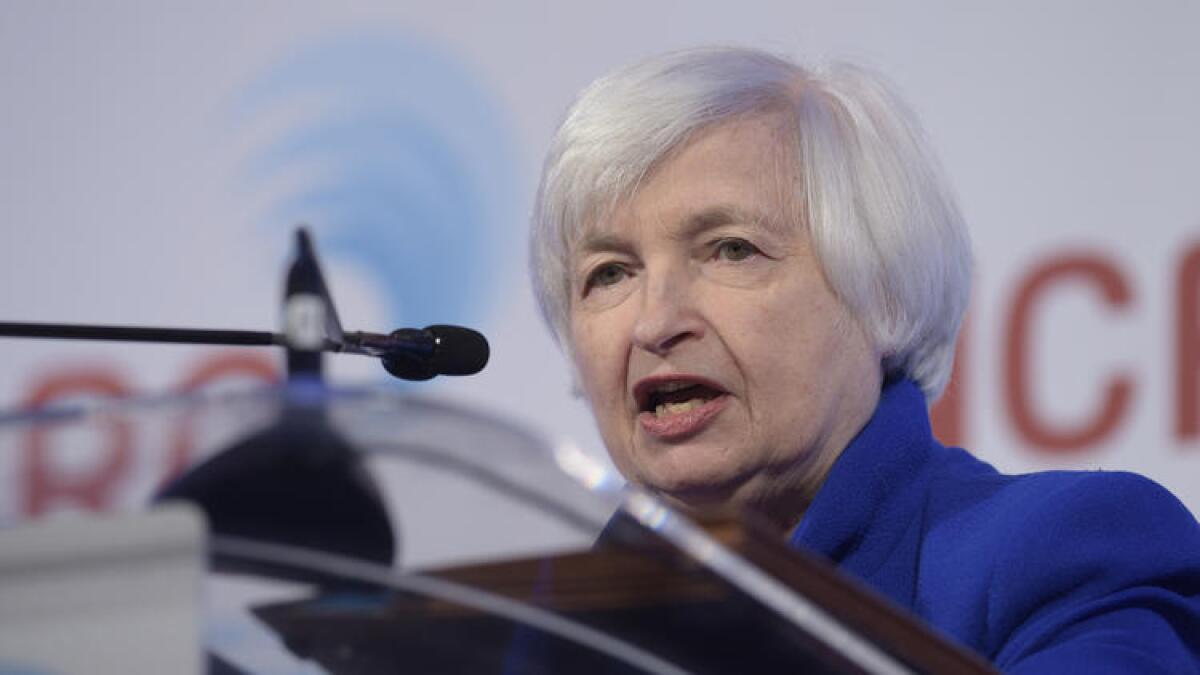
Federal Reserve Chairwoman Janet L. Yellen may be seeing the writing on the wall: With President Trump‚Äôs mixed messages about her performance, the Fed leader indicated Wednesday that it ‚Äúmay well be‚ÄĚ that she will not serve a second term.
Yellen‚Äôs tenure as Fed chair expires in early February, and she told lawmakers that she ‚Äúabsolutely‚ÄĚ intends to serve out her term. Yellen did not directly answer a question about whether she was open to serving another four years should she be re-nominated by Trump.
‚ÄúI really haven‚Äôt had to give further thought to this question,‚ÄĚ she told the House Financial Services Committee, on the first of two days of the Fed chair‚Äôs semi-annual testimony to Congress.
Yellen was nominated to her post by President Obama, but the prior three Fed chairs all served more than one term after being re-nominated by a president from the opposing party.
On Wednesday, Yellen was asked the same question in a different way later by another lawmaker: Did she anticipate that this would be her last appearance before the House Financial Services Committee?
Yellen replied: ‚ÄúIt may well be.‚ÄĚ
Trump has not ruled out re-nominating Yellen, and at times he has spoken well of her, although he sharply criticized her stewardship of the Fed during the campaign. Speculation has swirled that Trump’s chief economic adviser, former Goldman Sachs head Gary Cohn, would be the top candidate to replace Yellen.
In her testimony Wednesday, Yellen said that she expects the the central bank to keep making gradual interest rate increases ‚Äúto achieve and maintain maximum employment and stable prices.‚ÄĚ
Yellen did not tip her hand on when the next rate hike would come. The Fed has raised its benchmark interest rate three times since December, to a range of 1% to 1.25%.
Inflation has been running well below the Fed’s 2% target in recent months, leading some analysts to argue that the policymakers should hold off on hiking rates or otherwise withdrawing monetary support for the economy.
Yellen has attributed the lower-than-expected reading on inflation partly to transitory factors, citing price drops in wireless service plans and prescription drugs. But she said those factors would drop out of the inflation calculation in coming months.
The Fed leader also did not shed more light on the timing of the Fed’s previously announced plans to shrink its $4.5-trillion holdings of U.S. Treasury and other securities, most of which were bought in response to the 2008 financial crisis in an effort to drive down long-term interest rates and stimulate the economy.
Yellen and her colleagues have said the Fed would begin winding down its portfolio of assets this year but haven‚Äôt specified when it would start. ‚ÄúRelatively soon,‚ÄĚ she said Wednesday.
A shrinking of its balance sheet, like raising interest rates, is aimed at normalizing monetary policy and removing the extraordinary Fed support to the economy over the last decade.
Yellen’s remarks offered a fairly upbeat assessment of the American economy. She said economic growth had rebounded after a sluggish first quarter, thanks to a pickup in household spending amid continued job gains and favorable consumer sentiment.
Business investment has turned up this year, she said, and stronger economic growth abroad has helped U.S. manufacturing and exports. She noted that the housing market also has continued to recover, albeit gradually.
After new Russia revelations, Trump praises his son
President Trump on Wednesday praised his son after Donald Trump Jr.’s TV interview concerning his controversial meeting with a Russian attorney during the 2016 presidential campaign.
Trump Jr. told Fox News‚Äô Sean Hannity on Tuesday night that in hindsight he ‚Äúprobably would have done things a little differently‚ÄĚ when he met the Russian attorney after being promised damaging information about his father‚Äôs Democratic opponent, Hillary Clinton.
Trump Jr. defended his motivations for taking the June 2016 meeting, telling Hannity, “For me, this was opposition research.
His remarks came in his first interview since he published old emails on Tuesday morning from a friend who said the Russian attorney, Natalia Veselnitskaya, had ‚Äúofficial documents and information‚ÄĚ that would ‚Äúincriminate‚ÄĚ Clinton ‚Äúand be very useful to your father‚ÄĚ as ‚Äúpart of Russia and its government‚Äôs support for Mr. Trump.‚ÄĚ
The president’s lawyer defended Trump Jr. on Wednesday, saying he did not violate any laws in his meeting with the lawyer.
Jay Sekulow said the president was not aware of Trump Jr.‚Äôs June 2016 meeting, which also included then-campaign chairman Paul Manafort and Trump son-in-law and top advisor Jared Kushner, and didn‚Äôt find out about his son‚Äôs email exchange until ‚Äúvery recently.‚ÄĚ
Sekulow, who spoke on ABC‚Äôs ‚ÄúGood Morning America‚ÄĚ and NBC‚Äôs ‚ÄúToday,‚ÄĚ said the president is not being investigated by the special counsel in the case, Robert Mueller.
Get ready to hear a lot about net neutrality if you use Amazon, Google, Netflix or hundreds of other websites
Prepare to be assaulted by net neutrality.
On Wednesday, millions of Americans unwittingly will be drawn into the heated battle over the controversial rules for online traffic that Republicans are pushing to dismantle.
Amazon, Google, Netflix and hundreds of other websites that support the rules will post messages on their home pages or send notifications to mobile app users in a coordinated one-day effort warning people of what the Internet might be like without net neutrality.
They will be urged to contact officials in Washington to demand the Federal Communications Commission keep its tough regulatory framework designed to ensure the unfettered flow of content by prohibiting broadband companies from slowing Internet speeds for video streams and other content, selling faster lanes for delivering data or otherwise discriminating against any legal online material.
Donald Trump Jr. on his excitement for Russian information: ‚ÄėFor me, this was opposition research‚Äô
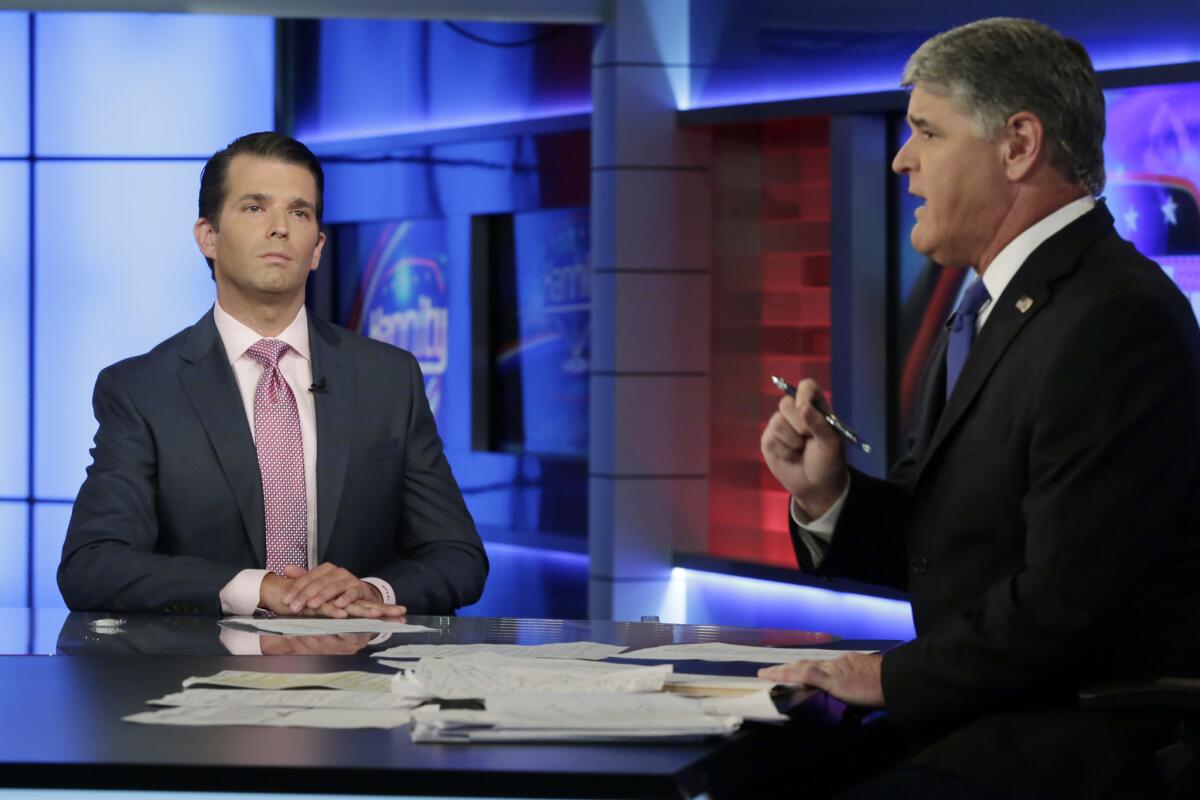
Donald Trump Jr. said he ‚Äúprobably would have done things a little differently‚ÄĚ when he met a Russian attorney during his father‚Äôs presidential campaign after being promised damaging information about Hillary Clinton, according to interview excerpts released by Fox News on Tuesday afternoon.
But as Trump Jr. found himself at the center of a widening controversy involving the Trump administration‚Äôs relationship with Russia, the president‚Äôs son also defended his motivations for taking the June 2016 meeting, telling Sean Hannity, ‚ÄúFor me, this was opposition research.‚ÄĚ
The remarks came in Trump Jr.‚Äôs first interview since he published old emails on Tuesday morning from a friend who said the Russian attorney, Natalia Veselnitskaya, had ‚Äúofficial documents and information‚ÄĚ that would ‚Äúincriminate‚ÄĚ Clinton ‚Äúand be very useful to your father‚ÄĚ as ‚Äúpart of Russia and its government‚Äôs support for Mr. Trump.‚ÄĚ
Trump Jr. had reacted to the promise of damaging information positively, writing back to his friend Rob Goldstone, a music promoter with business dealings in Russia, ‚ÄúIf it‚Äôs what you say I love it.‚ÄĚ He also forwarded the message to top Trump aides Paul Manafort and Jared Kushner.
‚ÄúI had been reading about scandals that people were probably underreporting for a long time, so maybe it was something that had to do with one of those things,‚ÄĚ Trump Jr. told Hannity on Tuesday. ‚ÄúI didn‚Äôt know if there was any credibility. I didn‚Äôt know if there was anything behind it. I can‚Äôt vouch for the information. Someone sent me an email. I can‚Äôt help what someone sends me. I read it, I responded accordingly.‚ÄĚ
Trump Jr. said the meeting was ‚Äúa nothing,‚ÄĚ adding, ‚ÄúI wouldn‚Äôt have even remembered it until you started scouring through this stuff. It was literally just a wasted 20 minutes, which was a shame.‚ÄĚ
Top Democrat in House Russia inquiry calls Trump son‚Äôs meeting ‚Äėbreach of norms,‚Äô says family accounts can‚Äôt be trusted
The House Intelligence Committee wants to hear from ‚Äúeveryone connected‚ÄĚ to the June 2016 meeting with a Russian lawyer that Donald Trump Jr. helped arrange, the panel‚Äôs top Democrat said Tuesday.
Rep. Adam B. Schiff (D-Burbank) said investigators can no longer trust President Trump’s family to provide truthful information after his son’s shifting accounts of the meeting last summer, which was initiated by an acquaintance who promised damaging information about Democratic rival Hillary Clinton that was part of a broader Russian government effort to hurt her candidacy.
‚ÄúWhat I think is notable here is the pattern,‚ÄĚ Schiff said, referring to other Trump associates who over past months have had to acknowledge contacts with Russians that they previously denied or failed to disclose.
‚ÄúThey all come back to Russia,‚ÄĚ Schiff said to reporters at the Capitol. ‚ÄúOf course, the profound question is why? And that is a question we need to answer.‚ÄĚ
Schiff said the committee wants those connected with the meeting ‚ÄĒ even President Trump‚Äôs personal secretary, who is named in emails about the encounter that Donald Jr. released Tuesday ‚ÄĒ to provide information to the panel. The younger Trump was accompanied to the meeting in Trump Tower by Jared Kushner, the president‚Äôs son-in-law and confidant, and then-campaign manager Paul Manafort.
‚ÄúWe cannot rely on any public representations that are made by the family about their contacts with the Russians,‚ÄĚ Schiff said. ‚ÄúWe have now seen a very demonstrable pattern of obfuscation and dissembling about these meetings.‚ÄĚ
Schiff, a former federal prosecutor, stopped short of saying criminal laws were violated, but called the meeting ‚Äúabsolutely not only a breach of norms, but a breach of civic responsibility to the country.‚ÄĚ
‚ÄúIf you get approached by a foreign government offering to interfere in a presidential election, you go to the FBI,‚ÄĚ he said. ‚ÄúYou report it. That‚Äôs what a decent citizen would do.‚ÄĚ
At a minimum, Trump Jr.‚Äôs handling of the meeting overture, with its apparent links to the Kremlin, was ‚Äúunethical,‚ÄĚ Schiff said. ‚ÄúThis is a very serious business, whether criminal laws were violated or not.‚ÄĚ
Here are Donald Trump Jr.’s emails, annotated
Donald Trump Jr. published his emails with music publicist Rob Goldstone, showing he was told the Russian government had information that could ‚Äúincriminate‚ÄĚ Hillary Clinton and her dealings with Russia. We‚Äôve annotated the exchanges.
The first page is Trump Jr.’s memo. After that, it might help to read the emails in chronological order, from bottom to top.
Senate GOP leader delays start of August recess, pushing senators to get to work
Senate Majority Leader Mitch McConnell (R-Ky.) announced Tuesday that he will delay the start of the traditional August recess as Republicans have made scant progress on President Trump’s agenda, including the GOP’s stalled Obamacare repeal.
It may -- or may not -- be a bluff.
Senate leaders have been known to threaten to carve into senators’ weekends and holidays to nudge them to quit being so, well, senatorial and deliberative, and act.
That has certainly been the strategy as GOP leaders announced a planned vote next week on the Republican alternative to the Affordable Care Act, even though the revised bill remains a work in progress and new Republican opposition surfaced over the recent Fourth of July break.
By sticking around Washington, the Senate at least could give voters back home the impression that Congress is hard at work and save members from having to face what have been rowdy town halls.
But the announcement sent almost audible groans through the halls of Congress as members faced the prospect of spending the first three weeks of a hot August in Washington.
McConnell blamed the stalled agenda on Democrats, who have been blocking routine business.
But senators -- and much of the public -- know the Republican majority’s own inability to resolve key differences on health policy, tax reform and other issues is also to blame.
One wing of the GOP, though, may be pleased. A group of 10 newer senators has been encouraging leaders to keep them in session to finish their work.
‚ÄúWe have this big agenda,‚ÄĚ said Sen. Dan Sullivan (R-Alaska) at a news conference with other senators promoting the move earlier Tuesday. ‚ÄúWhat we‚Äôre running out of is time.‚ÄĚ
U.S. and Qatar sign deal on fighting terrorism amid wider Persian Gulf crisis
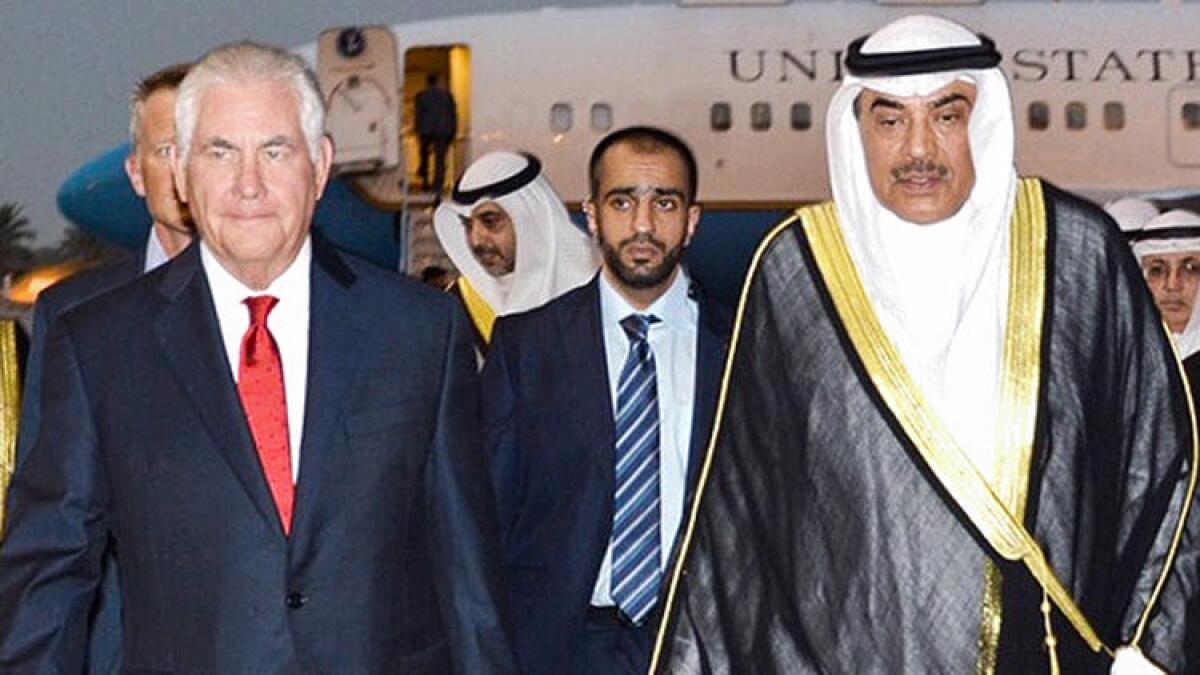
In a potential breakthrough to a crisis roiling the Persian Gulf, the United States announced Tuesday that it had signed an agreement with Qatar to fight terrorism and eliminate money for terror groups.
Secretary of State Rex Tillerson said the ‚Äúmemorandum of understanding‚ÄĚ was weeks in the making and set out steps both countries would take to ‚Äúinterrupt and disable‚ÄĚ the flow of terror financing and ‚Äúintensify counterterrorism activities‚ÄĚ globally.
‚ÄúTogether, the United States and Qatar will do more to track down funding sources, will do more to collaborate and share information, and will do more to keep the region and our homeland safe,‚ÄĚ Tillerson said.
He was speaking in the Qatari capital of Doha, part of a shuttle diplomacy Tillerson launched this week to attempt to end a volatile crisis between Qatar and several of its gulf neighbors and other Arab states.
Both Tillerson and Qatari Foreign Minister Sheikh Mohammed bin Abdulrahman al Thani, who appeared together at a brief news conference, sought to downplay expectations that the deal would ease the broader crisis.
However, it will probably put pressure on the other countries to follow suit in formally committing to the counterterrorism plan.
Accusations that Qatar is soft on terrorism has been the basis for steps by a Saudi-led coalition to punish the tiny gas-rich emirate. The other countries have suspended diplomatic ties with Qatar and blockaded its land and sea borders, leading to severe hardships in the emirate, officials there say.
The foreign minister said that while the bilateral U.S.-Qatari agreement was unrelated to the broader crisis, he invited other countries to sign similar pacts. And Tillerson lauded Qatar for being ‚Äúthe first‚ÄĚ of the Arab states to formally join.
‚Äú[B]blockading countries have accused Qatar of financing terrorism,‚ÄĚ the Qatari foreign minister said. ‚ÄúNow the state of Qatar is the first country to sign this memorandum of understanding with the United States. We invite the other blockading countries to join signing this understanding.‚ÄĚ
Tillerson returned to Kuwait City later Tuesday and is scheduled to travel to Saudi Arabia on Wednesday.
In Washington, State Department spokeswoman Heather Nauert said the administration hoped the decision by Qatar to sign the agreement could help pave a way for resolving the Gulf crisis.
The agreement ‚Äúsets a good example for the other nations,‚ÄĚ she said.
Lawyer who met with Donald Trump Jr. was described as part of Russia‚Äôs ‚Äėgovernment support for Mr. Trump‚Äô
Donald Trump Jr. was offered ‚Äúhigh level and sensitive information‚ÄĚ last June as ‚Äúpart of Russia and its government‚Äôs support for Mr. Trump,‚ÄĚ according to emails that he released Tuesday.
The emails said that a person described as a Russian government attorney had ‚Äúofficial documents and information‚ÄĚ that would ‚Äúincriminate‚ÄĚ Hillary Clinton ‚Äúand be very useful to your father.‚ÄĚ
‚ÄúIf it‚Äôs what you say I love it especially later in the summer,‚ÄĚ Trump Jr. responded.
The messages from Rob Goldstone, a music promoter with business dealings in Russia who is a friend of Trump Jr.’s, led to a meeting at Trump Tower on June 9 last year to which Trump Jr. brought along two other high-level campaign officials, Jared Kushner, Trump’s son-in-law and adviser, and Paul Manafort, who was the campaign chairman at the time.
Trump Jr., the president’s eldest son, has denied any wrongdoing in connection with the meeting.
Trump says he‚Äôs ‚Äėworking hard‚Äô to bring the Olympics to Los Angeles
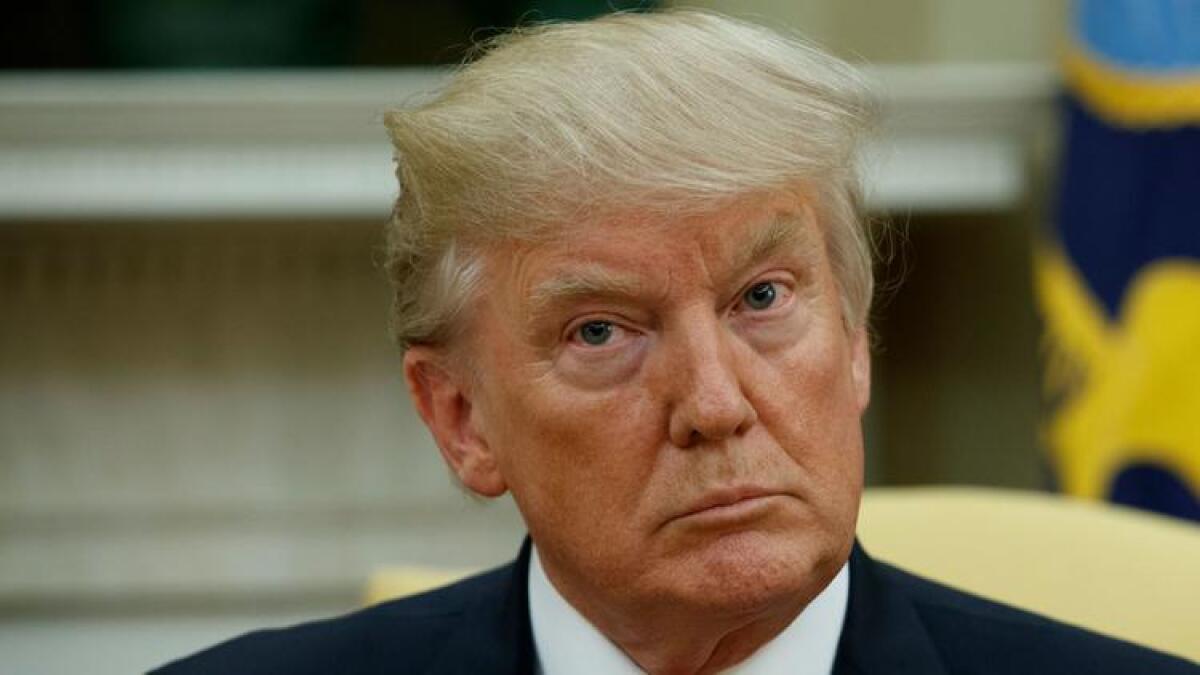
President Trump says he is trying to land an Olympian deal for Los Angeles.
He tweeted Tuesday that he‚Äôs ‚Äúworking hard‚ÄĚ to bring the Summer Olympics to the city. The International Olympic Committee is choosing between Los Angeles and Paris for hosting the 2024 games.
The United States hasn’t hosted a Summer Olympics since the Centennial games in Atlanta in 1996. Salt Lake City hosted the Winter Olympics in 2002.
Last month, Trump met in the Oval Office with the president of the International Olympic Committee, Thomas Bach, and ‚Äúpledged his full support‚ÄĚ for the Los Angeles bid, the White House said at the time.
Los Angeles Mayor Eric Garcetti said Trump promised to back the city’s Olympic bid when the two spoke in November following Trump’s electoral college win.
It would be the third time the Summer Games were held in Los Angeles. The first L.A. Olympics was held in 1932 during the Great Depression. The 1984 Olympics in L.A. was the first modern games that didn’t leave behind large public debt.
Paris is the only other city bidding to host the 2024 Games, and there is speculation that the IOC may award the Olympics to both cities, scheduling one for hosting duties in 2024 and the other in 2028.
The Russian lawyer who met with Donald Trump Jr. was unknown in the U.S. -- until now
Before this week, few people in Russia ‚ÄĒ let alone the United States ‚ÄĒ had heard of Natalia Veselnitskaya, the Russian lawyer at the center of a controversial meeting last year with President Trump‚Äôs son Donald Trump Jr.
She is listed as a managing partner in a Moscow law firm called Kamerton Consulting.
But her work took her to the United States and placed her in the middle of a dispute between the U.S. and Russian governments over the Magnitsky Act, a law passed by Congress in 2012 to blacklist Russians suspected of human rights abuses.
It was named for Sergei Magnitsky, a Russian lawyer who had accused Russian officials of financial crimes and later died in prison, where he was being held on charges of tax evasion. Prison officials said he had a heart attack, but a human rights council investigation said he died after being beaten and denied medical care.
Russia retaliated by banning American adoptions of Russian children.
Veselnitskaya became a fierce critic of the Magnitsky Act, aligning her with the Kremlin.
One of her clients was Denis Katsyv, the Russian owner of Cyprus-based Prevezon Holdings, which a U.S. court said laundered millions of dollars in New York real estate using proceeds linked to a $230-million Russian tax-fraud scheme. Magnitsky had investigated the complicated tax-fraud scheme before his arrest in Russia. A U.S. civil case against Katsyv was settled in May for $6 million.
Veselnitskaya is also the founder of a nonprofit called the Human Rights Accountability Global Initiative Foundation, a nongovernmental organization dedicated to restoring American adoptions of Russian orphans. In June 2016 at the Newseum in Washington, her group helped fund a controversial screening of a film aimed at discrediting Magnitsky.
That same month, Veselnitskaya met with Donald Trump Jr. as well as Trump’s son-in-law, Jared Kushner, and then-campaign chairman Paul Manafort.
Trump Jr. said that he agreed to meet the lawyer at Trump Tower after she promised damaging information about Democratic candidate Hillary Clinton but that it quickly became clear she had no useful information and really was there to lobby against the Magnitsky Act.
The Kremlin denied knowing Veselnitskaya.
‚ÄúWe cannot track down all movements of all Russian lawyers, both within Russia and abroad,‚ÄĚ said Dmitry Peskov, the official Kremlin spokesman.
Veselnitskaya spoke to NBC News about the meeting, saying it was never her intention to hand over damaging information about Clinton.
7:08 a.m.: This article was updated with a comment from Veselnitskaya to NBC News.
This article was originally published at 6:51 a.m.
Trump to nominate investment fund manager Randal Quarles to key Federal Reserve post
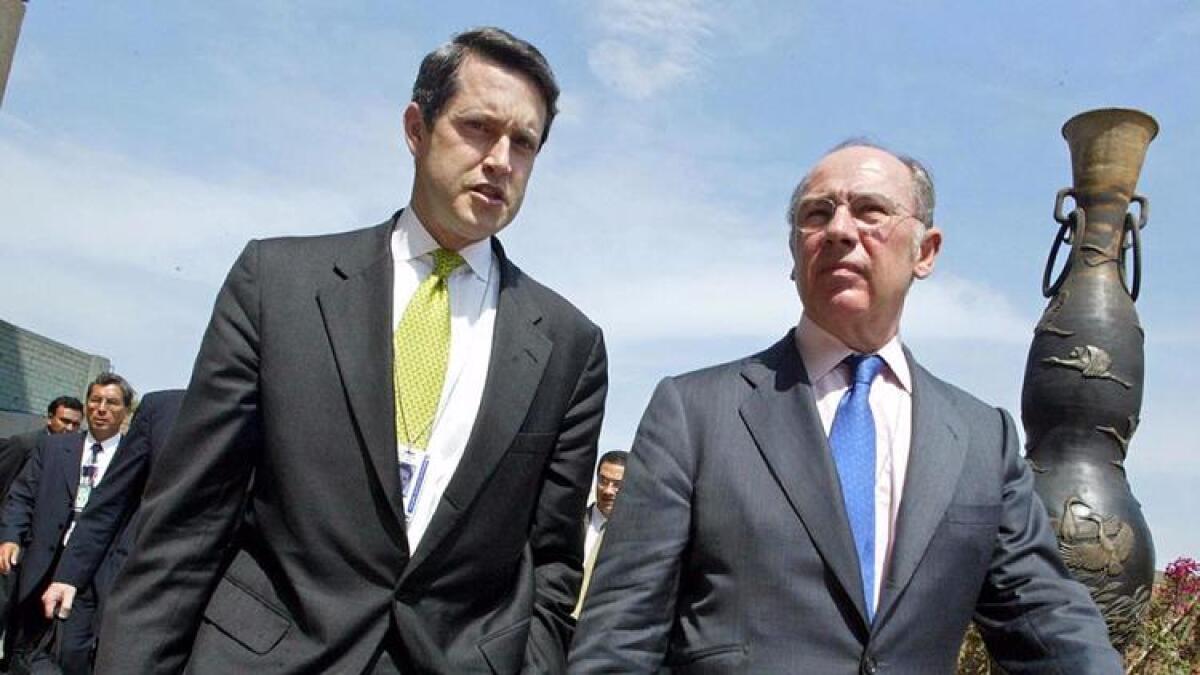
President Trump made the first move Monday night to put his stamp on the Federal Reserve, announcing he intended to nominate investment-fund manager Randal Quarles to a key post overseeing the central bank’s regulatory efforts, the White House said.
The nomination, if confirmed by the Senate, would fill one of three vacancies on the Fed’s seven-member board of governors with a veteran of Washington and Wall Street who is expected to be friendlier toward the banking industry than recent Democratic appointees.
Quarles could become a key ally for the Trump administration and congressional Republicans as they seek to roll back some of the stricter regulations enacted after the 2008 financial crisis.
Quarles’ nomination had been rumored for weeks. He is a founder and managing director of the Cynosure Group, a private investment firm in Salt Lake City. Before that, he was a partner at the Carlyle Group, a high-profile private equity firm.
Senate hopes to vote next week on Obamacare repeal, as Trump pressures Republicans to act
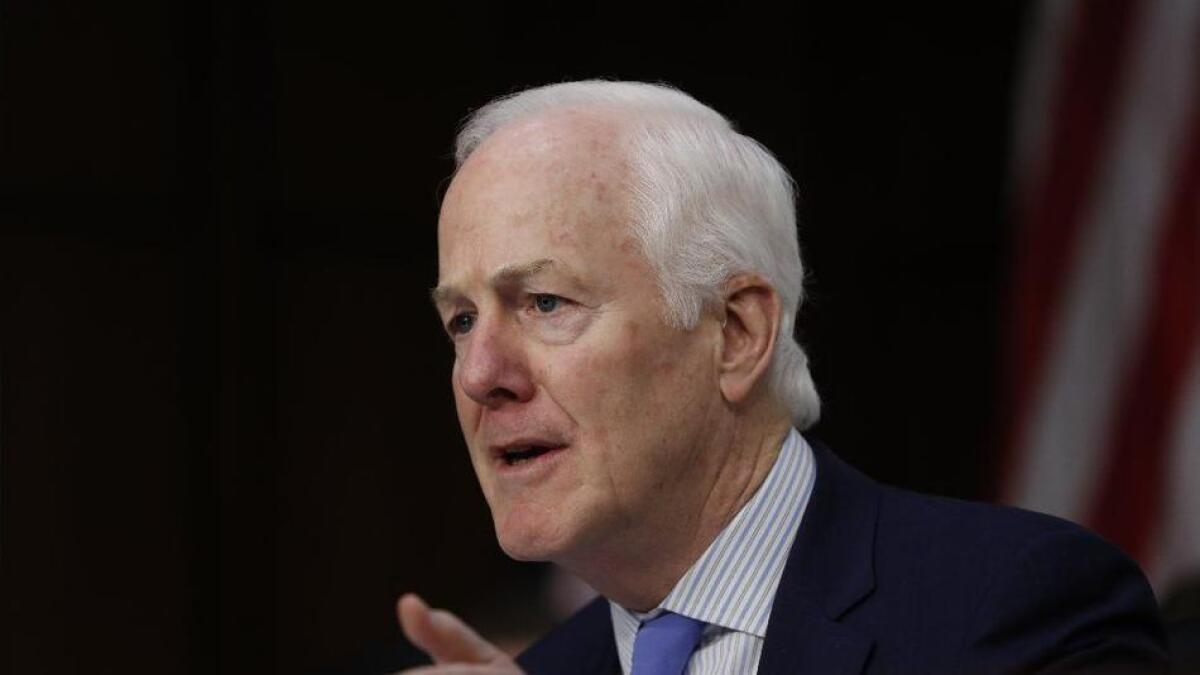
Senate Republicans announced plans to vote next week on their Obamacare repeal, hoping that a push from President Trump -- and backing from conservative groups -- will bring along the votes to approve an overhaul of the Affordable Care Act.
Republican leaders still don’t have the 50 votes needed for passage. The bill, which remains a work in process, threatens to leave 22 million more people uninsured and is unpopular, with backing from just 1 in 5 Americans, polls show.
But the Republican whip, Sen. John Cornyn of Texas, told reporters that the leadership hopes to have a new draft ready later this week, which would allow the Congressional Budget Office to analyze it over the weekend, clearing the way for votes later next week.
Trump and GOP leaders are counting on the looming deadline to nudge reluctant Republicans to quit debating the bill, the Better Care Reconciliation Act, and vote. They’re warning GOP senators to consider the bleak political fallout of failing to deliver on their years-long promise to repeal Obamacare.
‚ÄúWhat‚Äôs standing in the way is just obviously every member of Congress has their own opinion,‚ÄĚ Vice President Mike Pence said Monday on Rush Limbaugh‚Äôs radio show.
‚ÄúI think we‚Äôre going to get this done,‚ÄĚ said Pence, who is expected to be needed to cast the tie-breaking vote for passage, since Republicans have just 52 senators in their majority, and some from their ranks will probably oppose the bill.
‚ÄúIt‚Äôd be the greatest honor of my life, Rush, if I had the privilege to be able to be the tie-breaking vote to repeal and replace Obamacare,‚ÄĚ Pence said.
The bill has been rejected by major healthcare providers, doctors and patient advocacy groups who warn it will destabilize insurance markets and leave many without coverage.
But it also has been panned by conservatives who want a more thorough gutting of Obamcare’s taxes and mandates for insurance coverage.
In revising the bill, Republican leaders are expected to add provisions to draw conservative support, particularly one from Sen. Ted Cruz (R-Texas). It would allow insurers to offer bare-bones policies free of the current law’s requirements.
That could create cheaper alternatives, at least for healthy consumers. Critics warn the inevitable effect would be to raise costs for those who are not healthy and leave at least some consumers with plans that don’t provide much coverage.
Senate Minority Leader Charles E. Schumer (D-N.Y.) called the Cruz plan ‚Äúa cruel, mean hoax‚ÄĚ that would leave policy holders with skimpy plans.
Some of Cruz’s fellow Republicans also have expressed opposition.
Sen. John Thune of South Dakota, the No. 3 Republican, said deliberations continued, but added that the changes being considered would ‚Äúhopefully address some of the concerns that have been raised.‚ÄĚ
While Cruz’s plan could win right-leaning senators, leaders will also try to appeal to centrists who are worried about steep cuts to Medicaid, perhaps by softening some reductions.
Senators have just a few weeks to act before leaving town for the long August recess, and Republican leaders are counting on pressure from the White House and outside groups to stiffen their members’ resolve.
‚ÄúI cannot imagine that Congress would dare to leave Washington without a beautiful new healthcare bill fully approved and ready to go!‚ÄĚ Trump tweeted Monday morning.
Trump’s director of legislative affairs, Marc Short, told reporters that Trump expects the Senate to act -- or revert back to an earlier plan of passing an Obamacare repeal bill now and working later on a replacement plan.
‚ÄúThis is a promise that Republicans have made to voters. It‚Äôs a promise that he expects them to deliver on,‚ÄĚ Short said.
But while Trump was able to cajole reluctant House Republicans to support an earlier GOP bill, dialing them up and inviting them to the White House, such overtures are less powerful among senators, many of who have been in office for years.
Senators are also facing a barrage of protests, at their offices in Washington and in states back home, from voters worried about losing their healthcare. Capitol police arrested 80 protesters Monday.
Trump has not made as public a show of whipping votes as he did during the House process, and Short said that’s because fewer votes are up for grabs.
But senators also have specific concerns and requests that Trump may be less able to fulfill, like the $45 billion in additional funding that Republican senators in states hard hit by the addiction crisis are seeking in the bill for treatments and services.
Once voting begins, possibly as soon as Tuesday, the Senate will conduct what’s called a vote-a-rama -- a potentially daylong session of votes on amendments -- before voting on final passage.
If the bill clears the Senate, it would likely be quickly passed in the House.
Lawmakers are hesitant to recess for August with the issue unresolved.
In a sentiment shared by many influential conservatives, Limbaugh warned Monday, ‚ÄúIf this doesn‚Äôt get done, this has consequences I don‚Äôt even want to contemplate.‚ÄĚ
Trump did discuss sanctions with Putin despite the president’s earlier denial, White House says
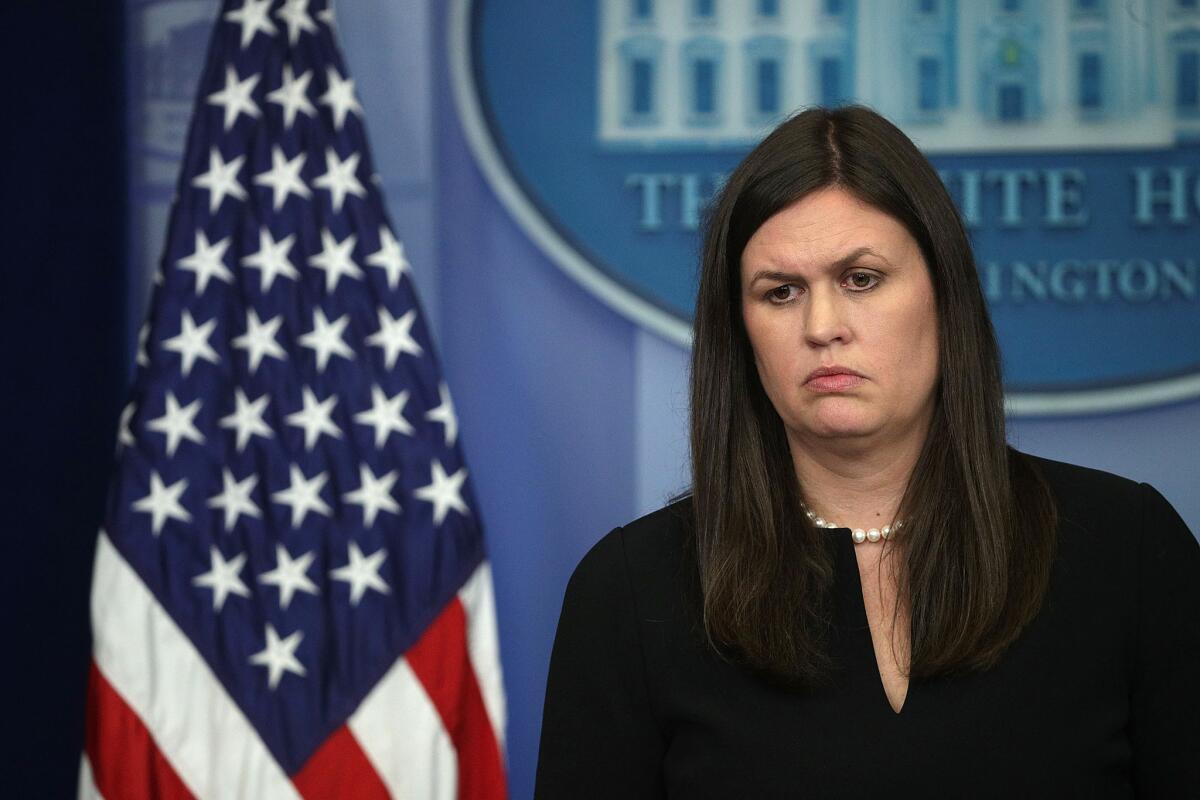
The White House on Monday flatly denied that any Trump campaign officials colluded with the Russian government to influence the election, while referring most questions about Donald Trump Jr.’s meeting with a Kremlin-backed lawyer to outside attorneys.
Deputy White House Press Secretary Sarah Huckabee Sanders instead pointed to what she said was a matter of public record ‚ÄĒ that the Democratic National Committee worked with Ukraine‚Äôs embassy in Washington to coordinate opposition research.
‚ÄúThe only thing I see inappropriate about the meeting was the people that leaked the information on the meeting after it was voluntarily disclosed,‚ÄĚ she said.
Sanders also said that the president’s conversation with Putin did include discussion of sanctions applied by the Obama administration in response to the election meddling.
That statement seemed to contradict the president’s own assertion on Twitter a day earlier.
A White House official insisted the two statements were not in conflict because Trump did not raise separate sanctions related to Russia’s incursions into Ukraine.
In a briefing with reporters that was not broadcast on television, Sanders said the president only learned additional details this weekend about the meeting his eldest son had with a Russian lawyer.
‚ÄúI‚Äôve been on several campaigns, and people call offering information, as I know many of you receive calls of people offering information,‚ÄĚ she said. ‚ÄúDon Jr. took a very short meeting from which there was absolutely no follow-up.‚ÄĚ
‚ÄúThe bottom line is that the Democrats had a weak candidate, and President Trump had a stronger message, and they‚Äôre constantly looking for ways to undermine the president and de-legitimize his election,‚ÄĚ she added.
It was only Saturday that Trump returned from a brief trip abroad with stops in Poland and Germany, where he met on the sidelines of the Group of 20 Summit for the first time face-to-face with President Vladimir Putin.
Sanders continued to insist, as other officials have, that Trump raised directly with Putin Russia’s alleged meddling in the 2016 campaign, which intelligence agencies have said represented a coordinated campaign to tip the outcome toward the Republican nominee.
But even while it ‚Äútook up a great deal of the conversation,‚ÄĚ Trump didn‚Äôt ultimately dwell on it.
‚ÄúThe president heard Putin‚Äôs denial and also realized that they had some very important topics that they needed to cover ‚ÄĒ Ukraine, North Korea, Syria ‚ÄĒ and decided to move on from that point of the conversation and focus on those issues,‚ÄĚ Sanders said.
‚ÄúHe heard Putin‚Äôs denial, and he knew that at the end of the day the important part was them being able to have that conversation, for him to directly ask him. He heard his answer and he moved forward with places that they thought they could work together.‚ÄĚ
After the president appeared to quickly reverse himself on whether the two nations had agreed to coordinate on cybersecurity, Sanders said the topic was only one of many that were briefly discussed.
‚ÄúWe recognize that Russia is a cyber-threat. But we also recognize need to have conversations with our adversaries. And when our adversaries see strength like they did with the president in the meeting, they can look for other ways to work on shared interests, and look for positive places where they can move the ball forward. Particularly on things like the cease-fire,‚ÄĚ she said.
Notably, she said further discussion ‚Äúmay still take place‚ÄĚ with the Russian government on cyber-cooperation. ‚ÄúBut that‚Äôs as far as it is right now,‚ÄĚ she said.
The White House instead sought to draw attention to a report featured on a segment of ‚ÄúFox & Friends,‚ÄĚ involving former FBI Director James B. Comey. Trump, in a tweet, incorrectly asserted that the report showed that Comey had leaked classified information.
‚ÄúI think it‚Äôs something that should be investigated thoroughly,‚ÄĚ Sanders said.
White House goes dark as questions swirl over Russia
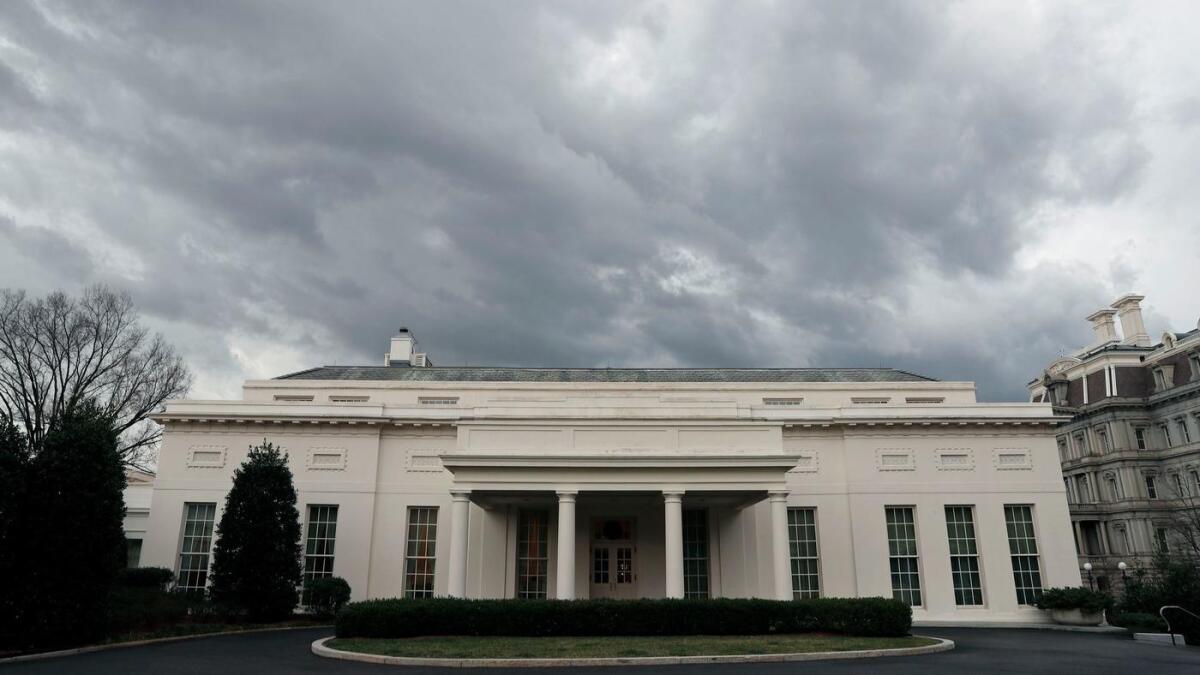
Senior White House counselor Kellyanne Conway was characteristically feisty Monday morning on CNN, accusing the cable network of focusing on alleged scandals over substance in reporting on President Trump.
‚ÄúYou talk about Russia more than you talk about America,‚ÄĚ Conway told host Chris Cuomo, complaining that the media ignore Trump‚Äôs plans on jobs, healthcare, infrastructure and more.
But aside from Conway‚Äôs marathon appearance ‚ÄĒ Cuomo let her talk well over her allotted time, and just as feistily refuted her ‚ÄĒ and a series of morning tweets from Trump himself, the White House seemed to be in bunker mode. Aides struggled to respond to bipartisan criticism over the weekend of Trump‚Äôs first meeting with Russian President Vladimir Putin and new reports that Trump‚Äôs son, son-in-law and campaign manager met last summer with a Kremlin-linked lawyer who promised dirt on Hillary Clinton.
The White House listed no events on Trump‚Äôs schedule, either public ones or the private security briefings typically noted. There will also be no televised news briefing yet again; Deputy Press Secretary Sarah Huckabee Sanders will instead hold an off-camera ‚Äúgaggle‚ÄĚ with White House reporters.
The practice under recent administrations was for the White House to hold televised briefings daily any day the president was in Washington and would not be meeting with reporters himself. The Trump administration has increasingly moved toward off-camera briefings on days when Trump speaks at public events.
‚ÄúI want the president‚Äôs voice to carry the day,‚ÄĚ Press Secretary Sean Spicer said two weeks ago. Trump‚Äôs comments on a given topic, however, do not address the myriad questions reporters have on other domestic and international issues.
Barring a change in schedule, Trump will not be seen nor heard from Monday. Meanwhile, Senate Republicans struggle to plot their next steps on a healthcare bill some have pronounced near-dead, and members of the House are lacking clear direction from the White House about looming budget battles.
Trump and other White House officials, including Sanders and Spicer, returned to Washington on Saturday after a trip to Poland and Germany ‚ÄĒ where Trump did not hold a customary news conference at the close of the G-20 summit.
He is due to depart Wednesday evening to return to Europe, to Paris, for a celebration of Bastille Day at the invitation of French President Emmanuel Macron.
Support is dwindling and time’s running out. With Republicans at impasse, what’s next for the GOP’s healthcare plan?
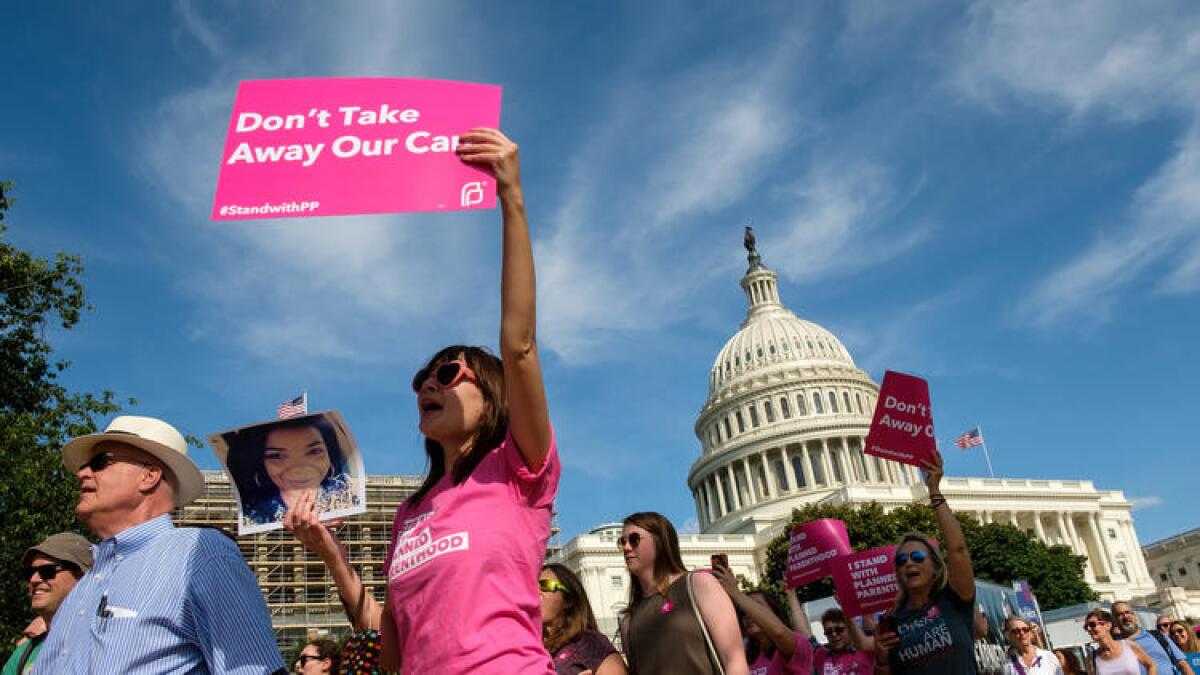
Senate Republicans, having hit an apparent impasse in their long campaign to repeal and replace the Affordable Care Act, return to Washington this week in search of a way forward, with support dwindling, time running out and deep divisions within their ranks.
Options are limited as Senate Majority Leader Mitch McConnell (R-Ky.) assesses the legislative landscape for his Obamacare replacement, which has virtually no hope of passing unless it is substantially amended.
The Better Care Reconciliation Act, which threatens to toss 22 million more Americans into the ranks of the uninsured, has been almost universally panned by patient advocacy groups, doctors and other healthcare providers. It is backed by less than 20% of the public, polls show.
And for the last week, rank-and-file Republican lawmakers have faced rowdy crowds back home opposing the repeal bill.
At the same time, GOP senators return to work aware that federal intervention is needed to stabilize some Obamacare insurance markets. If not, insurance premiums in some parts of the country could skyrocket, and many Americans ‚ÄĒ especially those in rural areas ‚ÄĒ could be left with few healthcare options.
Now, with President Trump sending mixed signals on the path forward, Republicans confront the very real possibility that their promises to end Obamacare might need to be shelved in favor of a bipartisan agreement to improve it.
‚ÄúFor seven years, they pretended like they were all committed to repeal and there were just tactical differences,‚ÄĚ said Michael A. Needham, CEO of Heritage Action, a leading conservative advocacy group.
‚ÄúWhat we learned this year is there are not tactical differences. There are large numbers of Republicans in the House and the Senate who don‚Äôt want to repeal Obamacare.‚ÄĚ
Trump extends his feud with former FBI Director Comey
President Trump took another shot at former FBI Director James B. Comey in a Monday morning Twitter message that misstated a key element of a story published in a Capitol Hill newspaper.
Trump’s early morning tweet pushed a talking point that has been gaining credence in some conservative media outlets -- that Comey leaked classified information in memos that recounted conversations he had with the president.
Trump‚Äôs tweet appeared to be responding to a segment of ‚ÄúFox & Friends,‚ÄĚ a show he regularly watches, which had reported on an article that appeared this morning in the Hill, a Capitol Hill newspaper. The Fox & Friends segment aired a few minutes before Trump‚Äôs tweet.
Comey has previously testified that some of the memos he wrote included classified material and others were unclassified.
The one memo that Comey is known to have made public was entirely unclassified, he testified. No evidence has emerged to contradict that.
The article in the Hill did not suggest otherwise. It reported that Comey had written seven memos in total and that at least four of them included classified material, which is consistent with Comey’s testimony.
Moscow denies knowledge of Donald Trump Jr.’s meeting with Russian lawyer
A spokesman for Russian President Vladimir Putin said Monday the Kremlin was unaware of a meeting between then-GOP presidential candidate Donald Trump’s senior staff and a Russian lawyer during the 2016 campaign in which the Russian reportedly said she had information about Democratic candidate Hillary Clinton.
Over the weekend, President Trump’s eldest son changed his account of the meeting he had with the Russian lawyer during the 2016 campaign, saying Sunday that Natalia Veselnitskaya told him she had information about Clinton. A statement from Donald Trump Jr. one day earlier made no mention of Clinton.
Asked about the reports, Putin spokesman Dmitry Peskov said the Kremlin does not know who the lawyer is, and added that the Kremlin ‚Äúcannot keep track‚ÄĚ of every Russian lawyer and their meetings in Russia or abroad.
The Fed took bold steps to boost the economy. Will undoing one of them rattle markets?
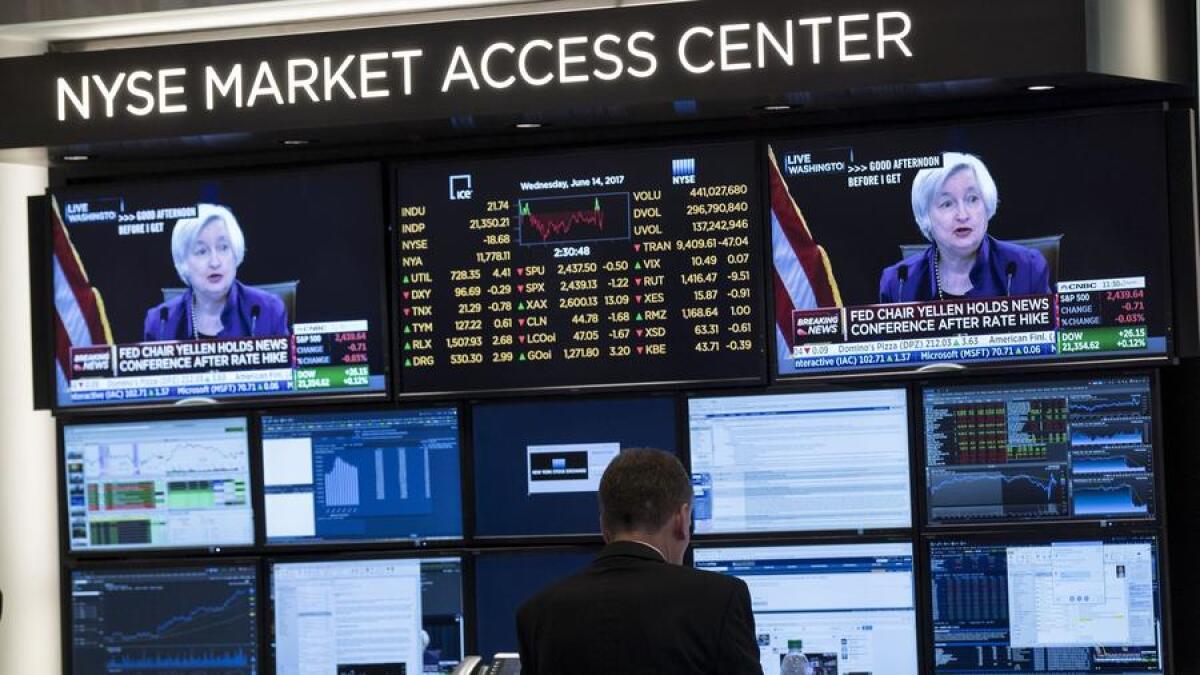
Federal Reserve officials took bold steps to battle the financial crisis and the Great Recession, none more audacious than purchasing trillions of dollars in bonds in an unprecedented and politically charged attempt to boost economic growth.
Now, with the economy healthier ‚ÄĒ and mixed opinions about how much the bond purchases actually helped ‚ÄĒ the Fed is preparing to scale back its massive stock of about $4.5 trillion in assets.
Those holdings of mostly Treasury bonds and mortgage-backed securities are more than quadruple what they were before the crisis, and reducing them is another risky move that could affect mortgage rates, consumer prices, bank lending, stock values and federal government borrowing.
But there’s also risk to standing pat. Like any investor, the central bank could suffer losses on the bonds if it holds them too long and interest rates rise. At the same time, holding a lot of assets could make it harder to buy more if that’s needed to fight a future recession.
So Fed policymakers plan to start trimming their holdings this year. They hope to do it gradually and seamlessly, without the controversy and fanfare that has made the once-boring institution a political target and shaker of financial markets.
China says the U.S. has apologized for name gaffe
China said Monday that the U.S. has apologized for mistakenly describing Chinese President Xi Jinping as the leader of Taiwan.
Foreign Ministry spokesman Geng Shuang said China asked the United States for an explanation of the mistake, and that the U.S. said it was a technical error and corrected it.
In a statement issued Saturday about a meeting in Germany between Xi and President Trump, the White House press office described Xi as president of the Republic of China, the formal name for Taiwan. Communist China, led by Xi, is called the People’s Republic of China.
The issue is particularly sensitive because Beijing insists that Taiwan is part of its territory.
Donald Trump Jr. met with Russian lawyer on promise of information about Clinton, newspaper reports
It quickly became clear that she had no meaningful information.
— Donald Trump Jr., in a statement
Donald Trump Jr. said Sunday that he met with a Kremlin-linked lawyer shortly after his father clinched the Republican nomination, hoping to get information helpful to the campaign.
A New York Times report Sunday citing advisors to the White House briefed on the encounter said Donald Trump Jr. agreed to the meeting after being promised information damaging to Hillary Clinton.
The June meeting at Trump Tower with attorney Natalia Veselnitskaya involved Donald Trump Jr., his brother-in-law Jared Kushner, and Paul Manafort, who was then the campaign chairman.
Ken Blackwell was controversial as Ohio‚Äôs elections chief ‚ÄĒ now he‚Äôs on Trump‚Äôs voter fraud commission
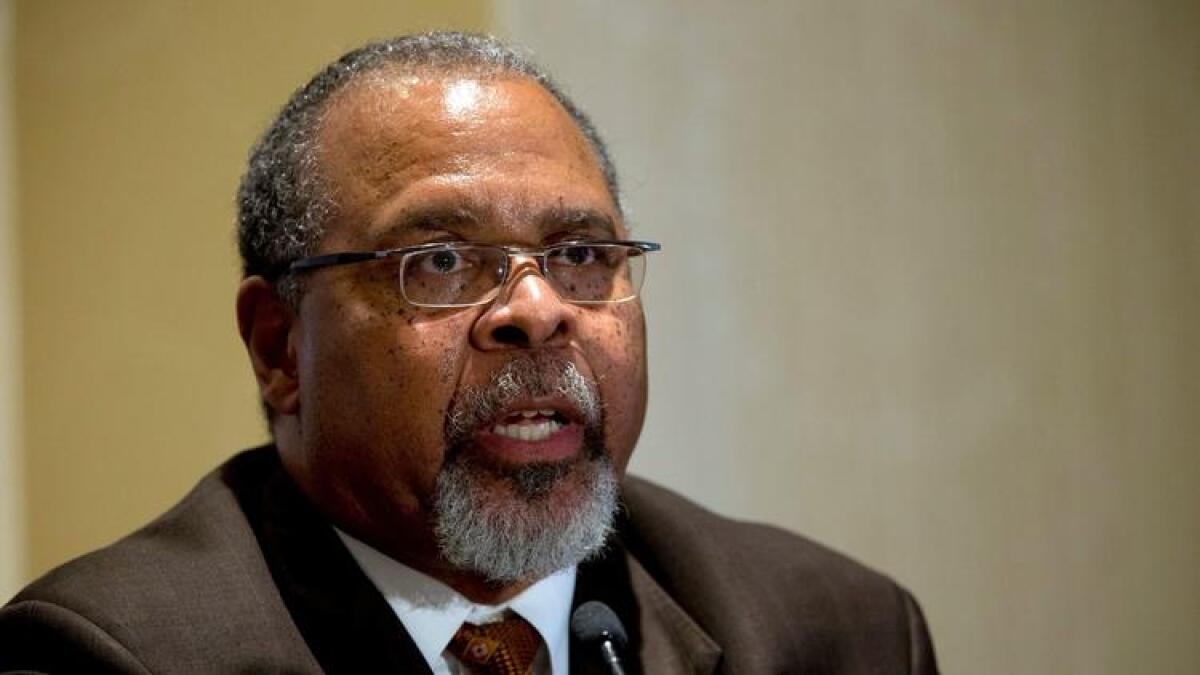
The Republican gubernatorial primary was just weeks away, and then-Ohio Secretary of State Ken Blackwell had his sights set on securing the nomination.
Blackwell had served as mayor of Cincinnati and state treasurer before becoming Ohio’s top elections official, so a bid for governor in 2006 seemed a logical next step in his political career.
But in March of that year, his office caused a stir: The full Social Security numbers of 1.2 million Ohio voters were posted accidentally on the secretary of state’s website.
A month later, in a separate incident, Blackwell’s office inadvertently distributed voter lists with the Social Security numbers of 5.7 million voters. The numbers, by law, are supposed to remain private.
‚ÄúIt wasn‚Äôt good at all,‚ÄĚ said former Ohio Democratic Gov. Ted Strickland in an interview. ‚ÄúSloppy ‚Ķ that‚Äôs what it was.‚ÄĚ
Trump doesn‚Äôt dispute Russia‚Äôs assertion he was ‚Äėsatisfied‚Äô with Putin response on hacking
President Trump says he ‚Äústrongly pressed‚ÄĚ Russian President Vladimir Putin over interference in last year‚Äôs U.S. election, but he did not contest Russian assertions that in their face-to-face meeting, he accepted Putin‚Äôs denials of cyber-meddling.
In a series of tweets Sunday morning, Trump did not address the meddling itself, except to say ‚ÄúI‚Äôve already given my opinion‚ÄĚ about it.
Some lawmakers from both sides of the aisle, meanwhile, said Trump had let Putin off the hook too easily and ridiculed his embrace of Russia as a partner in cyber-security.
Among the sharpest commentary came from a fellow Republican, Sen. Lindsey Graham of South Carolina.
‚ÄúIt‚Äôs not the dumbest idea I‚Äôve ever heard, but it‚Äôs pretty close,‚ÄĚ Graham said when asked about Trump‚Äôs plan in an interview Sunday on NBC‚Äôs ‚ÄúMeet the Press.‚ÄĚ
Trump, he added, had a ‚Äúblind spot‚ÄĚ when it came to Russia. Graham also called the meeting with Putin ‚Äúdisastrous.‚ÄĚ
Trump and Putin spoke for more than two hours Friday on the sidelines of the Group of 20 economic summit in Hamburg, Germany, but questions persisted over exactly what was said on the subject of Russia’s efforts to sway the 2016 election.
Putin said Saturday that Trump had seemed ‚Äúsatisfied‚ÄĚ with his denial ‚Äď a stance that directly contradicts U.S. intelligence conclusions that the Russian campaign of interference was carried out with Putin‚Äôs knowledge. Russian Foreign Minister Sergey Lavrov also said Trump had accepted Putin‚Äôs protestations of innocence.
Secretary of State Rex Tillerson, who was in the meeting room, offered a somewhat different interpretation, saying Trump had repeatedly raised the subject of election meddling and the two sides had agreed to ‚Äúmove on‚ÄĚ to other matters.
The day before the meeting, Trump had equivocated about the nature and scope of Russian interference, saying that the Kremlin, and perhaps others as well, may have sought to influence the vote.
‚ÄúNo one really knows,‚ÄĚ he told a news conference during a stopover in Warsaw, the Polish capital.
Reviving a theme of recent days and weeks, Trump again accused former President Obama of failing to act on reports of Russian interference, and blamed the Democratic National Committee, whose emails were hacked by Moscow, for not cooperating more fully with investigators.
During the summit, Trump rather improbably declared in a tweet that ‚Äúeveryone‚ÄĚ among the gathered leaders was talking about Hillary Clinton‚Äôs former campaign chairman, John Podesta.
Following on the U.S. intelligence community’s conclusion months ago that Putin had direct knowledge of the Russian campaign seeking to sway the election in Trump’s favor, there are now multiple investigations underway into whether people associated with Trump’s campaign colluded with Moscow.
Graham was not the only lawmaker skeptical of Trump’s hailing of Russia as a partner in ensuring cyber-security. Several compared the idea to a fox guarding the hen house.
Rep. Adam Schiff (D-Burbank), the top Democrat on the House Intelligence Committee, said it would be ‚Äúdangerously naive‚ÄĚ to take Russian offers of cyber-security help at face value.
‚ÄúWe might as well just mail our ballot boxes to Russia,‚ÄĚ Schiff said on CNN‚Äôs ‚ÄúState of the Union.‚ÄĚ
While still in Hamburg, Trump said the meeting with Putin had been ‚Äútremendous,‚ÄĚ but gave no details and did not hold a follow-up news conference.
Tillerson said the two had negotiated a cease-fire in southern Syria, which Trump touted in his Sunday Twitter statements.
Previous truces in Syria, including some guaranteed by Moscow, have quickly collapsed.
New York mayor roasted for his appearance at G-20 protest rally
New York Mayor Bill de Blasio’s decision to participate in a protest rally in Hamburg, Germany, during the gathering of the Group of 20 drew sharp criticism back home from conservatives who denounced him for caring more about his feud with President Trump than his hometown.
De Blasio was the keynote speaker Saturday for an organization called Hamburg Shows Attitude and opened his talk with a spirited defense of the right to protest. “In America, we have a phrase we like to use: This is what democracy looks like.’’
The criticism of the mayor came from mostly Trump supporters, including the president’s son Donald Trump Jr., as well as from Nicole Malliotakis, a Republican who is challenging De Blasio for the mayor’s seat in November. She blasted him for abandoning the city with a photoshopped tweet of the mayor (who is of German and Italian heritage) behind a plate of German wursts.
‚ÄúEuro Trash,‚Äô‚Äô read a headline Saturday in the New York Daily News, which referred to De Blasio as the ‚ÄúBurgermeister,‚Äô‚Äô German for mayor. A columnist for the conservative New York Post waggishly wrote, ‚ÄúWhen the mayor of the capital city of global capitalism hops a plane to protest the G-20 meeting now underway in Germany, it‚Äôs not unreasonable to wonder: Will he be wearing a Guy Fawkes mask today ‚ÄĒ or his Che Guevara T-shirt?‚Äô‚Äô
It didn’t help that a police officer was shot point blank while sitting in a police car early Wednesday, hours after the end of the Fourth of July fireworks.
In an interview with WNYC radio, De Blasio said he had decided to accept the invitation to speak in Hamburg only after finding out that the policewoman’s funeral would take place next week and that he would be back in time to attend. He also said that it was part of his duties as mayor to redouble efforts to fight climate change and to resist Trump’s campaign against illegal immigration.
“I think it was incumbent on me as the leader of the biggest city in the country to set a tone and to say we’re not going to be intimidated by President Trump and we’re not going to turn away from our values,’’ he said in the radio interview.
Protests continue as G-20 summit ends in Hamburg
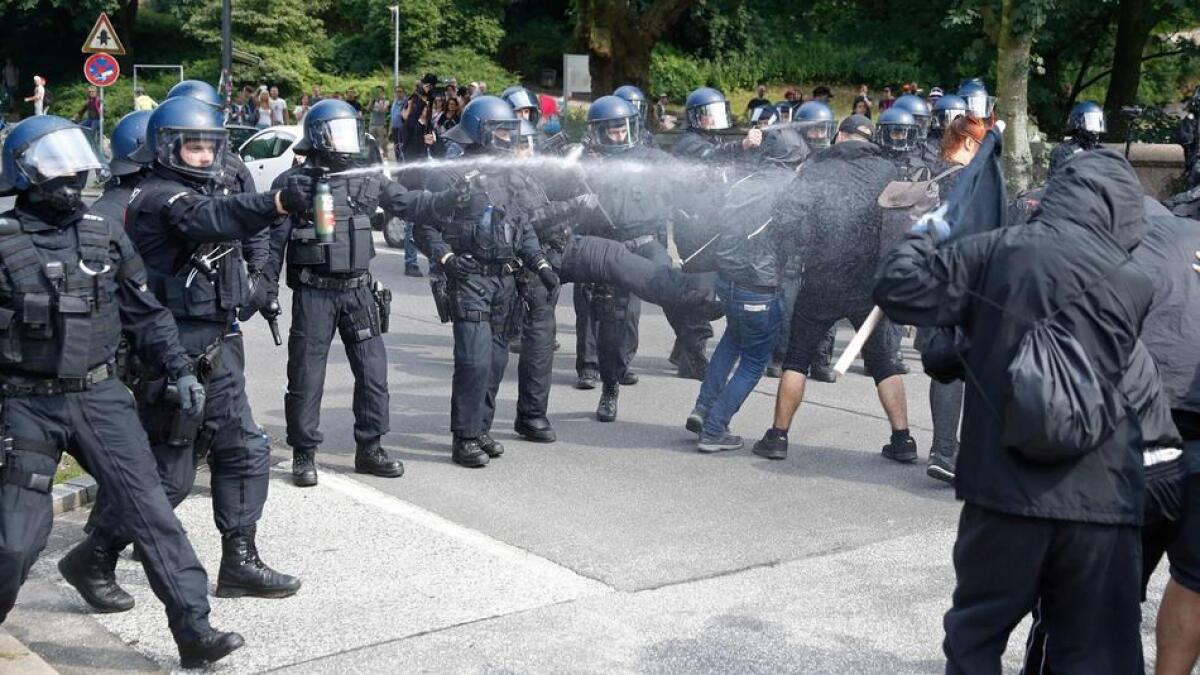
Huge protests were still raging in Hamburg, Germany, as the G-20 summit ended on Saturday evening, following a night of violent riots and looting.
German Chancellor Angela Merkel condemned the ‚Äúunfettered violence and unrestrained brutality‚ÄĚ on Saturday and said there was ‚Äúnot the slightest justification for looting, arson and brutal attacks on police.‚ÄĚ
In a sign of how the demonstrations have overshadowed the gathering of leaders from 20 of the world’s biggest economies, Merkel spent much of a closing news conference thanking the police and defending her decision to hold the summit in Hamburg, which has a well-known anti-capitalist scene.
‚ÄúWe had to do this [the summit] in a big city because of the hotels. The police officers did their best and still are doing their best,‚ÄĚ Merkel said.
Crowds of about 55,000 protesters gathered in Hamburg on Saturday, the last day of the G-20 summit.
Police officers arrested 43 people and detained 96 on Friday night during a raid of houses in the city’s left-wing Schanzenviertel district. Police raided one street in the area after masked protesters threw molotov cocktails from rooftops at officers, Hamburg police spokesman Jörg Schroder said.
The department called in a special armed unit for the raid.
A group of 500 protesters looted a single grocery store in the neighborhood.
‚ÄúThere has never been this kind of excess of violence in Hamburg,‚ÄĚ Schroder said.
‚ÄúToday is another dangerous day even if the summit is over,‚ÄĚ he added.
Thousands of protesters were still marching when Merkel left the congress hall where the G-20 summit was held to meet with police officers and Hamburg’s mayor on Saturday evening. She told journalists the German government will compensate victims of the violent protests.
Police have used water cannons and pepper spray on crowds and blocked off streets with armored vehicles.
Since the demonstrations started on Wednesday, 213 police officers have been injured. Schroder said the department does not record the number of injured demonstrators.
Merkel criticizes the U.S. for standing alone on climate change at the G-20 in Hamburg
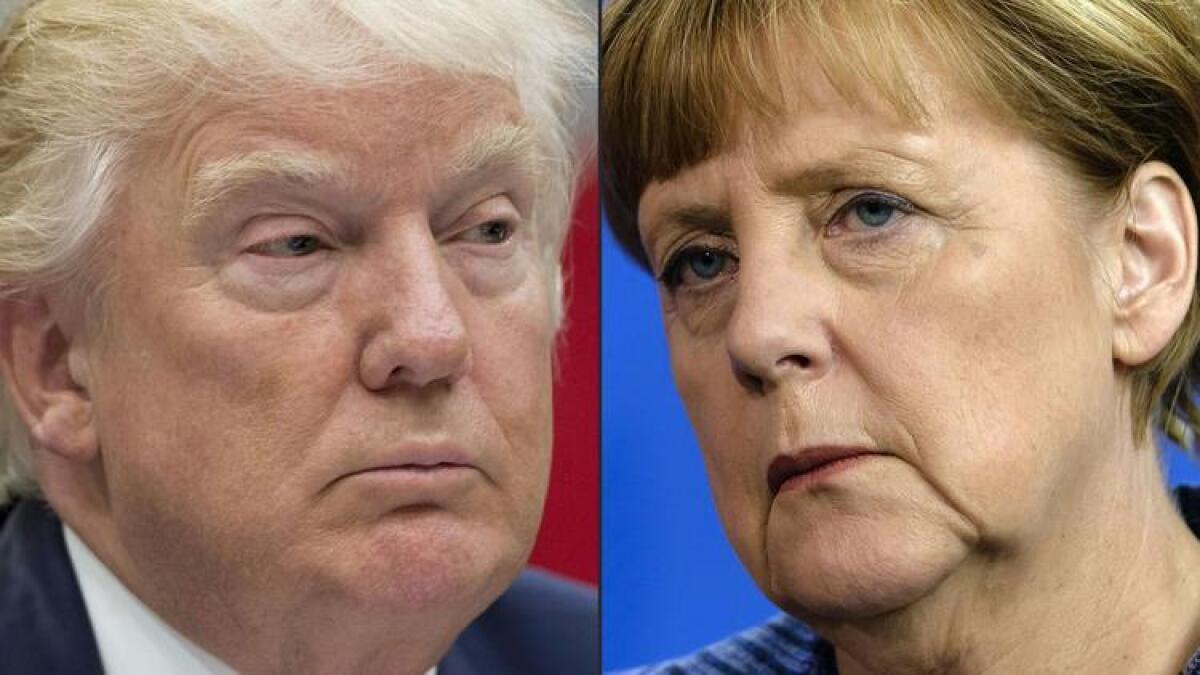
German Chancellor Angela Merkel once again singled out the United States for criticism Saturday for walking away from the Paris climate agreement, saying that she ‚Äúdeplores‚ÄĚ the decision and that she does not believe the Trump administration is open to returning to the deal to reduce international carbon emissions, as President Trump has said.
The United States was alone at the G-20 summit in dissenting from the group‚Äôs climate resolution. Leaders from the 19 other countries around the table in Hamburg agreed that the Paris climate agreement is ‚Äúirreversible‚ÄĚ and will take steps to implement the accords ‚Äúas soon as possible,‚ÄĚ said Merkel, who holds the chair of the summit this year.
The issue highlighted the cold reception that President Trump’s vision of American self-interest, denial of climate science and threats to throw up trade barriers received at the conference of 20 of the world’s wealthiest countries.
As she has before, Merkel called on European countries to step into the vacuum that Trump is leaving on the world stage. ‚ÄúWe as Europeans have to take our fate into our own hands,‚ÄĚ she said.
Putin thinks Trump believed his take on election
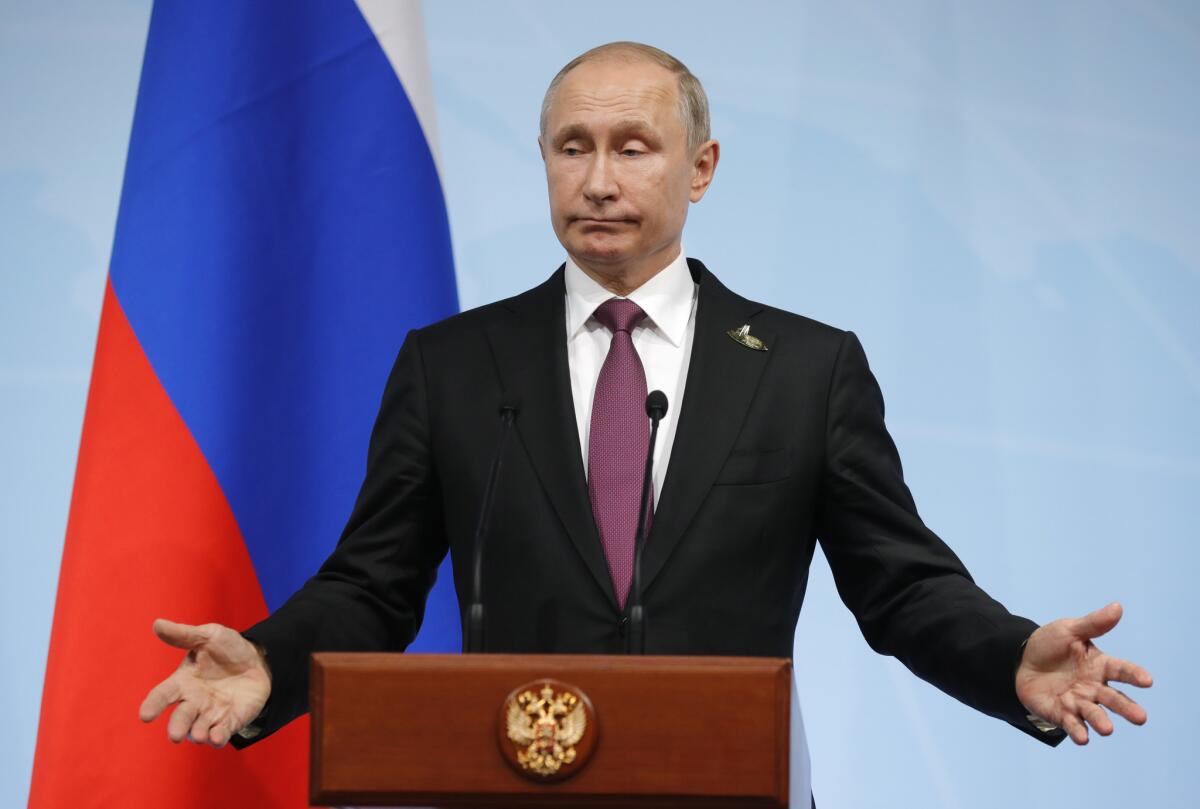
Russian President Vladimir Putin says he thinks President Trump believed his in-person denials of Russian meddling in the U.S. presidential election.
Putin spoke Saturday after the Group of 20 summit, where he and Trump had their first face-to-face meeting.
He said Trump asked him numerous questions about Russia’s alleged interference in the U.S. election during a lengthy discussion on the issue.
Putin says he thinks his answers satisfied Trump, but added that Trump’s opinion would be better sought from the U.S. president himself.
Putin said he gave detailed answers, including about his conversations with representatives of the Obama administration. He added he wouldn‚Äôt divulge their details, as the exchanges were confidential. ‚ÄúHe asked questions; I replied. It seemed to me that he was satisfied with the answers.‚ÄĚ
Trump said he had a ‚Äėtremendous meeting‚Äô with Putin
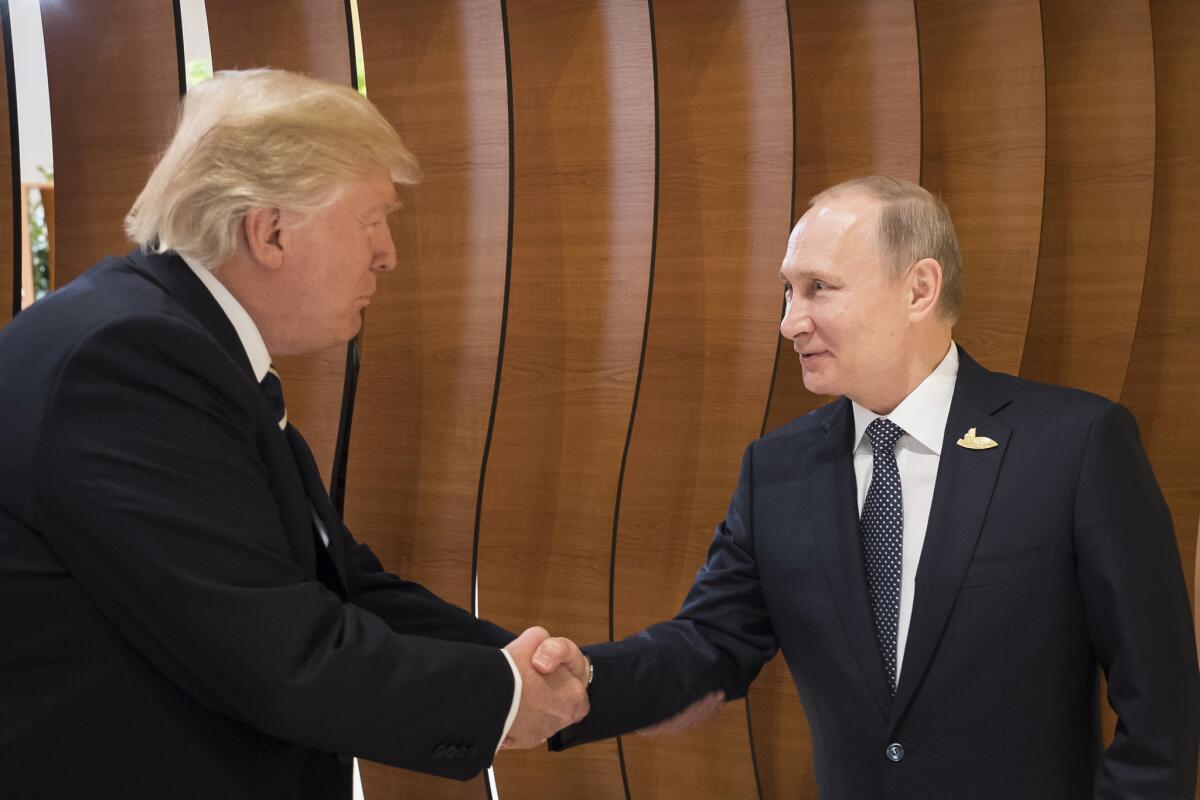
President Trump said he had a ‚Äútremendous meeting‚ÄĚ with Russian President Vladimir Putin, his first public description of the closely watched meeting with the Russian leader that lasted more than two hours Friday in Hamburg, Germany.
Trump made the comment to reporters gathered for the start of his scheduled meeting with British Prime Minister Theresa May on the sidelines of the G-20 conference Saturday.
‚Äú[Secretary of State Rex Tillerson] and I had a tremendous meeting yesterday with President Putin, and we‚Äôve had really great meetings with a lot of people,‚ÄĚ Trump said, adding that he and May have ‚Äúdeveloped a very special relationship‚ÄĚ and the two plan to discuss a ‚Äúvery, very big deal‚ÄĚ on trade during their meeting.
Trump and Putin agreed on a limited cease-fire in southwest Syria and discussed how to bridge their differences on Ukraine, ending North Korea’s nuclear program and cyber security threats.
But the White House and the Kremlin offered seemingly contradictory accounts of their discussions about American intelligence findings of Russian meddling in the 2016 U.S. election.
Tillerson, who was in the lengthy meeting with Putin and Russian Foreign Minister Sergei Lavrov, said Trump raised concerns about Moscow’s interference in the election, and Putin denied Russia was involved. Lavrov said Trump accepted Putin’s denial.
Trump has said it is a ‚Äúhoax‚ÄĚ that Russia acted to influence the election. During a news conference in Warsaw on Wednesday, Trump refused to definitively blame Putin‚Äôs government for having a hand in the theft and release of emails from Democratic Party operatives.
‚ÄúI think it was Russia, and it could have been other people in other countries,‚ÄĚ he said. ‚ÄúI think a lot of people interfered.‚ÄĚ
Strong June rebound signals job growth is solid again ‚ÄĒ but substantial raises remain elusive

With a strong rebound in job growth last month, the labor market is back on solid ground. But workers are still struggling to get the substantial wage gains they’ve been craving since the end of the recession, economists said.
Here are the highlights:
- The economy added 222,000 net new jobs, the Labor Department said ‚ÄĒ the best performance since February and well above analyst expectations.
- The unemployment rate ticked up to 4.4% from May’s 16-year low, but because more people joined the labor force.
- May’s job growth was revised up to 152,000, and April also was revised up, as part of a gain of 47,000 more total jobs for those two months than initially estimated.
- Hourly wages continued their steady but slow recent growth, increasing 4 cents to $26.25.
‚ÄúHiring is back to where it has been throughout much of the 8-year-old economic expansion,‚ÄĚ said Mark Hamrick, senior economic analyst at financial information website Bankrate.com.
Trump, Putin discuss Russian meddling in 2016 campaign. But accounts differ
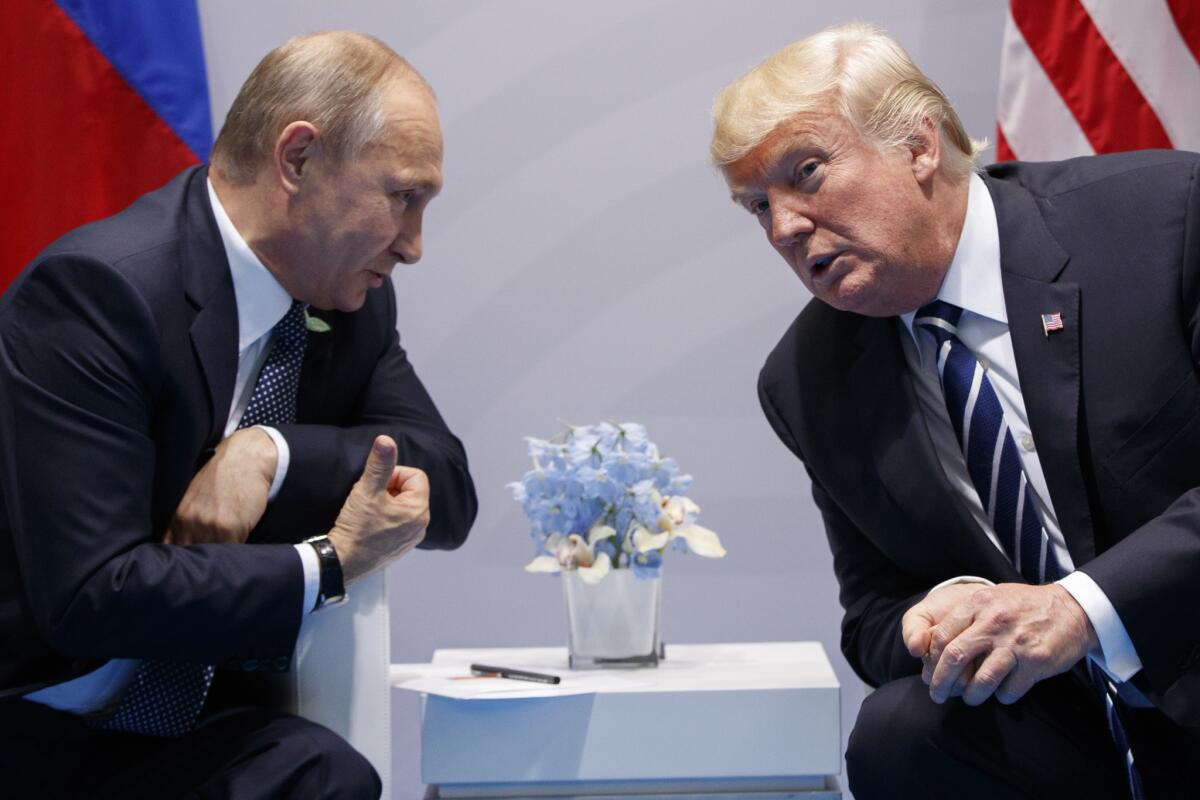
President Trump met for more than two hours with Russian President Vladimir Putin on Friday, after which both sides offered seemingly contradictory accounts of their discussions about American intelligence findings of Russian interference in the 2016 U.S. election.
Russian Foreign Minister Sergei Lavrov told reporters in a televised briefing that Trump accepted Putin‚Äôs contention that Russia ‚Äúhas not interfered in the elections‚ÄĚ and called the controversy ‚Äústrange and bizarre,‚ÄĚ according to the translation of Lavrov‚Äôs remarks.
But Secretary of State Rex Tillerson said at an off-camera briefing with U.S. reporters that Trump began their conversation by ‚Äúraising the concerns of the American people regarding Russian interference,‚ÄĚ which was followed by a ‚Äúrobust‚ÄĚ and ‚Äúlengthy discussion of the matter.‚ÄĚ
Trump and Putin agreed that the controversy over Russian interference in the election is a ‚Äúsubstantial hindrance in the ability to move the U.S.-Russian relationship forward,‚ÄĚ Tillerson said, and they wanted to move on.
‚ÄúThere was not a lot of relitigating the past,‚ÄĚ Tillerson added. ‚ÄúBoth leaders felt there are a lot of things both of us are unhappy about‚ÄĚ but they wanted to try to move past that. Lavrov separately said there ‚Äúwas a constructive atmosphere.‚ÄĚ
The two presidents decided to put together a ‚Äúframework‚ÄĚ to monitor cyberattacks and evaluate who should be ‚Äúheld accountable.‚ÄĚ
The conversation covered a range of other issues, including Ukraine, Syria, terrorism and cybersecurity, officials said.
The meeting went well beyond a scheduled 30 minutes ‚ÄĒ not surprising given past encounters between Putin and U.S. presidents. But it was nonetheless notable given the incredible scrutiny on this one, taking place against the backdrop of multiple investigations into Russian involvement in the 2016 elections and potential collusion involving former and current Trump aides.
‚ÄúBoth presidents were driven by their national interests, and they also both understood that both countries can do this only if we search for a balance between the interests of our two countries and if we want to main stability,‚ÄĚ Tillerson said.
Trump and Putin had exchanged cordial if lukewarm greetings in front of reporters before launching into the meeting, which included only the two presidents, Tillerson and Lavrov and two translators.
Former White House Chief of Staff John Podesta fires back at unusual Trump tweet
John Podesta, the former White House chief of staff and Hillary Clinton’s campaign manager, seems to occupy an odd corner of President Trump’s mind: Periodically, for reasons unknown, Trump will say something about him.
And Podesta, who has never been known to shy away from a fight, is often happy to fire back.
Both were on display Friday, starting with a Twitter message from Trump that was unusual, even by the president’s standards.
Trump‚Äôs claim that ‚Äúeveryone here‚ÄĚ ‚ÄĒ that would be Hamburg, Germany, at the G-20 economic summit ‚ÄĒ had Podesta on their minds was almost surely untrue. Trump, though, who was meeting with Russian President Vladimir Putin later that day, apparently did have Podesta in his thoughts.
Trump’s tweet appeared to get several aspects of the Clinton email and Russian hacking story lines confused. Podesta had nothing to do with the Democratic National Committee’s reluctance to turn its server over to the FBI. Russian agents separately hacked into his emails. The CIA had nothing to do with either case, so far as is known.
Several hours later, Podesta pointed out that, and more, as he responded with a tweet storm, which began with his saying he was on a cross-country trip with his wife.
Sessions and Rosenstein will visit the Guantanamo Bay prison, adding to signs the prison will stay open
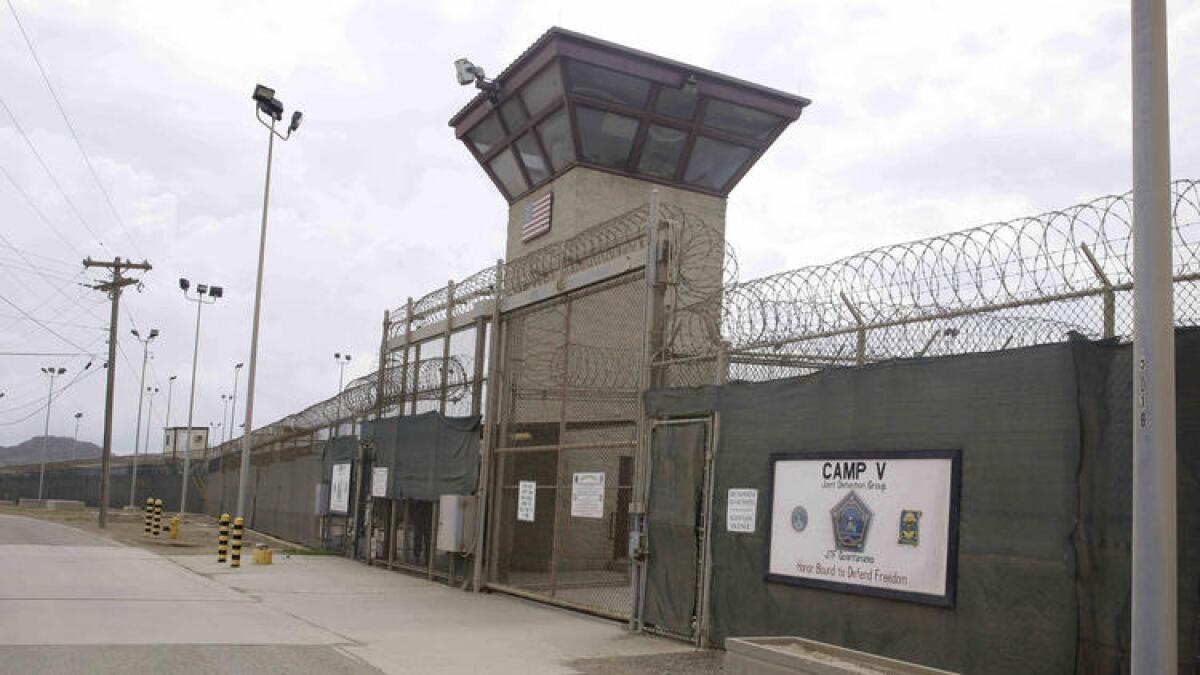
The top two Justice Department officials will tour the U.S. military prison at Guantanamo Bay, Cuba, on Friday, a facility that President Obama tried to close but President Trump has vowed to continue.
Atty. Gen. Jeff Sessions and Deputy Atty. Gen. Rod Rosenstein wanted to tour the base first-hand to get ‚Äúan up-to-date understanding of current operations,‚ÄĚ according to a statement by Ian Prior, a Justice Department spokesman. ‚ÄúThe purpose of the trip is to gain that understanding by meeting with the people on the ground who are leading our government-wide efforts at GTMO,‚ÄĚ the military‚Äôs abbreviation for the base.
The visit, and the statement, are more signs that the Trump administration intends to keep the prison open as part of a strategy against combating terror attacks.
‚ÄúKeeping this country safe from terrorists is the highest priority of the Trump administration,‚ÄĚ the statement said. ‚ÄúRecent attacks in Europe and elsewhere confirm that the threat to our nation is immediate and real, and it remains essential that we use every lawful tool available to prevent as many attacks as possible.‚ÄĚ
The prison, opened shortly after the Sept. 11, 2001, terrorist attacks, remains the target of lawsuits by human rights activists who have argued that the Constitution prohibits indefinite detention without charges.
Obama announced plans to close the prison shortly after taking office, and his administration worked to transfer the remaining detainees. But the effort faced strong opposition in Congress, which passed legislation prohibiting the transfer of detainees to the U.S. for trial.
Obama’s efforts fell short: The detention facility still houses 41 prisoners. Seven of them face formal charges, including five defendants accused of plotting the 2001 attacks.
Trump, though he has not yet formally reversed Obama‚Äôs policy, has repeatedly said he wants to keep the prison open. ‚ÄúWe‚Äôre gonna load it up with some bad dudes, believe me,‚ÄĚ he said during the 2016 campaign.
In March, he tweeted inaccurately that 122 detainees had been released by the Obama administration and had returned to the battlefield. In fact, 113 of those had been released by former President George W. Bush. ‚ÄúJust another terrible decision!‚ÄĚ Trump wrote.
Trump says it‚Äôs ‚Äėan honor‚Äô to meet Putin; Russian president ‚Äėdelighted‚Äô
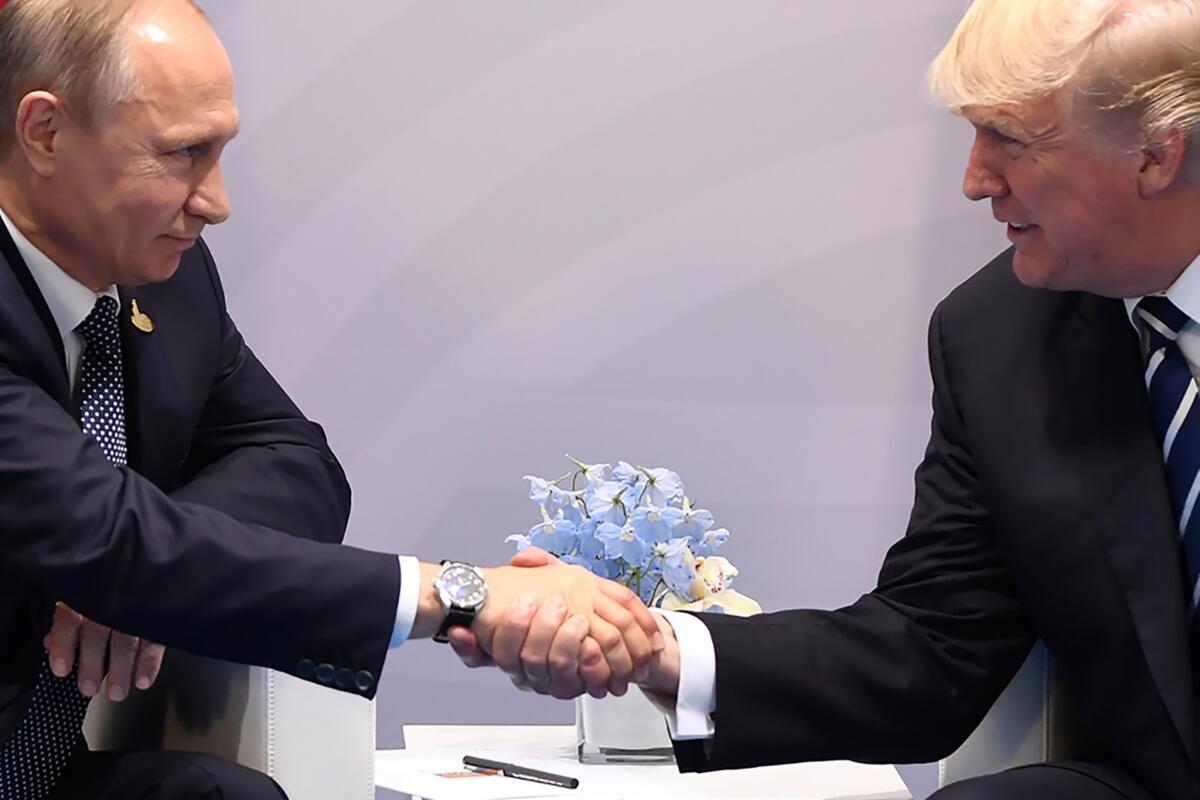
In one of the most high-stakes meetings of his new administration, President Trump sat down with Russian President Vladimir Putin, who U.S. intelligence agencies say personally ordered Russian spies to meddle in the 2016 election.
‚ÄúWe look forward to a lot of very positive things happening for Russia, and for the United States and for everybody concerned. And it‚Äôs an honor to be with you,‚ÄĚ Trump said after the two men shook hands in front of reporters.
Putin said he had spoken with Trump over the phone several times, but said in-person meetings between the two leaders would be more helpful in resolving policy issues.
‚ÄúIf you want to have a positive outcome in bilaterals and be able to resolve most international policy issues, that will really need personal meetings,‚ÄĚ Putin said.
‚ÄúI‚Äôm delighted to be able to meet you personally Mr. President. And I hope, as you have said, our meeting will yield positive result,‚ÄĚ he said.
Reporters asked Trump if he would raise Russia’s interference in the election during their meeting. Trump didn’t reply.
Trump’s meeting with Putin begins
Job growth rebounds to 222,000 in June; unemployment rate ticks up to 4.4%
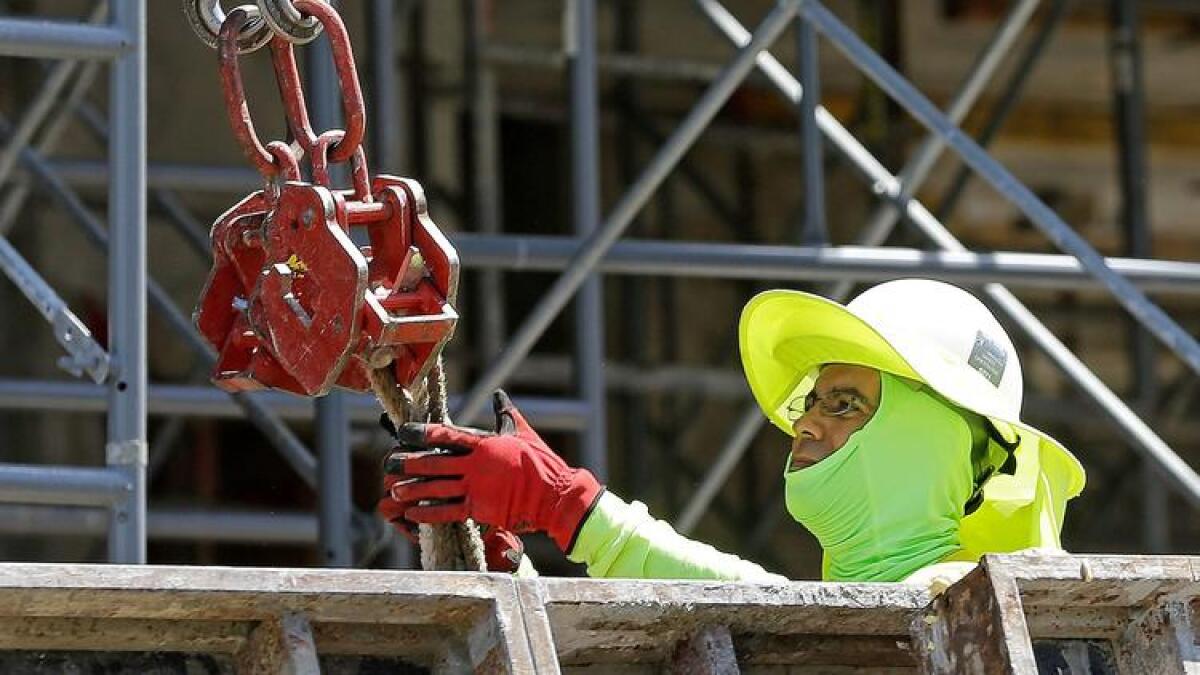
The labor market rebounded strongly in June as U.S. employers added 222,000 net new jobs for the best performance since February, the Labor Department said Friday.
The figure was a significant improvement from May’s upwardly revised job growth of 152,000 net new jobs. Job creation for April and May was revised up by a total of 47,000.
The unemployment rate ticked up 0.1 percentage point last month after hitting its lowest level since 2001 in May. But the increase, to 4.4%, was for a good reason as 361,000 people joined the labor force a month after it contracted.
Trump has first meeting with Mexico‚Äôs Pe√Īa Nieto amid tense relations
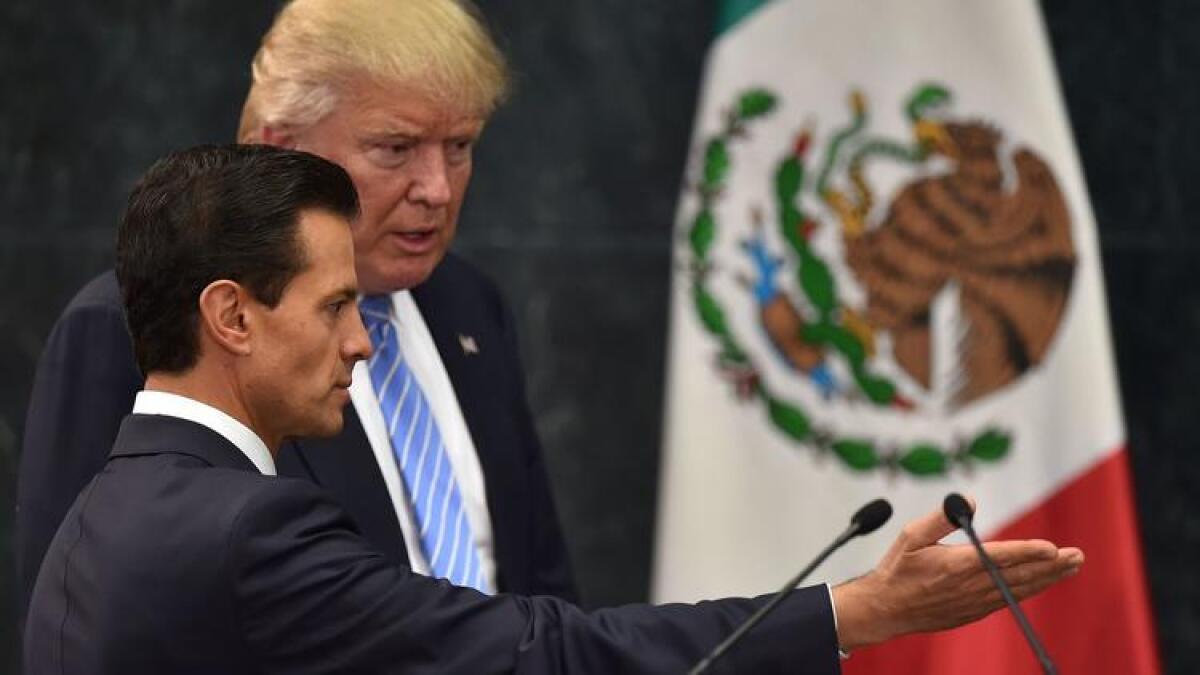
In his first meeting as president with his Mexican counterpart, Donald Trump on Friday said he ‚Äúabsolutely‚ÄĚ intends for Mexico to pay for the controversial wall he wants to build along the United States‚Äô southern border.
Trump and Mexican President Enrique Pe√Īa Nieto met on the sidelines of the Group of 20 summit here, amid sharp disagreements over trade and immigration. Some officials had hoped the brief encounter could help heal badly soured relations between the two neighbors.
The proposed wall continues to make that difficult.
As journalists were allowed in to see the two leaders take their seats ahead of their meeting, one reporter asked Trump if he still wanted Mexico to pay for the wall.
‚ÄúAbsolutely,‚ÄĚ Trump said.
Mexico has repeatedly said it will not pay for a new border barrier. Despite Trump’s statement, his administration has asked Congress for money to pay for building portions of a wall along the border. So far, that request has met with a chilly reception on Capitol Hill.
Homeland Security Department officials have made clear that the administration does not intend to build a wall along the full length of the border, the way Trump often has described it.
In January, Pe√Īa Nieto canceled a scheduled first meeting when Trump threatened to impose a tax on Mexican imports to pay for the wall, one of his key campaign promises.
Before Trump responded to the reporter’s question on Friday, the two presidents delivered prepared statements.
Trump referred to Pe√Īa Nieto as a ‚Äúfriend.‚ÄĚ He said he was ‚Äúnegotiating‚ÄĚ changes in the landmark 1994 North American Free Trade Agreement ‚Äúand some other things with Mexico and we‚Äôll see how it all turns out but I think we‚Äôve made very good progress.‚ÄĚ
Mexico has said it is willing to renegotiate elements of NAFTA. Canada is also a signatory.
Speaking through a translator, Pe√Īa Nieto said the meeting will help the two countries continue a ‚Äúflowing dialog‚ÄĚ especially ‚Äúfor the security of both nations, especially for our borders.‚ÄĚ
He noted that ‚Äúmigration‚ÄĚ is an issue of concern to both administrations.
And he added that ‚Äúit is the co-responsibility to deal with organized-crime issues.‚ÄĚ
The day he declared his candidacy, Trump characterized many Mexicans as rapists and criminals who should be kept out of the U.S. Opposition to Mexican immigration to the U.S. became a hallmark of his campaign.
Though enduring a brutal wave of violence, some of it related to drug trafficking, Mexico is nevertheless one of the United States’ largest trading partners, shares long and strong cultural ties and enjoyed relatively good diplomatic relations and security cooperation with Washington before Trump took office.
The two men met last year when Trump was a candidate. He traveled to Mexico City in August in a visit that many Mexicans saw as disastrous. Trump contradicted Pe√Īa Nieto on the wall and seized control of a news conference, calling on American reporters and ignoring the Mexicans as the Mexican president looked on helplessly.
Pe√Īa Nieto‚Äôs domestic favorability ratings dropped to an all-time low afterward.
The two have also shared several telephone calls, some quite contentious. In one, according to an official who listened in, Trump suggested that he’d send U.S. troops to Mexico to fight drug traffickers if Mexico’s army didn’t step up. Nothing could be more anathema to Mexicans’ sense of sovereignty and nationalism.
Even before Friday‚Äôs encounter, expectations in Mexico were low that it would be a chance to reset the two governments‚Äô troubled relations. One prominent newspaper, El Financiero, said talking to Trump is a ‚Äúconversation with a deaf man.‚ÄĚ
‚ÄúUndoubtedly, a meeting of presidents is always important ... but this will not be an encounter in which there will be major agreements,‚ÄĚ Mexican Foreign Minister Luis Videgaray said ahead of Friday‚Äôs session. ‚ÄúWe should not expect anything substantative.‚ÄĚ
Despite the formal and public tension, other officials in the U.S. and Mexican governments are working more closely. Videgaray sustains a close relationship with presidential son-in-law and advisor Jared Kushner. Secretary of State Rex Tillerson and Homeland Security Secretary John Kelly have traveled to Mexico City several times and received their counterparts in Washington.
The American officials often find themselves in the position of smoothing over the more provocative statements about Mexico and its citizens made by their boss, the president.
Bennett reported from Hamburg, Wilkinson from Washington.
Handshakes and huddles: World leaders’ interactions scrutinized for clues
Body language was being closely watched as the Group of 20 leaders exchanged greetings, posed for a ‚Äúfamily‚ÄĚ photo and sat down for a working lunch.
Trump’s initial handshake with Russian President Vladimir Putin was held out of view of news cameras, but the German Cabinet posted a video snippet on its Facebook page. In it, Putin smiles and points a finger a Trump, and the U.S. president claps him on the shoulder.
As leaders met for a working lunch at the Hamburg summit, Trump had something of a tug-of-war-style handshake with French President Emmanuel Macron, though not as extreme as their talked-about encounter in Brussels two months ago. In May, the two shared a protracted, white-knuckle gripping of hands, and Macron told a French newspaper later that it was no accident ‚Äď he had intended to signal he wouldn‚Äôt be pushed around.
Friday’s version was milder, with Trump pulling Macron’s hand toward his chest and clasping it there.
At the working lunch, soon before his much-anticipated meeting with the Russian leader, Trump was seated not far from Putin, but the two did not appear to make eye contact.
Earlier, getting ready to pose for a group photo on a sweeping staircase, Trump took his place in the front rank without incident. In Brussels, he had appeared to shove Montenegro’s Prime Minister Dusko Markovic out of the way as the leaders were getting ready for the photo shoot, a scene that was widely shared on social media.
At the lunch, Trump also demonstrated some casual chemistry with China’s President Xi Jinping, giving him a friendly pat on the back as the two were sitting down. The president has been trying to enlist China’s help in reining in North Korea’s leader Kim Jong Un, especially after the North successfully tested an intercontinental ballistic missile this week.
Republicans are in charge. So why can’t they deliver on healthcare?
For the better part of a decade, ‚Äúrepeal and replace‚ÄĚ has been Republican gospel, a political talking point and policy manifesto.
Other issues that long served as the glue holding together the disparate GOP coalition ‚ÄĒ free trade, a deep and abiding suspicion of Russia, ‚Äútraditional family values‚ÄĚ ‚ÄĒ have loosened their grip on the party and its voters.
But the quest to repeal the Affordable Care Act, or Obamacare, as it has come to be called, and replace it with a Republican substitute remains a fundamental tenet of party faith.
The problem is delivering.
Hamburg protests trap Melania Trump in hotel, delay some leaders’ arrival
Fierce new protests broke out here Friday morning, trapping First Lady Melania Trump at her hotel and delaying the arrival of some world leaders at the Group of 20 summit.
Trump’s spokeswoman, Stephanie Grisham, said Hamburg police had not given a go-ahead for the first lady to leave for spouses events that traditionally take place during the gathering of leaders of the world’s biggest economies. The spouses had been scheduled to take a boat ride, gather for lunch and visit a climate control center.
The first lady tweeted hopes for everyone’s safety.
The protests, which had continued late into Thursday night, resumed early Friday. Shortly after 7 a.m. local time, police in riot gear confronted hundreds of protesters who had gathered on the edge of the Alter Elbpark, about a mile from the convention center where the G-20 meetings are being held. A column of officers pushed protesters away from the street and down a grassy slope.
Both President Trump and Chinese President Xi Jinping’s arrivals were delayed by the demonstrations, staged mainly by anti-capitalists. Police said they used water cannon after trying repeatedly to clear roads leading to the summit site.
Security was heavy, with armored vehicles patrolling the streets and helicopters buzzing overhead.
The previous evening, larger and sometimes violent clashes broke out in several parts of the city. Police reported nearly 50 arrests, and said more than 100 police officers had been hurt in unrest that lasted until midnight. Protesters, some of them masked, set fires and hurled bottles at police.
Friday’s protests consisted mainly of groups of demonstrators who tried to march down or block streets being used by G-20 participants. But the demonstrations swelled in size as the day went on.
Heading into meeting with Putin, Trump vows to ‚Äėfight‚Äô for U.S. interests
President Trump began a daylong gathering with world leaders with a tweeted promise to fight for U.S. interests when he meets with Russian President Vladimir Putin on the sidelines of the Group of 20 summit.
The closely watched encounter on Friday in the German port city of Hamburg comes a day after Trump criticized the Kremlin for ‚Äúdestabilizing‚ÄĚ actions in Ukraine and elsewhere.
During a stopover in Poland on Thursday, the U.S. president also played down intelligence assessments that Moscow meddled in the 2016 election with the intention of helping him win.
The White House has not said whether Trump would raise the topic of Russian interference in the U.S. vote. Democratic lawmakers have urged him to do so, but his national security advisor, H.R. McMaster, told reporters in advance of the trip that there was no ‚Äúspecific agenda‚ÄĚ for the meeting, which was set to run for 35 minutes.
Amid speculation that Putin, a wily former KGB agent, might manage to maneuver Trump into making some unintended concession, the president struck a defiant tone, saying he did not expect accurate coverage of the meeting from the ‚ÄúFake News Media.‚ÄĚ
In Warsaw, the president took the unusual step of using a news conference with a foreign leader, Poland’s President Andrzej Duda, to complain he was the target of unfair coverage at home. Duda, who has worried Western European leaders with his steps to curtail media freedom in his own country, smiled and nodded.
Russia has said the talks would be too short for a detailed discussion of Ukraine. However, the Kremlin would like to see an easing of sanctions put in place after its 2014 annexation of Crimea.
Putin may also push for the return of two Russian diplomatic compounds in New York and Maryland that were shuttered by former President Obama in retaliation for election interference.
The two leaders may also try to find common ground in the fight against terrorism ‚ÄĒ a major theme of an address by Trump in the Polish capital ‚ÄĒ and on Syria, where Moscow has lent crucial military support to President Bashar Assad and has actively sought to carve out a more influential regional role.
The Kremlin has also put forth a plan for reducing tensions over North Korea’s weapons and nuclear programs, but a key element of it calls for Washington to stand down from military maneuvers with South Korea.
What does Trump mean when he says ‚Äėother countries‚Äô hacked the election?
Let’s begin with a statement that is widely accepted as fact: Russia interfered in the 2016 U.S. presidential election.
Officials from the intelligence community ‚ÄĒ the FBI, NSA, CIA and 14 other agencies ‚ÄĒ have unanimously concluded that Russian President Vladimir Putin ordered hacking during last year‚Äôs campaign. Democrats and Republicans alike on Capitol Hill agree.
Even so, nearly six months into President Trump’s administration, he still finds it difficult to place the blame solely on Russia.
Now, on the eve of his first face-to-face meeting with Putin, Trump hinted Thursday that ‚Äúother countries‚ÄĚ could have meddled in the election.
What does that mean? Which countries? Is this new rhetoric from Trump?
North Korea missile launch doesn’t bring U.S. closer to war, Mattis says
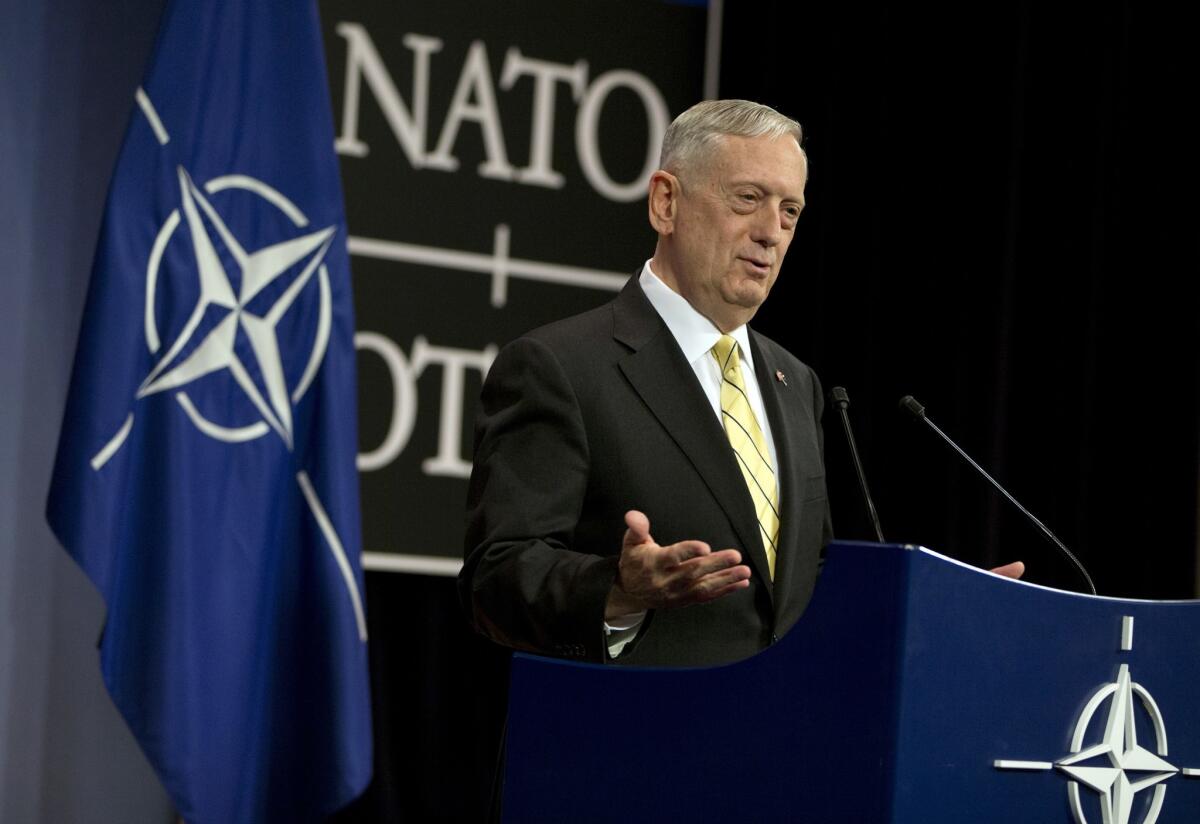
North Korea‚Äôs launch of a missile capable of striking parts of the U.S. doesn‚Äôt bring the two nations closer to war, Defense Secretary James Mattis said Thursday, even as President Trump warned he was considering ‚Äúpretty severe things‚ÄĚ in response.
‚ÄúI do not believe this capability in itself brings us close to war,‚ÄĚ Mattis told reporters at the Pentagon on Thursday. He added that U.S. ‚Äúself-restraint‚ÄĚ had prevented conflict and that ‚Äúdiplomatic efforts remain underway.‚ÄĚ
His comments appeared aimed at clarifying that the U.S. was not considering military action in response to the missile launch.
The Pentagon is still examining data from Tuesday’s launch to verify Pyongyang’s claim to have fired a two-stage intercontinental ballistic missile.
A two-stage ICBM would be capable of extending a missile’s range by thousands of miles, stoking fears that the isolated nation is drawing closer to its decades-long goal of being capable of delivering a nuclear strike on the continental United States.
At a news conference Thursday in Warsaw, Poland, Trump declined to provide specifics about potential options under consideration to rein in North Korea’s leader, Kim Jong Un.
‚ÄúI don‚Äôt like to talk about what we have planned,‚ÄĚ he said. ‚ÄúThey are behaving in a very, very dangerous manner.‚ÄĚ
The Pentagon was ready to provide the White House with military options for responding to North Korea, if necessary, but for now, the U.S. is focused on a diplomatic response, Mattis said.
‚ÄúRight now, we are working with allies. We are working with the ‚ÄĒ the Chinese,‚ÄĚ he said. ‚ÄúBut obviously, any kind of effort by North Korea to start a war would lead to severe consequences.‚ÄĚ
The State Department on Thursday dismissed a Russian-Chinese ‚Äúfreeze-for-freeze‚ÄĚ plan in which North Korea would halt its nuclear-arms development and the United States and South Korea would suspend joint military exercises. The goal would be to encourage dialogue, Russia and China said.
State Department spokeswoman Heather Nauert told reporters in Washington that the administration sees ‚Äúno equivalency‚ÄĚ between North Korea‚Äôs ‚Äúillicit‚ÄĚ actions and the ‚Äúlawful‚ÄĚ exercises the U.S. conducts with its allies.
She also suggested that the administration has not yet given up on enlisting help from China, despite President Trump’s recent tweets that he was disappointed in Beijing’s efforts.
‚ÄúWe just continue to work with China and talk to China,‚ÄĚ she said. ‚ÄúWe continue to put pressure on China. We expect and ask them to do more, and we‚Äôll continue to do that.‚ÄĚ
Nauert said administration officials were reaching out to countries all over the globe to urge them to expel any North Korean guest workers and drastically cut any investment or trade with Pyongyang.
Trump continues to be vague about Russia, but Tillerson offers specifics on cooperation
His boss might be equivocal or vague where Russia is concerned, but Secretary of State Rex Tillerson has some concrete ideas for Vladimir Putin.
With Syria and the fight against Islamic State militants at the top of the agenda when President Trump and the Russian leader are set to meet Friday, Tillerson on Thursday listed specific areas of potential U.S.-Russian cooperation.
Tillerson raised the possibility of establishing no-fly zones in Syria and deploying on-the-ground monitors, components that previous administrations, and especially the Pentagon, have resisted as being too difficult to sustain ‚ÄĒ and that Moscow largely ignored.
But Tillerson said U.S.-Russian cooperation over ‚Äúde-confliction zones,‚ÄĚ aimed at keeping rival forces from bumping into each other, has shown the two nations are ‚Äúcapable of further progress.‚ÄĚ Russia backs the Syrian regime while the U.S. supports the anti-government rebels.
‚ÄúThe United States is prepared to explore the possibility of establishing with Russia joint mechanisms for ensuring stability, including no-fly zones, on the ground cease-fire observers and coordinated delivery of humanitarian assistance,‚ÄĚ Tillerson said.
‚ÄúWhile there are no perfect options for guaranteeing stability, we must explore all possibilities for holding the line against the resurgence of ISIS or other terrorist groups,‚ÄĚ Tillerson said, using an acronym for Islamic State.
‚ÄúThe United States and Russia certainly have unresolved differences on a number of issues,‚ÄĚ he added, ‚Äúbut we have the potential to appropriately coordinate in Syria in order to produce stability and serve our mutual security interests.‚ÄĚ
Tillerson called on the many parties in Syria ‚Äúto avoid conflict with one another and adhere to agreed geographical boundaries for military de-confliction and protocols for de-escalation.‚ÄĚ
The secretary spoke before leaving early Thursday for Hamburg, Germany, to join Trump at the Group of 20 summit. Tillerson’s departure was unexpectedly delayed by several hours because of airplane mechanical problems.
To many, Tillerson‚Äôs comments sounded like an opening bid to Putin. A State Department spokeswoman, Heather Nauert, cautioned, however, that the ‚Äújoint mechanisms‚ÄĚ were among ‚Äúa lot of options‚ÄĚ the administration is exploring, and she insisted that ‚Äúoverall policy‚ÄĚ has not changed.
She did not say whether Tillerson will be present at the Trump-Putin meeting.
Tillerson singled out Russia and its ‚Äúspecial responsibility‚ÄĚ in stabilizing Syria.
He also urged Russia to ‚Äúremove obstacles to the defeat of ISIS and help provide stability that prevents ISIS from rising anew from the ashes of their failed and fraudulent caliphate.‚ÄĚ
Officially, Russia has joined the fight against Islamic State in Syria, but according to U.S. military and intelligence services, it primarily targets militias who are battling the brutal regime of President Bashar Assad.
Aboard his jet shortly before takeoff, Tillerson added that the meeting between Trump and Putin, at which many fear the experienced Russian will outmaneuver the novice American leader, was a ‚Äúbeginning‚ÄĚ and what he hoped would be the first step in rebuilding confidence between Moscow and Washington.
‚ÄúIt‚Äôs difficult to say what Russia‚Äôs intentions are in this relationship,‚ÄĚ Tillerson said. The purpose ‚Äúis to have a good exchange between President Trump and President Putin over what they both see as the nature of the relationship between our two countries.‚ÄĚ
On Syria, Tillerson said Russia had the obligation to prevent Assad from using chemical weapons and to prevent his forces from re-occupying ‚Äúillegitimately‚ÄĚ areas freed from Islamic State control. There is wide suspicion that Assad and his Russian and Iranian backers will attempt to take the territory where U.S.-supported forces have driven out Islamic State.
Nauert, the State Department spokeswoman, briefed reporters in Washington on Thursday. She rejected a suggestion that Trump would ‚Äúsell out‚ÄĚ Ukraine to Russia. Trump has not been an enthusiastic supporter of U.S. and European sanctions imposed on Moscow after Putin invaded Ukraine and occupied the Crimean peninsula in 2014, and there has been speculation he might agree to lift the U.S. portion of those sanctions as a friendly gesture to Putin.
Tillerson is scheduled to travel to the Ukrainian capital of Kiev after the Hamburg summit.
Federal ethics chief resigns after clashes with Trump
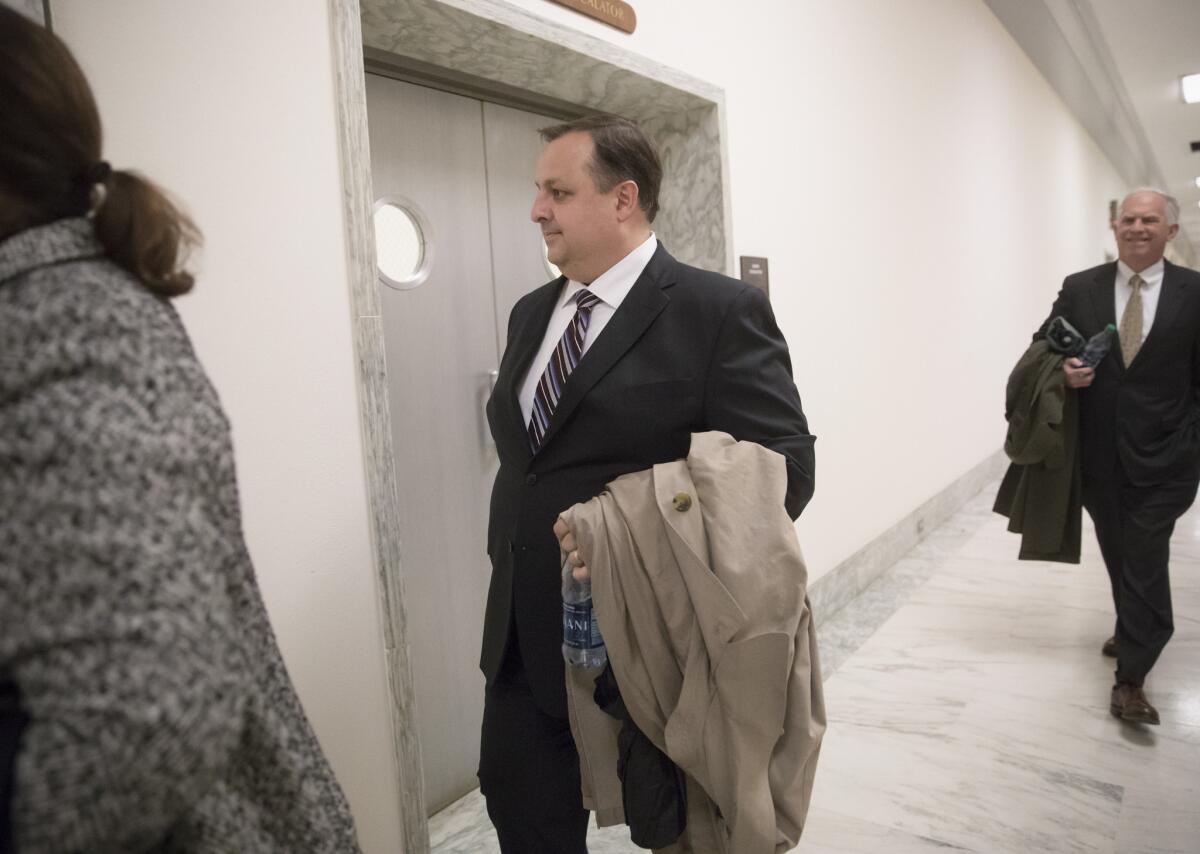
Walter Shaub Jr., director of the U.S. Office of Government Ethics, announced Thursday he would resign, following a rocky relationship with President Trump and repeated confrontations with the administration.
Shaub, appointed by President Obama in 2013, had unsuccessfully pressed Trump to divest his business interests to avoid potential conflicts of interest, something Trump refused to do.
The ethics watchdog also engaged in a public battle with the White House over his demands for more information about former lobbyists and other appointees who had been granted waivers from ethics rules. After initially balking, the White House eventually released the requested information about the waivers.
Shaub called for a harsher punishment for presidential advisor Kellyanne Conway after she flouted ethics rules by publicly endorsing Ivanka Trump’s clothing line during a television appearance.
Shaub did not specify a reason for his resignation in a letter to President Trump, which he released on Twitter on Thursday afternoon. He told the Washington Post he was not leaving under pressure.
He said in a separate statement that his time working with the Trump administration made it ‚Äúclear to [him] that we need improvements to the existing ethics program.‚ÄĚ
Shaub’s resignation, effective July 19, comes nearly six months before his term expires in January. He will join the nonpartisan Campaign Legal Center as senior director for ethics.
In his letter of resignation to the president, Shaub said the office was ‚Äúcommitted to protecting the principle that public service is a public trust,‚ÄĚ and employees must place loyalty to ethics over private gain.
Shaub had come under fire from Trump supporters for being politically motivated and some had called for his resignation.
Interest in the office has soared recently. Since Trump took office, the OGE has seen a rise in public contacts, which it defines as phone calls, emails or combined correspondence, about recent events.
In the first two quarters of fiscal year 2017, the office received 39,105 public contacts, compared with 164 during the same period in 2016.
The OGE does not have investigative or enforcement authority but can provide guidance to other agencies responsible for conducting investigations.
Jordan Libowitz, communications director for Citizens for Responsibility and Ethics in Washington, said next director should focuson enforcing conflicts of interest rules. CREW filed a complaint the same day as Shaub’s resignation against Jared Kushner for not disclosing or divesting from an online real estate investment company he co-founded.
‚ÄúThis isn‚Äôt about punishment, this is about following the rules and making sure people will follow the rules,‚ÄĚ Libowitz said. ‚ÄúOur hope is that the next director approaches the job with the same zeal for ethics.‚ÄĚ
President Trump will nominate the next director and the Senate must confirm his pick.
The White House had no immediate comment.
1:02 p.m.: This story was updated.
California, 17 other states sue Education Secretary Betsy DeVos for delaying new student-loan protection rules

California and 17 other states on Thursday sued Education Secretary Betsy DeVos, alleging she unlawfully delayed new federal regulations designed to protect student loan borrowers from being ripped off by for-profit colleges and other schools.
The rules, which would have made it easier for students to have loans forgiven if they were defrauded or deceived, were developed by the Obama administration and had been set to take effect last Saturday.
But last month DeVos delayed their implementation and launched an effort to rewrite them, arguing they were unfair to students and schools while putting taxpayers at risk for ‚Äúsignificant costs.‚ÄĚ
The suit, filed by attorneys general from 18 states plus the District of Columbia, said DeVos’ move violated the Administrative Procedures Act because she did not satisfy the standards for a delay, and also failed to give the proper notice or offer the public time to comment.
Senators urge Trump to confront Putin on Russian interference in election
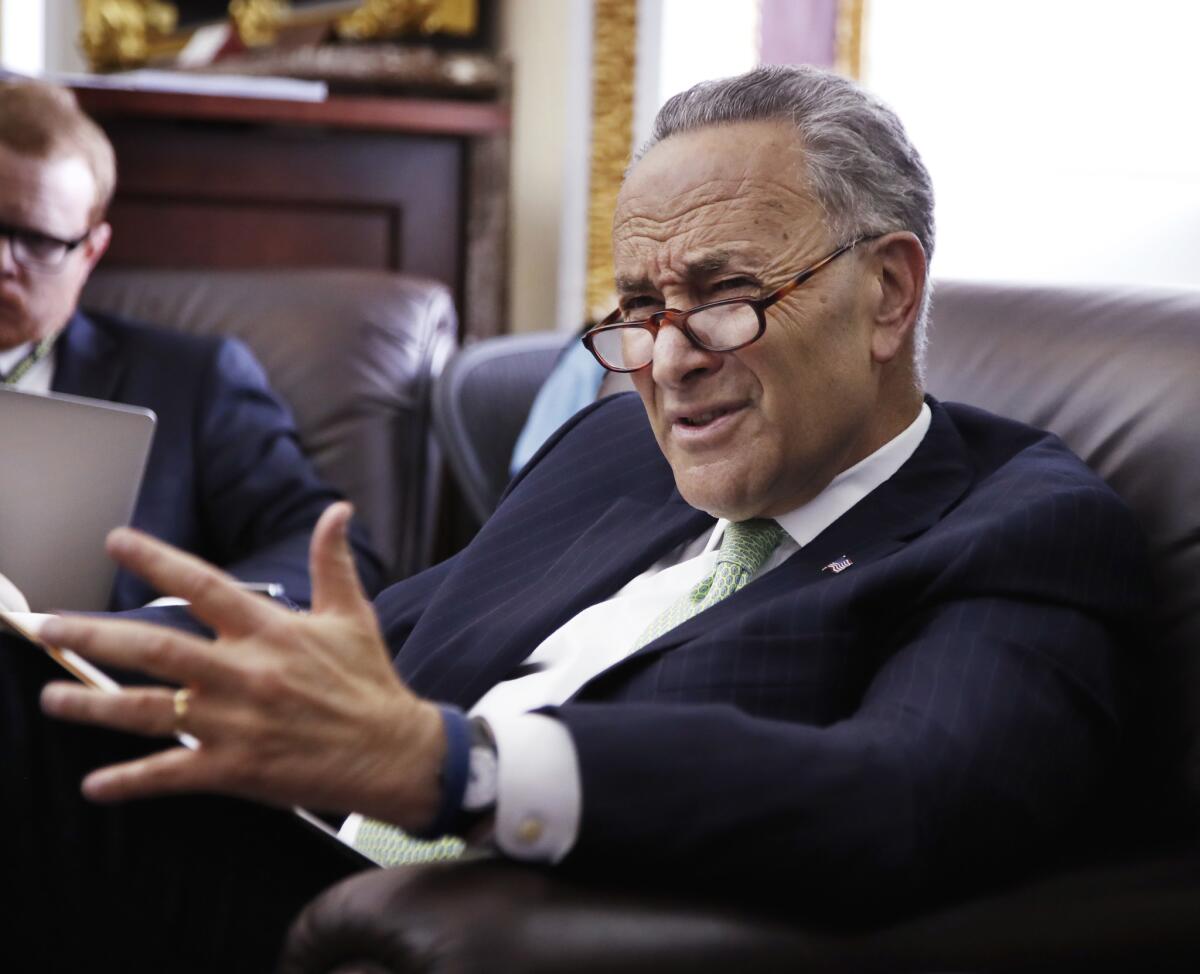
Top Senate Democrats are pushing President Trump, ahead of his first meeting with Vladimir Putin, to confront the Russian president over his election meddling and warn against further interference.
Trump has continued to raise doubts about Russia‚Äôs role influencing the U.S. election, reiterating Wednesday in a speech in Warsaw his belief that ‚Äúit could have been other people.‚ÄĚ
The senators, led by Senate Minority Leader Charles E. Schumer of New York, urged Trump to use his time with Putin to warn him off future attempts to meddle.
‚ÄúWe believe it is crucial for you ‚ÄĒ as the president of the United States ‚ÄĒ to raise this matter with President Putin and to ensure that he hears you loud and clear ‚ÄĒ interfering in our elections was wrong in 2016 and it will not be permitted to happen again,‚ÄĚ wrote Schumer and the top Democrats on the Intelligence, Armed Services and Foreign Relations committees.
‚ÄúWe urge you to raise this matter with President Putin later this week. President Putin must understand this can never happen again.‚ÄĚ
The U.S. intelligence community concluded in its report released in January that Putin ordered the Russia operation ‚ÄĒ which it called unprecedented ‚ÄĒ in hopes of harming Democrat Hillary Clinton‚Äôs electoral chances and helping Trump.
According to White House advisors, Trump has no set agenda for his meeting with Putin.
Private-sector job growth slows to still-solid 158,000

Job growth by U.S. businesses slowed to 158,000 in June, below analyst expectations but still a solid gain as labor market growth eases, payroll firm Automatic Data Processing said Thursday.
Last month’s figure was down from 230,000 net new jobs in May. Analysts had expected the data, a closely watched harbinger for the Labor Department’s official report due out Friday, to show the private-sector added 180,000 jobs last month.
But Mark Zandi, chief economist of Moody‚Äôs Analytics, said the job growth shows that the labor market ‚Äúcontinues to power forward‚ÄĚ at a consistent pace of between 150,000 and 200,000 net new jobs a month
Here’s why a growing number of states are pushing back against Trump’s voter fraud commission
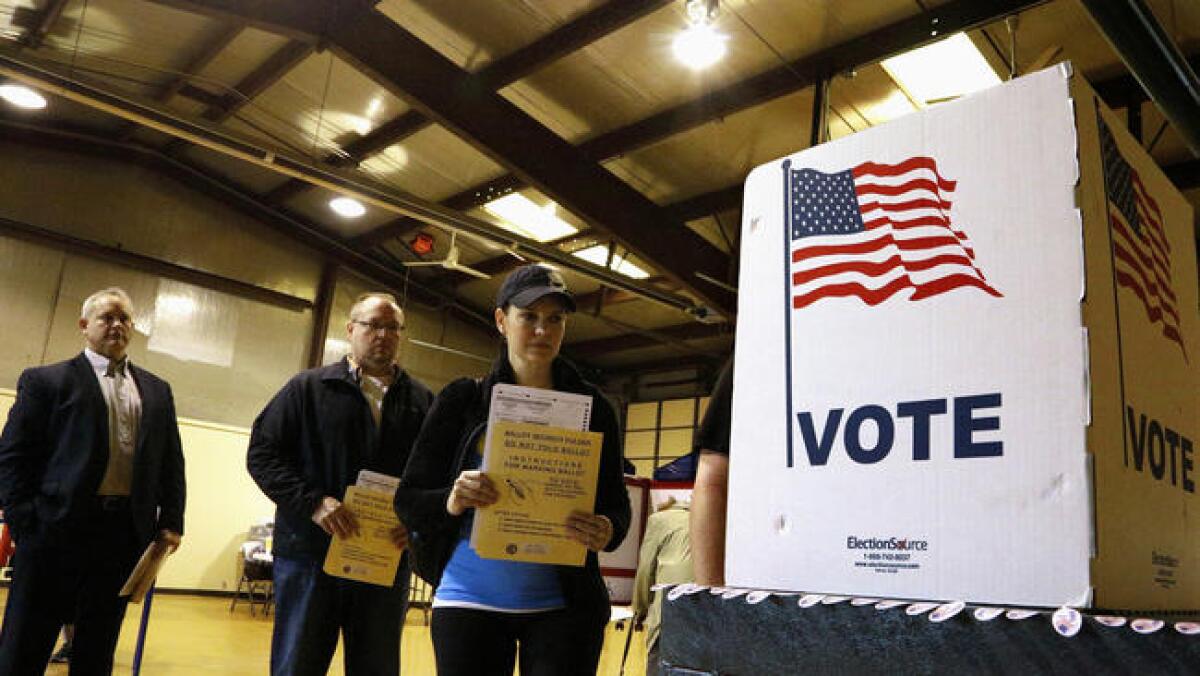
The Trump administration’s new voter fraud commission is lacking a crucial component in these early days: momentum.
A growing chorus of secretaries of state ‚ÄĒ both Democrats and Republicans ‚ÄĒ has voiced dismay at the commission‚Äôs request for voters‚Äô personal information. On June 28, the panel‚Äôs vice chairman, Kansas Secretary of State Kris Kobach, sent a letter to top elections officials in each state asking that they supply, among other things, names, addresses and the last four digits of voters‚Äô Social Security numbers.
As of Wednesday, at least 40 secretaries of state had either rejected the request or said that state law did not permit them to share all of the requested data.
Minnesota Secretary of State Steve Simon, a Democrat, called the request ‚Äúintrusive and unnecessary‚ÄĚ and said he would not hand over the personal information of his state‚Äôs nearly 4 million voters.
Trump administration extends travel ban deadline for refugee admissions

Refugee resettlement agencies say the State Department has given them updated instructions on President Trump’s travel ban that extends the cutoff date for refugee admissions.
When the ban was put into place last week, the administration said refugees who had booked travel would be admitted through Thursday. After that, immigration officials would block all refugees, except those who could prove they had U.S. connections, such as close relatives.
The July 6 date was a government estimate of when the country would reach a 50,000-person cap on refugee admissions this fiscal year. Federal officials now estimate that the cap will be hit a week later, according to refugee groups. State Department figures show that 49,225 refugees had arrived in the U.S. as of June 30.
A spokeswoman for the Bureau of Population, Refugees and Migration at the State Department would not confirm the change and said more information would come out Thursday.
‚ÄúThe cap could be hit earlier, so it could be earlier than July 12,‚ÄĚ said Mark Hetfield, chief executive of the resettlement group HIAS, formerly known as Hebrew Immigrant Aid Society.
HIAS is among several refugee resettlement groups that have challenged the ban, which blocks travel from six Muslim-majority countries for 90 days and suspends refugee admissions from everywhere for 120 days.
The travel order had been halted by lower courts until last month, when the Supreme Court said a limited version could carry on ahead of court arguments over it in the fall.
Justices wrote that people with ‚Äúbona fide‚ÄĚ connections to the U.S. such as jobs, university admission and family could bypass the ban but left it up to the Trump administration to define which family members counted.
The administration has said that people with ‚Äúclose family‚ÄĚ in the U.S. -- such as a parent, spouse, fiance or fiancee, child or sibling -- could go around the ban. But it blocked others, including grandparents, grandchildren, aunts, uncles and cousins.
Immigrant and refugee groups are challenging the definitions in a Honolulu federal district court, saying the administration is violating the Supreme Court’s orders. A federal judge there who previously ruled against the ban in one of the cases being considered by the high court could issue a decision on the matter this week.
Refugee advocates argue that their relationship to refugees should be enough for them to gain admission to the country despite the ban. The government disagrees.
Tillerson to back up Trump efforts to bolster Eastern Europe against Russia
As President Trump attempts to bolster Eastern European nations against Russian belligerence while meeting in Europe this week, he is getting added support from his top diplomat.
Secretary of State Rex Tillerson will accompany Trump on Friday and Saturday in Hamburg for a summit of the ‚ÄúGroup of 20‚ÄĚ developed countries, but then he will depart for Ukraine, for a show of solidarity in the nation where Russia has most overtly attempted to exert its influence.
His message there, a senior State Department official said Wednesday, would be to support Ukraine‚Äôs ‚Äúsovereignty and territorial integrity.‚ÄĚ
Russia invaded eastern Ukraine in 2014 and annexed the Crimean peninsula, provoking a string of international sanctions that are still in place.
Tillerson has not always embraced the idea of sanctions and has suggested alternatives to the so-called Minsk agreements, which call for Russia to end its occupation of Crimea.
The State Department official sought to dispel suspicion that the U.S. and Russia might cut their own deal over Ukraine.
‚ÄúThere certainly is no intent or desire to work exclusively with Russia,‚ÄĚ the official said in a briefing with reporters. ‚ÄúI mean, this is a multiparty issue.‚ÄĚ
He said that the nations charged with handling the Ukraine crisis under the so-called Normandy format ‚ÄĒ Germany, France, Russia and Ukraine ‚ÄĒ want a U.S. interlocutor to participate.
The official, speaking on condition of anonymity in keeping with State Department practice, said the Trump administration had not yet decided whether to grant Ukraine’s request to purchase lethal weapons.
Selling arms to Ukraine to fight Russia had long had Republicans‚Äô backing, until Trump ‚ÄĒ on advice from advisors now under investigation over possible ties to Russia ‚ÄĒ had a proposal to that effect removed from the Republican Party platform at the 2016 convention that nominated him for president.
‚ÄúWe have neither ruled out providing such weapons to Ukraine nor have we taken any decision to do so,‚ÄĚ the official said.
Tillerson will go on Sunday to Ukraine’s capital, Kiev. Then he will travel to Istanbul, Turkey, for a meeting of the World Petroleum Council and sessions with Turkish leaders. The U.S. currently has sharp disagreements with Turkey over Syria and other issues.
Oddly, given Tillerson‚Äôs current job, he will receive a lifetime achievement award from the World Petroleum Council for his previous one ‚ÄĒ a long career at ExxonMobil, where Tillerson worked for more than 40 years and rose to CEO before he resigned to become secretary of State.
State Department officials could not explain why Tillerson was receiving the award, nor would they address suggestions that it could represent a conflict of interest. Tillerson has said that, as secretary of State, he would recuse himself from all matters that might touch on the energy conglomerate.
The London-based World Petroleum Council is giving Tillerson its highest award for his ‚Äúoutstanding contribution to the oil and gas industry,‚ÄĚ according to the group‚Äôs website.
Tillerson confirms that North Korean launch was intercontinental ballistic missile

Secretary of State Rex Tillerson is confirming that a North Korean test launch was indeed an intercontinental ballistic missile, calling it a ‚Äúnew escalation of the threat to the United States, our allies and partners.‚ÄĚ
Tillerson issued a statement Tuesday evening condemning the launch, and said the United States would bring North Korea‚Äôs ‚Äúprovocative action‚ÄĚ before the United Nations Security Council.
North Korea had immediately hailed the launch and the missile’s nearly 40-minute flight as its first successful test of an ICBM, but it took almost a full 24 hours for analysis of missile data to bear that out.
‚ÄúGlobal action is required to stop a global threat,‚ÄĚ said Tillerson. He called on all nations to ‚Äúpublicly demonstrate to North Korea that there are consequences‚ÄĚ of its nuclear and missile programs.
The secretary said that President Trump and his national security advisors were ‚Äúcontinuing to assess the situation in close coordination with our allies and partners.‚ÄĚ The latest firing is certain to elevate the matter of containing North Korea when Trump and other leaders of the world‚Äôs richest countries meet later this week for their annual Group of 20 summit in Hamburg, Germany.
Throughout the Independence Day holiday, the White House had been silent on the missile launch, although Trump issued a pair of tweets late Monday following the test-firing. He did not mention the North Korea situation in remarks Tuesday afternoon at a picnic for military families.
North Korea’s launch may have been intercontinental ballistic missile, analysts say
The U.S. military is examining whether North Korea launched a two-stage intercontinental ballistic missile, with analysts poring over data to determine whether Pyongyang’s claims to have done so are true, U.S. officials said Tuesday.
Evidence suggests the missile could have been an ICBM, based on fresh data from the U.S. military’s constellations of reconnaissance satellites as well as from foreign military allies and other intelligence collected during the missile’s nearly 40-minute flight.
American intelligence agencies and the military are doing analyses to get a fuller understanding of what the North Korean military launched.
‚ÄúWe‚Äôre working with our interagency partners on a more detailed assessment,‚ÄĚ Cdr. Patrick Evans, a Pentagon spokesman, said in a statement.
The initial assessment, released late Monday by U.S. Pacific Command, which oversees all military operations in the Asia-Pacific region, had classified the test launch as an intermediate range ballistic missile, meaning that it had a total range of around 3,400 miles. However, that assessment was being re-examined.
A two-stage ICBM would be capable of extending that range by thousands of miles, stoking fears that the isolated nation is drawing ever closer to its decades-long march toward being capable of delivering a nuclear strike on the continental United States.
GOP‚Äôs Plan B for Obamacare ‚ÄĒ repeal first, replace later ‚ÄĒ began with quiet push from the Koch network
President Trump‚Äôs surprise suggestion Friday that deadlocked Senate Republicans shift their focus to simply repealing Obamacare ‚ÄĒ and worry about replacing it later ‚ÄĒ has its roots in a Koch network proposal that has been shopped around Congress for months.
The influential Koch network, backed by the billionaire industrialists, floated the idea most recently at a retreat last weekend in Colorado Springs, Colo., where key conservative lawmakers heard an earful from frustrated GOP donors about the party’s failure to deliver on their signature campaign promise.
Trump suggests China should step in after North Korean missile test
President Trump, following a script of months’ standing, is again looking to China to exert pressure on North Korea’s mercurial leader, Kim Jong Un. But hopes for a Washington-Beijing partnership to rein in Kim had been steadily unraveling even before North Korea’s latest ballistic missile test.
‚ÄúPerhaps China will put a heavy move on North Korea and end this nonsense once and for all!‚ÄĚ the president wrote late Monday on Twitter after Pyongyang fired a projectile that flew for 40 minutes, representing what experts described as a significant advance in its missile technology.
North Korea called the firing the first successful test of an intercontinental ballistic missile, a claim that was being studied by military analysts.
Other than Trump’s tweets, the White House by late Tuesday afternoon had not commented on the missile launch. The president spent part of Independence Day at his golf course in Virginia.
Shortly before taking office, Trump had suggested that North Korea would not be allowed to develop intercontinental ballistic missile capacity. ‚ÄúWon‚Äôt happen,‚ÄĚ he tweeted in January.
With the possibility that such a scenario might have already come to pass, some lawmakers said the White House needed to take decisive steps.
‚ÄúInstead of vague Twitter bluster, President Trump should answer North Korea‚Äôs dangerous test with a coherent strategy of direct diplomacy with Pyongyang and increased economic sanctions pressure from China,‚ÄĚ Sen. Edward Markey (D-Mass.), said in a statement.
Other lawmakers said Trump should not count on others to address a rapidly advancing threat. Sen. Deb Fischer, R-Neb., said greater pressure should be brought to bear on North Korea‚Äôs ‚Äúinternational patrons, China and Russia, but we should have no illusions that they will solve this problem for us.‚ÄĚ
China, along with Russia, branded the launch ‚Äúunacceptable‚ÄĚ and called on North Korea to suspend missile and nuclear tests.
But the two countries also urged the United States to halt military exercises with South Korea and scrap a controversial U.S. anti-missile system that has been partially deployed in South Korea ‚Äď calls that Washington is unlikely to heed.
In April, after a cordial encounter with Chinese President Xi Jinping at his Mar-a-Lago resort, Trump had expressed optimism that Washington and Beijing could team up to confront the North Korean threat.
However, Beijing has been openly irritated by recent steps taken by the Trump administration, including trade threats, plans to sell more than $1.4 billion in weapons to Taiwan, and singling out China for strong criticism in last week’s annual State Department report on human trafficking.
The Chinese government was also angered when a U.S. warship recently sailed close to Chinese-claimed territory in the South China Sea.
Although China has taken only relatively mild measures against Kim in the course of the nearly six-month-old Trump administration, official U.S. attitudes toward North Korea hardened last month with the death of Otto Warmbier, the American college student who spent more than a year and a half in North Korean captivity before being sent home in a coma. He had been arrested during an adventure-tourism trip and accused of stealing a propaganda banner, apparently for a souvenir.
On a personal level, Trump has appeared increasingly frustrated with Kim, whom he had previously called a ‚Äúsmart cookie.‚ÄĚ In his Twitter missive following news of the launch, the president asked rhetorically: ‚ÄúDoes this guy have anything better to do with his life?‚ÄĚ
Trump spoke by phone with Xi on Sunday night, again raising the North Korea question, according to the White House. He will be seeing the Chinese leader this week at the Group of 20 meeting in Germany.
Leaders of South Korea and Japan, U.S. allies in the region who have been alarmed by Kim’s growing shows of belligerence, will also be at the gathering in the northern German city of Hamburg.
In his tweets, Trump suggested, somewhat puzzlingly, that Tokyo or Seoul could take some unilateral action against North Korea.
‚ÄúHard to believe that South Korea and Japan will put up with this much longer,‚ÄĚ the president wrote.
Both countries are home to large contingents of American troops and rely heavily on the U.S. defense umbrella.
Washington and Seoul, however, do not see eye-to-eye on how to deal with the North.
South Korea’s new president, Moon Jae-in, who visited the White House last week, has been an active advocate of diplomatic engagement with North Korea. In June, Moon suspended the deployment of part of the THAAD anti-missile system, whose installation North Korea has described as a provocation.
Trump has agreed to hold a full-fledged bilateral meeting with Putin on Friday, White House says
President Trump will sit down for an extended meeting with Russian President Vladimir Putin on Friday on the sidelines of a major economic conference in Germany, a White House official said Tuesday.
Trump‚Äôs first face-to-face interaction with Putin will be a ‚Äúnormal bilateral meeting‚ÄĚ during the G20 summit in Hamburg, Germany, White House spokeswoman Lindsay Walters said in a statement Tuesday.
The label implies a longer and more formal meeting than the brief conversation with German Chancellor Angela Merkel that Trump also has on his schedule for Friday, as well as other ‚Äúpull aside‚ÄĚ meetings with the leaders of Mexico, Japan and several other countries that day.
The session will be the first formal conversation between Putin and a U.S. president in nearly two years, after the U.S. moved to isolate Moscow following the Russian annexation of Ukrainian territory.
It comes amid tension over Moscow’s efforts to influence the 2016 presidential election and its support for the Syrian government. A special counsel is directing an FBI investigation into whether people associated with Trump’s campaign colluded with Russia to hurt Hillary Clinton’s chances of being elected.
Trump campaigned on a promise to ‚Äúget along‚ÄĚ with Putin and forge a more cooperative relationship between the two countries. At times, he has called the U.S. intelligence community‚Äôs conclusion that Russia interfered with the election a ‚Äúhoax.‚ÄĚ
Friday’s meeting will be the first major test of Trump’s promise of better relations. Lawmakers from both parties want Trump to use the opportunity to tell Putin to not interfere in future U.S. elections. The White House has refused to say what will be discussed.
‚ÄúThere‚Äôs no specific agenda,‚ÄĚ Trump‚Äôs national security advisor, H.R. McMaster, told reporters Thursday. ‚ÄúIt‚Äôs really going to be whatever the president wants to talk about.‚ÄĚ
Putin is expected to look for ways to further undermine the North Atlantic Treaty Organization and exploit divisions within NATO such as the tension between Trump and Merkel.
Trump touts ‚Äėgreat jobs numbers‚Äô that aren‚Äôt so great
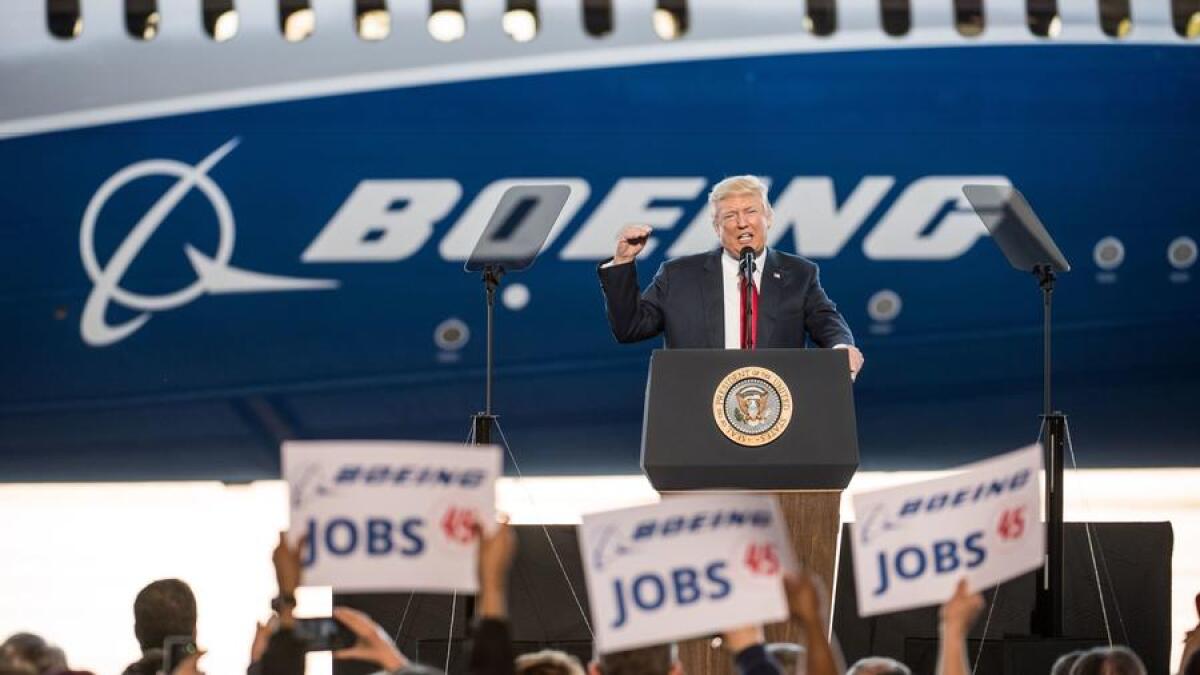
President Trump on Monday touted the ‚Äúgreat jobs numbers‚ÄĚ since he took office ‚ÄĒ numbers that his own administration‚Äôs official statistics show aren‚Äôt all that great.
Trump said in a tweet that ‚Äúat some point the Fake News will be forced to discuss our great jobs numbers, strong economy‚ÄĚ and other successes of his administration.
From February through May ‚ÄĒ the latest data available ‚ÄĒ the U.S. economy has created 594,000 net new jobs, according to the Labor Department‚Äôs Bureau of Labor Statistics. That‚Äôs fewer than the 659,000 created during the final four months of the Obama administration, which Trump criticized for its job growth.
Although the Bureau of Labor Statistics adjusted its figures for seasonal disparities, such as the increased hiring during the Christmas holiday season, some would argue that a better comparison would be February through May of 2016.
Amid all the tweeting and investigations, one man acts like everything is boringly normal: Mike Pence
The Republicans’ signature healthcare bill was in peril in Congress and President Trump was busy warring against media foes on Twitter.
Vice President Mike Pence, wearing a brown suit and his usual earnest expression, was far from the fray last week, here at a warehouse outside Cleveland amid metal rods and wooden crates for a ‚Äúlistening session‚ÄĚ with small-business owners. Sitting at a drafting table, he ignored the camera lights as well as the trouble in Washington, dutifully hearing out complaints about healthcare, taking notes on a legal pad and promising the Ohioans that the Trump-Pence administration was close to replacing Obamacare.
This is how Mike Pence copes with the drama that defines life as Donald Trump’s sidekick: acting like everything is normal, boringly normal.
New outcry as Trump tweets mock video showing him beating up CNN stand-in
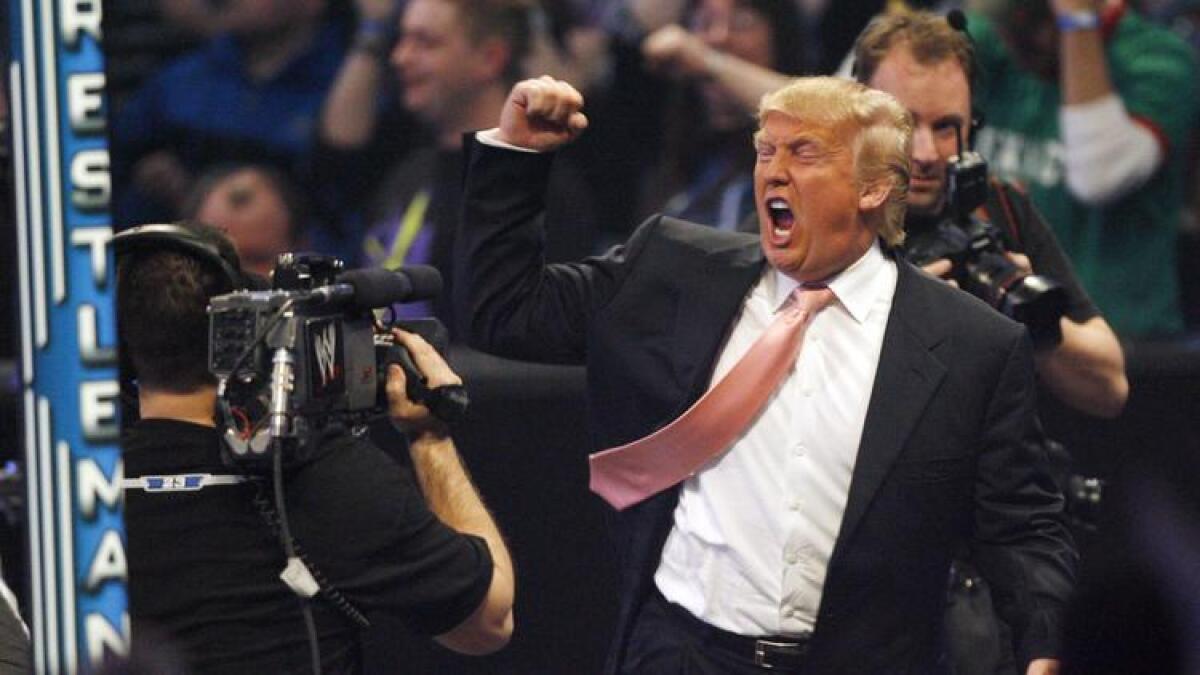
First Lady Melania Trump has said that when her husband, Donald, is attacked, he will ‚Äúpunch back 10 times harder.‚ÄĚ On Sunday, President Trump put those pugilistic instincts on display for all the world to see, circulating a doctored video clip that showed him physically attacking a crudely rendered stand-in for CNN, then walking away with a grimace of satisfaction.
After a week in which even Republicans were provoked to plead with the president to stop tweeting, the new post on Twitter again struck a nerve, drawing fresh rebukes from critics who called it an incitement to violence and a degradation of the highest office in the land.
Trump’s supporters and surrogates, though, defended the video clip as harmless mockery, denied such postings distracted from his agenda, or cheered the message outright.
Trump had already taken his feud with the news media to new heights last week with a coarse personal attack on the appearance and intellect of cable television host Mika Brzezinski, accompanied by slurs against her co-host and fiancé Joe Scarborough, that sparked the most recent uproar against the president for his online musings.